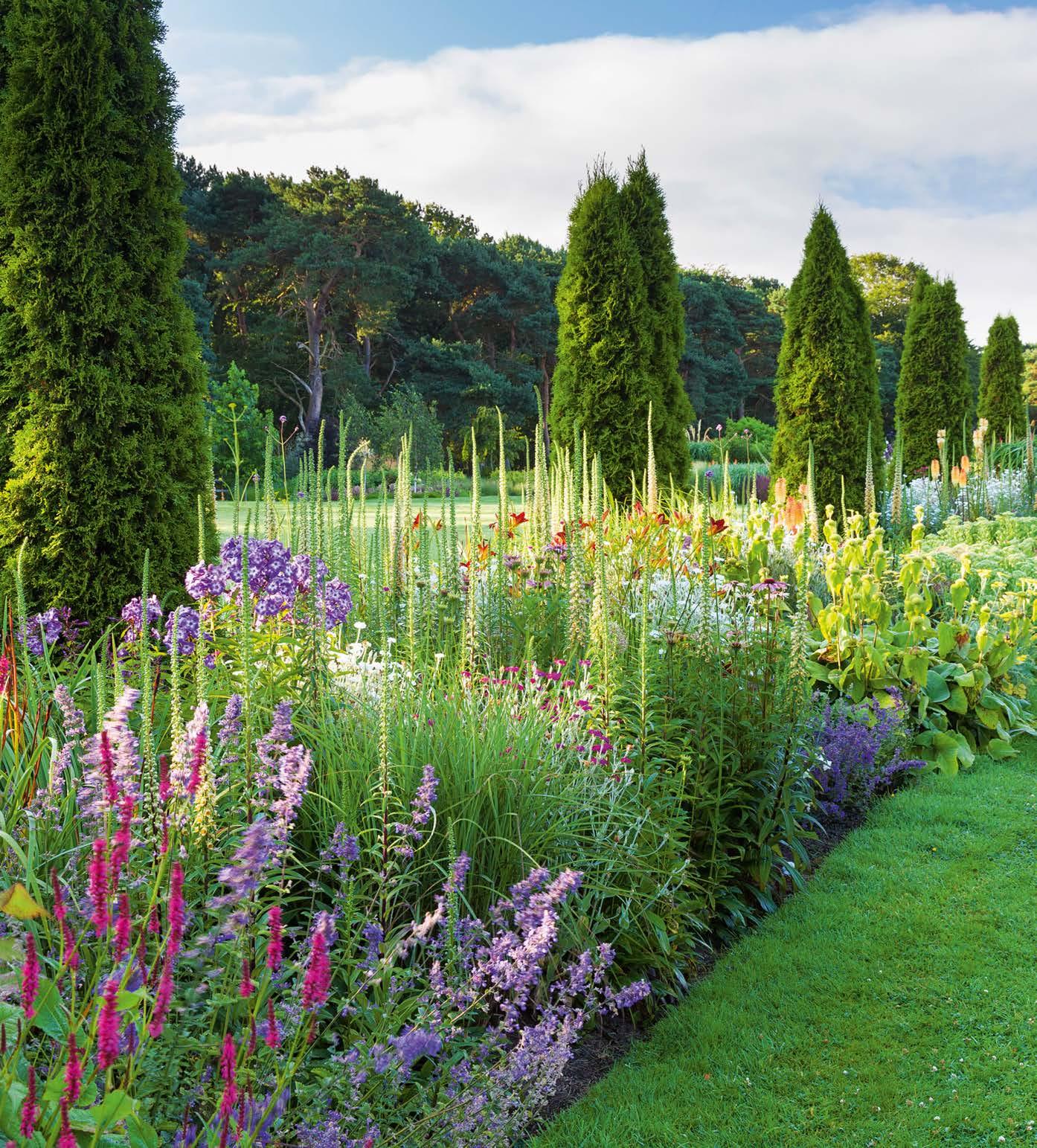





























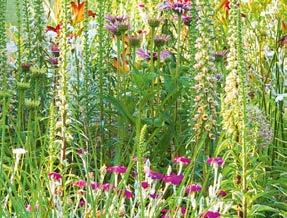


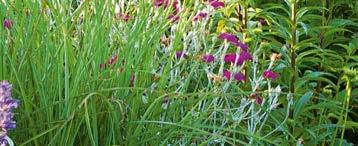











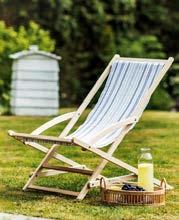

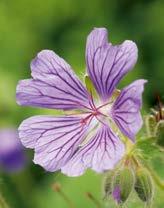











A FAIRYTALE GARDEN the island of Sark PRETTY & PRODUCTIVE Create a beautiful kitchen garden Garden care made easy In association with on Summer Heights Six glorious gardens at their colourful best Seasonal inspiration Grow the best GERANIUMS FURNITURE for lazy days Top 10 climbing ROSES New ways with PARTERRES £5.99 JULY 2023 www.theenglishgarden.co.uk For everyone who loves beautiful gardens GARDEN english THE
These outdoor saunas are unique and award winning, designed to blend into the surroundings whilst socialising with your family and friends in the ultimate of sauna experiences. You don’t need much more than a corner in your garden or courtyard to enjoy these wonderful saunas.
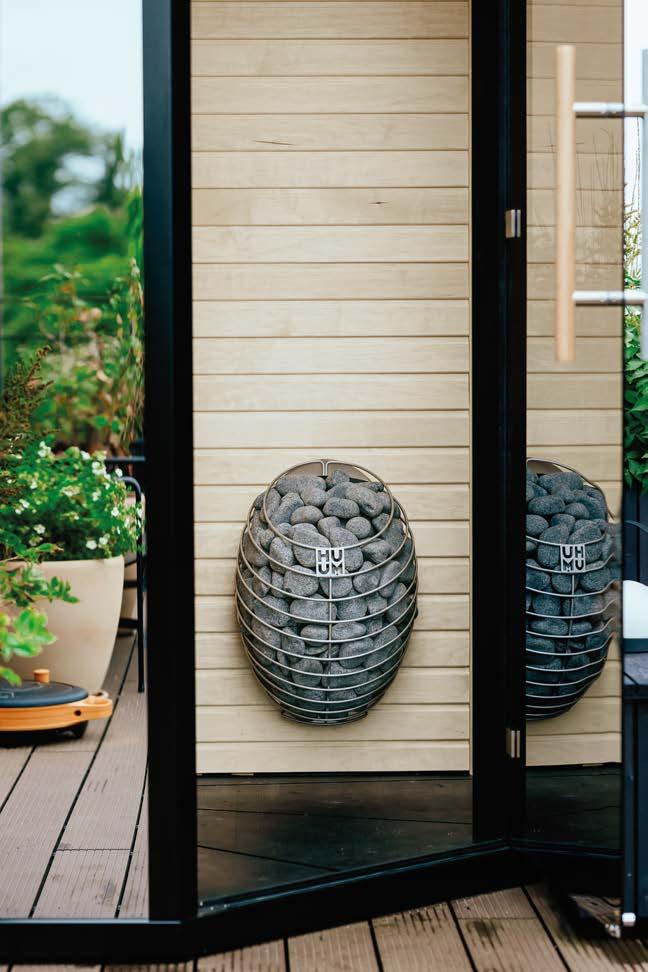
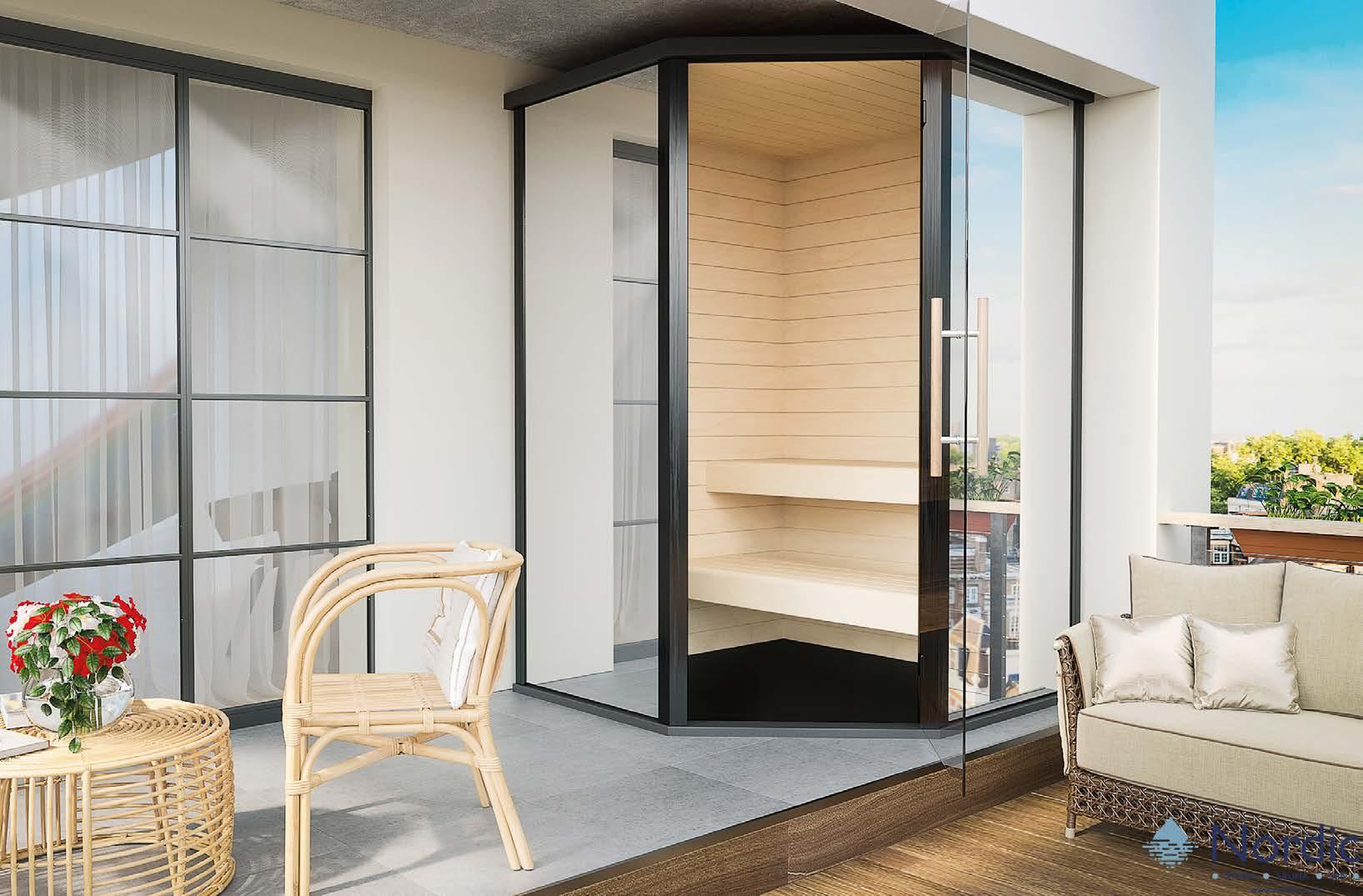








info@nordic.co.uk www.nordic.co.uk T: 01342 888 188
CONTRIBUTORS
Liz Ware



Liz
If you visited the Chelsea Flower Show or watched any of its TV coverage, the fact that several of its show gardens featured weeds won’t have escaped you. My garden is the second one I’ve had that was chock-full of weeds when I took it on. Anyone who, like me, has had to hack their way through bramble thickets and doggedly remove bindweed, thistles and docks just to be able to plant a few things they actually want to grow may well be looking on with faint horror. Gardening is intervention, and if we want to grow cultivated plants, getting on top of dominant, invasive ‘weeds’ is necessary. That said, attitudes are changing – note the apostrophes around the word weeds! After all, they are plants too, just growing somewhere inconvenient for us gardeners and given the label of weed as a result. Many of them provide food for wildlife and are often inextricably linked to the survival of certain species.
Heather
With the worst o enders under control, I’ve left others to it – a patch of nettles by the shed, some jack-by-the-hedge around the edge of my mini-meadow, which contains enough green alkanet and dandelions to make me feel uneasy, but the bees love their flowers so I’m trying to stay my hand. It seems the battle to control my ingrained gardener’s urges might be just as hard as the battle to control the weeds! For more on this, see page 129.
Derek is one of the UK’s leading garden photographers and has specialised in horticulture for the past 35 years, after working as an art director. His images of a Cheshire garden can be found on page 61.


NEWSLETTER









Sign up to our newsletter for regular gardening tips and advice. theenglishgarden. co.uk/newsletter/


JULY 2023 THE ENGLISH GARDEN 3 ON THE COVER
Digitalis
ferruginea rockets from a colourful border at Abbeywood Gardens in Cheshire.
DIGITAL PLATFORMS Buy digital editions of The English Garden for phone and tablet from the App Store for iPhones, and Google Play for Android. IMAGES JAYNE LLOYD;
BY
ST
@TEGmagazine englishgardenuk The-English-Garden-Magazine theenglishgardenmagazine
Photographed by Joe Wainwright.
PHOTOGRAPHY
CHANTEL; DEREK
ROMAINE
Welcome
CLARE FOGGETT, EDITOR
Heather Edwards
is a garden designer and garden photographer based in Somerset. She has been photographing gardens for 18 years and regularly works with designers. Her images of New House Farm are on page 33.
is a garden writer, historian, photographer, and the founder of registered charity, Silent Space. She has an allotment in South Oxfordshire and visits the garden of Dreamers Cottage on page 51.
Derek St Romaine
TIMELESS CLOTHING & EQUIPMENT TO CARRY YOU THROUGH THE SEASONS carriercompany.co.uk always made in the uk










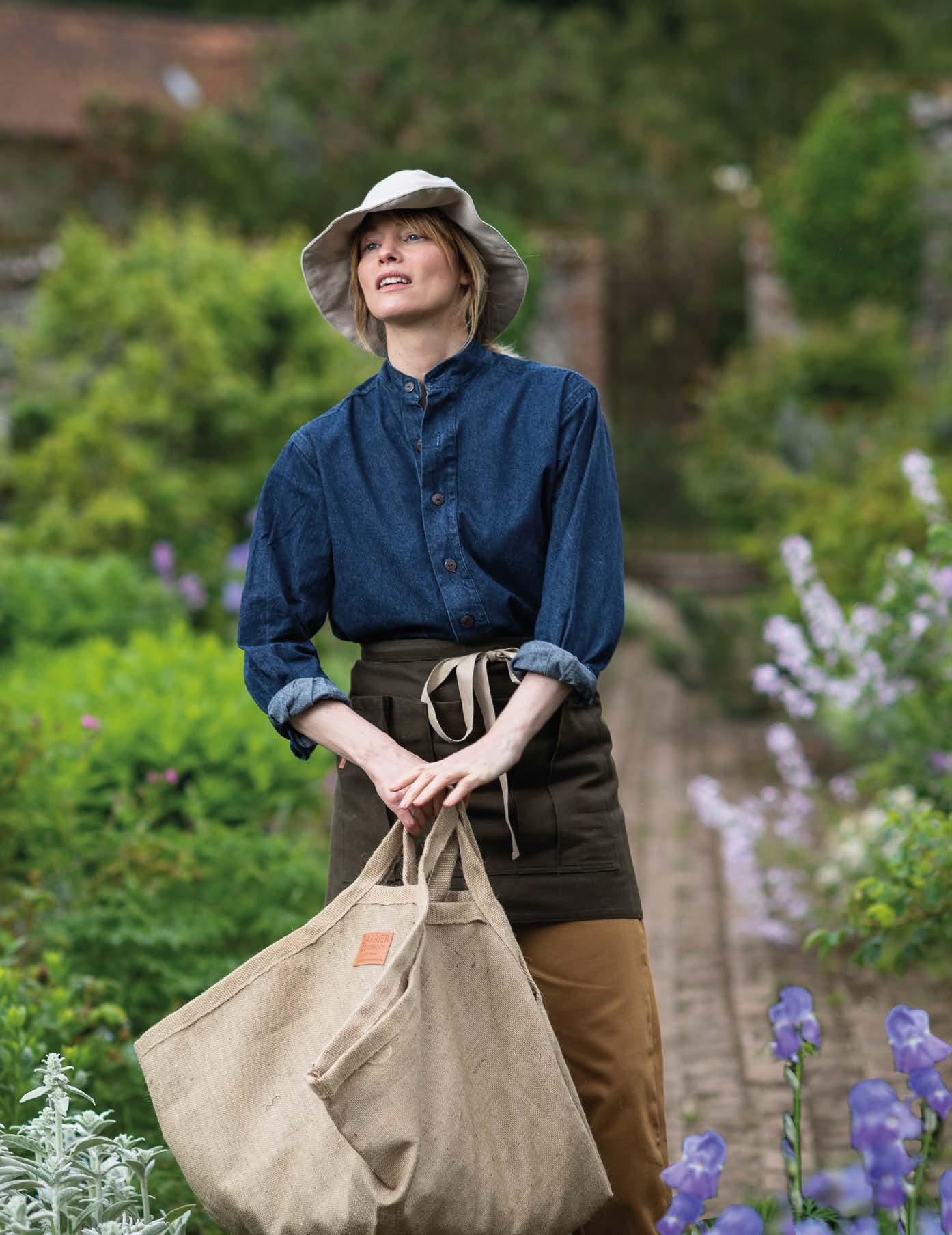
For everyone who loves beautiful gardens
theenglishgarden.co.uk
The Chelsea Magazine Company Ltd, Jubilee House, 2 Jubilee Place, London SW3 3TQ
Tel: 020 7349 3700 Email: theenglishgarden@chelseamagazines.com
Editorial EDITOR Clare Foggett
DEPUTYEDITOR Vivienne Hambly
ARTEDITOR Jeremy Bird
PRODUCTIONEDITOR Vanessa Longworth
EDITORIALANDDIGITALASSISTANT Niamh Collins
Advertising
GROUPSALESDIRECTOR Catherine Chapman
HEADOFSALESOPERATIONS Jodie Green
GROUPACCOUNTDIRECTOR Natasha Scroggs
Tel: 020 7349 3733; natasha.scroggs@chelseamagazines.com
ACCOUNTMANAGER Charlotte Peach
Tel: 020 7349 3711; charlotte.peach@chelseamagazines.com
ADVERTISINGPRODUCTION allpointsmedia
Publishing
MANAGINGDIRECTOR James Dobson
CHIEFFINANCIALOFFICER Vicki Gavin
PUBLISHER Caroline Scott
MARKETINGMANAGER Bret Weekes
Online
GROUPDIGITALMANAGER Ben Iskander
EMAILANDDIGITALCREATIVEMANAGER Jenny Choo
Production
REPROGRAPHICSMANAGER Neil Puttnam
PRINTING William Gibbons Ltd, Willenhall, UK
The English Garden (UK issue) ISSN no 1361-2840. Printed in England.
Manage your print and digital subscriptions online, stay up to date with the latest issues, update your personal details and even renew your subscription with just a click of a button. Sign up at https://www.subscription.co.uk/chelsea/solo/
SUBSCRIPTION ENQUIRIES
01858 438854
EMAIL theenglishgarden@subscription.co.uk
SUBSCRIPTION OFFICE
The English Garden, CDS Global, Sovereign Park, Market Harborough, Leicestershire LE16 9EF, UK. Tel: 01858 438854. Europe and Rest of World: +44 (0)1858 438854.
SUBSCRIPTION RATES UK £80 (13 issues) Europe £90; €116 (13 issues) ROW £100; US $122; AUS $181 (13 issues)
NEWS DISTRIBUTION Seymour Distribution Ltd, 2 East Poultry Avenue, London EC1A 9PT, UK. Tel: +44 (0)20 7429 3667.

GARDENDESIGN TRAININGFOR PROFESSIONALS


Findoutmoreaboutourinspirational designtrainingatRoyalBotanicGardens Kew,RHSGardenWisleyandonline.

Design:DuncanCargill
OurDiplomaandotherprofessional developmentprogrammesaredelivered fromourhomeinRoyalBotanicGardens Kewwithareal-time,onlineoptionfor thosewishingtostudywithusfrom home.In2023wealsohavean expandedshortcourseprogrammefor professionalsandgardenenthusiastsat allourtrainingcentresandonline. Visitourwebsite lcgd.org.uk toseehow ourstudentsarecreatingsuccessful gardendesigncareersanddiscovera coursethatisrightforyou.
The Professional Publishers Association Member

© The Chelsea Magazine Company Ltd 2023, part of the Telegraph Media Group. All rights reserved. Text and pictures are copyright restricted and must not be reproduced without permission of the publishers. The information in The English Garden has been published in good faith and every effort has been made to ensure its accuracy. However, where appropriate, you are advised to check prices, opening times and dates etc before making final arrangements. All liability for loss, disappointment, negligence or damage caused by reliance on the information within this publication is hereby excluded. The opinions expressed by the contributors of The English Garden are not necessarily those of the publisher. www.chelseamagazines.com: publishers of The English Home, Artists & Illustrators, Baby, Little London, Wedding Ideas, BRITAIN, Discover Britain, Cruise International, Independent School
and associated guides, Racecar Engineering,
& Yachting and Popshot.
+44(0)1483762955info@lcgd.org.uk
JULY 2023 THE ENGLISH GARDEN 5
Design:FreyaWilletts
Parent
Classic Boat, Sailing Today, Yachts
CONTENTS







subscription PAGE 145
Gardens
22 Cow Close Amid the wild, sweeping landscape of North Yorkshire’s Nidderdale, William Moore and John Wilson felt a compelling obligation to make their garden complementary to its powerful setting.
33 New House Farm Wishing to respect their garden’s bucolic Somerset location, these owners enlisted Fi Boyle to design a space that exudes vitality and serenity while prioritising an ecological approach.
40 Abbeywood Gardens The gardens of this Cheshire estate burst into life in high summer, when exuberant tropical planting in red-hot colours proves a real hit with visitors.
51 Dreamers Cottage A change of focus in their vintage tool business has let Louise Allen and Piers Newth follow their dream of spending more time in the garden of their aptly named Oxfordshire home.
61 Cheshire Garden Tasked with linking a rather modern and open cottage garden to the surrounding countryside, designer Janine Crimmins has thoughtfully restructured and punctuated the space to create cohesion.
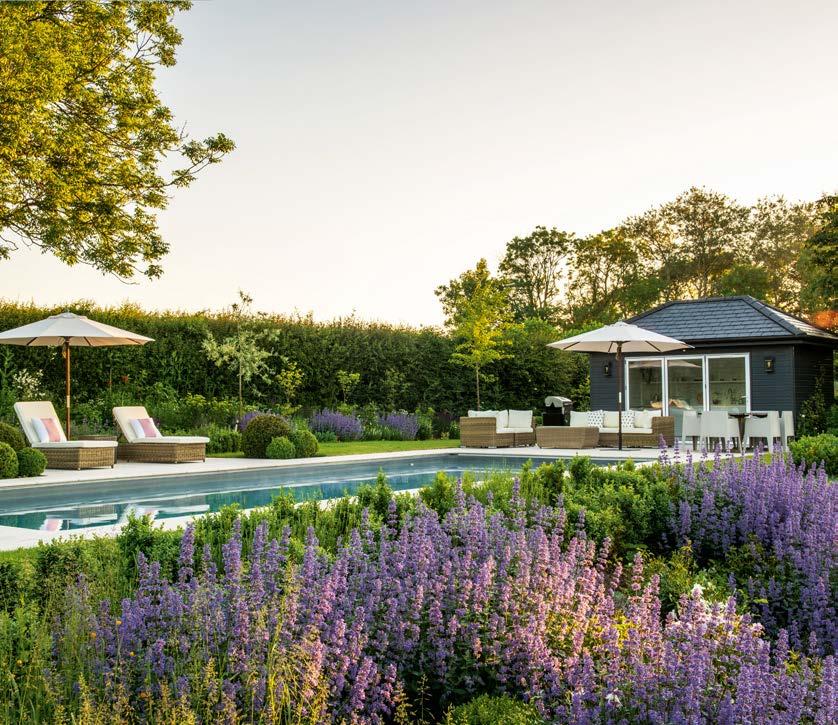
68 La Seigneurie Overlooked by a fairytale tower, these magical gardens on the island of Sark have been developed by generations of a feudal family since Elizabethan times.
Plants

95 Top 10 Plants Ian Limmer of Peter Beales Roses suggests ten favourite climbing roses.


101 Plant Focus Easygoing hardy geraniums are a favourite of Sue Clarke, holder of two Plant Heritage National Collections, who recommends species and varieties to try.

129 Weeds and Weeding Hardy, pretty, floriferous and wildlife-friendly: there’s a case for learning to love our native weeds while keeping them under control in the garden.
Miscellanea


85 Lazy Summer Days Enjoy the fruits of your labour from these comfortable and stylish outdoor lounging options.
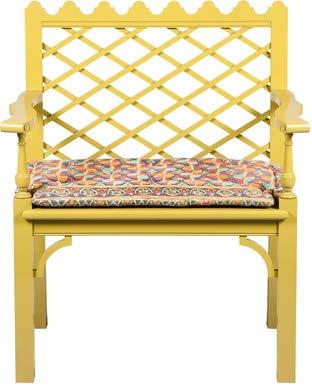
111 Summer Heights Reduce visual monotony with an obelisk or arch left stylishly bare or covered with colourful climbers.



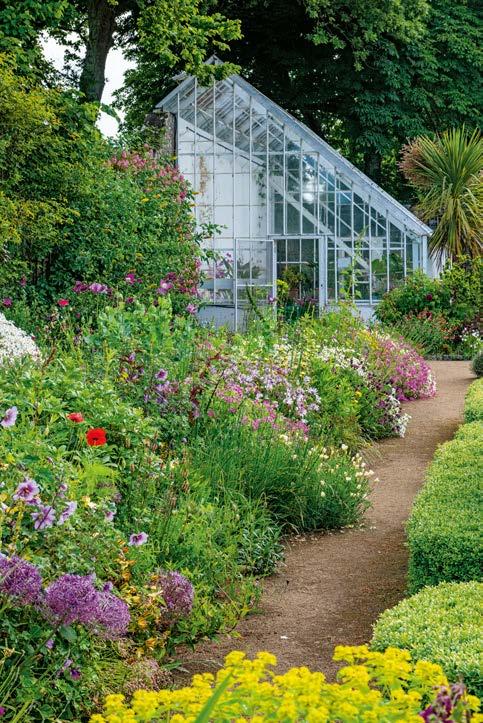
6 THE ENGLISH GARDEN JULY 2023 33 95
July 2023 68 19
117 Kitchen Gardens Create a vegetable plot that’s both pretty and productive.
125 Trade Secrets Take clematis cuttings with Andy Jeanes from Raymond Evison.

135 The Nation’s Favourite Gardens Find out how to nominate a worthy garden this year.


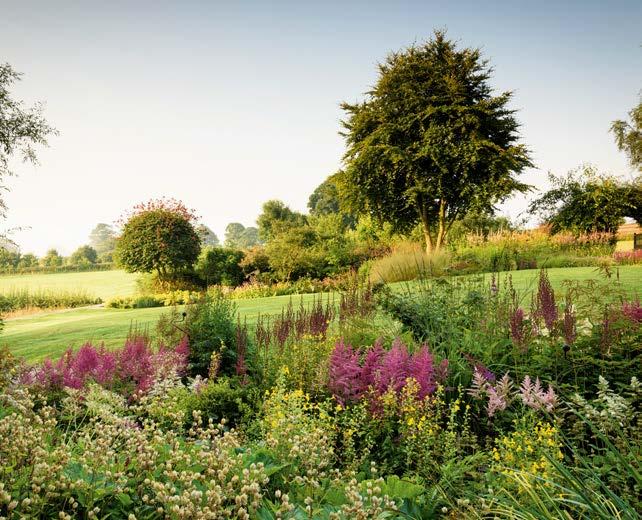
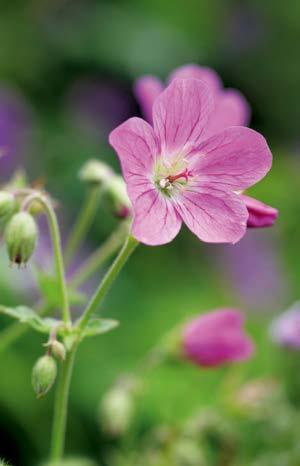






137 Parterres Two very di erent gardens experiment with box-free parterre design.
Regulars
9 This Month Plants, people, news and events, books and beautiful things to buy, plus Jim Cable’s diary.



19 Shopping Everything you need for an elegant meal in the garden under the stars.
146 To Conclude Non Morris recommends fern varieties to enliven any garden situation.









Offers
145 Subscribe & Save Subscribe to The English Garden and save money.





JULY 2023 THE ENGLISH GARDEN 7
GARDEN ORNAMENTS & INTERIOR INSPIRATIONS ORNAMENTI.CO.UK | 01423 400 100
PLANTERS GARDEN FURNITURE FOUNTAINS OBELISKS SUNDIALS BESPOKE
101 22 129
PLANTERS GARDEN FURNITURE FOUNTAINS OBELISKS SUNDIALS BESPOKE
IMAGES HEATHER EDWARDS; NICOLA STOCKEN; GARDEN WORLD IMAGES; CAROLE DRAKE; ANNAÏCK GUITTENY; SHUTTERSTOCK

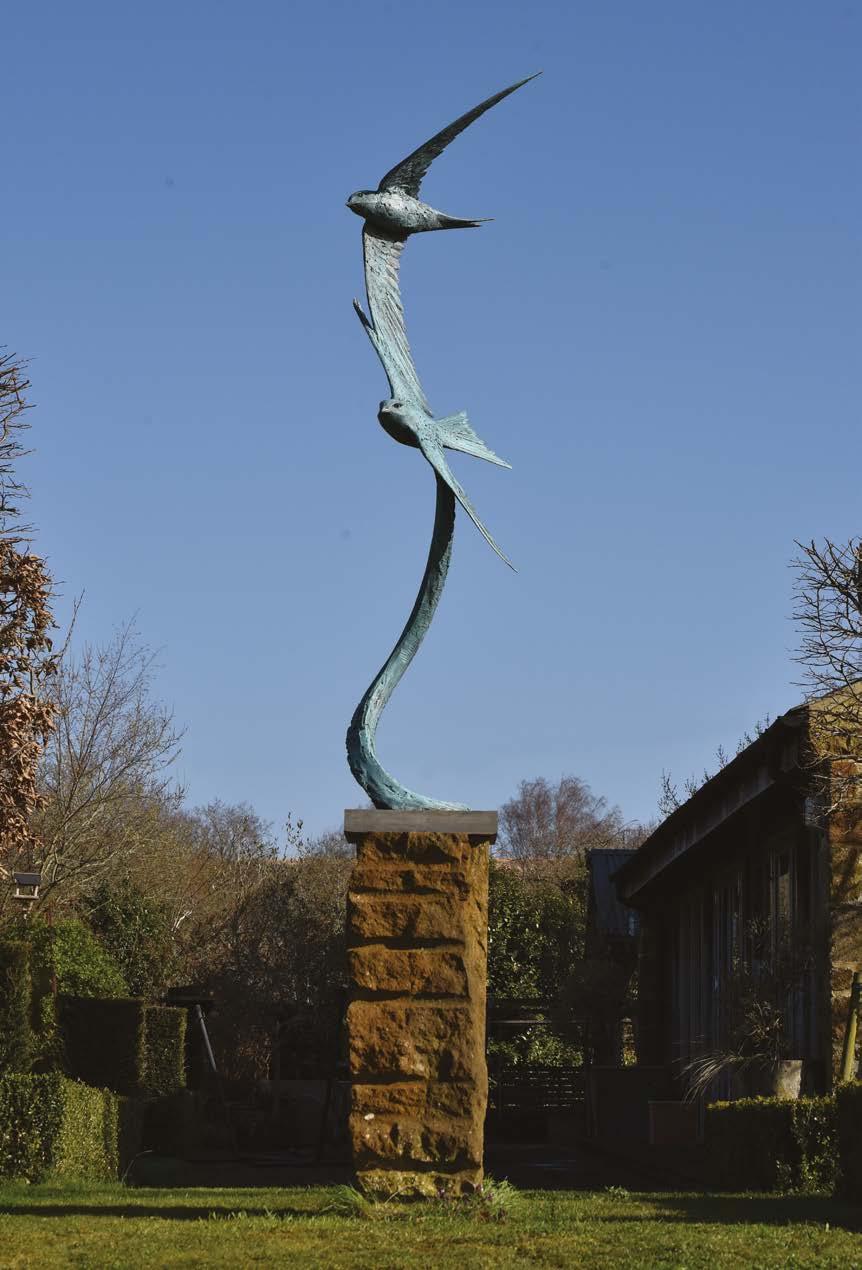



LIFE IN BRONZE HAMISH MACKIE SCULPTURE www.hamishmackie.com • hamish@hamishmackie.com • + 44 (0) 7971 028 098
This Month
Our guide to plants, people, gardens and events, tasks and shopping in July
IN FLOWER NOW
Hemerocallis lilioasphodelus
July is the month when daylilies begin to bloom. Each flower may last for just 24 hours, but they are produced in such profusion over so many weeks that this doesn’t matter at all. If you are yet to fall for these perennials’ charms, the species daylily, Hemerocallis lilioasphodelus could be the
plant to convert you. Its lemon-yellow, lily-shaped flowers are quite small compared to some of the large-flowered hybrids. Combined with its fine grassy leaves, this gives the plants a more dainty, less clumpy feel. What’s more, the flowers are sweetly scented. Try them in a sunny spot.
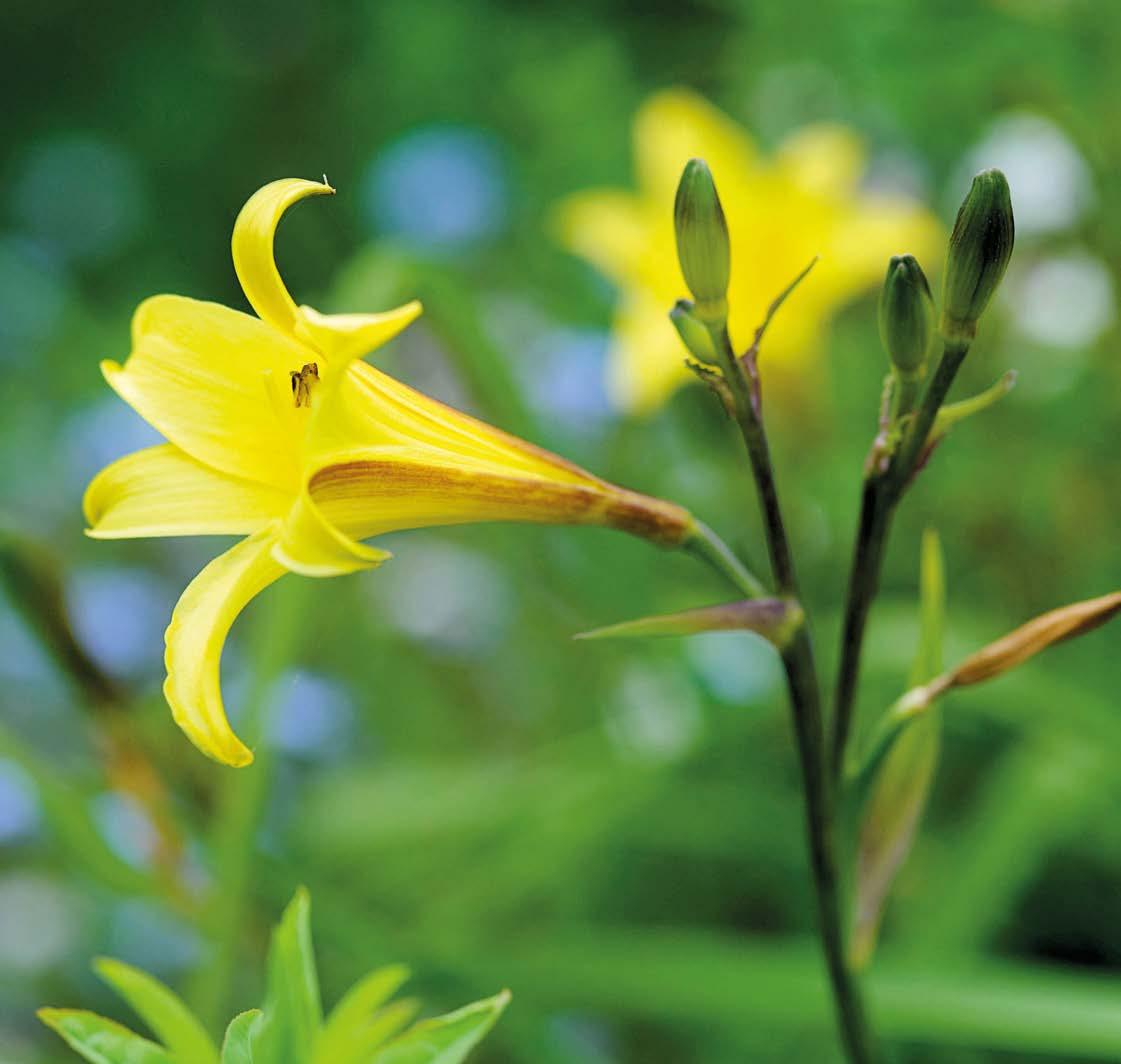
JULY 2023 THE ENGLISH GARDEN 9
IMAGE GAP/HOWARD RICE
People to Meet




Introducing the gardeners and public figures we most admire in British horticulture

epiphany about growing plants that are happy because they’re in the right place. I studied at Kew and then did another scholarship at Jerusalem Botanical Gardens.
I designed Frances Mossman’s garden at Home Farm and had fun working on a grand scale and planting naturalistically. By then I was 23 with my training behind me and the connections and realworld experience Francis had facilitated. I started a mobile gardening business with a number of new clients and put my ideas into practice.
The Tokachi Millennium Forest in Japan has been my benchmark project.
Dan’s favourite gardens to visit
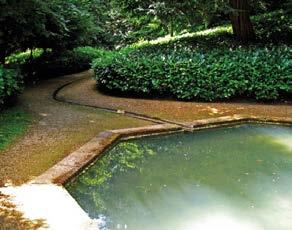
Tokachi Millennium Forest
Hokkaido, Japan
We should encourage people to create Millennium Forests in every country. It’s a tangible idea that gets them thinking about landscape in the long term through a connection with place and horticulture. tmf.jp
Dan Pearson
The visionary garden designer on a career spent working meaningfully to enrich our landscapes and increase biodiversity
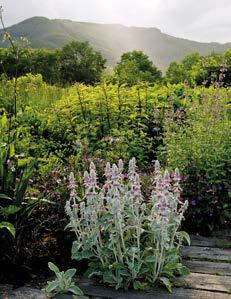
We were a family of makers: my parents taught art and they were always gardening. Mum grew vegetables and my dad was good with colour. They spent a lot of time with us as kids talking about how to get the most out of it. It was never just a hobby, and when I was five we moved down the lane to a house with an acre of overgrown garden, which became my project.
I trained at Wisley, but I didn’t find my tribe until I joined the Royal Botanic Garden Edinburgh. A group of us secured an alpine garden scholarship and went across the Pyrenees and the Picos de Europa in northern Spain to see plants in their natural communities. I saw erythroniums growing on the slopes and astrantia in the woodland, and I had an
Mitsushige Hayashi, a newspaper magnate, bought the land in the 1990s to o set his carbon footprint. It had been deforested and he was rewilding it to redress the balance. In Japan, they connect to the landscape through literature and art, and I learned about the principles of satoyama, which is only taking as much as you need from the land, and living in harmony with the landscape. I have 20 acres at my home in Somerset, and I love the process of enriching it on all levels, especially biodiversity. Every job that comes in is a chance for us to work meaningfully. We want to learn and work on an increasingly large scale to e ect positive change through what we do with the environment.
• Study ‘Naturalistic Design Masterclass’ and ‘An Expert Guide to Planting Design’ with Dan Pearson at createacademy.com
Rousham House and Gardens
Oxfordshire
Rousham has a very strong sense of place and allows you to be somewhere in a wholehearted way. It’s a piece of theatre that changes, articulates and works on so many levels. It’s very cleansing for the mind. rousham.org
10 THE ENGLISH GARDEN JULY 2023
INTERVIEW NIAMH COLLINS IMAGES CREATE ACADEMY; DAN PEARSON; KIICHI NORO
RECOMMENDED
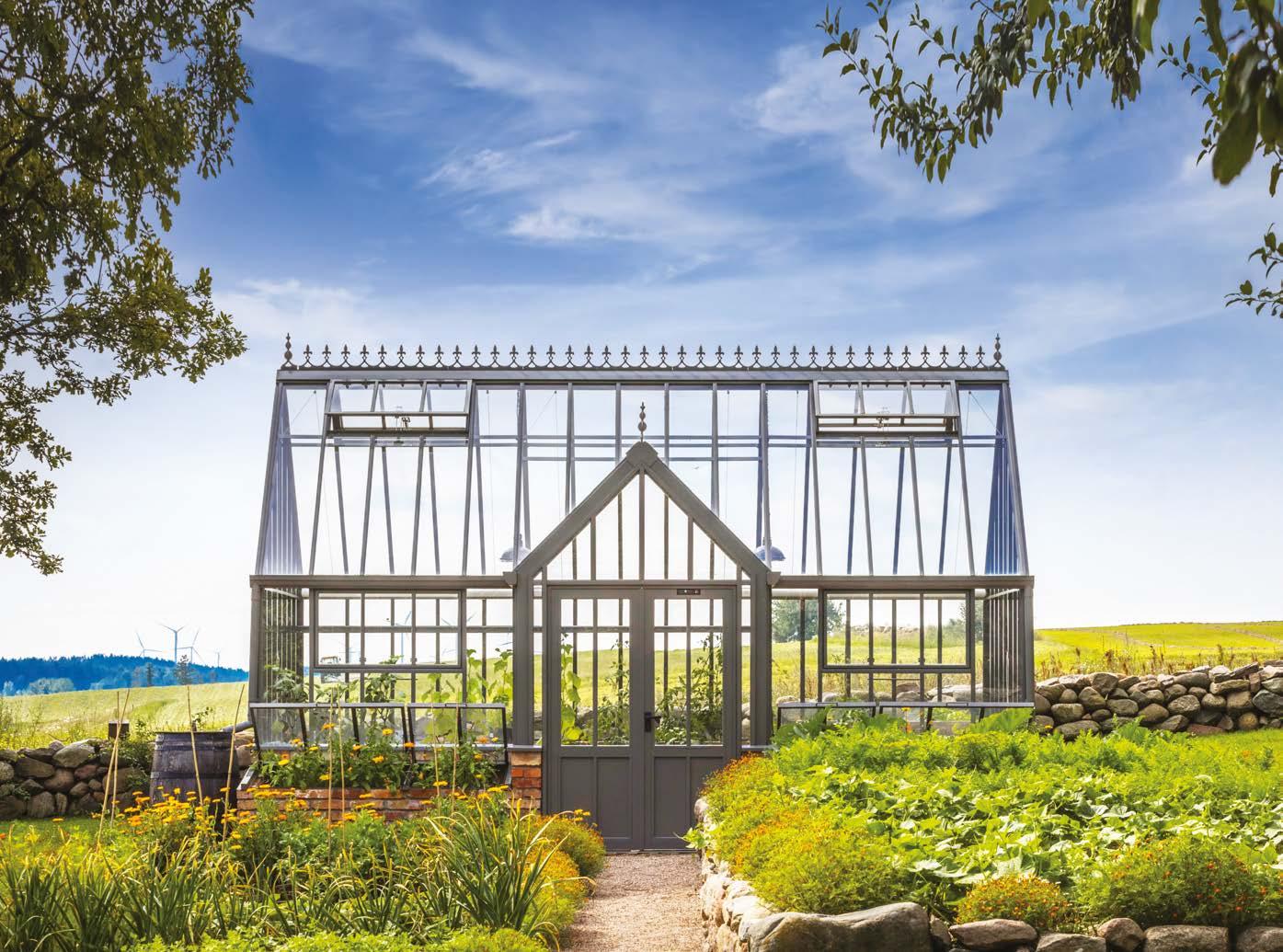

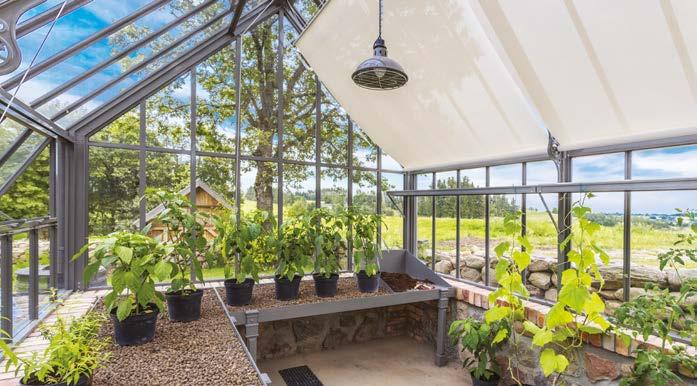

Victorian Lodge | Poland Discover the secret of Hartley Botanic by calling 0800 783 8083 or visit www.hartley-botanic.co.uk The only aluminium Glasshouses and Greenhouses endorsed by the RHS ® The Royal Horticultural Society. Trade marks of The Royal Horticultural Society (Registered Charity No 222879/SC038262) used under licence from RHS Enterprises Limited. NOTHING ELSE IS A HARTLEY Visit us at the RHS Flower Show Tatton Park 19th -23rd July 2023 - Stand No: TP202
Out & About
RHS Hampton Court Palace Garden Festival

4-9 July, London
This year, 15 beautiful ‘Show’ and ‘Get Started’ gardens can be enjoyed by visitors, along with expert talks, demonstrations and workshops. Highlights include a feature garden by Carol Klein, this year’s RHS Iconic Horticultural Hero, whose design o ers six di erent habitats, while Jo Thompson is showcasing the idea of ‘accidental’ landscapes that can be utilised to create green corridors for wildlife in our urban spaces. Adult all-day tickets from £28.85. rhs.org.uk
A Midsummer Night’s Dream
1 July-22 August, East Sussex
A revival of Peter Hall’s lavish 1981 production of A Midsummer Night’s Dream graces the opera stage at this year’s Glyndebourne Festival. It tells the story of four lovers lost in a magical wood on an intoxicating summer night, and Glyndebourne’s own gardens, which can be explored by theatregoers before the curtain rises, o er a similarly enchanting spectacle. A rose garden, lakes, a croquet green and a garden where plants are grown to make natural dyes for the costume department, are highlights, and can be enjoyed with a picnic. Tickets from £146. glyndebourne.com
Chorley Flower Show
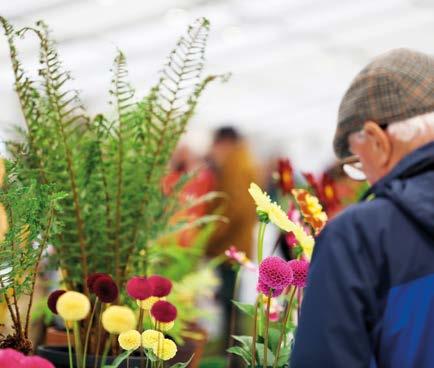
28-30 July, Lancashire
Now in its eighth year, the ‘Chelsea of the North’ is back with a packed weekend of events. A professional exhibitors’ marquee will showcase gold-medal winning entrants from some of the country’s biggest shows, there will be trade stalls to browse, celebrity gardeners o ering expert advice and regional competitions hosted by the National Sweet Pea Society and Begonia Society. Music and picnics can be enjoyed in the parkland of Astley Hall. Adult: £20. chorleyflowershow.com
NGS Garden
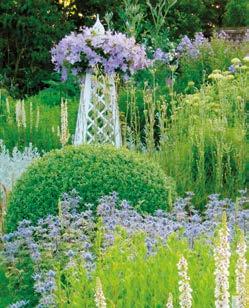
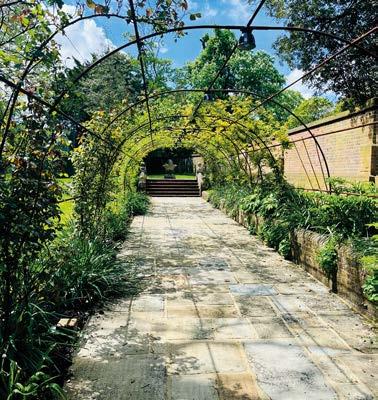
Old Bladbean Stud Kent
These gardens were created by the garden owner on three acres of grassland between 2003 and 2011. They include a walled garden with over 90 old fashioned rose varieties, a yellow and white garden, a square garden with a tapestry of perennials and a Victorian greenhouse. Old Bladbean Stud, Bladbean, Canterbury, Kent CT4 6NA. Opens Sunday 9 July and Sunday 23 July, 2-6pm. Admission: Adults £6, children free.
12 THE ENGLISH GARDEN JULY 2023
WORDS NIAMH COLLINS IMAGES KIRILL TS; JOYCE NELSON
Unmissable events, news and the very best gardens to visit this month

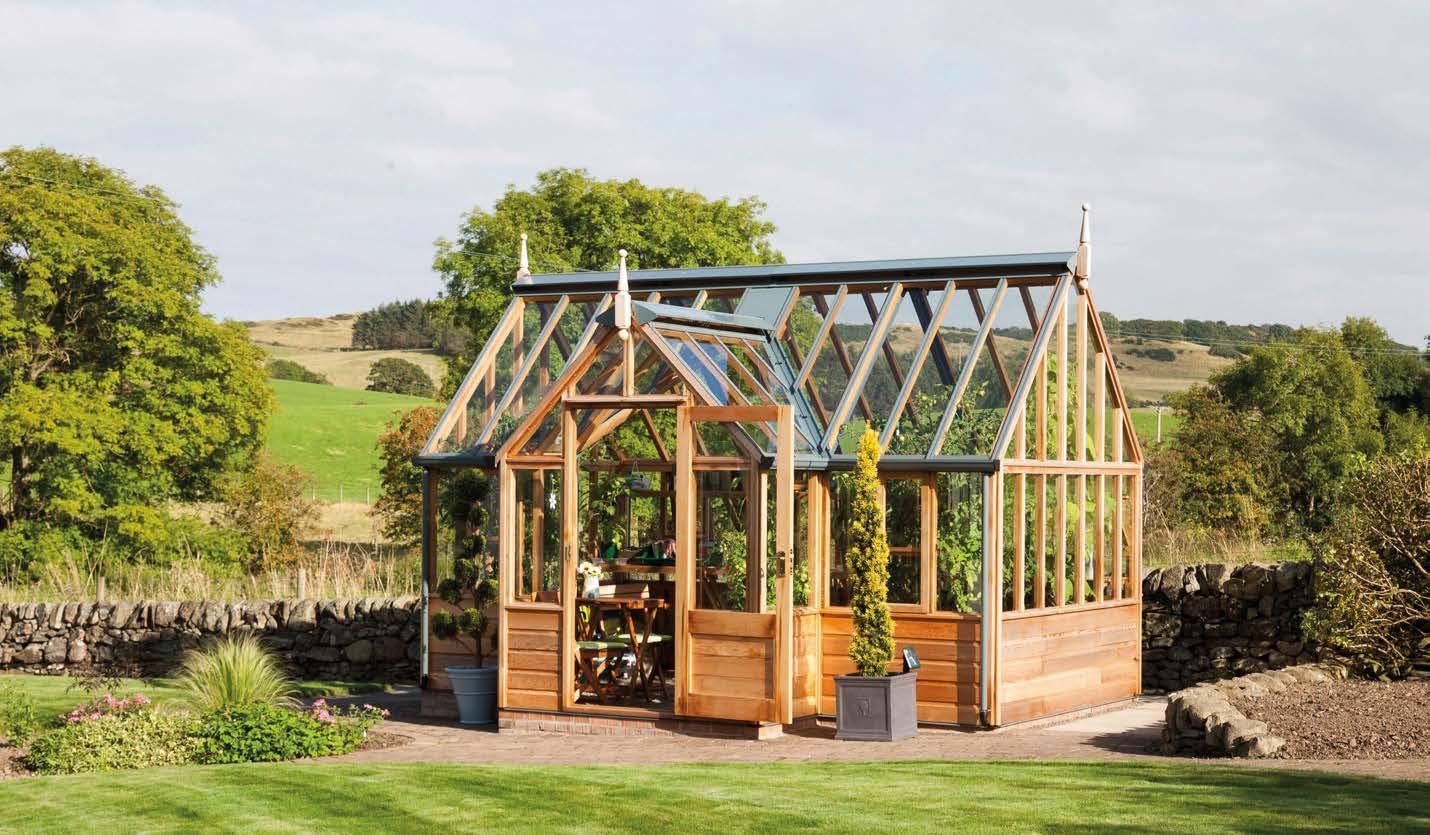




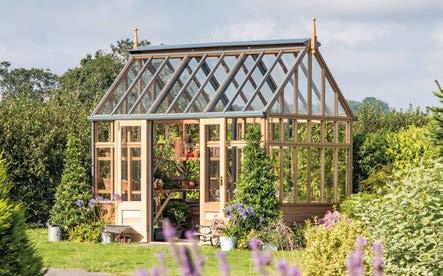
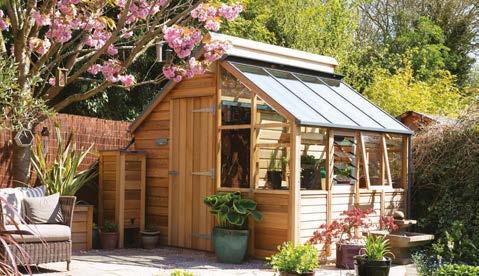
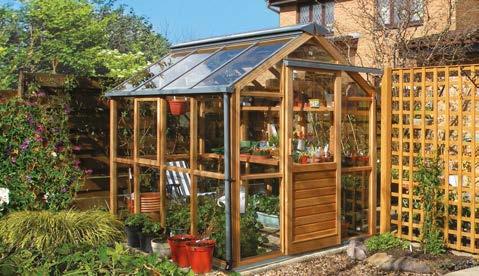



If you love your garden, you’ll know it takes time and care to create something truly wonderful. That’s why we put our faith in traditional joinery techniques such as mortise and tenon joints to give our greenhouses strength and integrity. Using only the highest quality Western Red Cedar. Handcrafted in our Cotswold workshops. No wonder Gabriel Ash are the only timber greenhouses endorsed by the Royal Horticultural Society (RHS). For a Free Brochure call 01242 662 926 or visit gabrielash.com The Classic Freestanding Greenhouses are now available to buy online. Our Coldframes and Accessories are also available online. See us at the RHS Hampton Court Palace Garden Festival (3rd – 9th July) and the RHS Flower Show Tatton Park (19th – 23rd July). ®The Royal Horticultural Society. The Royal Horticultural Society, and its logo, are trade marks of The Royal Horticultural Society. (Registered Charity No. 222879/SC038262) and used under licence from RHS Enterprises Limited. in the Made wi Pride Co wolds The RHS Portico The Classic Six The RHS Hyde Hall Planthouse The Classic Grow & Store May 2023
Jim’s Garden Diary




This month, Jim Cable adds accent plants to the flower garden, harvests earlysummer crops, divides bearded irises and tidies up tired perennials and shrubs


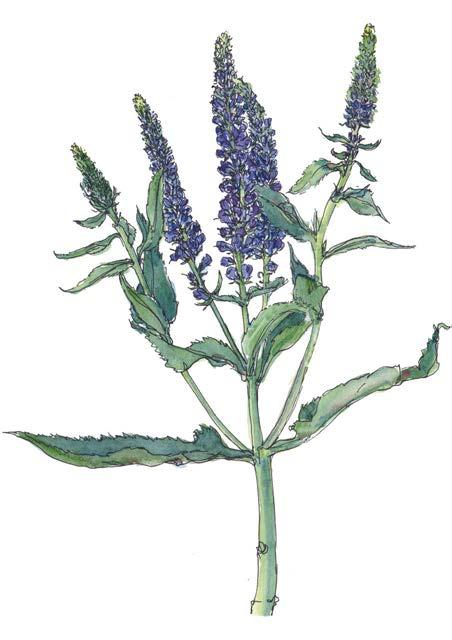
The Deanery garden is reaching peak abundance. Amid the hazy froth of plants, I appreciate the ‘vertical accents’ as designers like to call spike-shaped blooms. They serve to punctuate the borders and break up the mounds. By giving the eye somewhere to rest, they slow down our visual assessment of a garden and thereby increase our pleasure in it. Hollyhocks and acanthus are classic examples of this. I grow Veronica longifolia ‘Marietta’, which is smaller in scale with densely packed purple spires, and Verbascum blattaria f. albiflorum – a biennial that self-seeds. My plant of the moment is Sanguisorba hakusanensis ‘Lilac Squirrel’, not quite a ‘vertical’, since the flowering ‘tails’ that inspired the wonderful cultivar name are somewhat droopy. It is defi nitely an accent plant though by virtue of its flowers’ cerise-pink hue.
Harvesting from the garden has begun with the fi rst courgettes. I no longer fear a glut since I equipped my kitchen with a spiraliser that devours them and churns out a vegetable spaghetti, healthier and, to me, tastier than the real deal. I savour the fi rst broad beans picked whole, blanched and served with butter and a light sprinkling of fi nely chopped thyme.
It is time to stop pulling rhubarb so the plants can build up strength for next year, but the red and blackcurrants are ready to pick. Time for the fi rst summer pudding of the year, which marks the return of al fresco meals. The outdoor dining table resembles an exhibition bench laden with sweet peas. They will keep on coming if I water daily through dry spells and obsessively cut or deadhead the blooms before pods form.
Another job is to divide and replant our bearded irises. I grow ‘Carnival Time’ for its rusty tones, and pale blue ‘Aigue Marine’. The contrast between the two is striking, but the show is over for another year. I lift each clump of rhizomes with a fork and use a knife to slice out the central ones which look tired and shrivelled. These are discarded and the plump stock replanted on a slight ridge. The rhizomes need a good baking in the summer sun so must not be buried. A very thin covering of soil
that will soon wash away is acceptable. If there is insu cient root to anchor the sections, I use a U-shape of sti wire as a staple, pushing it into the soil over a rhizome. Cutting the leaves back into a fishtail also helps by reducing wind rock. Finally, I give the replants a good water.
Other early-summer performers that benefit from attention now include Alchemilla mollis, a useful groundcover for shade. When the foamy lime green flowers and pleated leaves are beginning to look tatty I cut the whole plant right back. Fresh new foliage soon appears if the ground is kept moist. Aquilegias get the same treatment along with any hardy geraniums that are looking scru y.
I also tackle the deciduous shrubs that have recently fi nished flowering; plants such as deutzia, philadelphus, weigela, kolkwitzia and kerria. I aim to remove around one stem in three, targeting the oldest and weakest fi rst and keeping the bush well-furnished and balanced. It helps to keep standing back from the plant to assess its shape from all angles. Pruning encourages vigorous new shoots from the base of the plant that will flower next year. The common butterfly bush, Buddleja davidii does not belong in this pruning category. I cut that back to the ground in March. However, there are a couple of lesser-known but gardenworthy buddlejas that do. B. alternifolia can become a small tree of around 7m tall. It stands out in June with its cascade of branches bearing lilac-coloured flowers. Buddleja globosa is sometimes called the golfball bush. The name alludes to the orange-yellow flowers that form tight balls clustering at the tips of arched stems. It forms a semi-evergreen shrub to 4m in height with crinkled, dark green, lance-shaped leaves. Both are useful for fi lling large gaps in borders quickly. n
14 THE ENGLISH GARDEN JULY 2023
ILLUSTRATIONS EMMA LEYFIELD
Amid the hazy froth of plants, I appreciate the ‘vertical accents’ as designers like to call spikeshaped blooms
Annual labelling is a thing of the past with Alitags. Simply write on Alitags aluminium labels with Alitags or HB pencil. The pencil will react with our specially made aluminium tags and become permanent.

Alitags labels can also be punched with Alitag character punches & jig.
Copper, Teak, Bamboo tags and Numbered tags are also available.



Hadham, Herts SG10 6ER. Tel 01279 842685 www.alitags.com



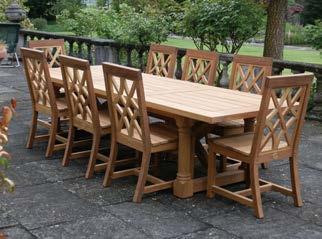

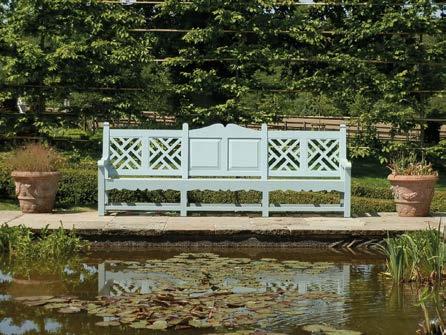
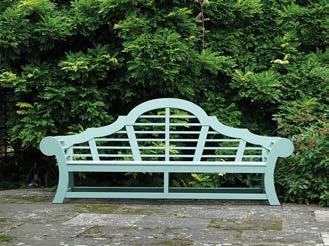


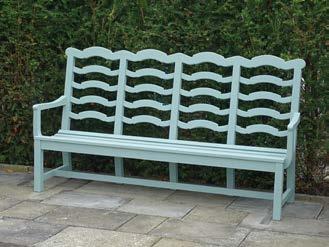





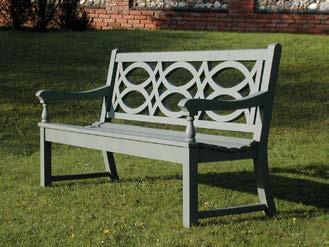
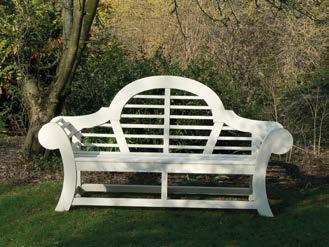
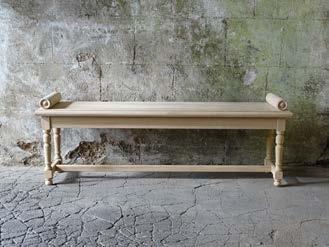

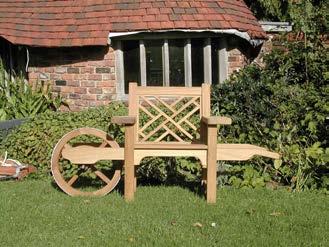
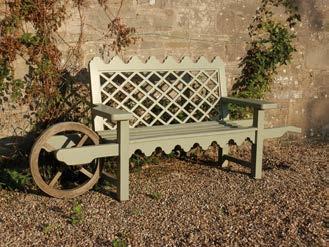




www.andrewcrace.com TEL (UK) 01279 842685
High Quality Garden Furniture. Made in England.
SOAK AWAY THE DAY IN STYLE
Devon-based family company Riviera Hot Tubs is known for providing unparalleled quality, from the premium materials, to the passion and service you’ll experience from their team
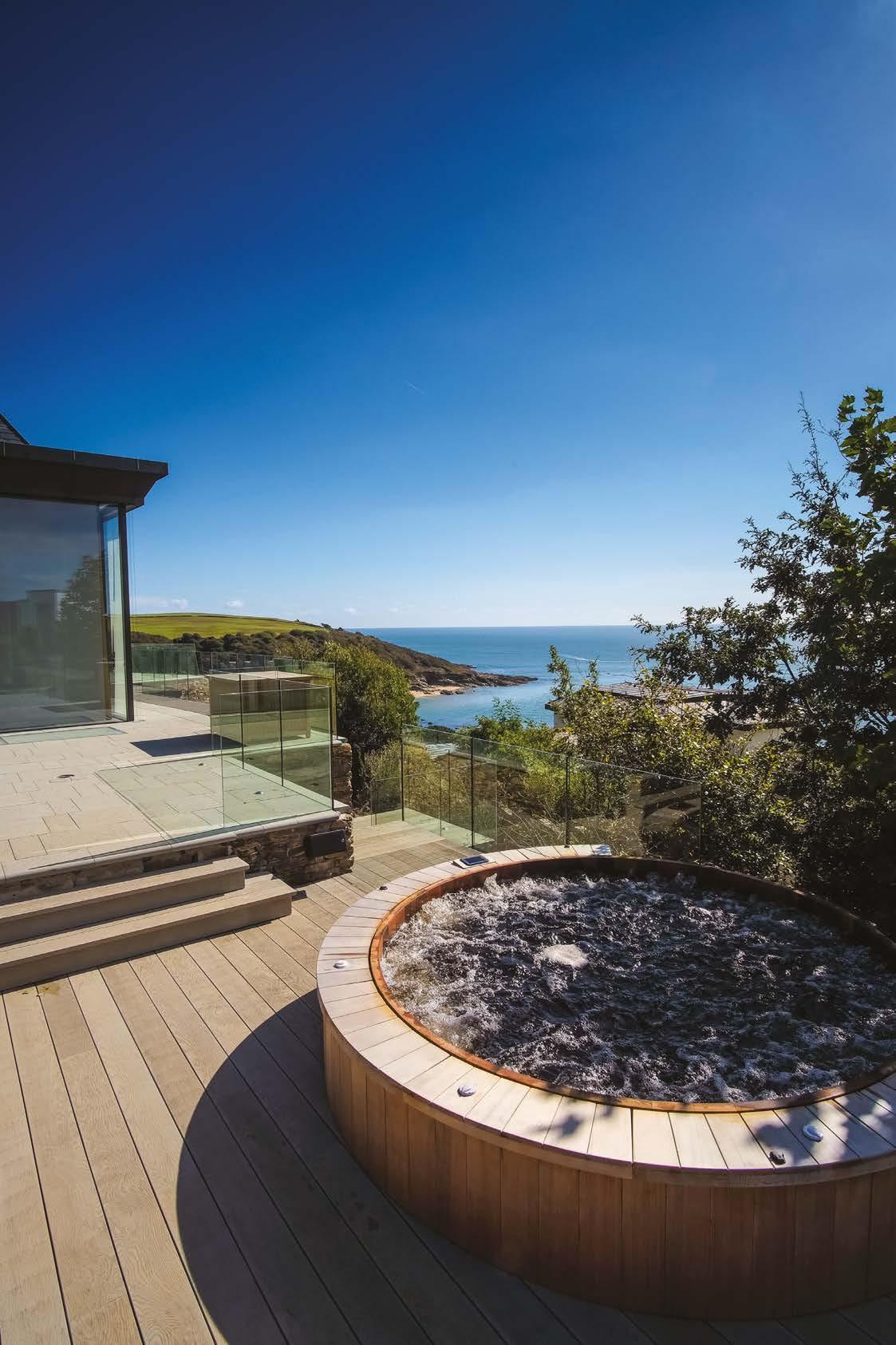
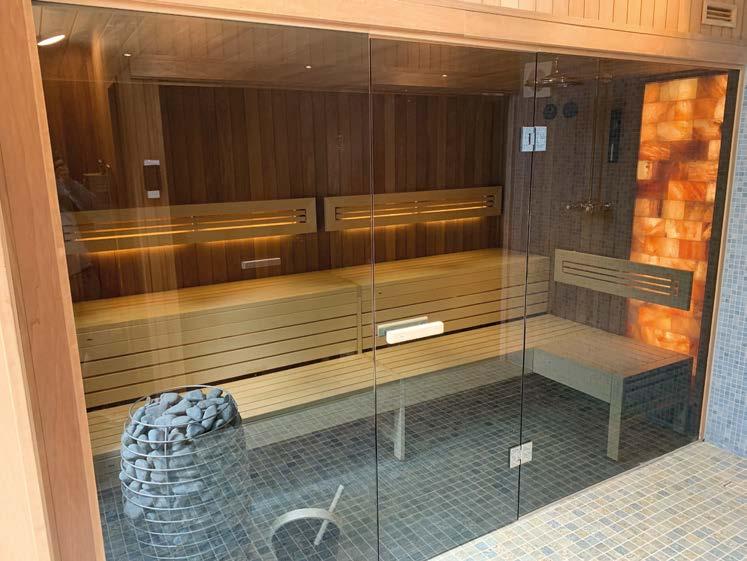
Rhot tubs for 20 years. Every client is catered for individually with the company’s bespoke service, and no product comes straight o a shelf. Riviera’s barrels are built to seat from two to sixteen people, using economical air source heating systems. New for 2023 are the company’s wood-fired hot tubs, heated by 55kW-output wood burning stoves, which are manufactured in Kent using stainless steel and copper.
Each year Riviera continue to move away from plastic parts with the end goal of providing a system using only natural materials. Also newly introduced this year are new marine grade stainless
steel jet massage zones. These are subtle to the eye but provide an unparalleled hydrotherapy experience.
Riviera have also become a leader in recovery equipment for professional athletes. The company can manufacture bespoke cold therapy systems to suit the individual or look to the standard oval cold therapy tubs.
Cedar Wood Hot Tubs
In this world of plastics and synthetics, it’s refreshing to find something made of wood. Riviera’s traditional hot tubs are classic in their design and simplicity.
Made
chosen for its clear grain, long-term stability and natural resistance to decay, these hot tubs have both an aesthetic and tactile quality, which results in a truly unique bathing experience.
Natural wooden tubs are a pleasure to use and a beautiful addition to any garden landscape, be they freestanding or built into new or existing patios or timber decking. In an increasingly hectic and stressful world, a tub o ers a peaceful and soothing refuge any time of the year in the privacy of your garden.
The craftsmanship of Riviera’s tubs simply can’t be found in mass-produced plastic spas, and the touch, feel and smell of beautiful cedar wood is unparalleled.
PROMOTION 16 THE ENGLISH GARDEN JULY 2023
Above Riviera hot tubs can be recessed or free-standing, and the new wood-fired models don’t need access to electricity.
from Canadian kiln-dried cedar,
PARTNER FEATURE
Hydrotherapy

The benefits of hydrotherapy have been known for thousands of years. Ancient civilisations enjoyed bathing in hot water springs and hydrotherapy was born. There are three factors at work in a hot tub – heat, buoyancy and massage – and combined they create a perfect environment that can be used to help treat a number of ailments from arthritis to minor sports injuries. Immersing
Clockwise from top left Riviera’s Cedar hot tubs are controlled at the touch of a button; experience the benefits of a hot tub in a beautiful garden setting; Riviera also design bespoke sauna and steam rooms.

yourself in hot water raises the body’s temperature and causes blood vessels to dilate, which results in increased circulation and endorphins, the body’s natural painkillers. It can also help reduce blood pressure and high sugar levels.
Riviera’s hot tubs are also deeper than conventional acrylic types, making you more buoyant. Step in and you lose over half your body weight, relieving pressure on joints and muscles and creating a relaxing sensation you can’t get in a normal bath.

Pure Pleasure
The massaging action in the water is created from the bubble bench and jets positioned in the tub, which send a mixture of warm water and air through to the jet nozzles. These gently massage away all the aches and pains caused by the daily stresses of today’s fast pace of life. Simply soaking in a hot, swirling tub will leave you mentally and physically relaxed. Twenty minutes in the morning can give you a fresh start and a long soak before bed can help improve sleep.
Rejuvenating Saunas
Riviera don’t just supply their own British-made hot tubs, but also design and build bespoke sauna and steam rooms. Mixing the sauna and steam experience with a cold plunge or bathing in one of their hot tubs will give a true wellness experience. Riviera also build repair rooms for professional athletes using the same mix of experiences: relax, recover, and repair.
Used on a regular basis, a sauna has many benefits. Saunas detoxify, cleanse and rejuvenate your body and skin through perspiration. They stimulate respiration and circulation, relax tired and aching muscles and the dry heat of the sauna also relieves congestion.

Relaxation time is such an important commodity and having a sauna or hot tub will provide you with somewhere to destress and unwind day or night. They can also be used as a place to spend quality time with friends and family. Contact Riviera to discuss the options for your bespoke steam or infrared sauna.
For more information, tel: 01626 367037 or visit riviera-hottubs.co.uk

JULY 2023 THE ENGLISH GARDEN 17
Beautiful & Useful
New plants, books, tools and creative designs, plus shopping inspiration
Green Revolution


If you like the idea of leaving grass to grow longer but don’t want to give up your lawn entirely, Husqvarna has come up with a novel idea – a robotic lawn mower with a builtin rewilding mode. Limited to specific Automower models, rewilding mode uses satellites to determine the size of your lawn and lets you set and position a percentage to leave uncut: the company suggests 10 per cent as a starting point. Husqvarna points to ONS figures indicating that 520,000ha of residential garden exist in the UK. If 10 per cent of that figure was left uncut, an area a little less the size of the New Forest (56,600ha) would provide additional habitat. From £1,899. husqvarna.com

Chalk It Up
For paint you can apply without hours of prep, Annie Sloan’s Chalk Paint has earned a solid reputation. Launched at RHS Chelsea, Capability Green is a new on-trend neutral. “I’ve taken inspiration from the 18th century, when English country style and English country homes came into their own. Gentle and soothing to the eye, Capability Green works well with most other colours in the palette,” says Annie. Use Chalk Paint on exterior surfaces with a top coat of Chalk Paint Lacquer. From £7.95 for 120ml. anniesloan.co.uk

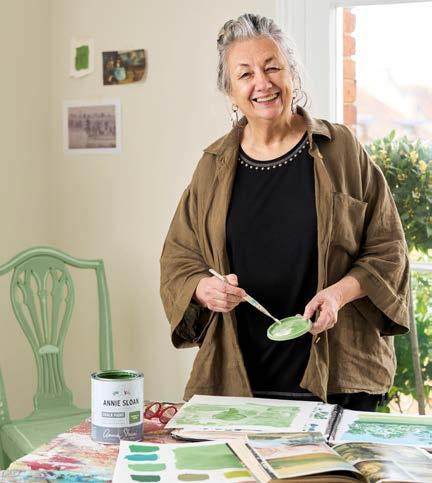
Grasses

Gardens
for
and
Landscapes by Neil Lucas Timber Press, £40 Feathery, bold, textural or groundcovering: if ornamental grasses – and their names – still feel a bit unfamiliar, take heart.
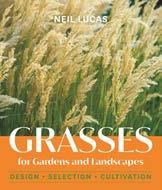
Neil Lucas, owner of specialist nursery Knoll Gardens, o ers a compendium of them here. With advice on planting palettes for di erent sites, suggestions for container growing, and a directory of suppliers, this is an essential handbook.
The Hidden
Company
That Trees Keep by James B. Nardi Princeton University Press, £25 As huge organisms with a vast surface area, trees host a great range of ecosystems, from those we can see with the naked eye, to less visible networks that are as essential as they are di cult to know. This title from research scientist James B. Nardi is ideal for naturalists and examines these relationships in an insightful way.

The Biodiversity Gardener by Paul Sterry Princeton University Press, £25
Paul Sterry has been writing about and photographing wildlife for over 20 years. For the past ten he’s nurtured his half-acre Hampshire garden into an island of biodiversity. This title draws on that experience and the result is an informed, practical guide to unlocking the biological potential of your garden. It’s a superb book every self-respecting gardener should possess.

18 THE ENGLISH GARDEN JULY 2023
IMAGES JESSE WILD WORDS VIVIENNE HAMBLY
Dining Out
Long evenings perfumed with the scent of sweet peas and chilled white wine to sip; the summer garden is a haven to celebrate, whether you’re hosting a joyous barbecue with friends or an intimate dinner to watch the sky turn pink with the setting sun. A floral tablecloth is a lovely canvas for meaningful events. Spring Garland tablecloth, from £65. Tel: 07377 084269; sarahk.co.uk
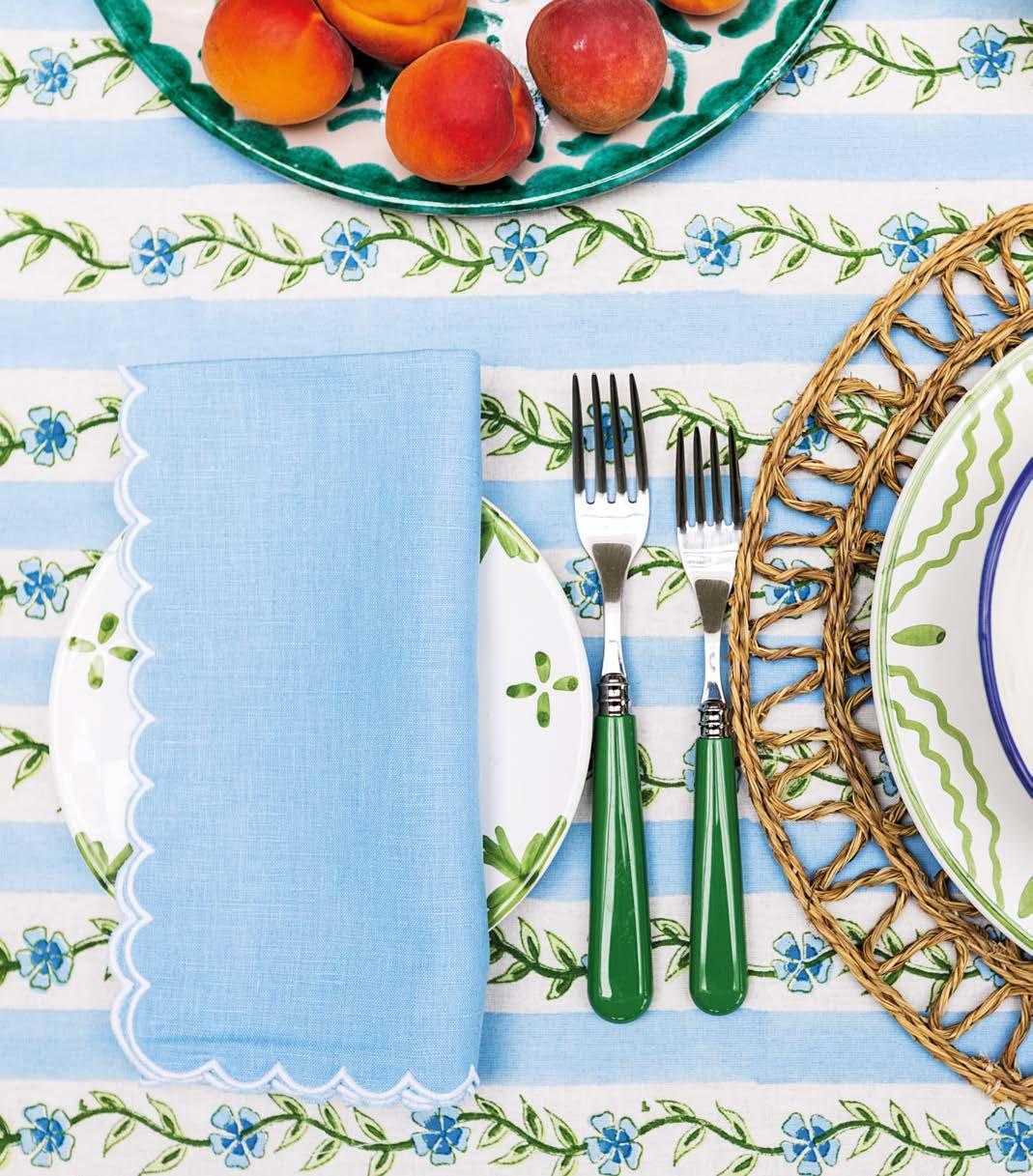
JULY 2023 THE ENGLISH GARDEN 19 WORDS NIAMH COLLINS. ALL PRICES ARE CORRECT AT THE TIME OF GOING TO PRESS.
Allotment vegetable napkin gift set, £45. Tel: 01603 927552; lottieday.com

Lexham terracotta round bamboo parasol, £399. eastlondonparasols.com
















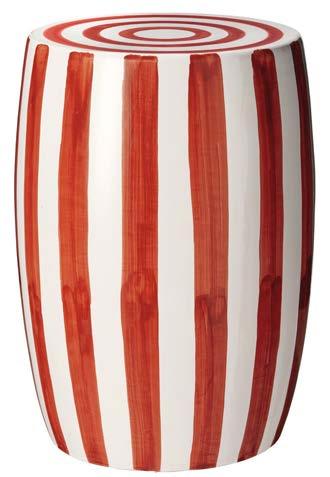
Lattice
Tel: 020 7518 8571; sibylcolefax.co.uk
,
Bolet Rude &






Orange
, $150. Tel: +1-800-6773207; johnderian.com



Large rattan flask, £74. Tel: velvetvictoria home.co.uk


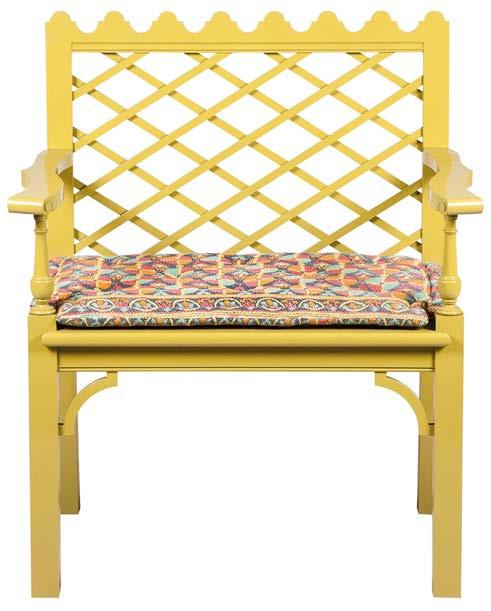
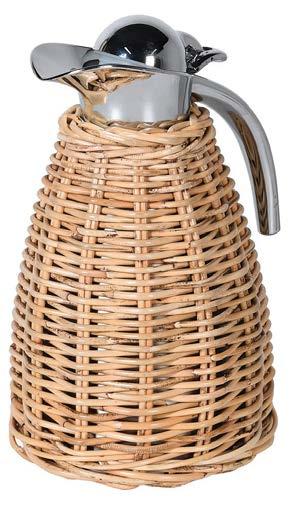
20 THE ENGLISH GARDEN JULY 2023
Bamboo cutlery set (5 piece), £92. mrsalice.com
Farren indoor/outdoor cushion, £68. anthropologie.com
Rander ceramic stool, £225. Tel: 0333 0042042; oka.com
Bombay highball glass in honey, from £12. anthropologie.com
Yellow pagoda lantern set, £264. mrsalice.com
Bolet
dinner plate
back garden armchair
£7,782.


















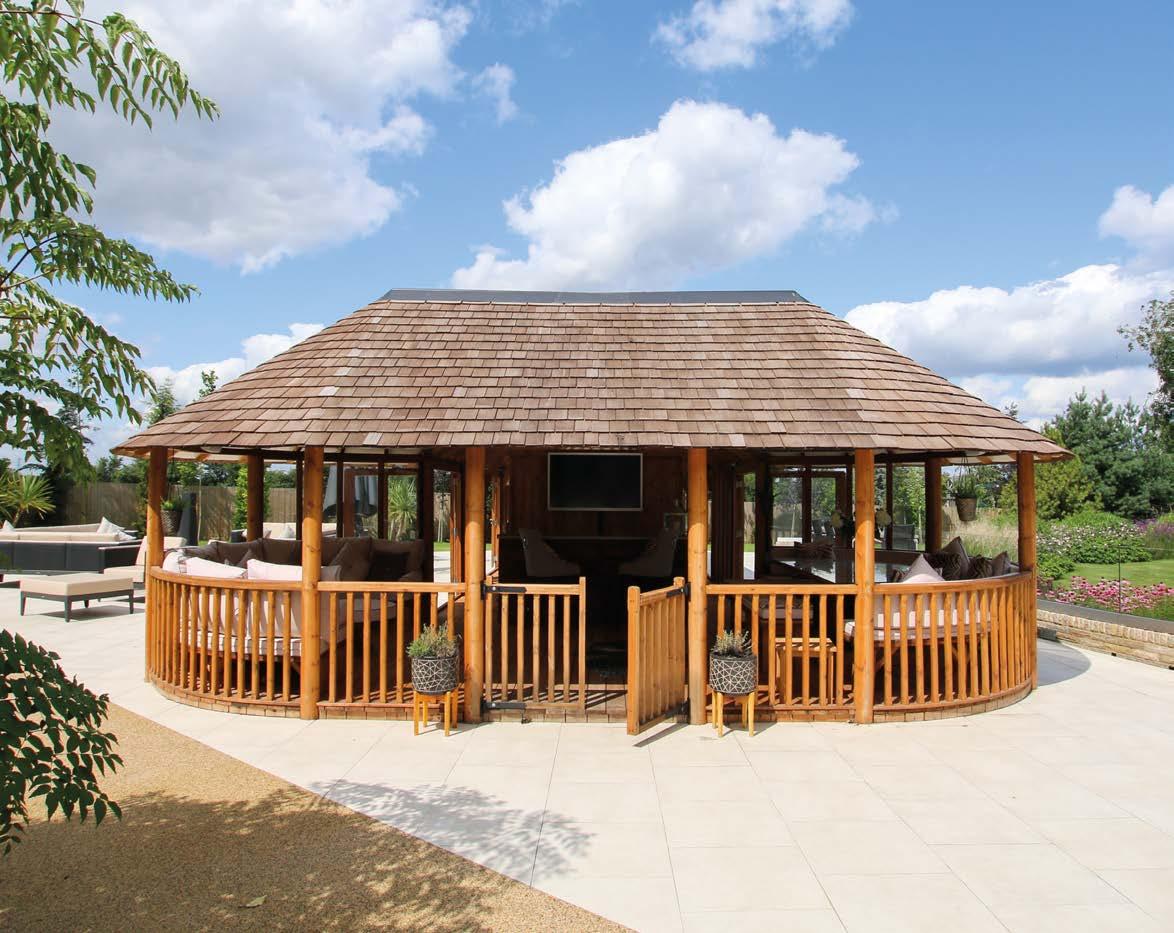
The Call OF DUTY









Amid the wild, sweeping landscape of North Yorkshire’s Nidderdale, William Moore and John Wilson felt a compelling obligation to make their garden at Cow Close as complementary as possible to its powerful setting
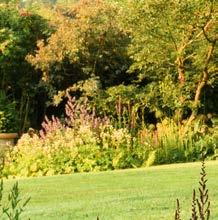
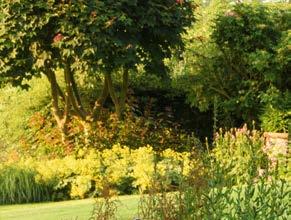

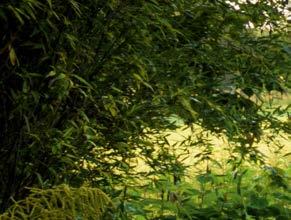




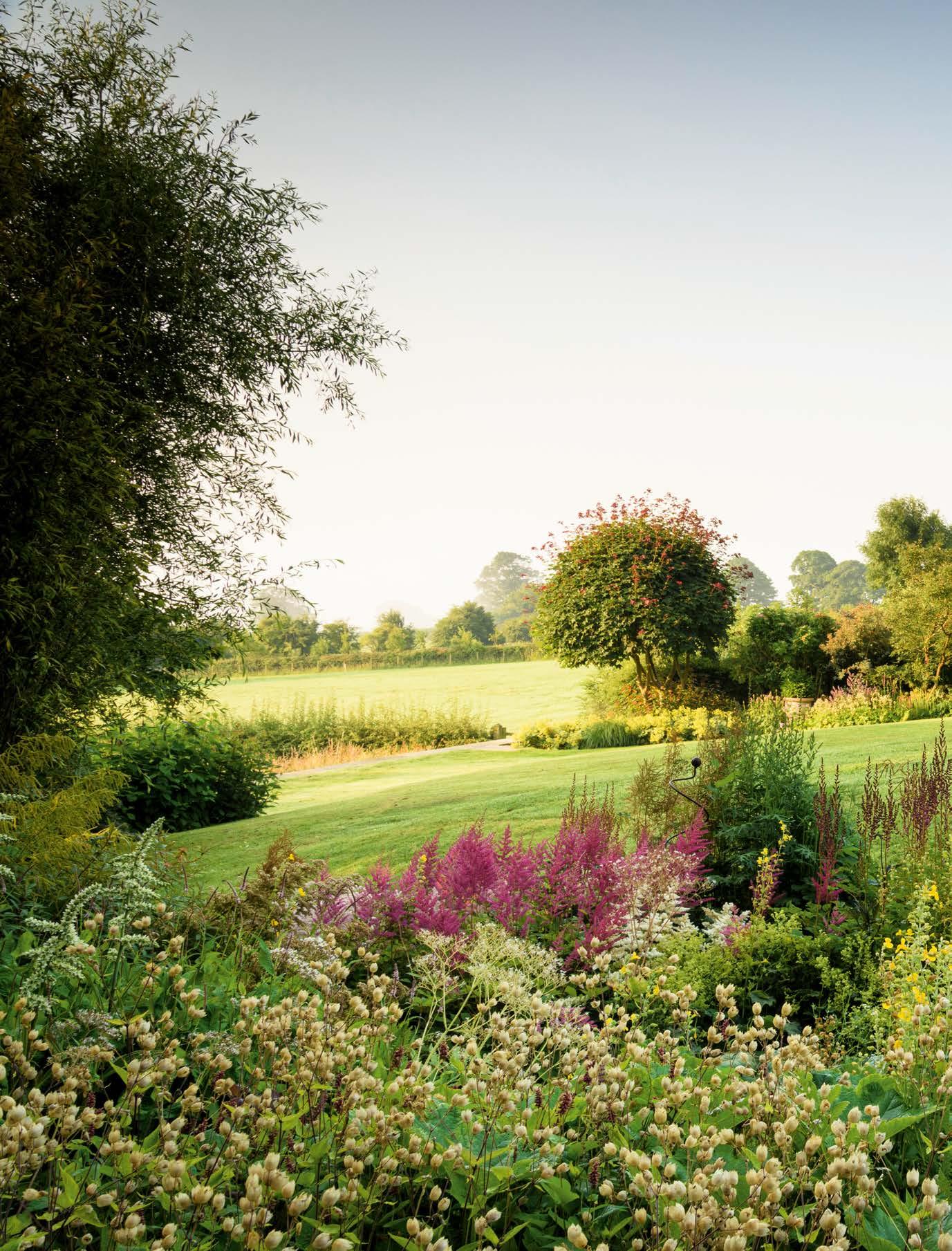
WORDS AND PHOTOGRAPHS CAROLE DRAKE







A stream runs through Cow Close, with astilbes, mimulus, ferns and other moisture-loving plants lining its banks.

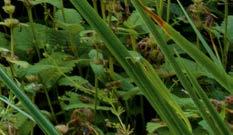



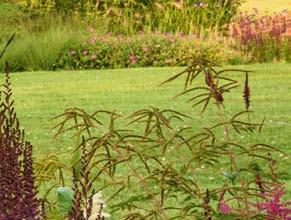
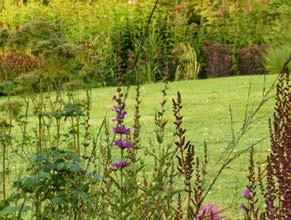
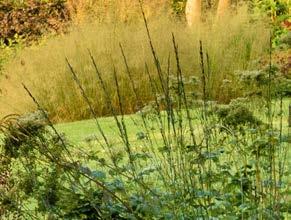

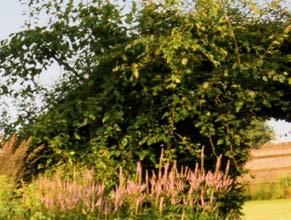



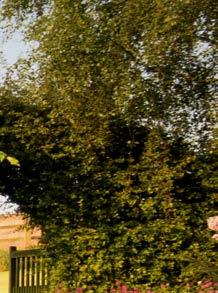















JULY 2023 THE ENGLISH GARDEN 23
Above The dusky pink and purple colour scheme includes plants such as Salvia nemorosa ‘Ostfriesland’ with silky grass Hordeum jubatum

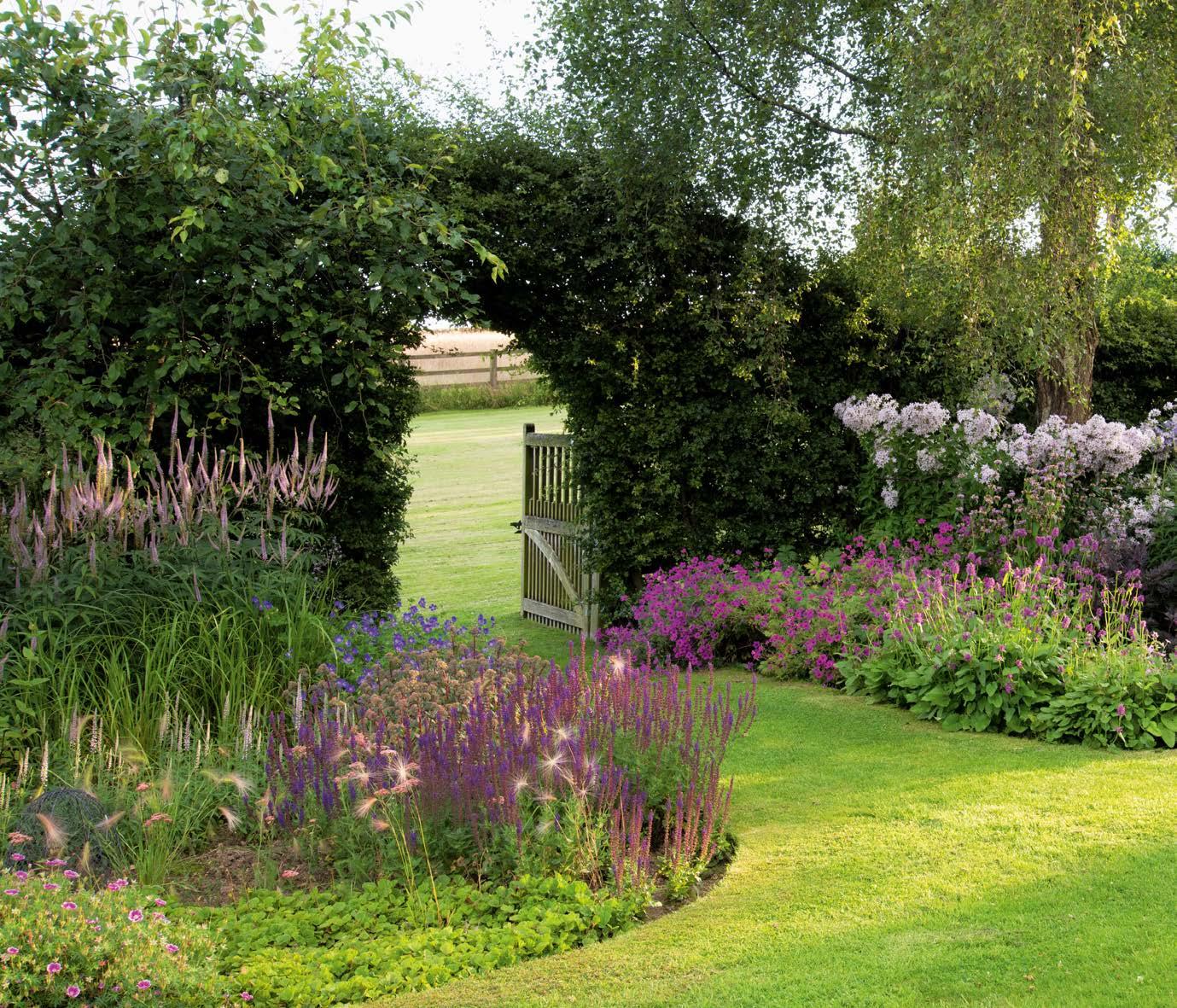
Right Geranium ‘Patricia’, provides a vivid splash of magenta flowers.
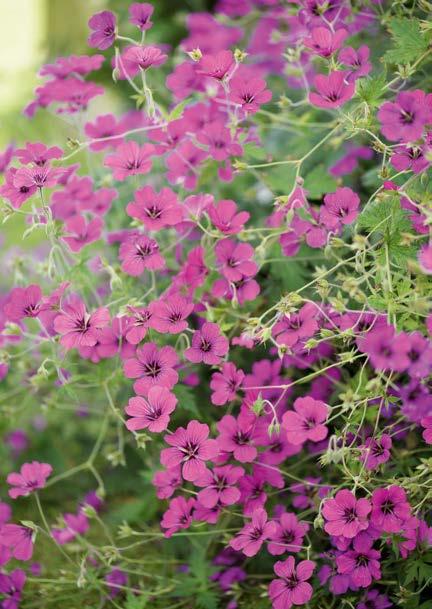
Far right A cylindrical terracotta pot houses
Hosta ‘Frances Williams’.
Nidderdale in North Yorkshire is a powerful setting in which to make a garden: great sweeps of upland heath flushed purple in late summer, giant rock formations carved from millstone grit by the action of glaciers, and small fields shaped by dry stone walls and isolated field barns more than earn its designation as an Area of Outstanding Natural Beauty. For William Moore and John Wilson, gardening here brought with it “an almost moral sense of responsibility to make something that didn’t jar with the surrounding landscape.”
William and John bought Cow Close, an amalgam of 19th-century farm labourer’s cottage and barn, in 2008 while working full-time as a head teacher and a hospital consultant respectively. “We
24 THE ENGLISH GARDEN JULY 2023
Above Sheltered by banks of planting, this terrace of flagstones and gravel next to the house is perfect for dining. Below Hylotelephium
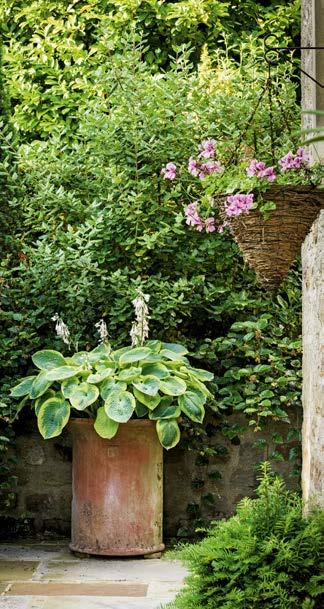
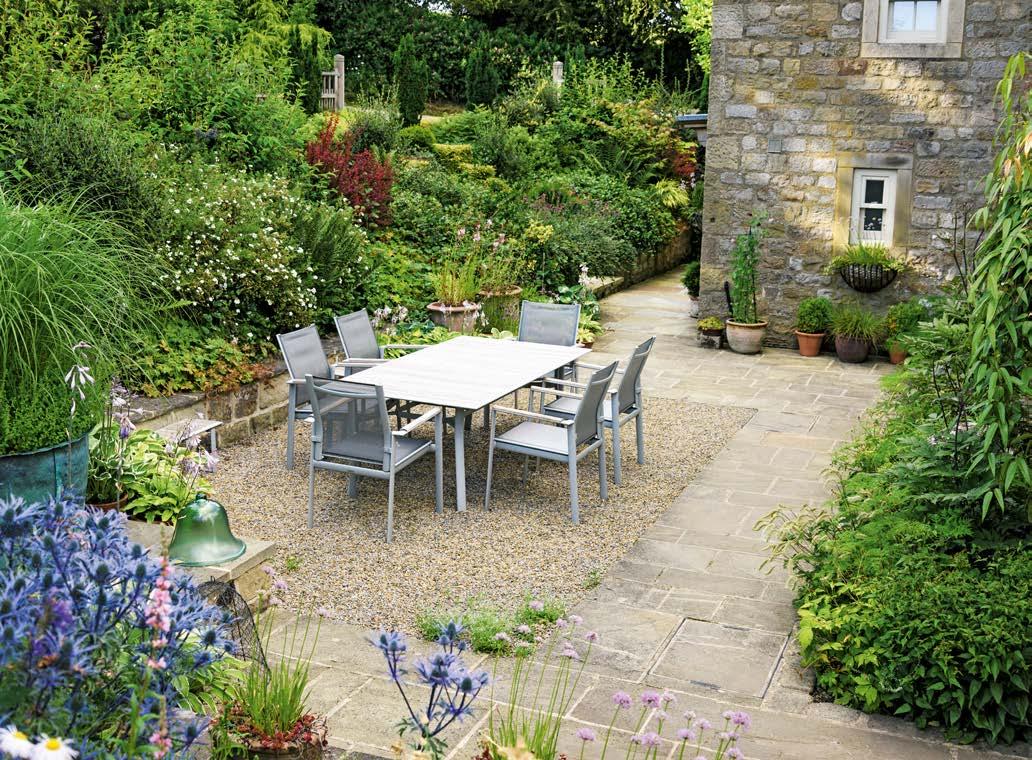
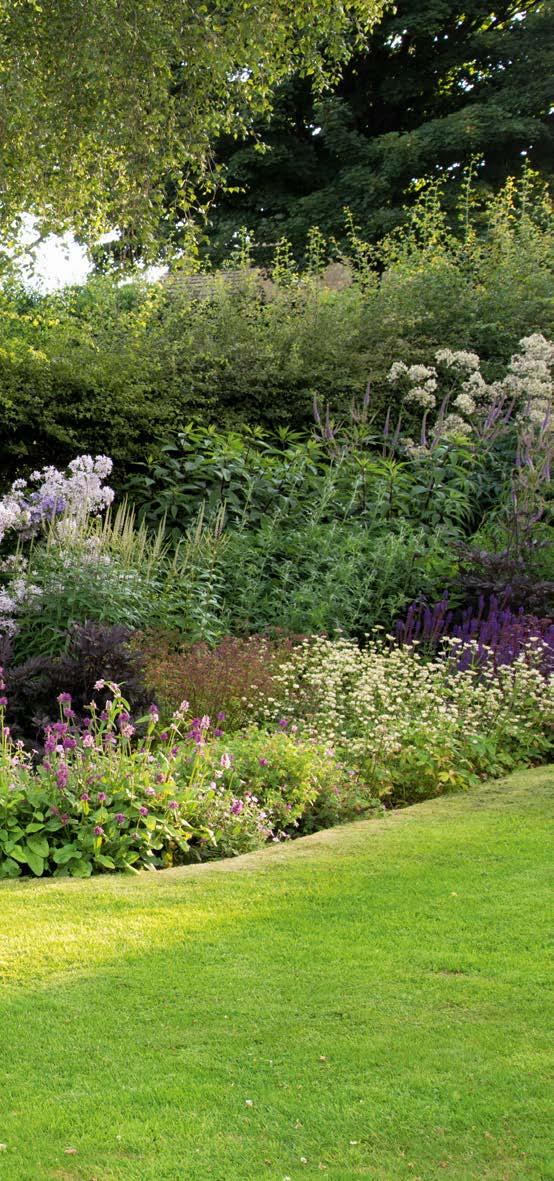
drove over from East Yorkshire in February, in sleet, and even on that gloomy day we liked the look of it,” William recalls. “One of the things we wanted was the potential to develop a garden. As it was on a south-facing slope and had a stream running through it, the place seemed even more appealing.”
Over the intervening 15 years, William and John have not only made a beautifully designed and planted garden, but have bought adjoining fields expanding their plot to three acres. They’ve sown a wildflower meadow and planted an orchard of local fruit varieties, including ‘Ribston Pippin’ apples and the ‘Hessle’ pear from Hull. Their interest in gardening began when they moved into their previous house, a new-build with a flat area of turf for a garden, and found the practice a welcome relief from their demanding jobs. William in particular, became interested in designers such as Piet Oudolf and Dan Pearson, and discovered Dove Cottage Nursery, near Halifax, where Kim and Stephen Rogers grow choice perennials and grasses suited to the northern climate. Other inspirations include Oudolf’s design for the walled garden at Scampston Hall near Malton, and York Gate on the edge of Leeds, a renowned 20th-century Arts & Crafts garden. “By the time we came to Cow Close I had a clear idea of what the garden could be like,” says William.
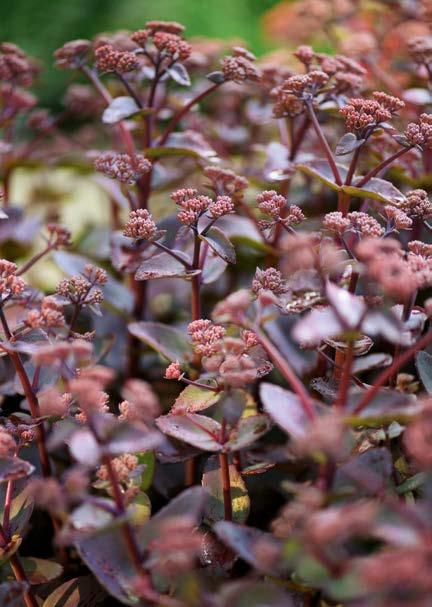
JULY 2023 THE ENGLISH GARDEN 25
‘Karfunkelstein’.
“We drove over in February, in sleet, and even on that gloomy day we liked the look of it”
The most recent addition, a wildflower meadow, is filled with knapweed and tufted vetch and thrums with the sound of insects.



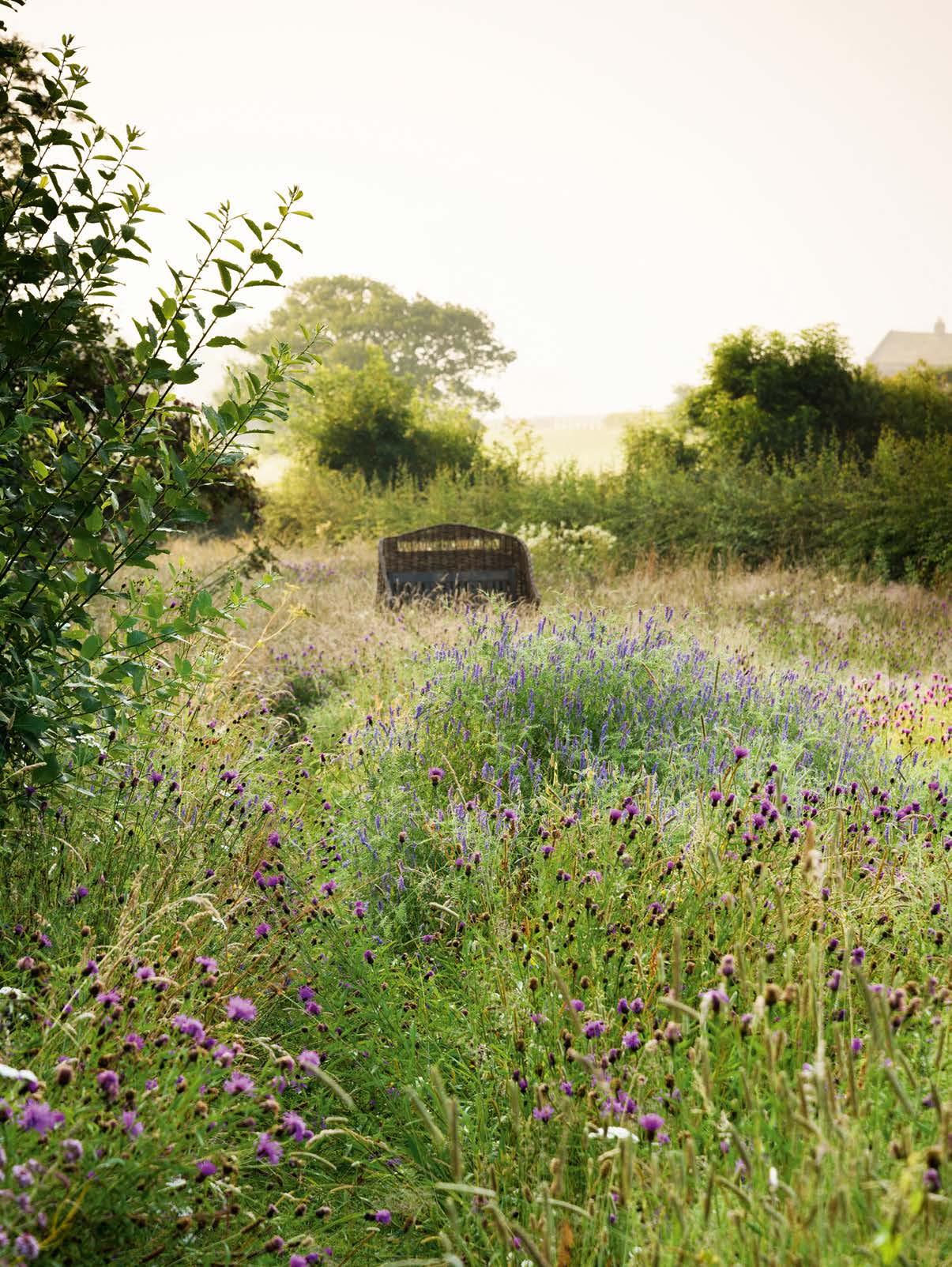
26 THE ENGLISH GARDEN JULY 2023
“The colour scheme complements the moors, bogs and rocks, and the sometimes brooding skies of the surrounding landscape”
John was always more interested in growing food, and now looks after the vegetables, orchard, and beehives and does most of the grass cutting.
For over a year before retiring, William and John were weekend visitors to their new house, so they got to know its garden before moving in. They saw how light moved across it and which areas were vulnerable to the strong winds that whip across surrounding fields from the south-west. The previous owner had boasted he could “get round the garden and do everything in an hour and a half,” so unsurprisingly there was little in it worth keeping besides a couple of corkscrew hazels, an acer, a purple-leaved elder and a black-stemmed bamboo.
William developed planting plans for the main borders with Kim and Stephen at Dove Cottage, using “a narrow colour palette of dusky purples, pinks and blues, thinking that it would blend in with any future wildflower garden that we made”. Ornamental grasses introduce touches of bu , gold and russet. The colour scheme complements the moors, bogs and rocks, and the sometimes brooding skies of the surrounding landscape. When impatience got the better of William and John and they planted the first large border before moving in, a hot, dry period of weather immediately followed necessitating “several three-hour round trips
midweek to water so we didn’t lose our plants”.
Designed to peak in late summer, the undulating borders that spill from the base of hedges on the west boundary of the garden are a rich tapestry of planting. Edging the lawn are deep purples and pinks, including spikes of Salvia nemorosa ‘Ostfriesland’, sprawling Geranium ‘Patricia’ with

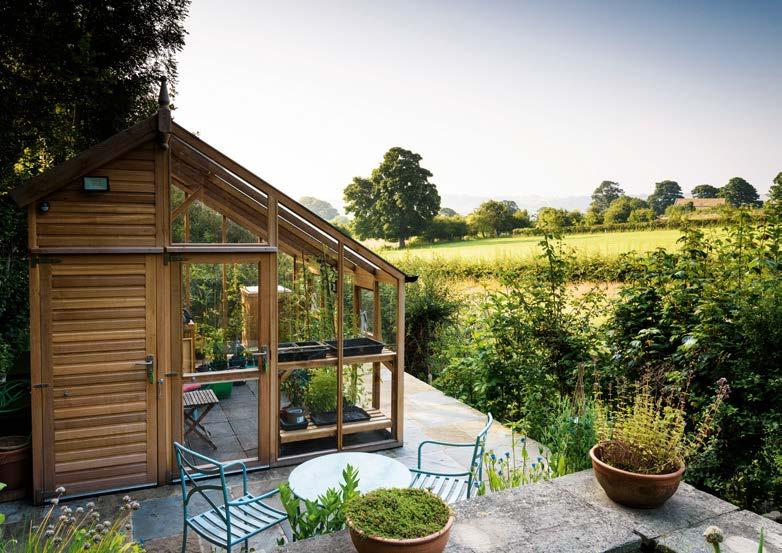
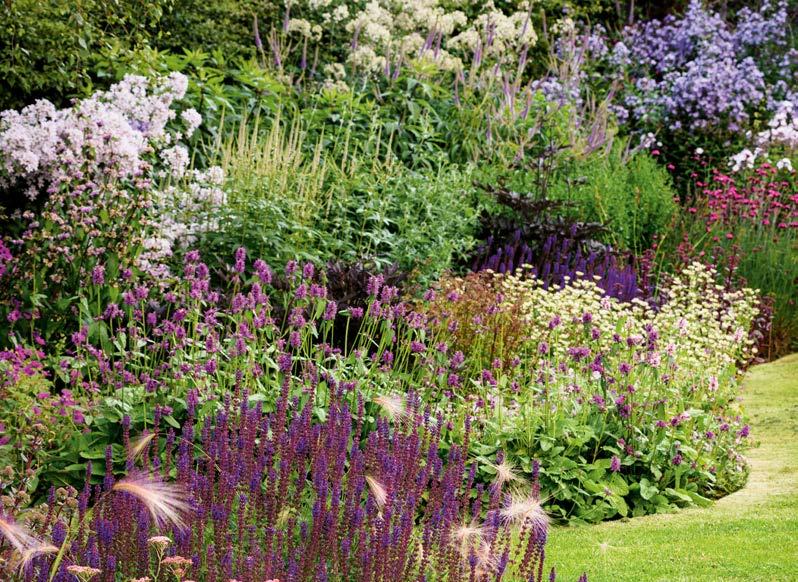
JULY 2023 THE ENGLISH GARDEN 27
Above Bobbly pink flowers of Betonica o cinalis ‘Hummelo’ stand out at the front of a curvaceous border. Left The grey stone farmworker’s cottage and barn date from the 19th century. Below Next to the vegetable patch cared for by John is a smart cedar greenhouse.
Making our green spaces greener

The wide range of powerful outdoor garden tools and robotic mowers from Kress has everything to meet your needs. From small spaces to large lawns, with boundary wire or boundary-free. Long-lasting battery tools and robot mowers with no emissions. The end of petrol is here, with no compromise on power or performance.


No petrol means no fuss, no mess and no emissions. Make the choice today for a better environment for all. Choose Kress.
Speak to your local Garden Machinery Dealer.

Find out more: Kress.com





Above A path carves its way through a dense, planting of geraniums, Actaea ‘Queen of Sheba’, sedums, sanguisorba, persicaria and Allium ‘Summer Beauty’.
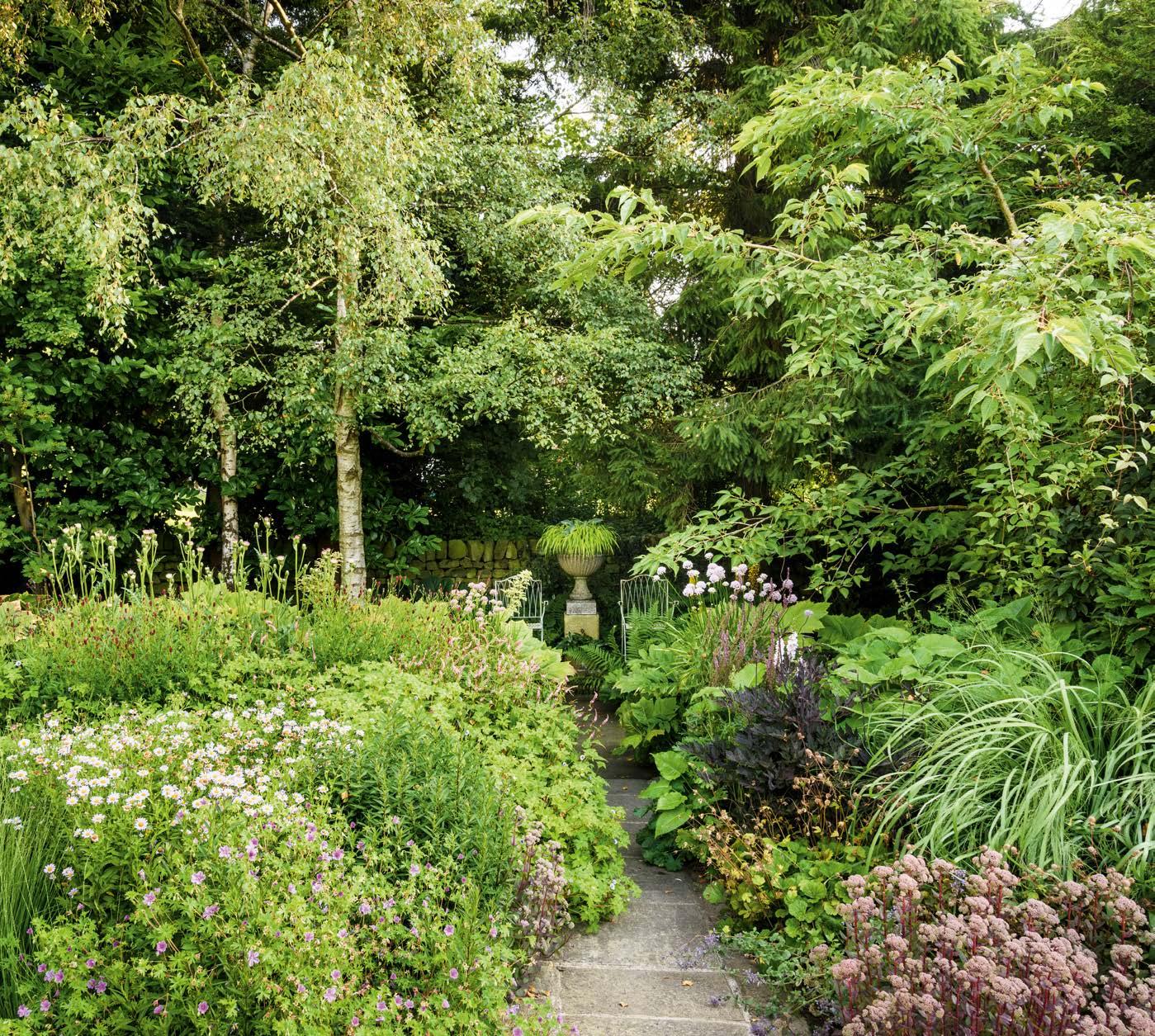
magenta flowers veined dark red, and Betonica o cinalis ‘Hummelo’ bearing stocky spikes of tubular, mauve-pink flowers above serrated leaves; foxtail barley, Hordeum jubatum, threads itself in and out, its feathery, shell-pink awns quivering in the breeze. Mid-border blocks of echinops, veronicastrum and phlox surge upwards, backed by airy Thalictrum ‘Elin’, its tiny lilac flowers topping deep purple stems, and the glittering awns of Stipa gigantea, golden oat grass.
A combination of the crimson buttons of Allium sphaerocephalon popping up amid a flu y cloud of Deschampsia cespitosa ‘Goldtau’, connects with the meadow below, echoing knapweed floating in a haze of grasses. Stand in the right place and the beds appear to merge into a continuous field of planting, an e ect that William particularly enjoys: “I think the sloping nature of the site has lifted the planting because you see more parts of the garden at once than you would if it were flat. Having the landscape as yet another layer beyond makes it even better.”
Fleshy sedums adding a contrast of texture among the perennials and grasses include Hylotelephium ‘José Aubergine’, whose deep purple leaves echo
JULY 2023 THE ENGLISH GARDEN 29
A cloud of deschampsia connects with the meadow below, echoing knapweed ating in a ha e grasses
those of elegant Cercis canadensis ‘Forest Pansy’ at the back of the border. Around the sundial on the lawn, the sedum mixes with Hakonechloa macra, Japanese forest grass, and a claret astrantia. On the east side of the garden, blocks of sedums frame the top of steps leading down the slope beside the stream fringed with astilbes and large-leaved bog plants such as rodgersias. Planting is lower on this side of the garden, unprotected as it is from the prevailing wind, and focuses “as much on foliage as flower”. Geraniums, sedums and low grasses knit themselves tightly together forming a dense matrix on each side of a path leading toward an urn framed with a pair of wirework seats.
Throughout the garden there are many enjoyable small details: sempervivums sprout out of walls; chickenwire cloches are neatly lined up below the kitchen window; a big copper is planted with miscanthus and surrounded by pots of hostas and a bell jar; and Allium ‘Summer Beauty’ pops up like a repeated phrase in a song in wall troughs and containers.
William and John made their wildflower meadow in 2016, spraying o the coarse pasture and harrowing the ground before sowing it with a seed mix reflecting local flora, including Yorkshire fog, Holcus lanatus, yellow rattle, Rhinanthus major, and knapweed, Centaurea nigra. In late summer the meadow hums with life as bees visit great flowery mounds of tufted vetch, Vicia cracca, dense with pea-like flowers that give o a haze of blue-mauve from a distance. Despite the couple not removing its topsoil first, the meadow has been remarkably successful; the knapweed and yellow rattle are spreading into surrounding paddocks and orchids have started to appear. When docks and nettles pop up, William digs them out with a small spade.
“There had been a hedge at the bottom of the garden which blocked the view of the meadow from the house, but by building the ha-ha there’s now a seamless flow down the garden across the wildflower meadow and into the wider landscape,” he says. The meadow has slotted into this carefully constructed and thoughtful garden like the final part of the puzzle, firmly anchoring it into this very special landscape. n
Cow Close Cottage, Stripe Lane, Hartwith, Harrogate, North Yorkshire HG3 3EY. Opens by appointment for the National Garden Scheme in June and July. Email cowclose1@btinternet.com or visit ngs.org.uk for details.
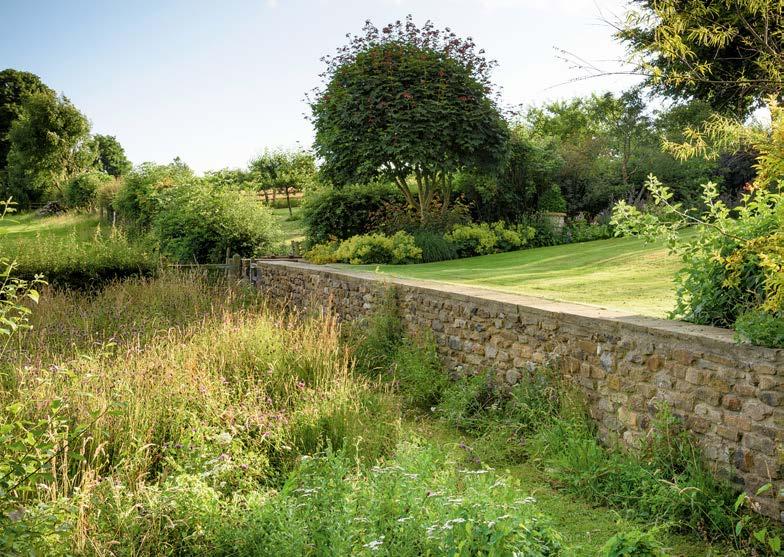
Above The wild meadow creates the perfect transition from garden to the dales beyond. Right Tufted vetch, Vicia cracca, just one of the meadow’s wildflowers that are loved by bees. Below The ha-ha between garden and meadow ensures an uninterrupted view.
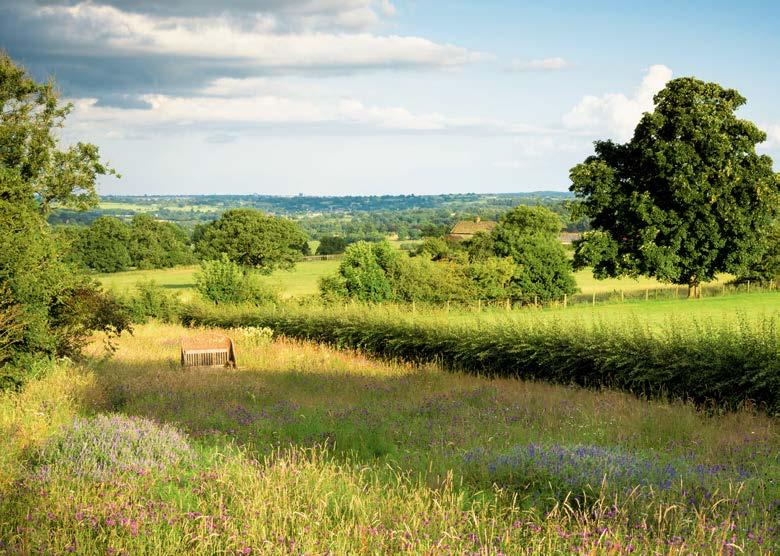
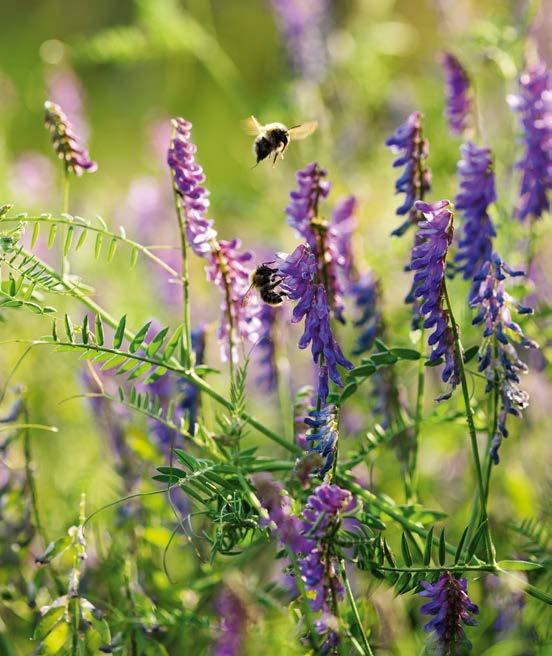
30 THE ENGLISH GARDEN JULY 2023
Geraniums, sedums and low grasses knit themselves tightly together forming a dense matrix
AK SYSTEM GARDEN TOOLS. CORDLESS POWER. BY STIHL.

ONE BATTERY. MANY TOOLS.
Long working times, plenty of power and easy to use. Whether it‘s mowing, sawing, trimming or clearing, the STIHL AK System has the flexibility to take on any challenge - all thanks to an interchangeable battery that can be used with any tool in the range.
Find out more at shop.stihl.co.uk or your local STIHL Approved Dealer.
 Cordless POWER. BY STIHL.
Cordless POWER. BY STIHL.
ƒ
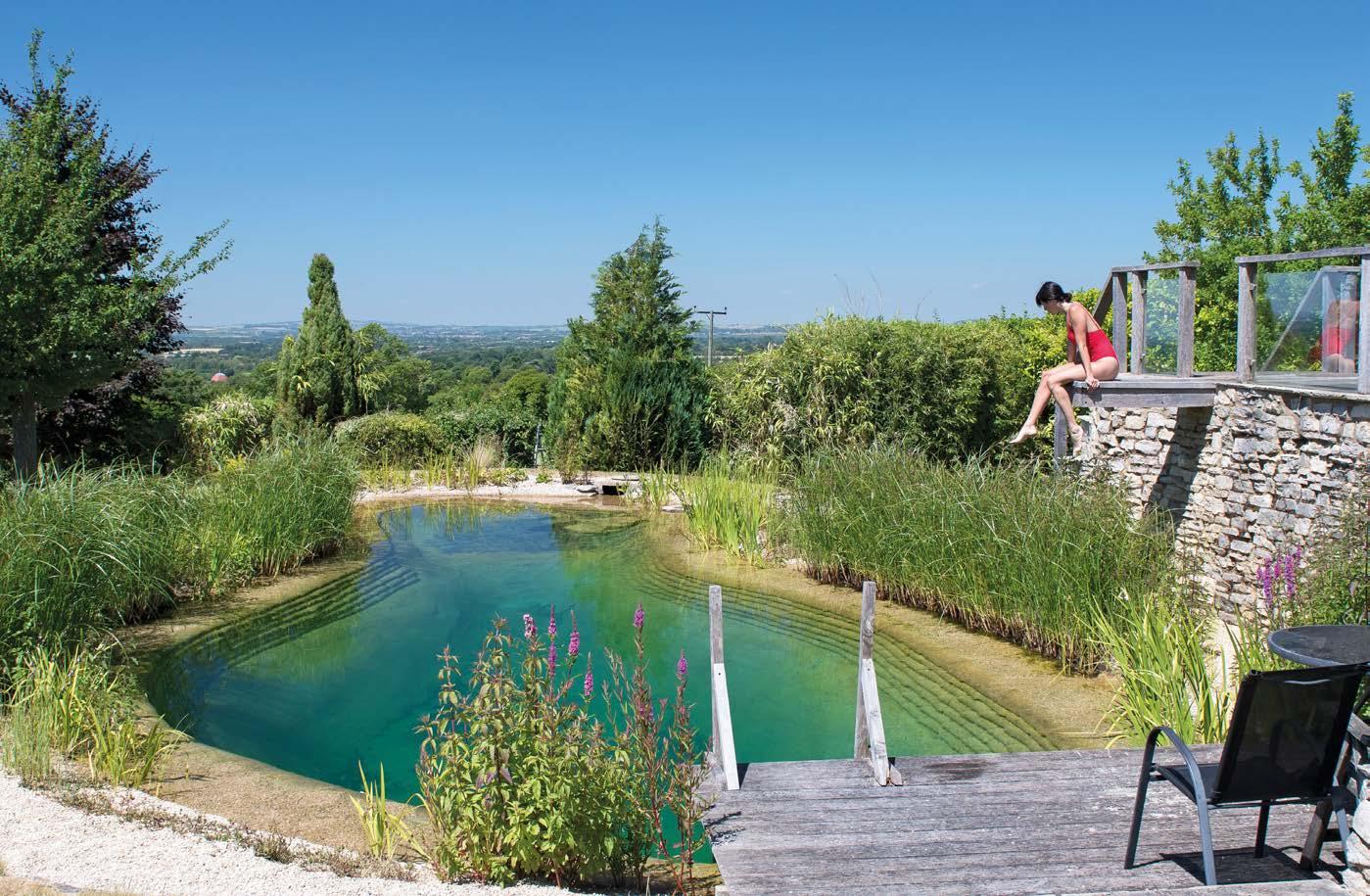







withWorkingNature














With a blank canvas and no specific ideas beyond a wish to be sympathetic to its bucolic Somerset setting, the owners of New House Farm enlisted Fi Boyle to design a space that exudes vitality and serenity while putting an ecological approach first and foremost










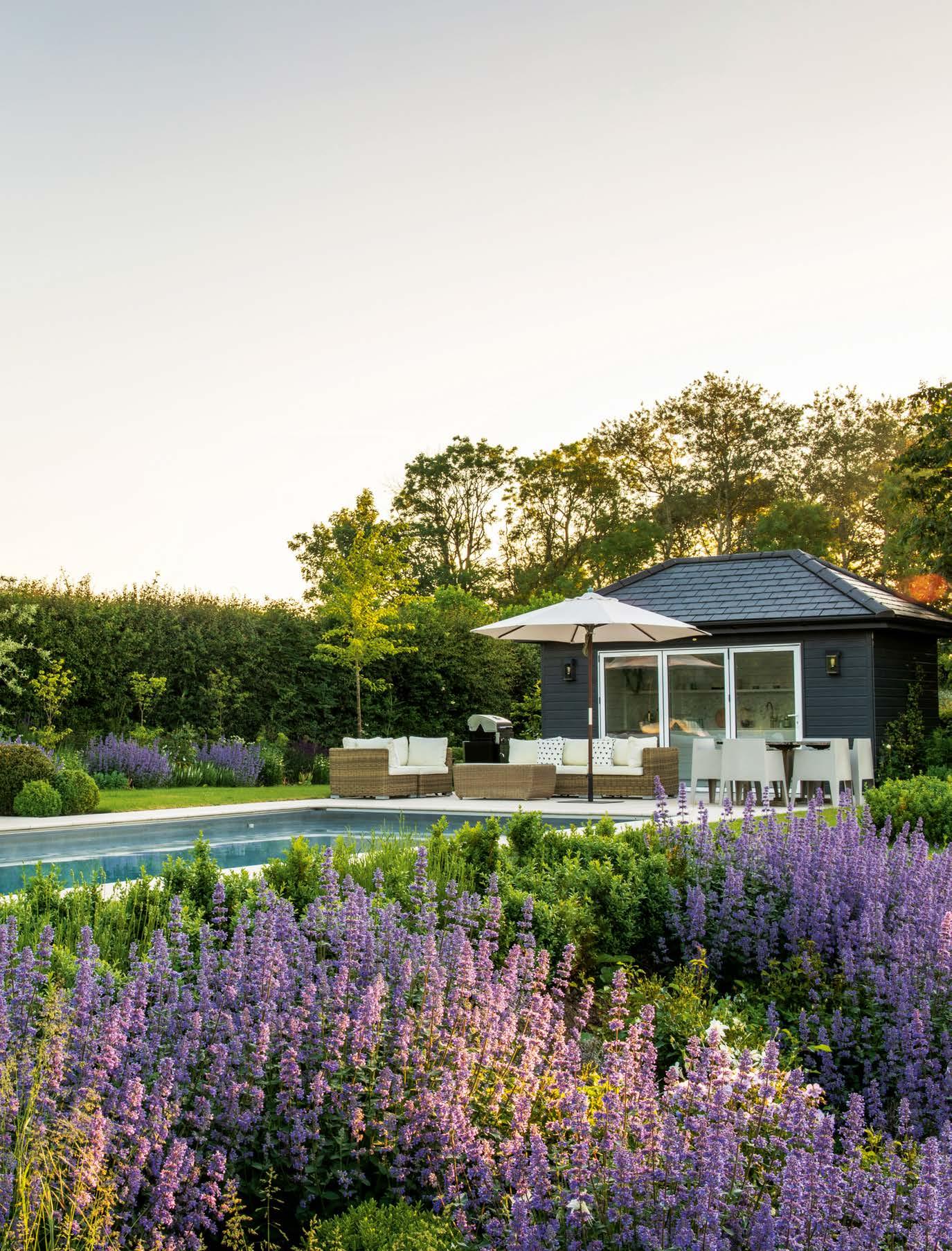 WORDS MATT REES-WARREN PHOTOGRAPHS HEATHER EDWARDS
WORDS MATT REES-WARREN PHOTOGRAPHS HEATHER EDWARDS
The modern English country garden is evolving, and awareness of the role large gardens play as pieces in the patchwork of the wider countryside is increasing. New House Farm, in the heart of Somerset, is a prime example of this change of perspective. From its humble beginnings as working farmland, New House Farm has grown in tandem with its bucolic surroundings without sacrificing its sleek modernity and style.
Nestled among rolling hills, the garden’s di erent levels rise and fall between flat terraces of grass and a stunning swimming pool. Classic country plantings of soft pastel perennials give the garden a relaxed and unassuming air, while box balls and trimmed beech hedges add an element of sophistication. Large areas of grass grow wild and shaggy, while majestic mature trees coexist alongside newly planted saplings. The garden merges seamlessly with the green fields beyond its boundary, perfectly exemplifying the contemporary philosophy of working with nature rather than against it.
On buying the farm, the owners’ initial focus was on the house itself. They moved earth to create a liveable space around it, resulting in piled mounds. This was when their friend, garden designer Fi Boyle, took up the reins and set about transforming the bumpy canvas into the beautiful gardens we see today.
Fi remembers her first impression: “The levels created were quite steep and challenging to work with, and certain changes were too expensive to implement. But this sort of thing challenges you as a designer and keeps you on your toes creatively.”
With the parameters of the brief established, Fi sought to highlight the garden’s idiosyncrasies.
Her approach involved working outwards from the house, creating long, narrow borders filled with hard-working perennials and bulbs. Clipped topiary and shrubs were then used to punctuate the borders
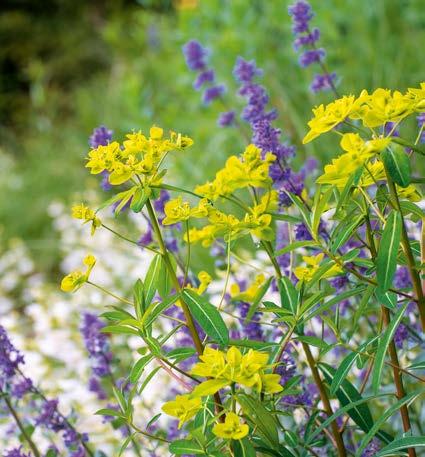
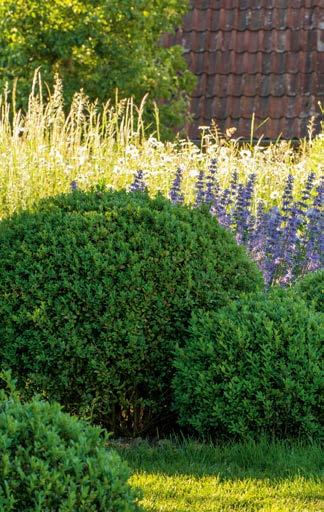

and provide structure. Explaining her planting style, Fi says: “I start with structure such as box balls, or key shrubs, then move on to the heroes, which in this garden are peonies and roses.” As the borders give way to raised mounds, the planting becomes more expansive, with drifts of ox-eye daisies leading the eye up towards the swimming pool terrace. Fi explains: “Moving further out into a garden, I often reduce the number of species within an area to create drifts of planting that can be blended to create a more natural feel.”
In transitioning from the formal pool area to the more natural long-grass meadow, the design of the garden begins to be driven by structural elements. “Beech hedging defines the outer edges, while yew divides the inner sections of the garden,” says Fi. “Hedges create a strong horizontal emphasis, and trees break this up by creating vertical interest.” This technique of contrast adds depth and texture to the garden. Fi’s attention to detail also extends to how she selects trees. She seeks to blend the garden into its surroundings by shifting the species selection of trees from ornamental to indigenous.
Below Cheerfully contrasting Euphorbia wallichii and Salvia nemorosa ‘Caradonna’. Clockwise from top right Expansive drifts of planting; silver-leaved trees frame the formal pool; box balls add sophisticated structure.
“Within the pool garden I used silver-leaved Sorbus aria ‘Lutescens’ and Pyrus salicifolia that connect with the border planting. Closer to the boundary I’ve used native species, such as Prunus padus (bird cherry) and Acer campestre (field maple).”
Fi’s approach to garden design takes into consideration the importance of ecology, since she believes it is crucial to work with nature instead of against it.
In her words, “Being conscious of the environment around the garden is critical.” This ecological approach is evident in her creation of a wildlife pond in a lowlying area of the garden, where excess water from the fields above the house is used to create a habitat for wildlife.
“The pond water then naturally drains down into the dell, which already had a seasonal stream running down
34 THE ENGLISH GARDEN JULY 2023
“I often reduce the number of species within an area to create drifts of planting that can be blended to create a more natural feel”
its centre,” Fi explains. By incorporating the natural water runo into the pond, she has successfully transformed a damp area into a thriving ecosystem. This is a perfect example of how garden design can be used for both aesthetic and ecological purposes, creating a sustainable and harmonious environment for people and wildlife.
With the flow and foundational design in place, Fi could take a deep dive into the nuance and detail of the composition and especially the use of colour, texture and successional interest. Every country garden worth its salt needs to be the peacock among the chickens in midsummer, and New House Farm is no exception. Fi’s brief was to create a garden with soft colours, including blues, pinks and whites with enough strength of colour in high summer. Iris ‘Jane Phillips’, Astrantia major ‘Roma’, Nepeta x faassenii ‘Junior Walker’ and Salvia nemorosa ‘Caradonna’

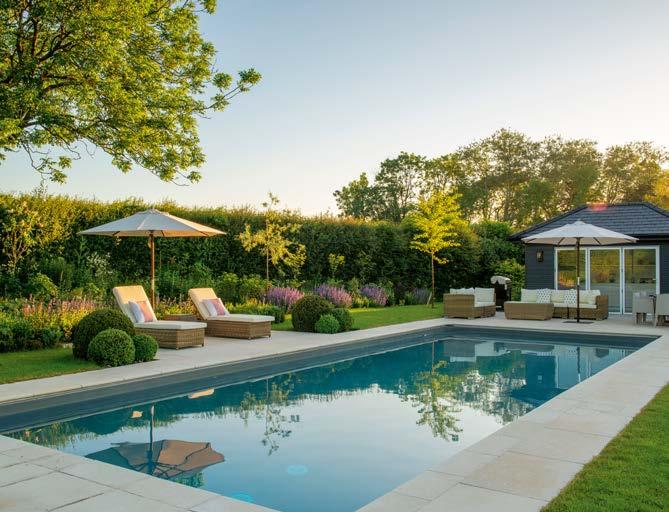
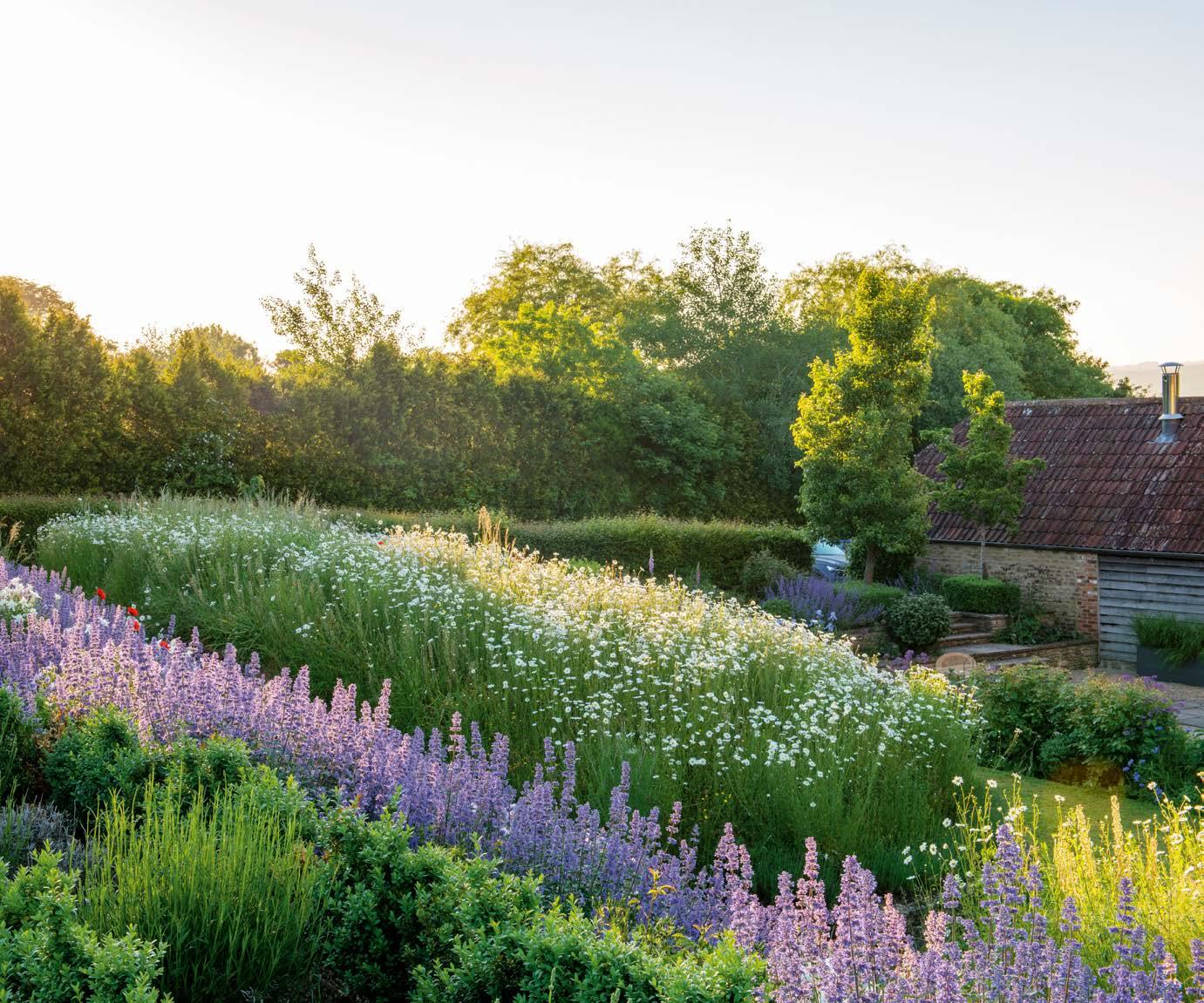
JULY 2023 THE ENGLISH GARDEN 35
Clockwise from top Looking up to the pool house through a border packed with roses, euphorbia and nepeta; Astrantia major ‘Roma’; Nepeta ‘Junior Walker’; a wooden painted obelisk adds height in the front border, set amid Rosa glauca and alliums.
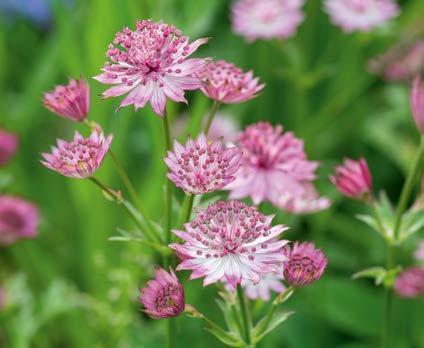
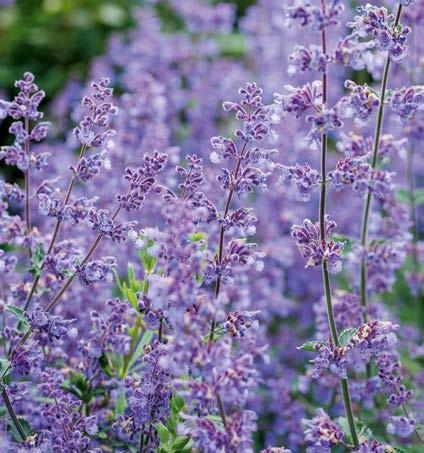
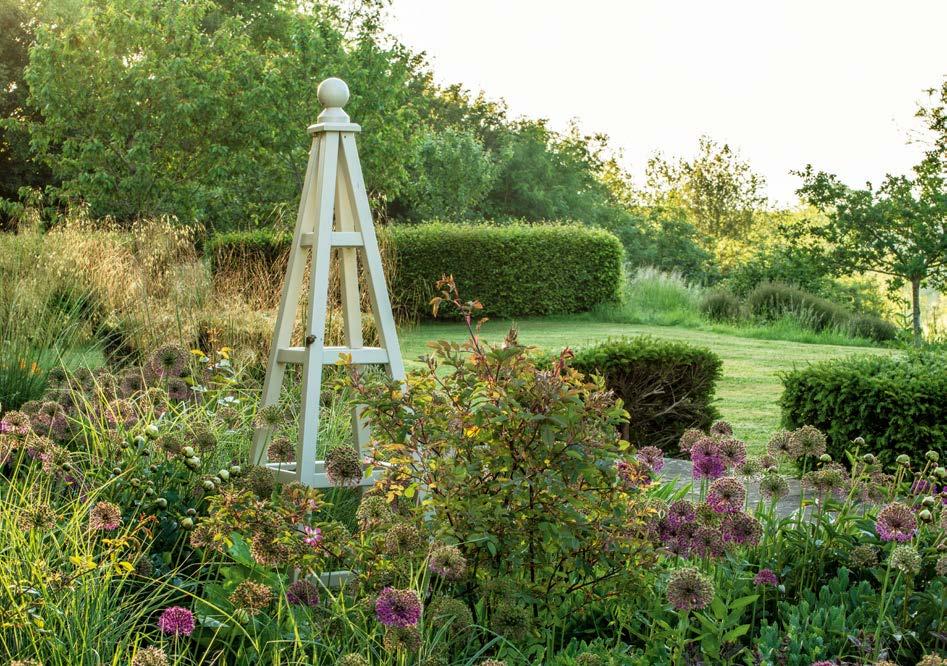

36 THE ENGLISH GARDEN JULY 2023
are used to great e ect to wash the garden in the required impressionistic shades.
To ensure succession, Fi combined species with di erent flowering windows: “I always underplant roses and peonies with early-flowering shorter perennials such as Corydalis flexuosa ‘China Blue’ or Lathyrus vernus, both of which have their moment before the peonies and roses come out.” Next to these lower-growing perennials, she incorporated taller cottage garden favourites like Thalictrum ‘Black Stockings’, white foxgloves and Allium ‘Purple Sensation’ to add height and interest. Throughout the garden, Fi seeks to extract maximum visual e ect from each species, using trees like Cornus kousa ‘China Girl’ and Prunus ‘Ukon’ to provide several seasons of interest with beautiful spring blossom, leaf shape and texture in summer, followed by fruits and stunning foliage in autumn.
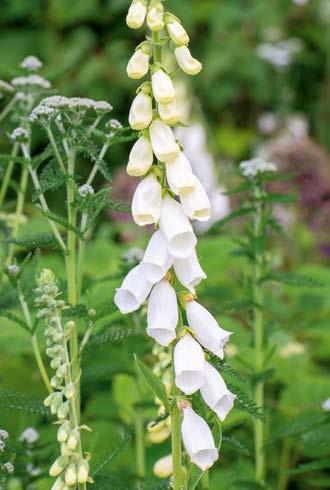
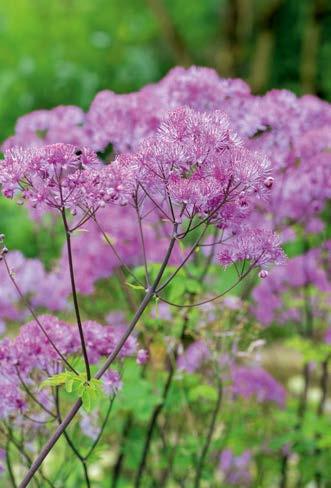
Species selection is where designers earn their spurs, and New House Farm is testament to Fi’s skill. Her garden exudes vitality and serenity thanks to a harmonious blend of cool colours and verdant greens, especially in midsummer. This is a modern garden, with a pool and summerhouse reflecting the changing climate and desires of garden owners. But it still retains a classic English country charm that harks back to a bygone era of bustling villages and abundant cottage gardens. Blending seamlessly into

JULY 2023 THE ENGLISH GARDEN 37
Top The imposing structure of the farmhouse is softened on all sides by banks of perennial planting.
Above right An elegant twist on a cottage garden classic: Digitalis purpurea ‘Alba’.
Above left Thalictrum ‘Black Stockings’.
This is a modern garden re ecting the changing c i ate an esires gar en wners t it sti retains a c assic ng ish c ntr char
its surroundings, its openness is refreshing, and Fi and the owners’ desire to retain mature trees, dig wildlife ponds and plant indigenous species is more than heartening to see.
FIVE KEY DESIGN METHODS
For modern country garden perfection
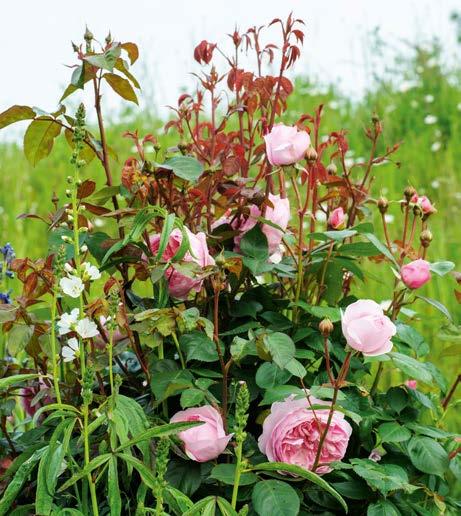
1 Allow areas of grass to grow long, with mown paths cut through for contrast and to reflect the countryside beyond the boundary.
2 Create looseness and drifts by using a more limited choice of species in plantings that are further away from the house.
3 Incorporate indigenous species like crab apple, ox-eye daisy, and foxgloves to create a more natural feel to the garden.
Above Banks of planting include euphorbia, Centaurea montana, Dicentra spectabilis
‘Alba’ and thalictrum.
Right Cupped pink blooms of Rosa ‘Olivia Jane Austin’.
Below A mown path cuts through a grassland meadow studded with purple alliums.
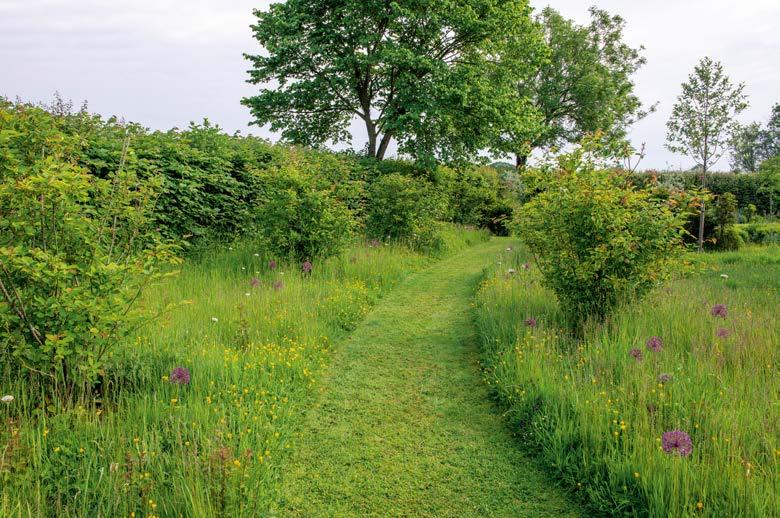
New House Farm could be the blueprint for any aspiring garden owner with a blank canvas and an empty tank of ideas – although not everyone will gain the skills of a talented garden designer to guide them! This garden’s journey shows the value of embracing happy accidents and turning obstacles into opportunities, and of taking the time to understand the environment a garden sits within. As Fi simply puts it: “Working with the landscape is so important; fighting what’s already there can make the garden incredibly high maintenance in every way.” n
Fi Boyle Garden Design, tel: 01747 840202; fiboylegardendesign.com
4 Use structural plants such as box, yew, and beech, but don’t make them too rigid and formal. Let hedges grow loose and create di erent shapes of topiary.
5 Plant copious amounts of bulbs, especially drifts of crocus, under trees or add da odils on banks and slopes to bring a sense of maturity to a new garden.

38 THE ENGLISH GARDEN JULY 2023
“Working with the landscape is so important; fighting what’s there can make the garden incredibly high maintenance”
EcoLine Hose





Care for your garden while caring for the planet





New for 2023, the GARDENA EcoLine hose expands the already much-loved sustainable EcoLine range. Made from over 65% recycled materials and fully recyclable the EcoLine hose allows you to garden greener than ever.







40 THE ENGLISH GARDEN JULY 2023
Blocks of colour courtesy of sedum, phlomis, daylilies, catmint and persicaria with great pillars of Thuja ‘Smaragd’.
Let the Fireworks COMMENCE


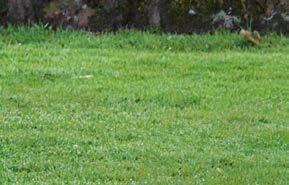


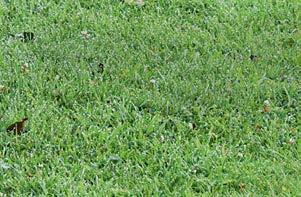
The gardens of Cheshire’s Abbeywood Estate burst into life in high summer, when Harry and Lynda Rowlinson’s exuberant tropical planting in a scorching palette of red-hot colours proves a real hit with visitors

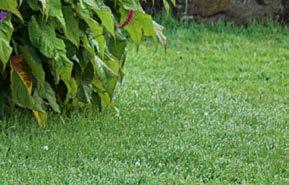
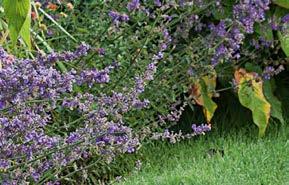

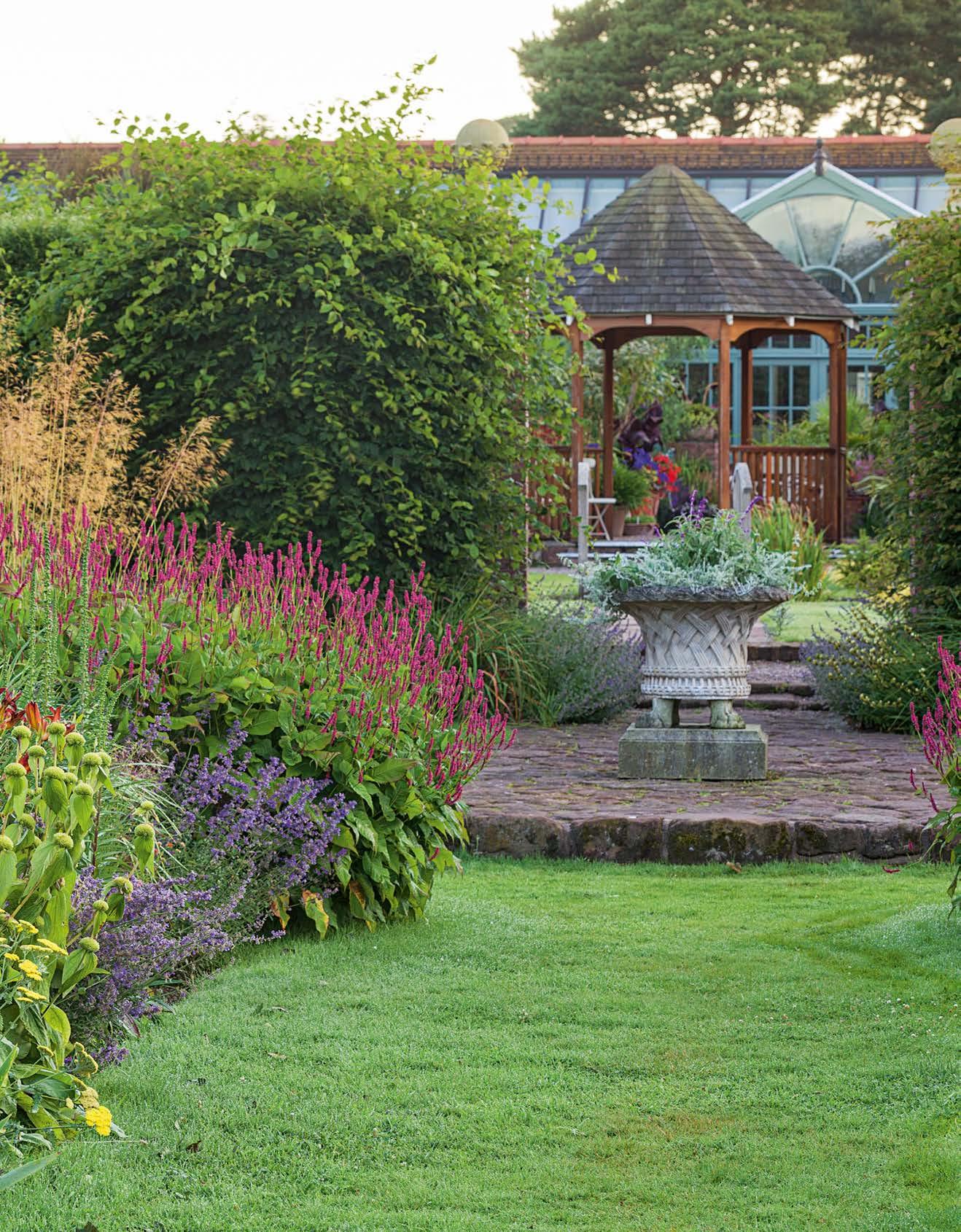
WORDS & PHOTOGRAPHS JOE WAINWRIGHT
Cordylines, bananas and cannas lend their bold foliage to the Exotic Garden, along with the flowers of salvias and abutilon.

42 THE ENGLISH GARDEN JULY 2023
Exotic planting that blazes with the colours of the tropics; swathes of perennials and grasses that merge into hillside views; and bold, broad herbaceous borders. It is no wonder that Abbeywood Gardens has become one of Cheshire’s top garden destinations as well as a popular wedding venue.

While the six-acre garden may appear to be long established, it is in fact the relatively recent creation of its owners, Harry and Lynda Rowlinson, with help and inspiration from head gardener Simon Goodfellow. It all looked very di erent when Harry and Lynda moved into the Edwardian property here in 1987. As Harry explains: “There were some beds but no plants to speak of, and at the rear of the house was a narrow terrace and a set of feeble steps down onto the lawn. Lynda and I set about planting the existing beds, and we spent most weekends and evenings working on it when the weather was fit. I thought the garden was looking good, but Lynda felt we could do better, so we commissioned designer David Stevens, who created
Above Spiky phormiums and trachycarpus contrast with the paddle-shaped leaves of a purple canna.
Below Fiery scarlet Begonia boliviensis and vibrant blue agapanthus in terracotta containers.
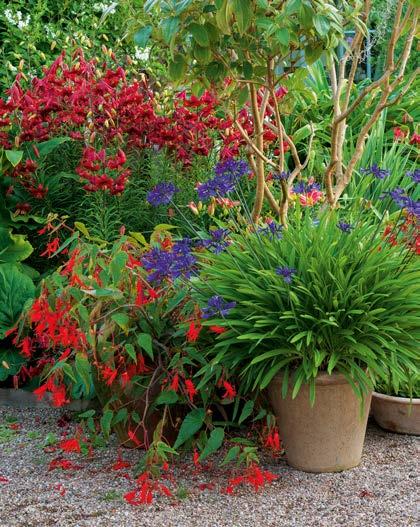
much of the structure of the garden we see today. Many changes have since been made, and large new areas have been added by our head gardener, Simon, who joined the team in 2009.”
Simon, who had worked in various nursery and head gardener roles since moving to the UK from South Africa in 1999, could immediately see the potential of the garden. Relieved to find its sandy, acid soil to be perfect for his plans, he set about transforming an existing vegetable plot into the Exotic Garden. Inspired by the Exotic Garden at Great Dixter, this area has a scorching colour palette that transports visitors from the often windy and cool Cheshire hillside where Abbeywood is located. Reds are provided by Canna ‘Red Velvet’ and Begonia boliviensis ‘Firecracker’ in terracotta pots. Phormiums burst upwards adding height and texture, while salvias such as ‘Hot Lips’ spill over paths. The showy yellow trumpets of brugmansia hang over the borders, and extra height comes from cordylines and trachycarpus with their fan-like leaves.
“Maintaining this part of the garden, with its tender species, can be fraught
JULY 2023 THE ENGLISH GARDEN 43
with di culties,” explains Simon. “Many of the plants are overwintered in heated greenhouses, but those that remain have to contend with a climate that, due to the elevation and exposed nature of the site, is often colder than the rest of Cheshire.”
During the shortest days of the year part of the Exotic Garden is in constant shade, so frosts may not melt for weeks on end. Abbeywood is also exposed to north-west winds that have the potential to do damage. Despite all this, Simon has lost few plants. “Even when they’re badly a ected by freezing conditions, plants like cordyline can send up new shoots from further down the stem,” he explains.
From the exuberance of tropical colour, a serene calm takes over in the nearby Pool Garden. Once a tennis court, the area features a large rectangular pond, crossed by a wooden bridge. It was once bordered by a parterre edged with clipped box, but this was badly a ected by blight. The new planting scheme features clipped yew and purple beech Fagus sylvatica ‘Purpurea’ together with grasses and sedums. At the far end, a shrubbery has been replaced by a bold planting of Persicaria

amplexicaulis ‘Firetail’ and Miscanthus ‘Gold Bar’, with terracotta urns providing striking focal points.
From here, passing through a gap in the hedge, the garden opens up into a grand vista of herbaceous borders, woodland and fertile farmland that recedes into the summer haze. Here is the Pergola Walk, two sets of double herbaceous borders that run the width of the garden. As Simon explains: “In the original plans the borders were quite narrow. I doubled their size and planted them with perennials. The original scheme was that of a traditional herbaceous border, but we found that by July, much of the interest had gone. The Pergola Walk has now been replanted in a more naturalistic style. I’ve also aimed to widen the season of interest, introducing spring bulbs and plants that flower until the first frosts.”
In high summer, great drifts of colour fill the beds. Plants include Hylotelephium ‘Herbstfreude’; Salvia nemorosa ‘Ostfriesland’ with its purple spikes; vivid red Monarda ‘Gardenview Scarlet’; and distinctive orange Achillea ‘Terracotta’. Clambering up the supporting brickwork is soft pink rose ‘New Dawn’ intertwined with a rich blue clematis.
44 THE ENGLISH GARDEN JULY 2023
Below The Pool Garden is perfectly symmetrical, with purple sedumedged beds along the long sides, plus golden miscanthus and pink persicaria at the back.
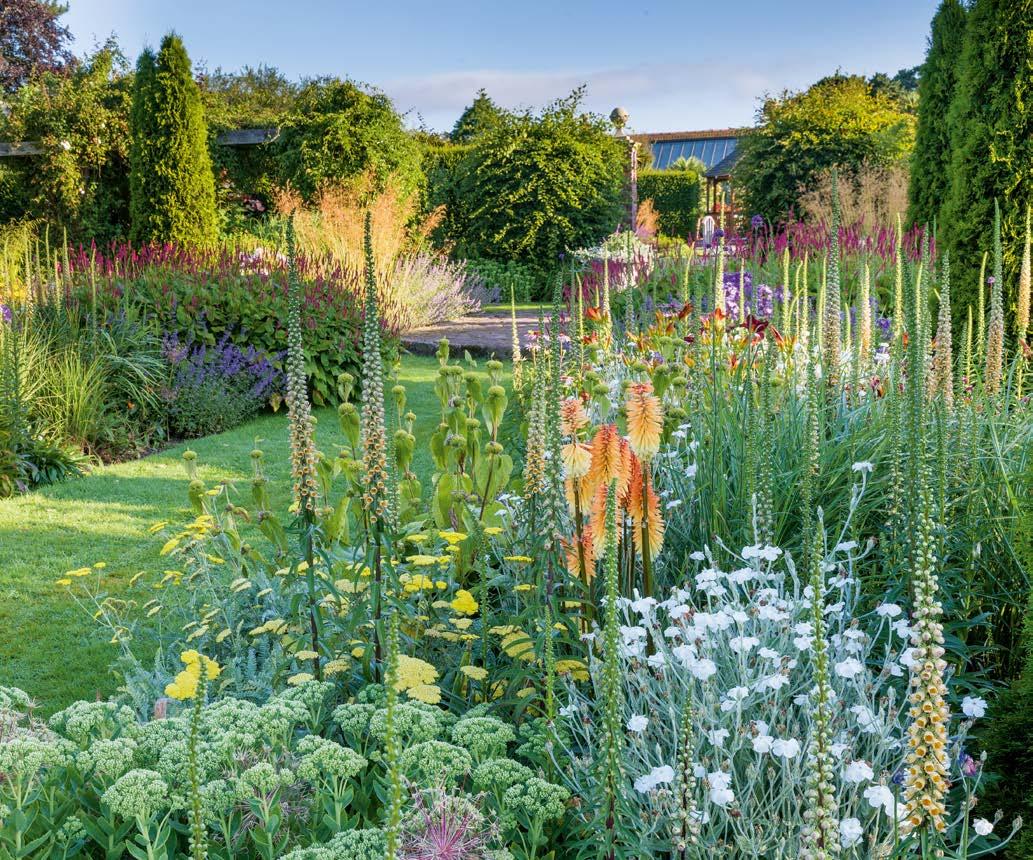
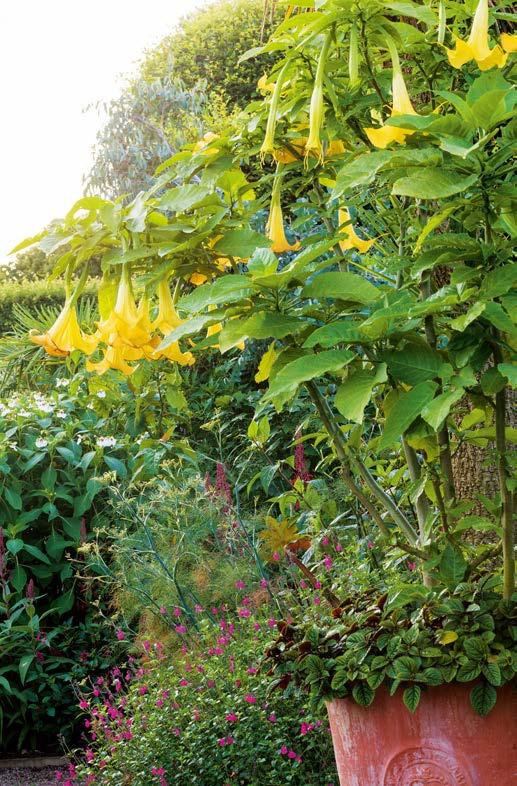
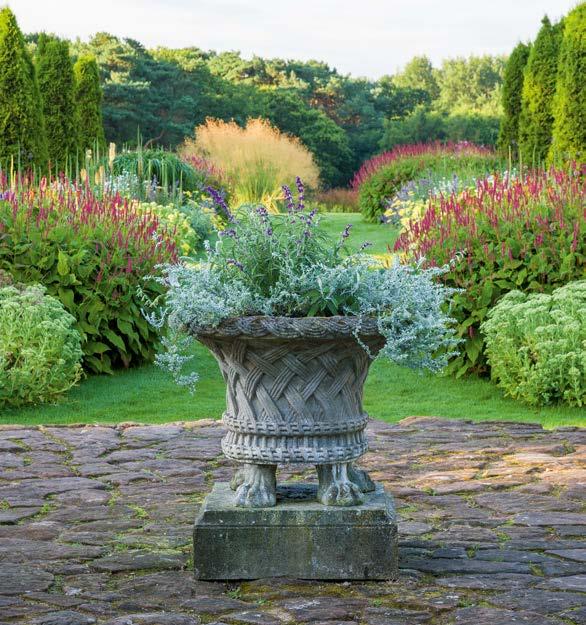
JULY 2023 THE ENGLISH GARDEN 45
Above left A grand urn sits at one of the garden’s main axes, with a view along a pair of herbaceous borders.
Above right Brugmansia makes a glamorous statement in a container, with an underplanting of plectranthus.
Right Upright rockets of Digitalis ferruginea punctuate the planting.
pretty
of pink
At right angles to the Pergola Walk, leading deeper into the garden, are herbaceous borders that form an avenue. Punctuated by the elegant, vertical conifer Thuja occidentalis ‘Smaragd’ for height, the other planting here includes more red Persicaria amplexicaulis ‘Firetail’, purple Salvia nemorosa and yellow Phlomis russeliana, which also provides form and interest later in the season. All these are complemented by the thrusting yellow-brown flower spikes of the rusty foxglove, Digitalis ferruginea
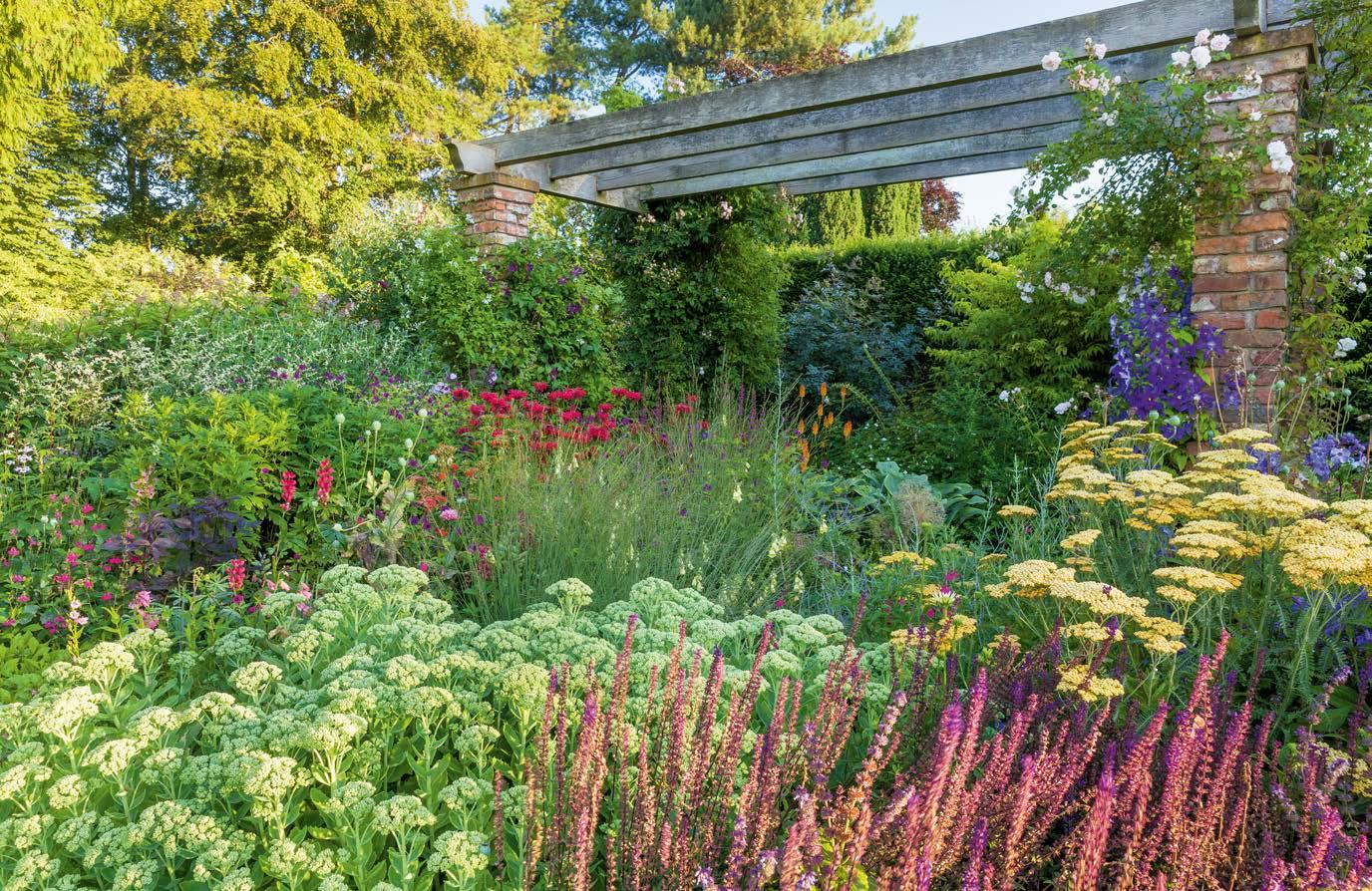
Beyond this is one of the more recent creations in the garden. “In 2015 we created a Prairie Garden in what was a large paddock overlooking the Utkinton Hills,” explains Simon. “I particularly enjoy the work of Piet Oudolf, and I was inspired by the wonderful prairie planting at Lady Farm Gardens, which I visited when I worked in Somerset. I think sweeping, naturalistic planting particularly suits this location, with the bold blocks of colour enhancing the views out towards the nearby countryside.”
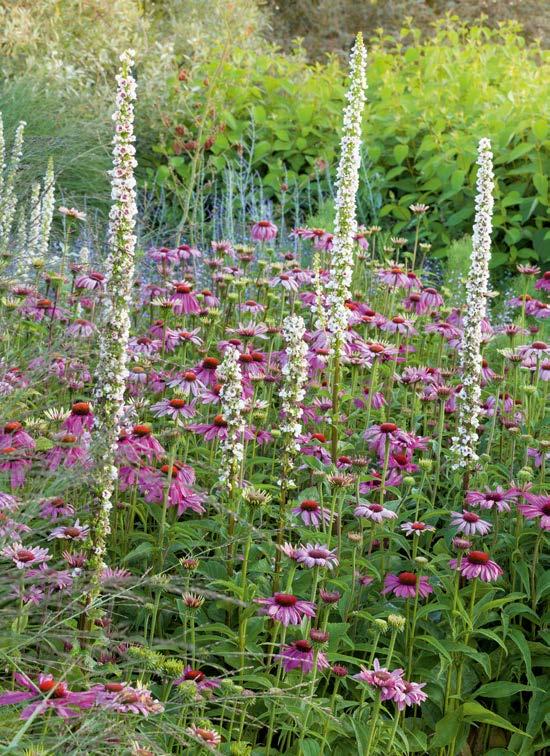
The Prairie Garden is formed from a series of concentric, curved beds. The central borders were created first, but Simon felt these seemed disjointed and too removed from the rest of the garden, so additional outer borders were added to unify this area with the herbaceous avenue.
Height, form and movement come from grasses, such as Stipa gigantea with its mounds of leaves
46 THE ENGLISH GARDEN JULY 2023
Above The Pergola Walk’s herbaceous planting includes Achillea ‘Terracotta’ and Salvia ‘Ostfriesland’. Right A
combination
daisy-like echinacea with spikes of Verbascum chaixii ‘Album’.
and oat-like seedheads that glow gold, and miscanthus varieties ‘Silberfeder’, ‘Ferner Osten’, ‘Gracillimus’ and ‘Malepartus’, which create a foil for the blocks of bright perennials. These include exquisite combinations, such as pink Echinacea purpurea ‘Bressingham Hybrids’, with the vertical lavender-blue spikes of Veronicastrum virginicum ‘Lavendelturm’ and the small deep red flowers of sanguisorba. Elsewhere, elegant Echinacea pallida, with its reflexed pink petals, grows alongside upright yellow verbascum. Waves of deep orange Helenium ‘Moerheim Beauty’ mix perfectly with the deep purple foliage of Actaea simplex (Atropurpurea Group) ‘Brunette’.

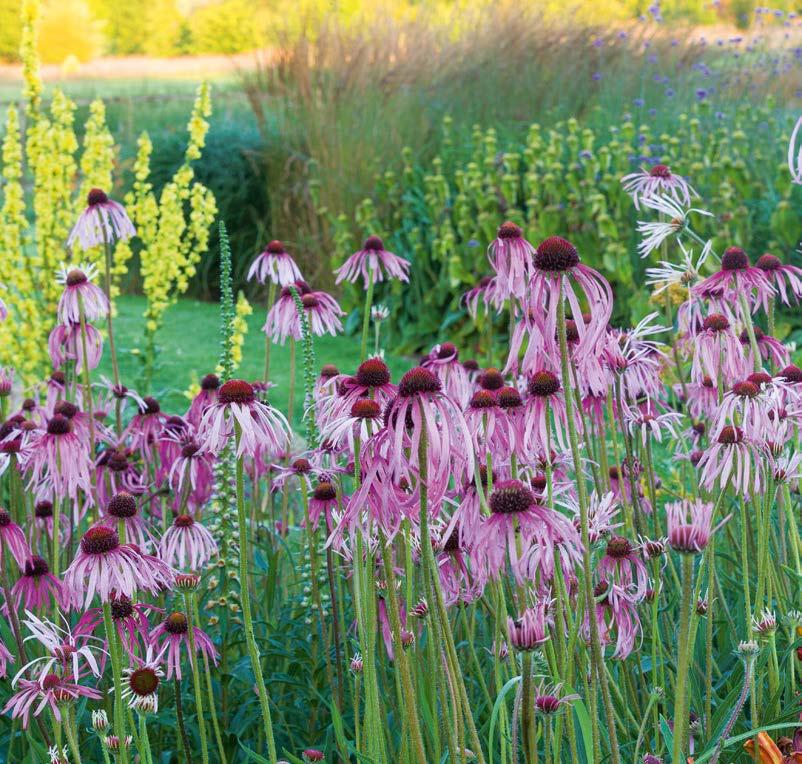
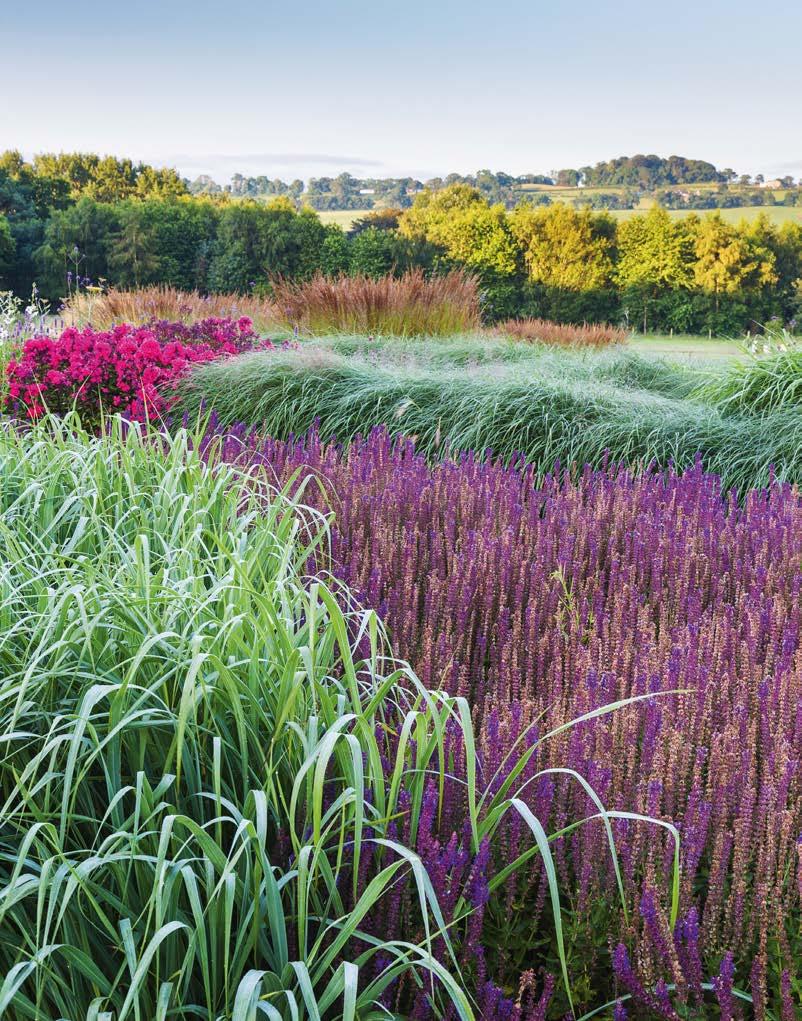
Beyond the main garden, a Rose Garden was also created in 2015 in front of Abbeywood’s popular café and restaurant. “Originally the work in the garden was for our own satisfaction, but as it progressed Lynda and I thought it would be good to share with others,” says Harry. “Opening the garden and creating the café, as well as undertaking weddings, happened almost by accident, but I know it gives lots of people great pleasure. I look forward to seeing what the coming years bring in terms of fresh planting and new features – gardening is a constant process of change and experimentation, and that’s why Lynda and I enjoy it so much.” n
The Abbeywood Estate, Chester Road, Delamere, Cheshire CW8 2HS. Opens Sunday to Thursday, 9am to 5pm. Tel: 01606 888251 abbeywoodestate.co.uk
Above Echinops ritro, a prairie garden staple. Right Vast swathes of miscanthus and salvia in the Prairie Garden, which merges with the view of the countryside beyond. Below right Echinacea pallida teamed with yellow Verbascum olympicum
The Perfect Garden Summerhouse...
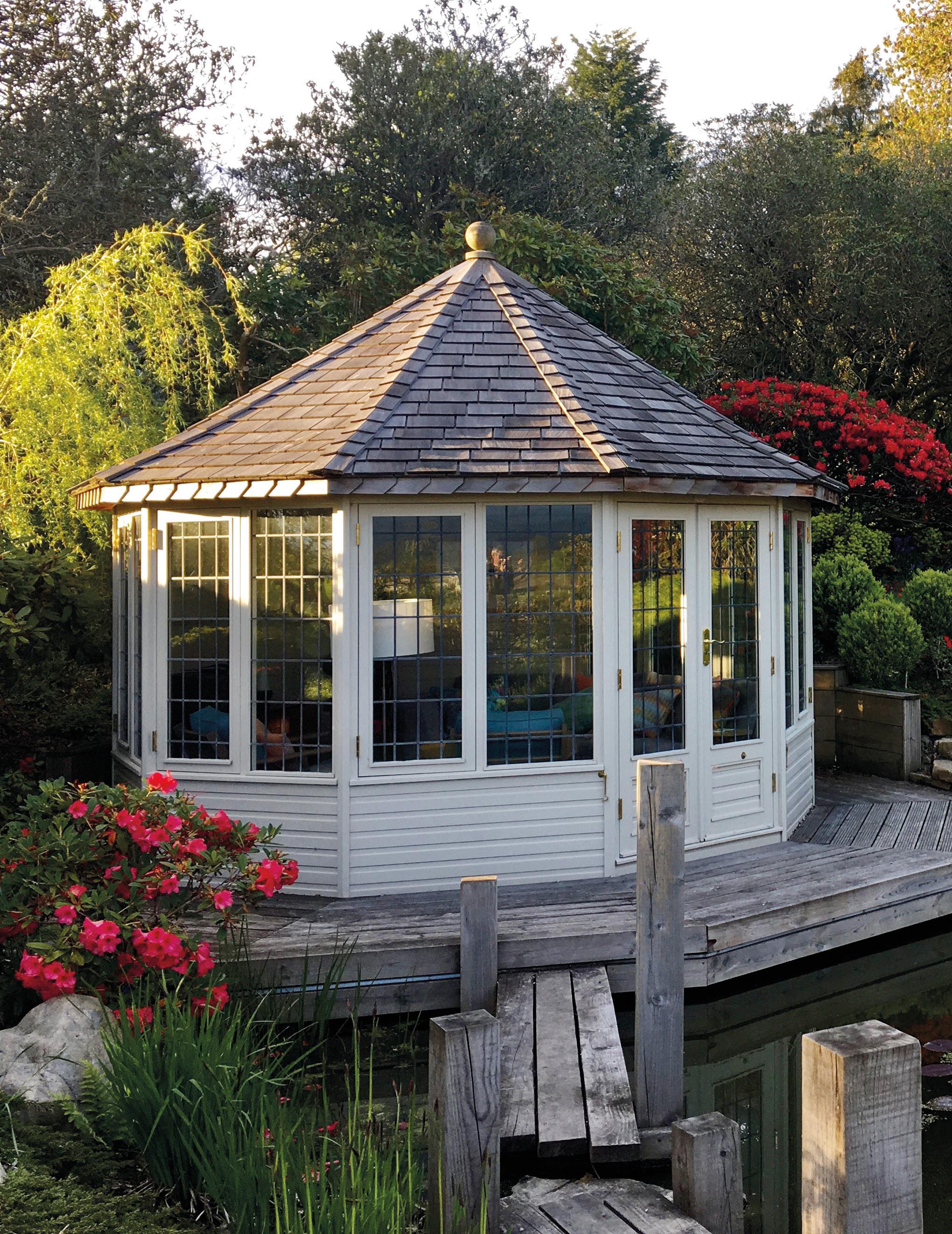
Handmade in Cedar, Chelsea Summerhouses are idyllic hideaways to relax, dine, work or play. The beautiful timeless designs, the exceptional quality of our materials, expert craftsmanship combined with first class customer service means that all you have to do is… sit back and enjoy!
Summerhouses are the perfect way to enjoy the outdoors whatever the season, be it a country garden or an urban retreat. Chelsea Summerhouses luxury range encompasses sizes suit every garden and can be adapted for a variety of purposes including a tranquil home office, inspirational studio, gym or merely a garden retreat.
Chelsea Summerhouses are the archetypal traditional garden retreat, with designs dating back over 100 years. For further information please call 0800 3317742 or visit website www.chelseasummerhouses.co.uk

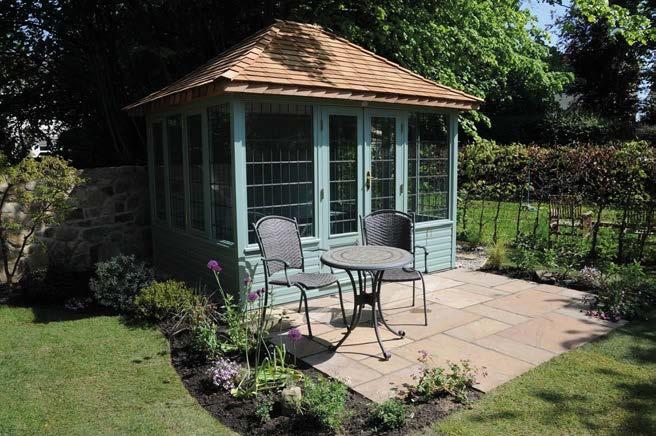

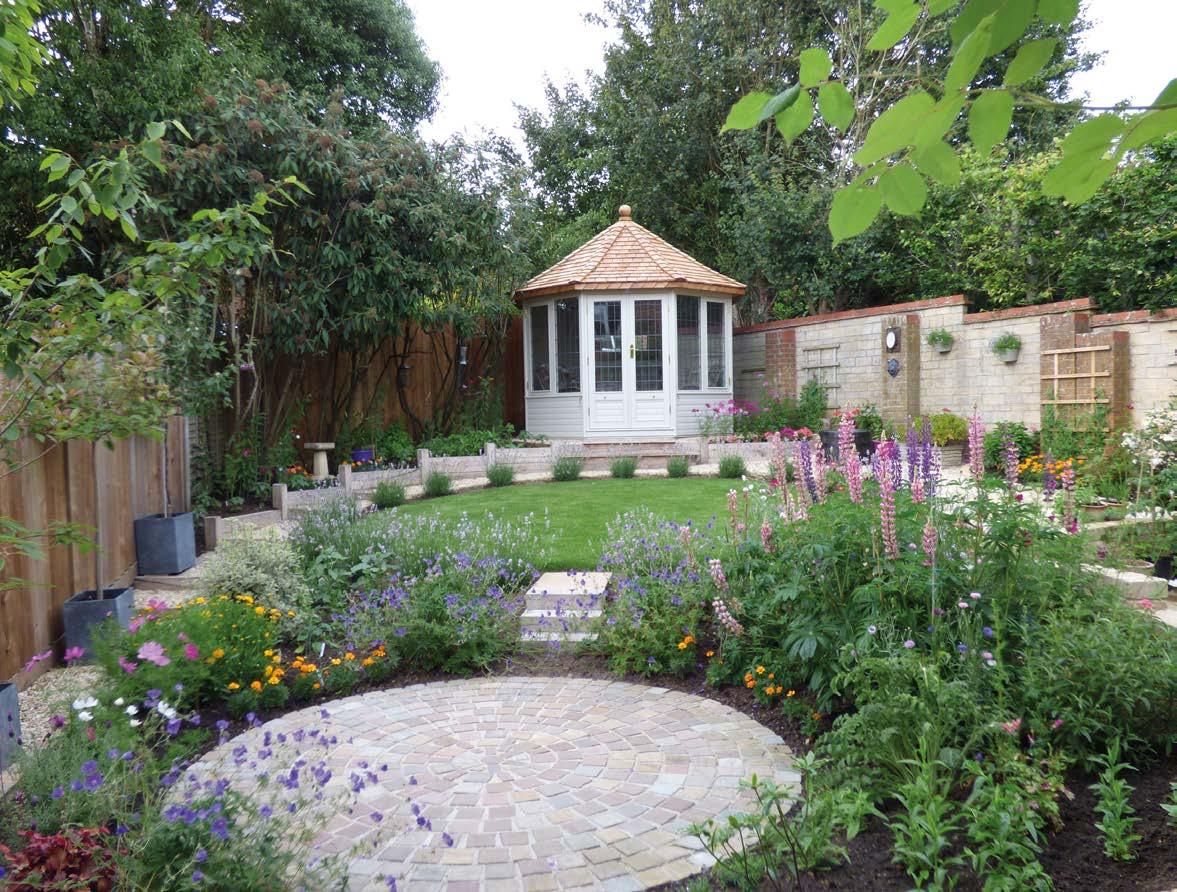
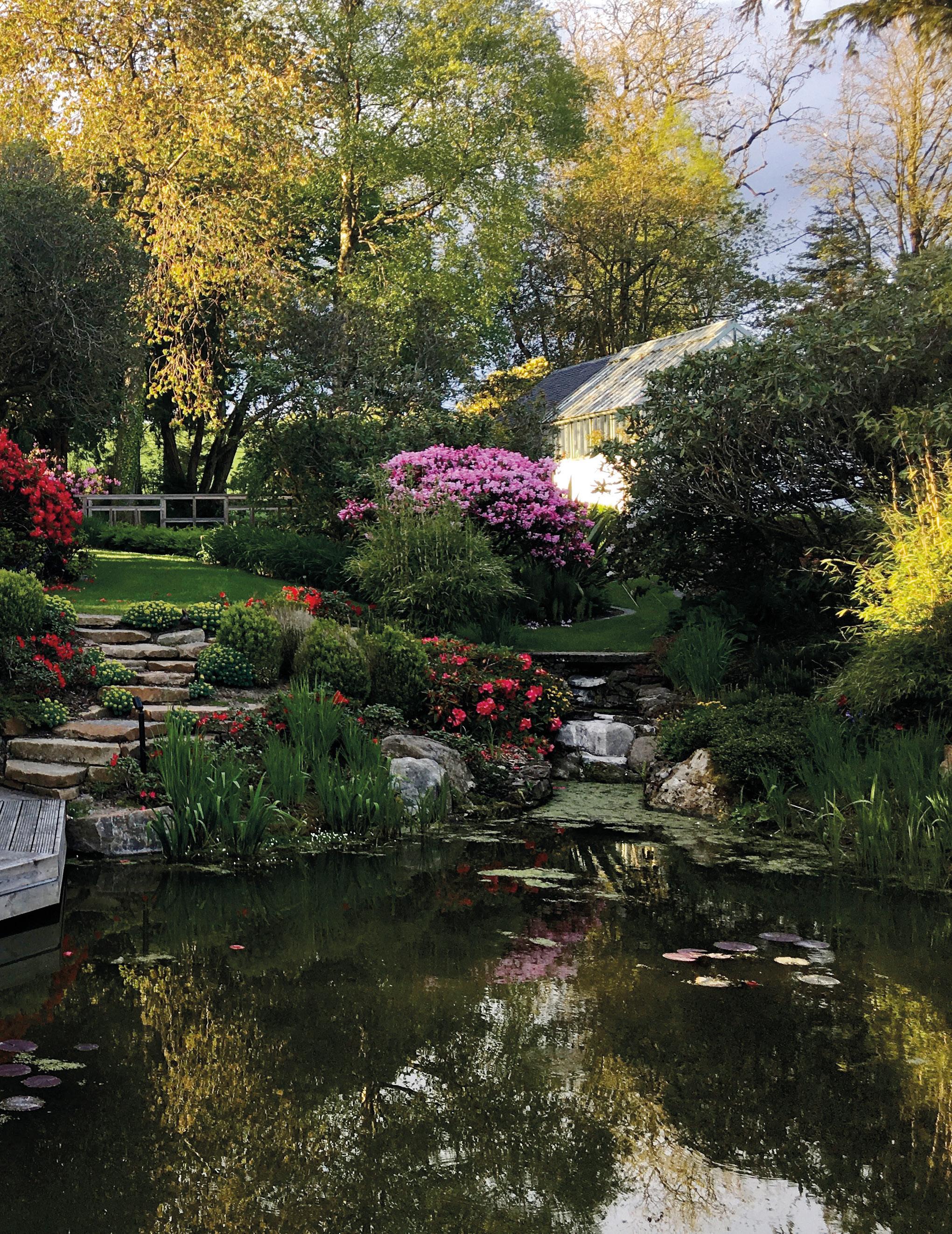


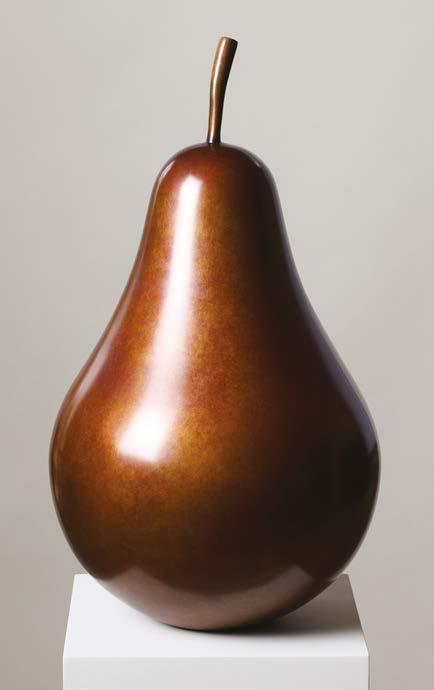
T: +44 (0)7729 705257 E: enquiries@jamesparkersculpture.co.uk www.jamesparkersculpture.co.uk
and
glass,
and stainless steel
in Scotland – working worldwide
Bespoke sculpture for the home, garden
public spaces slate,
bronze
Based
Sweet DREAMS
Louise Allen and Piers Newth dreamt of spending more time in their beautiful and sustainable garden at the aptly named Dreamers Cottage in Oxfordshire, and a change of focus in their vintage tool business let them do just that

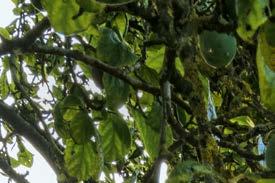


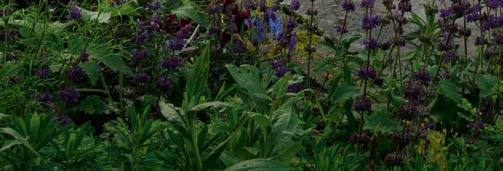




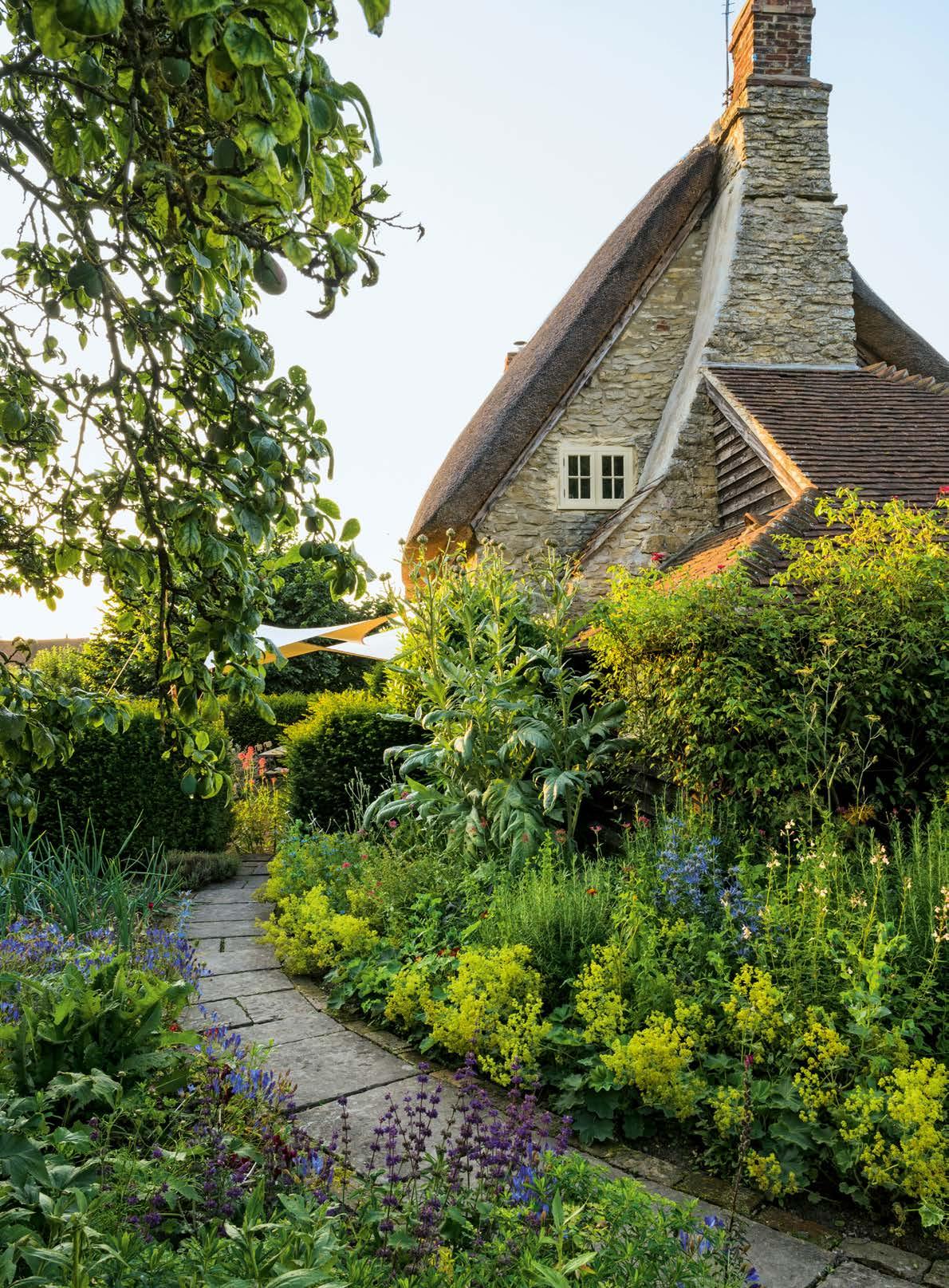
JULY 2023 THE ENGLISH GARDEN 51
WORDS LIZ WARE PHOTOGRAPHS ANNA OMIOTEK-TOTT
Idyllic, thatched Dreamers Cottage is the former gamekeeper’s cottage to the nearby estate of Haseley Court.

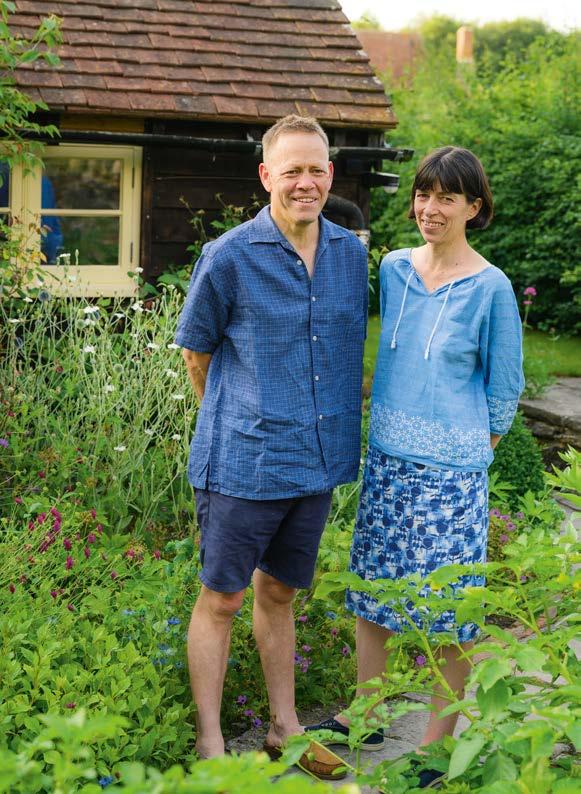
 Above Box balls and hedges bring structure to loose, informal planting.
Below right Vintage gardening tools for sale.
Below left Piers Newth and Louise Allen, owners of Dreamers Cottage.
Above Box balls and hedges bring structure to loose, informal planting.
Below right Vintage gardening tools for sale.
Below left Piers Newth and Louise Allen, owners of Dreamers Cottage.
Gardening with the future of the planet in mind is important to many of us. It’s something horticulturists Louise Allen and Piers Newth have been practising for two decades at Dreamers Cottage, in the Oxfordshire hamlet of Little Haseley. “We were aware that the world was heading for an environmental ‘car crash’,” says Louise. “We wanted to live a more sustainable life, but to do it in a beautiful way.” Evidence of sustainable beauty can be found throughout the third of an acre garden surrounding their thatched cottage. From the paths, gates and fences to the rescued and renovated tools that tend the produce, everything plays a part in their vintage tool business, Garden and Wood.
Louise and Piers met as students at RHS Wisley. Years later, while working in senior management roles at Oxford Botanic Garden and Harcourt Arboretum respectively, they began to think about shifting their focus. “We wanted to spend more time in our own garden, doing the things we enjoy,” recalls Louise. “We started Garden and Wood five years after we moved here, and the garden soon became a backdrop to the business.”
Top Rows of brightly coloured flowers for cutting fill this highly productive garden.
Above Bold red climbing rose, Rosa ‘Illusion’, which Piers and Louise grow for its contrast with their mellow stone walls.
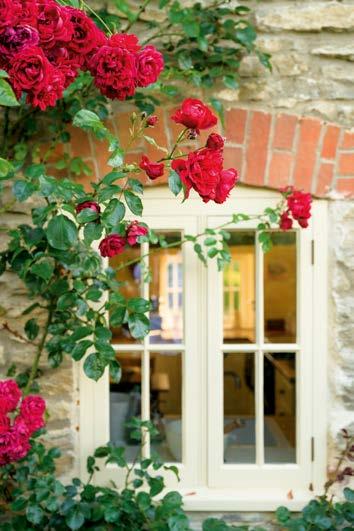
Part of the attraction of Dreamers
Cottage, formerly a gamekeeper’s cottage to the nearby estate of Haseley Court, is its location. “It’s on the village green but set well back from the road,” explains Louise. “We were drawn to the borrowed landscape outside the garden gate. A previous owner of Haseley Court had the power lines around the green buried underground.” Today, anyone visiting the couple will cross the green to reach the front door. It’s rather like stepping back in time – a fitting introduction to a business selling old tools and garden ephemera.
O ering a colourful welcome to the cottage is the vibrant Rosa ‘Illusion’. “Pastel shades don’t work against these stone walls and ‘Illusion’ is a strong enough red to be seen from the road,” observes Louise. “It came from a nursery in Belgium,” adds Piers. “We massacre it every year and it seems to thrive. It has glossy leaves and great hips, but it does have huge thorns.”
The garden was completely overgrown when Louise and Piers took it on. Today, well-managed hedges and clipped box balls provide a strong structure, but one that doesn’t overwhelm. By July, fresh growth brings a subtle softening to any sharp
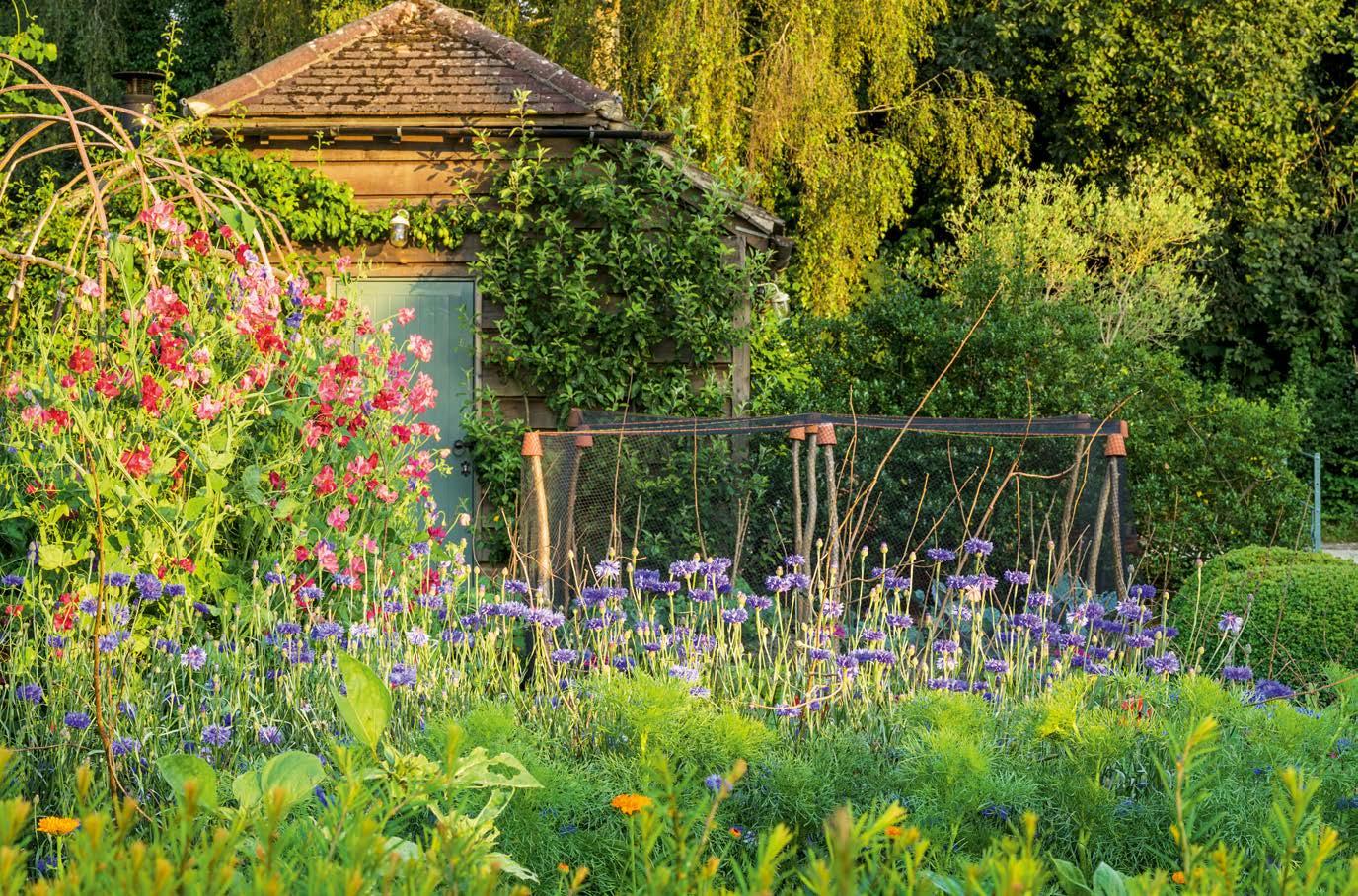
JULY 2023 THE ENGLISH GARDEN 53
Left A tunnel of beans and fragrant sweet peas. Below The couple inherited this huge old plum tree, underplanting it with pink valerian, geraniums, box balls and beds of vegetables.
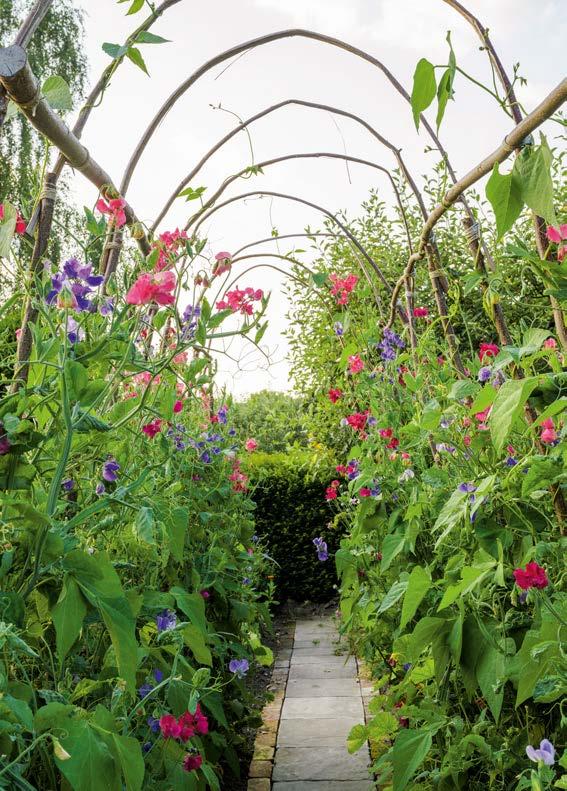
edges. “We’re careful to keep the hedges at a height that feels private when we’re sitting and relaxing, but not so high that we’re shut o from the green outside,” says Louise. “When we started to think about hedging, we knew we wanted the garden to relate to its surroundings. Yew around the boundary would have been too severe so we’ve used it to divide the garden instead. At the front of the house, we put in a hawthorn and rose hedge. Piers dug up old rose suckers from around the garden and planted one for every three hawthorns. The dunnocks love it. I have a small desk by the window at the front of the house and sometimes they’re almost too distracting.”
The soil at Dreamers Cottage is quite heavy and takes a while to warm up in spring. “This is a proper productive garden,” Louise points out. “The flower
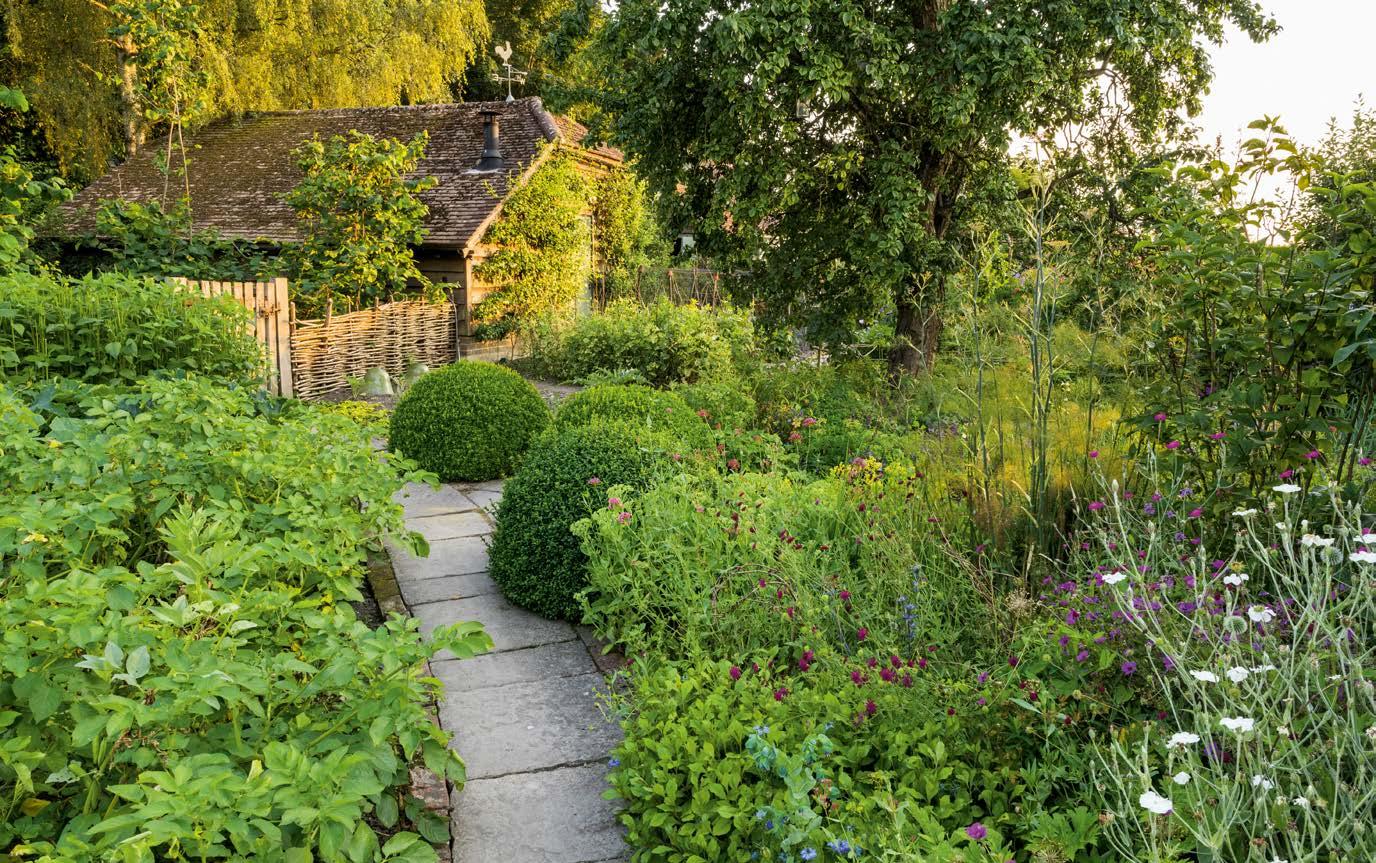
54 THE ENGLISH GARDEN JULY 2023
“We had a traditional training, but we’re shifting to ‘no dig’. It’s exciting to have been taught one thing but to try something else”
borders are almost incidental. We grow flowers in beds where nothing edible wants to grow. There were a lot of fruit trees when we moved in, but we are quite callous. If a tree doesn’t feed us well, it’s out.” Piers declares the best to be an old plum: “We think it’s 100 years old. It has the most delicious fruit. Early and dark skinned. No one has identified it conclusively yet.”
“We’ve both had a traditional horticulture training, but we’re shifting to ‘no dig’,” continues Louise. “It’s exciting to have been taught one thing but to try something else. Last year we grew potatoes and then squash in a no-dig bed by the workshop. We also grew squash traditionally. The squash in the no-dig bed didn’t need watering even in last summer’s heat. We were really impressed.”
The most floriferous part of the garden is the border around the old plum. By July, faded euphorbias have been upstaged by geraniums, valerian, Alchemilla mollis, and Lychnis coronaria. As anyone who plants for succession knows, the seemingly e ortless cottage garden feel is deceptive. “This is a very needy border,” says Louise. “It’s more work than anything else in the garden. The straight lines in the vegetable borders make everything much easier to care for, so we grow a lot of our cutting flowers like peonies, salvias, dahlias, zinnias, and
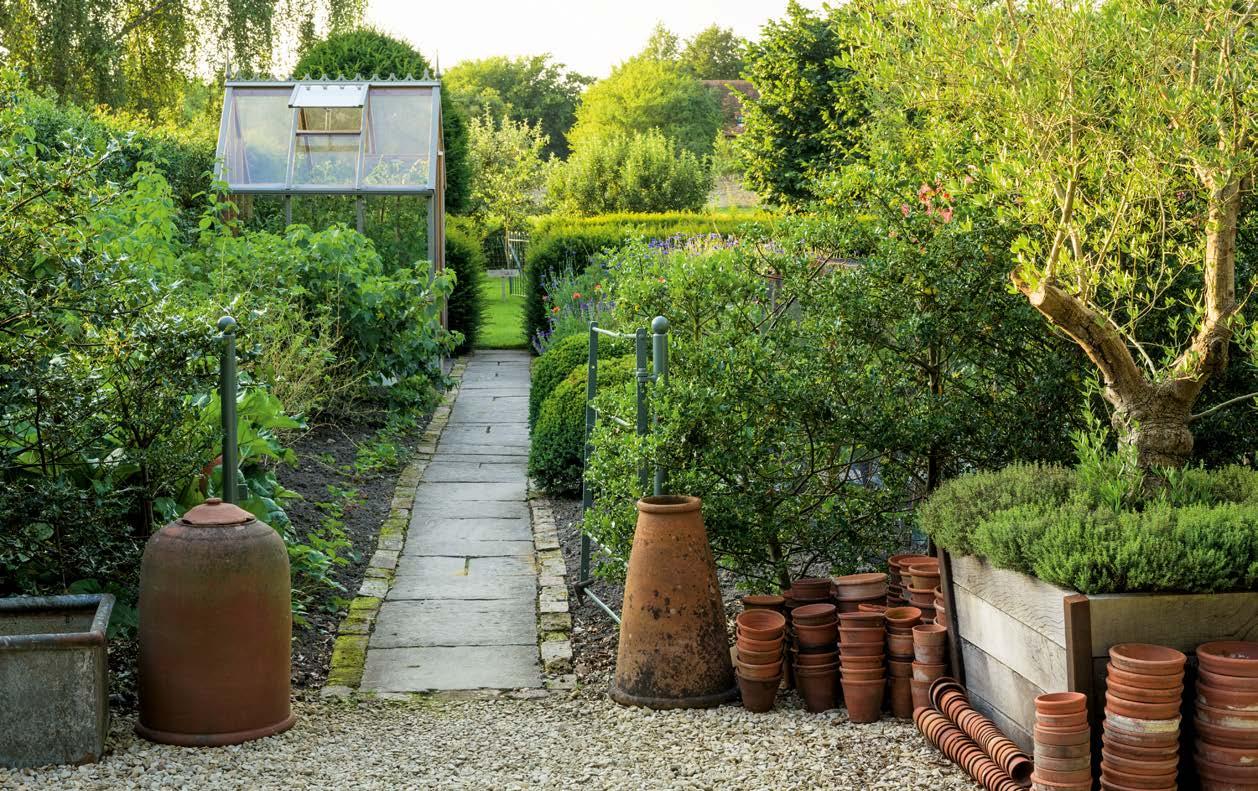
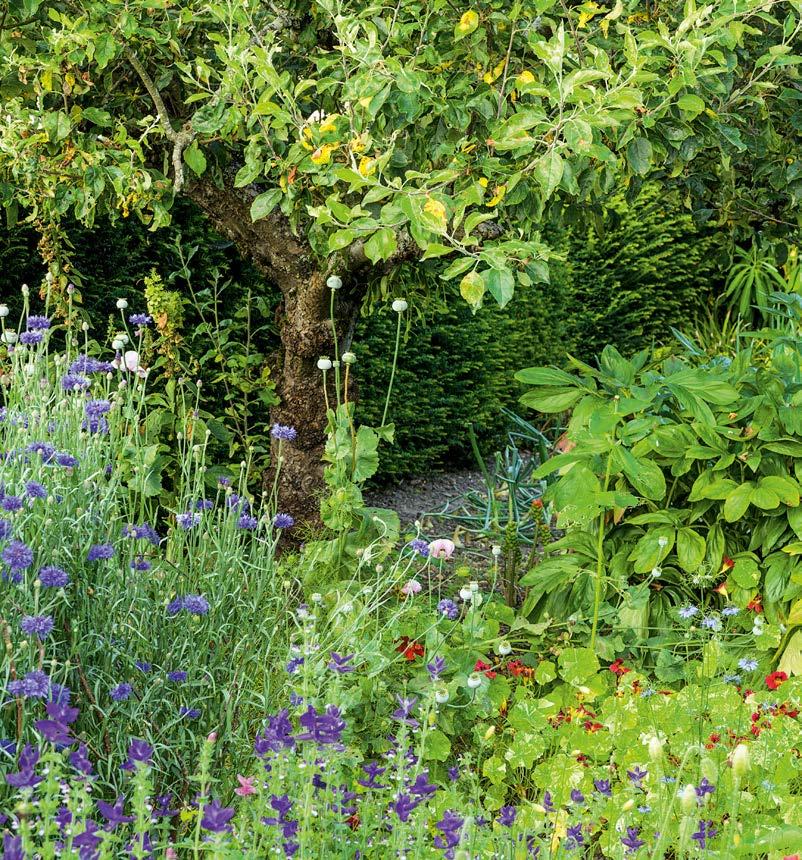
JULY 2023 THE ENGLISH GARDEN 55
Above Vintage terracotta pots are neatly stacked around a large wooden planter containing a gnarled olive tree that’s underplanted with a carpet of bushy thyme. Right Many old fruit trees were already growing in the garden when the couple moved in.

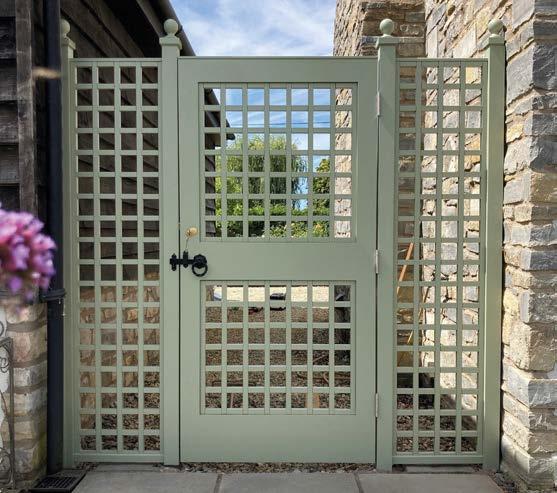
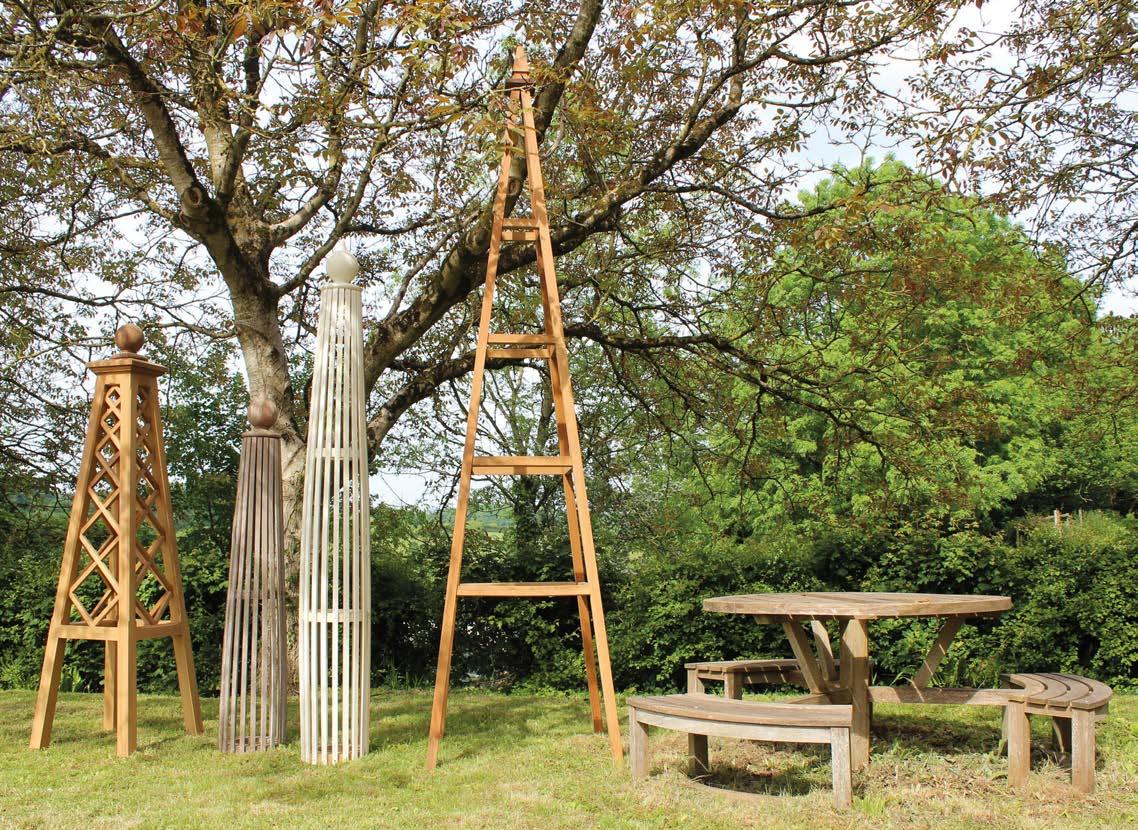
sales@stuartgarden.com www.stuartgarden.com Stuart Garden Architecture OBELISKS From le Gothic Obelisk £1,325, small Rose Spire £875, large Rose Spire £1,195 (painted add £295), New Obelisk ex-large £1,135, also available in small, medium and large, Picnic Table with Seating £2,595. All prices include VAT. 01984 667458
cosmos in straight lines too. It makes cutting them for a second flush and for the house much quicker.”
Louise’s love of colour is evident everywhere. Nasturtiums, calendulas, zinnias and the last of the poppies add bright splashes here and there. Pots of orange kalanchoe decorate every outside table. The couple’s favourite sweet pea, ‘Cupani’, is one of many climbing along the hazel arch through the middle of the productive garden. “We don’t cut anything that’s pastel toned. I like bright colour in the house; I always have,” she maintains.
A well-worn gate, a woven willow fence and a path of stones, collected while creating the vegetable garden, lead to the coppice where the couple grow hazel for pea sticks. “It’s useful and is a nod to the village’s name – Little Haseley,” says Louise. The hazel is heavily underplanted. Early snowdrops are followed by hellebores, anemones, primroses, and wild garlic. “It just keeps on getting better. What’s more, the hazel hides the compost bins and a not very beautiful summerhouse. One Christmas Eve we rolled it here so that I could use it as a shed. There’s
Above The sweet pea arches and twiggy supports are made from hazel cut from plants in the adjoining coppice. Right Renowned self-seeders fennel and Alchemilla mollis add to the relaxed, cottagey planting, alongside sedums and valerian.


JULY 2023 THE ENGLISH GARDEN 57
Louise’s love of colour is evident: “We don’t cut anything that’s pastel toned. I like bright colour in the house”
Left
a lovely canopy of green here in summer and we enjoy the seasonally changing underplanting.”
There are many examples of horticultural excellence at Dreamers Cottage, but one deserves special mention. Against the workshop wall, the pear ‘Doyenné du Comice’, bought as a whip from Waterperry Gardens, is trained to perfection by Piers. What better way to prove the quality of tools the couple sell, not just to keen gardeners but also to avid collectors. “Look at catalogues from the 1920s,” says Piers. “Gardeners had much more choice. There was a spade for every task and di erent handle types and lengths to choose from.” Louise adds: “We love it when someone buys something that fits them.”
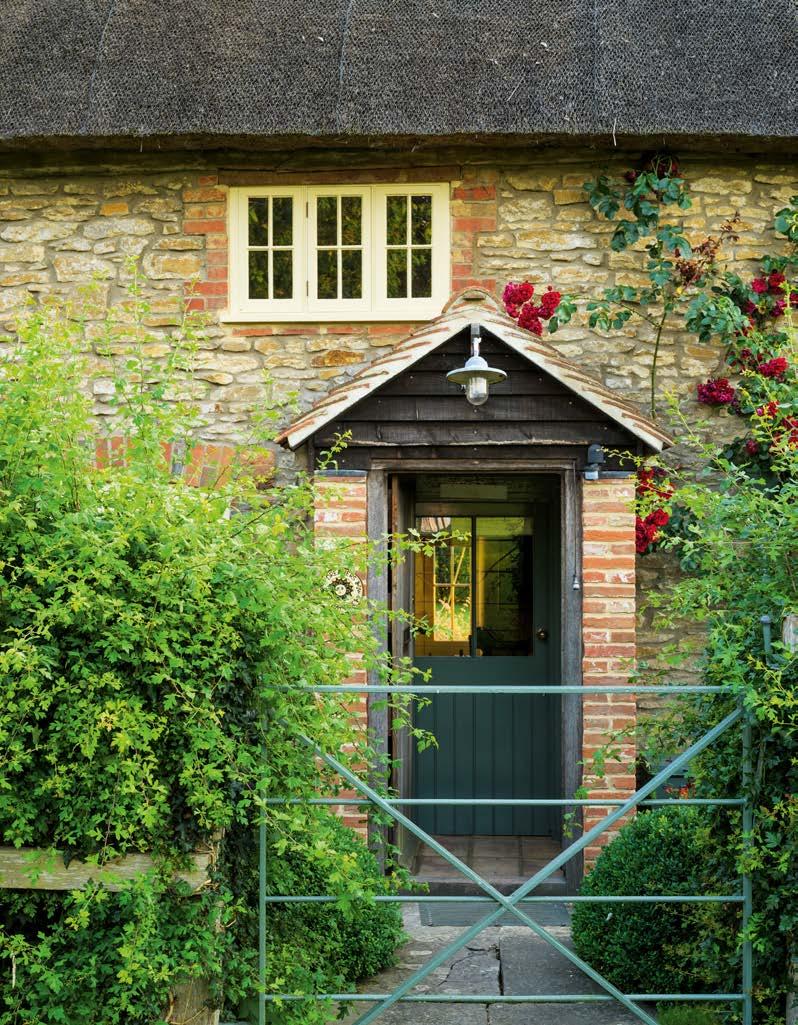
As the couple’s business grew, they travelled to an increasing number of shows to attract customers. Their dream of spending more time in their own garden seemed remote – until the pandemic struck. “Lockdown worked in our favour because people connected with us online,” says Louise. “We’d given up our horticultural jobs to spend more time in the garden. Thanks to lockdown we can do that properly now. Dreamers Cottage is a celebration of gardening. We hope visitors feel inspired.” This is indeed a garden full of inspiration – and for anyone who loves old tools, a great deal of temptation. n
Garden visits can be arranged by appointment, visit gardenandwood.co.uk. Follow Louise and Piers on Instagram @gardenandwood
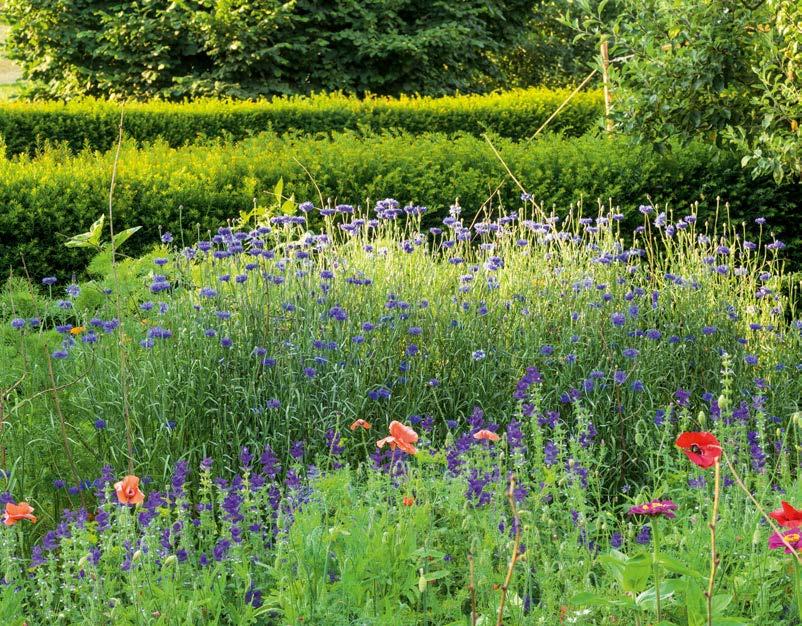
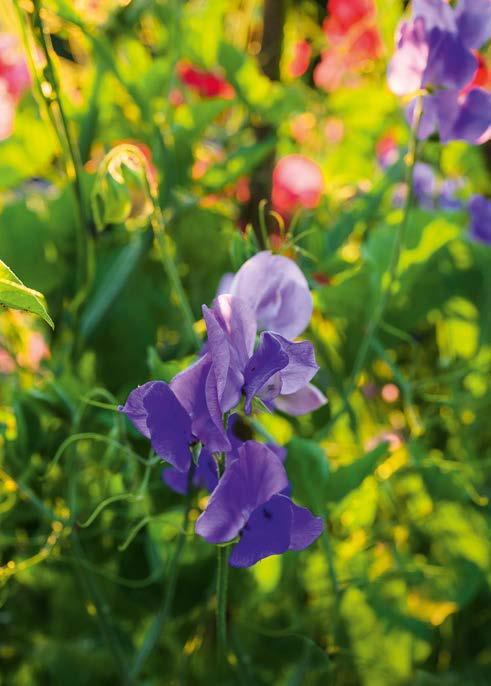
58 THE ENGLISH GARDEN JULY 2023
Above Beautiful mauve sweet pea blooms. Try modern grandiflora ‘Heathcli ’ for similar.
The rustic porch to the cottage inside the hedged front garden. Below Blue annual cornflowers and purple clary sage provide bunches of cut flowers.
A better garden starts with a better plant
unique & innovative
award winners
Buddleja Rocketstar® series




















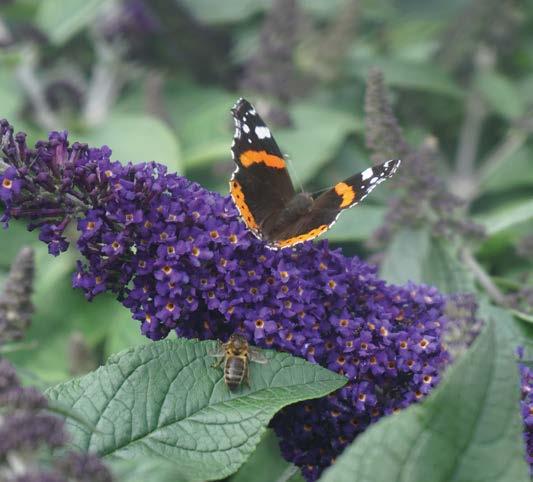
Before they reach your garden PROVEN WINNERS® shrubs undergo many years of trials and testing for colour, fragrance, number of blooms, foliage and reliability. Only a few prove they are worthy to become a PROVEN WINNERS® plant.



To get the best quality plants ask your local garden centre for PROVEN WINNERS® or look for the recognisable white container.
www.provenwinners.eu





easy to maintain
multiple seasons attractive
Rocketstar® Orchid
Rocketstar® Flamingo
Rocketstar® Indigo
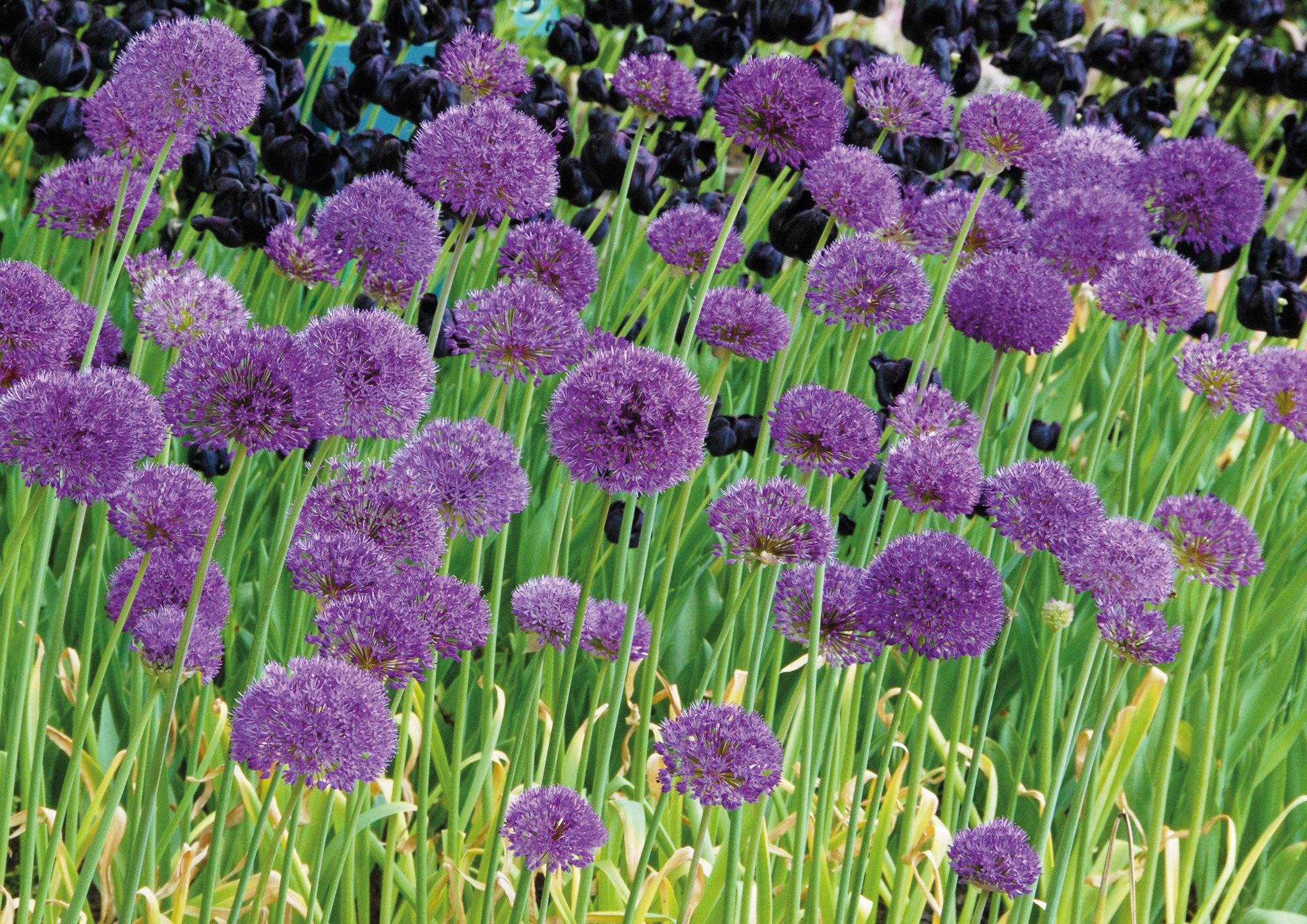













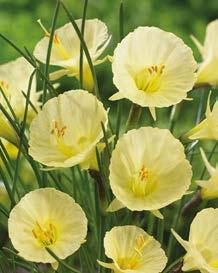








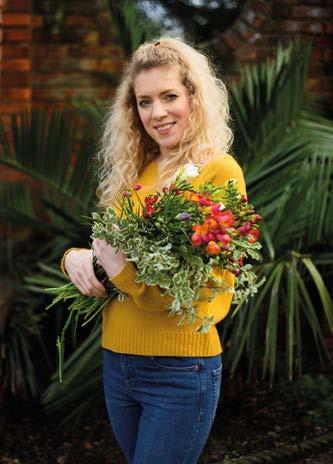
CONNECT








Tasked with linking a rather modern and open cottage garden to the surrounding Cheshire countryside, designer Janine Crimmins has thoughtfully restructured and punctuated the space to create unity and cohesion


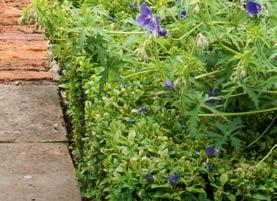

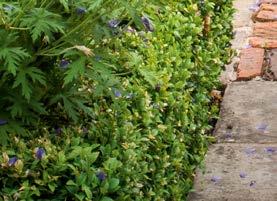



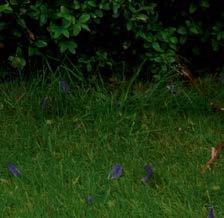
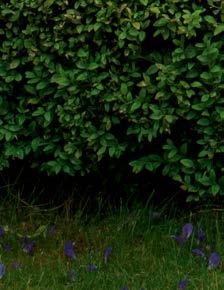





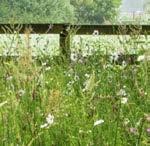

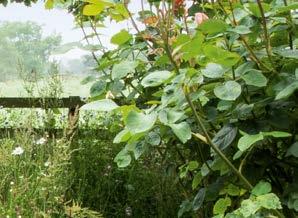


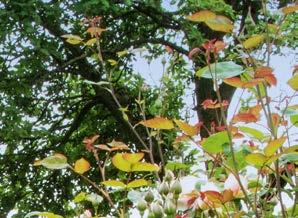





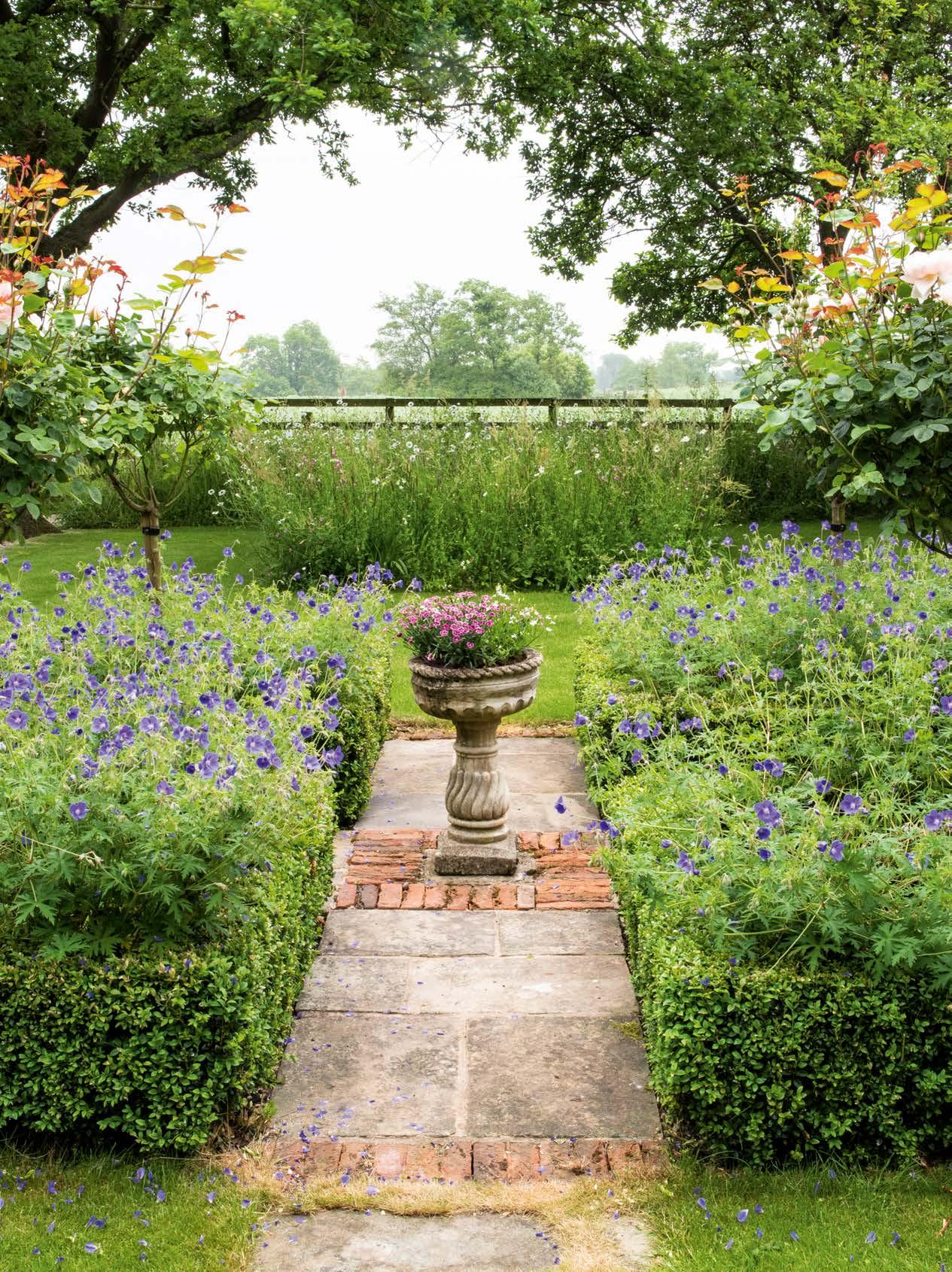 WORDS ANN COOKE PHOTOGRAPHS DEREK ST ROMAINE
WORDS ANN COOKE PHOTOGRAPHS DEREK ST ROMAINE
Only
JULY 2023 THE ENGLISH GARDEN 61
A perfectly framed view out to the fields beyond this Cheshire cottage garden, with a sweep of wildflowers linking to the borrowed landscape.
The creation of a garden is often about making connections. Forging links between indoor and outdoor spaces and the people who inhabit them. The point is perfectly illustrated by this red-brick cottage set in the undulating Cheshire countryside. Over the years in which they have lived here, its owners have progressively renovated the house to create a muchloved family home. But once their children had grown and there was no longer any need to accommodate trampolines and football pitches, they felt it was time to turn their attention to enhancing the garden.
Local garden designer Janine Crimmins was contacted following a recommendation that she might be the perfect choice to help the owners achieve their vision. “We promote ourselves as specialising in an English country garden style,” explains Janine. “It’s important for us to work with
Above The pool is screened by yew hedging, while the path comprises handmade clay bricks in a soft shade of terracotta.

Below Try Dianthus ‘Purple Wedding’ for similar scented pinks.
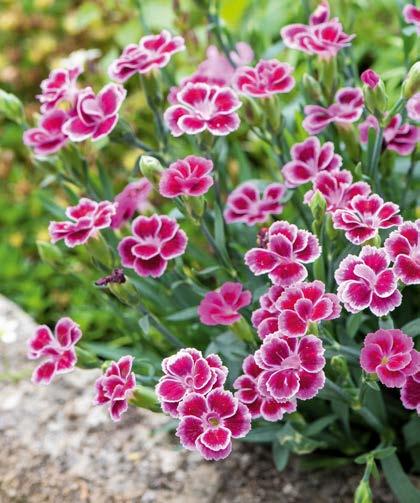
clients who share our ideas. When we meet people, we get a sense of where they want to go.” On this occasion it was clear right from the start that designer and client had complementary tastes and would work very well together.
When Janine first visited the garden, it was very open with a tennis court and swimming pool dominating the space. She felt the style of the garden didn’t link particularly well with its rural location. “It wasn’t very ‘country’,” she recalls. Her brief was to create a colourful cottage garden, adding structure to the space while enhancing its connection with the surrounding landscape. The clients also wanted the garden to look like it belonged to the cottage and had always been there, so Janine set about breaking it up into rooms. “The idea was to reduce the expansiveness of the space and bring it more into scale with the house,” she explains. “We also felt it would create more interest.”
62 THE ENGLISH GARDEN JULY 2023

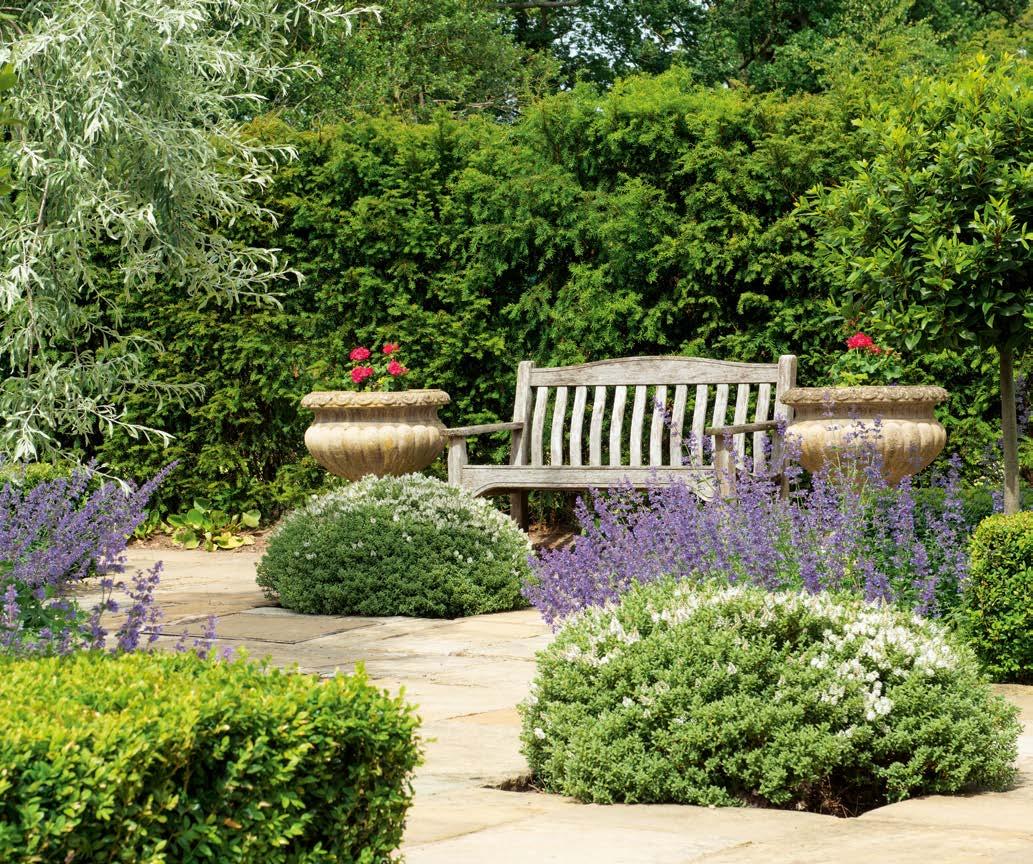
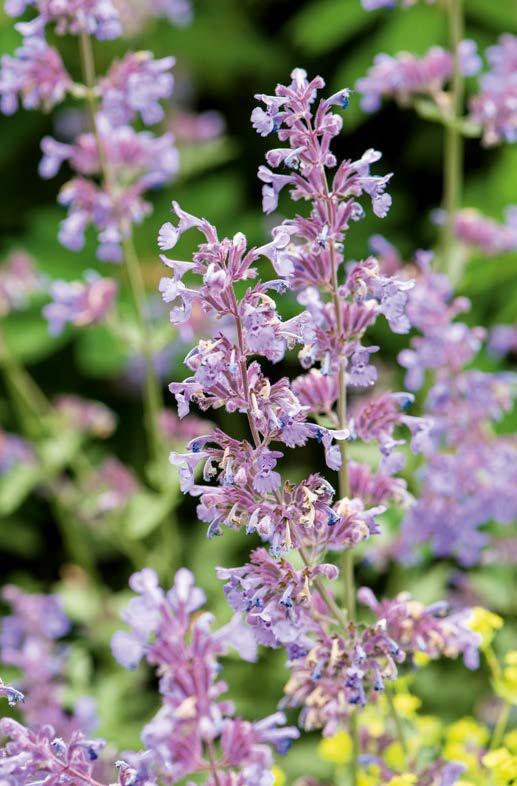

JULY 2023 THE ENGLISH GARDEN 63
Top middle Bee-friendly Nepeta racemosa ‘Walker’s Low’.
Top right Clipped bay trees bracketed by low box hedges in the formal courtyard area, with stonework by Janine’s husband Andy Loudon. Right Plump cushions of Hebe pinguifolia ‘Sutherlandii’ and catmint, overlooked by silver Pyrus salicifolia.
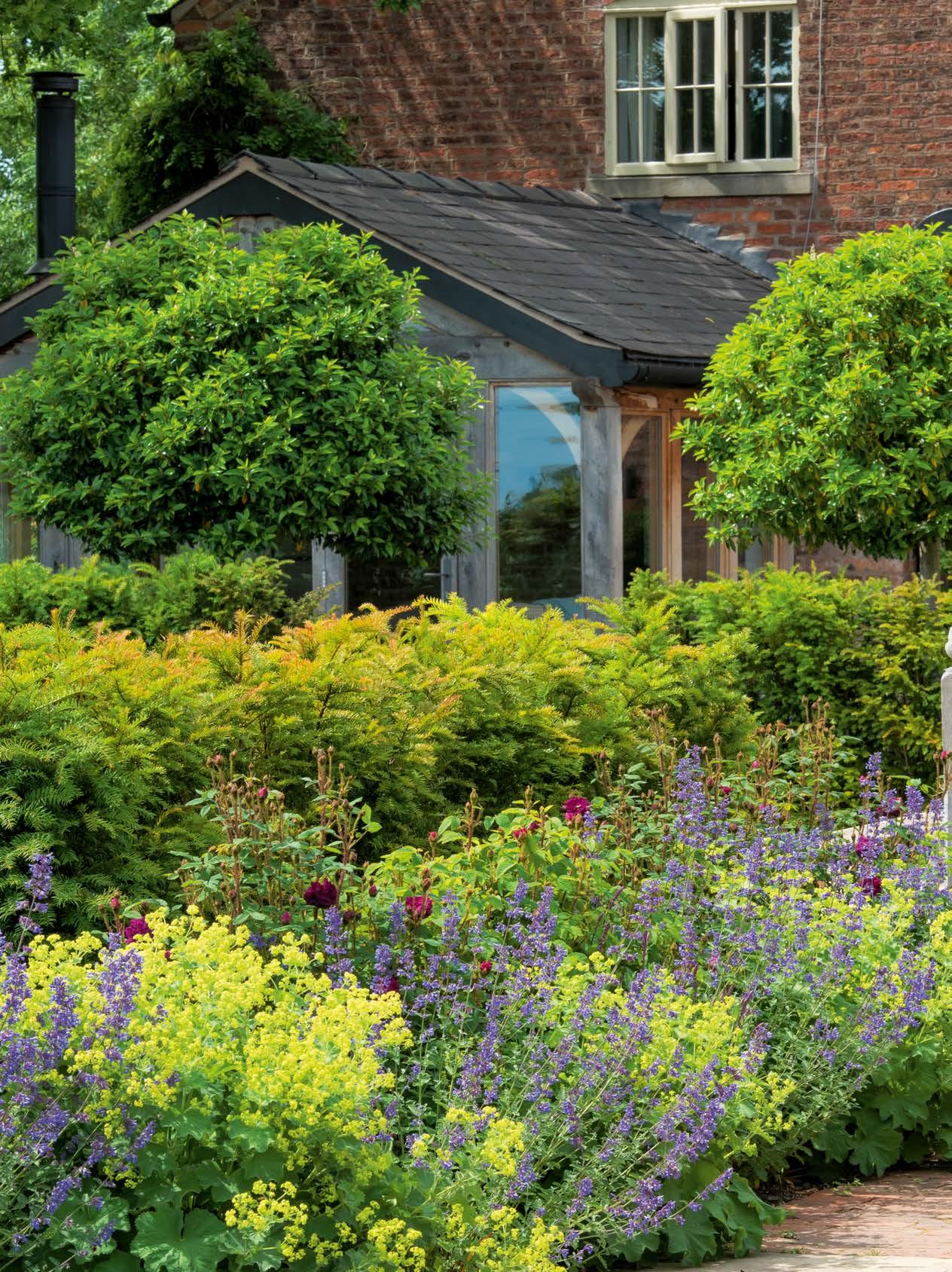


 Zesty Alchemilla mollis contrasts with soft lilac catmint, with rich burgundy accents from sumptuous old rose ‘Cardinal de Richelieu’.
Zesty Alchemilla mollis contrasts with soft lilac catmint, with rich burgundy accents from sumptuous old rose ‘Cardinal de Richelieu’.
Janine started by tackling the courtyard that links the front of the cottage to the garden at the rear. It is the first area people see when they arrive, so it needs to look good throughout the year. Janine works in collaboration with her husband, Andy Loudon, a Master Craftsman dry stone waller. For this reason stonework often features in her designs, and the courtyard o ered up a perfect canvas. There was already some York stone present on site, which has been integrated into the redesigned garden. Indeed, using either reclaimed or locally sourced stone in a build is a key principle for Janine. “It’s about everything having a sense of place so it looks like it belongs and isn’t contrived,” she says. “Keeping things local and English is a conscious decision.”
The layout of the courtyard is relatively formal and symmetrical. Height is added with clipped bay trees in each quarter and a Pyrus salicifolia ‘Pendula’, with its silvery foliage and distinctive form, providing a central focal point. Bracketing each bay tree is a low box hedge, while the paving is punctuated by clumps of purple Nepeta racemosa ‘Walker’s Low’ and compact domes of
Below In this simple seating area, squares of box hedging enclose standard roses that have been underplanted with great billowing clouds of violet Geranium sylvatica ‘Mayflower’.
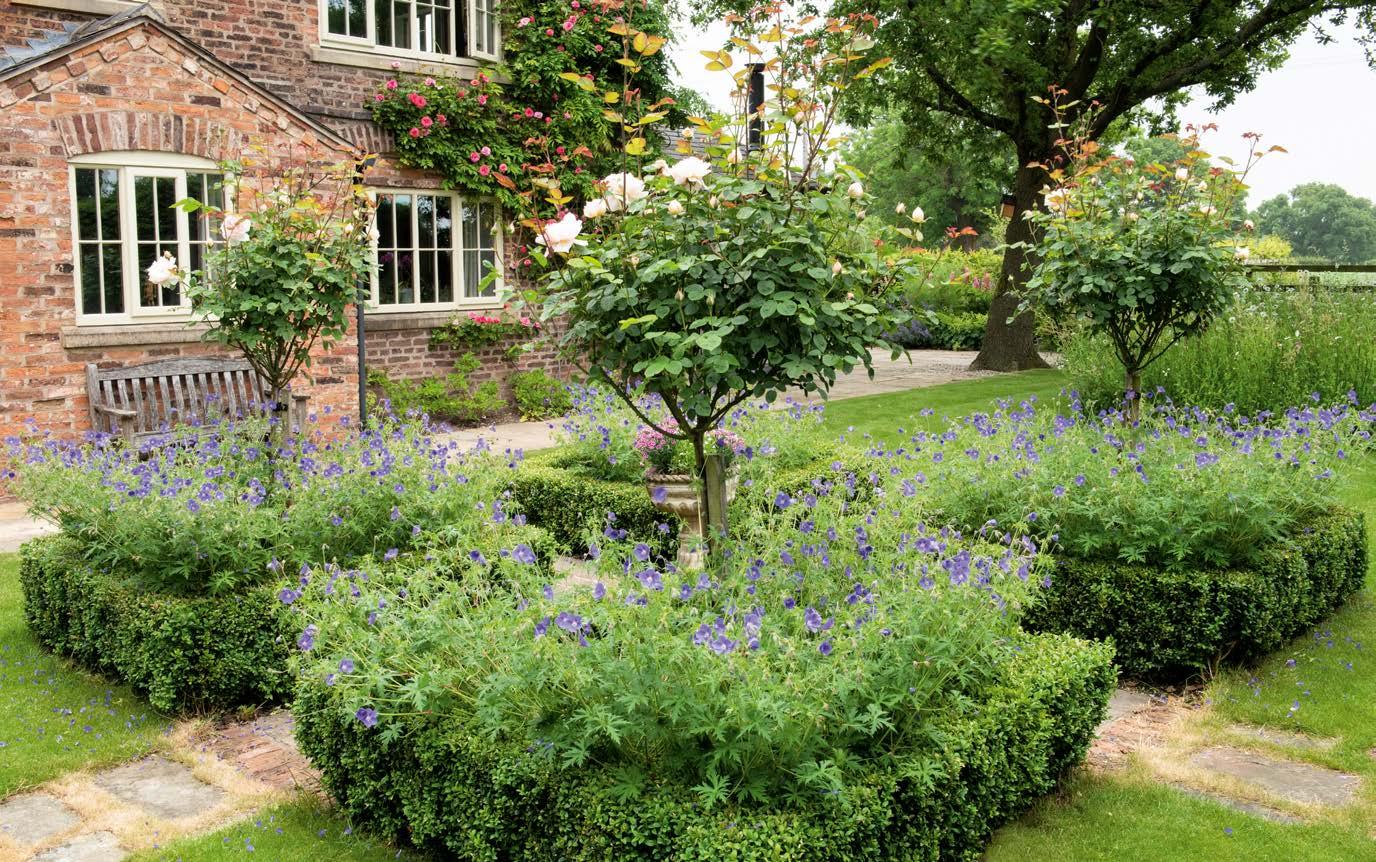
Hebe pinguifolia ‘Sutherlandii’. Pebble details add further interest and contribute to a sense of craft and tradition. Many of these elements are repeated elsewhere in the garden, creating continuity between di erent areas to ensure they feel part of a whole.
The swimming pool at the cottage’s rear has been screened with yew hedging to reduce its dominance, with gaps allowing glimpses of the garden and countryside beyond. Two Prunus lusitanica form an entrance to the pool. “They give a sense of separation while adding height,” notes Janine. Paths of handmade clay bricks and oak fencing harmonise the space with the adjacent buildings, and hard landscaping is softened with clusters of Erigeron karvinskianus daisies spilling out around the edges. Janine explains that a key challenge became evident when drawing up the plans for this area. “Everything was at weird angles. None of the buildings or even the pool lined up with each other.” This was solved by using planting and pebble detailing to disguise the irregular angles so they recede from the naked eye.
Enveloping the outside of the pool area are borders of cottage garden favourites such as lupins,
JULY 2023 THE ENGLISH GARDEN 65
Alchemilla mollis and foxgloves, along with ‘Cardinal de Richelieu’ roses and further sprays of catmint. Roses do well on the heavy clay soil here and are found throughout the garden, with many climbers trained against the warm brick walls of the buildings. The colour palette is largely soft and romantic in shades of pink, white and purple.
As the garden wraps around the cottage, it leads to a simple but e ective seating area. Squares of box hedging enclose standard roses underplanted with billowing clouds of violet Geranium sylvatica ‘Mayflower’. Lawn then gives way to more naturalistic wildflower planting including ox-eye daisies and ragged robin, linking this formal area with the borrowed landscape of surrounding fields: a vista to enjoy as the evening sun begins to fade.
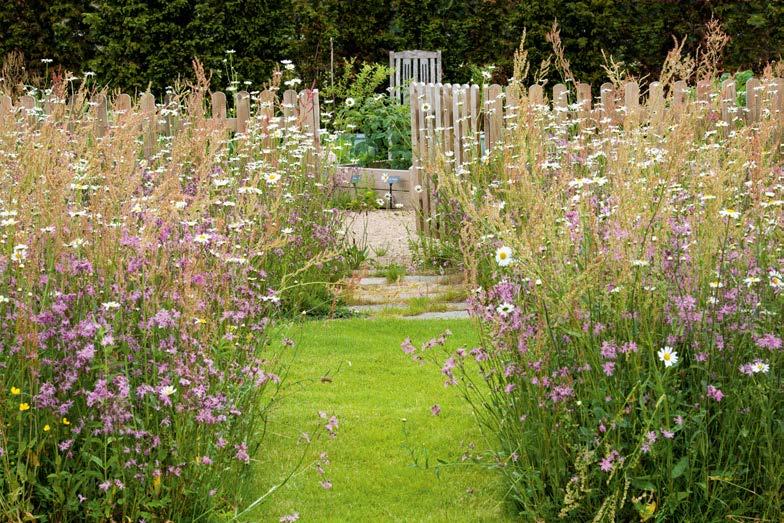

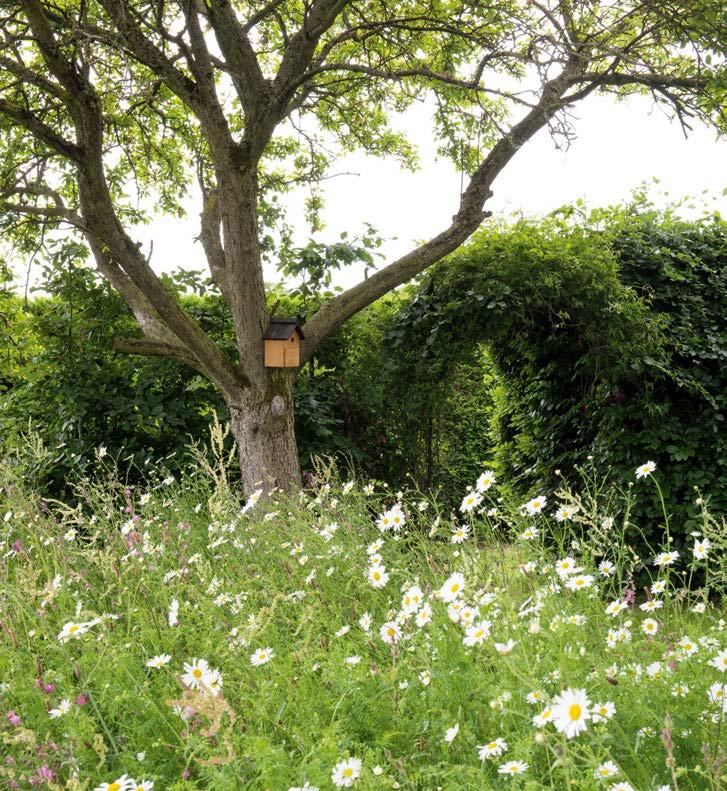
To the rear of the house is a dining area that’s also built from handmade clay bricks. Hotter colours are found here, with orange Geum borisii and deep-red astrantia complementing the brickwork and delivering a punch of contrast. Adjacent to this area are further drifts of wildflowers through which grass paths are mown, giving way to a new vegetable garden edged with a wooden picket fence. Through tending this patch, the clients have well and truly caught the bug for growing edibles and now intend to expand this area. The tennis court that once commanded attention from this part of the garden has now receded from view behind tall hedging.
The final stage in this ongoing project is the creation of a large pond that will be landscaped to blend in with the surrounding countryside. Janine’s
clients say they feel a stronger connection to their outdoor space now and Janine reflects that this is quite common for those that have their garden professionally designed. “Lots of clients become more interested in gardening and use their garden more than they did previously because they like it. We tend to turn people into gardeners!” she says. A noble achievement, I think we can all agree! n
Janine
Crimmins
Garden Design. Tel: 07813 277449; janinecrimmins.com
66 THE ENGLISH GARDEN JULY 2023
Top left A naturalistic planting of ox-eye daisies and ragged robin links to the fields beyond. Top right Surrounded by a froth of Erigeron karvinskianus is a weathered stone planter filled with pink dianthus. Above Mown paths through drifts of wildflowers lead to a new vegetable garden.

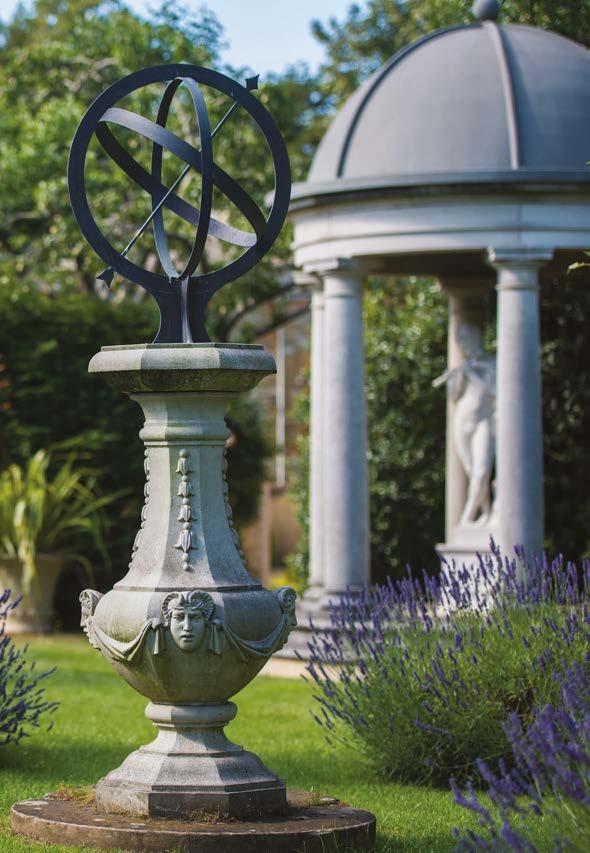
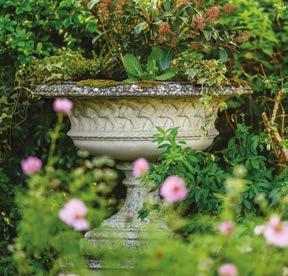

JULY 2023 THE ENGLISH GARDEN 67 Create your perfect garden with fine quality designs, hand crafted by Haddonstone Call 01604 770711 Visit haddonstone.com
Enchanted ISLE
Overlooked by a fairytale tower, the magical gardens of La Seigneurie on the tiny island of Sark have been developed by generations of a feudal family since Elizabethan times
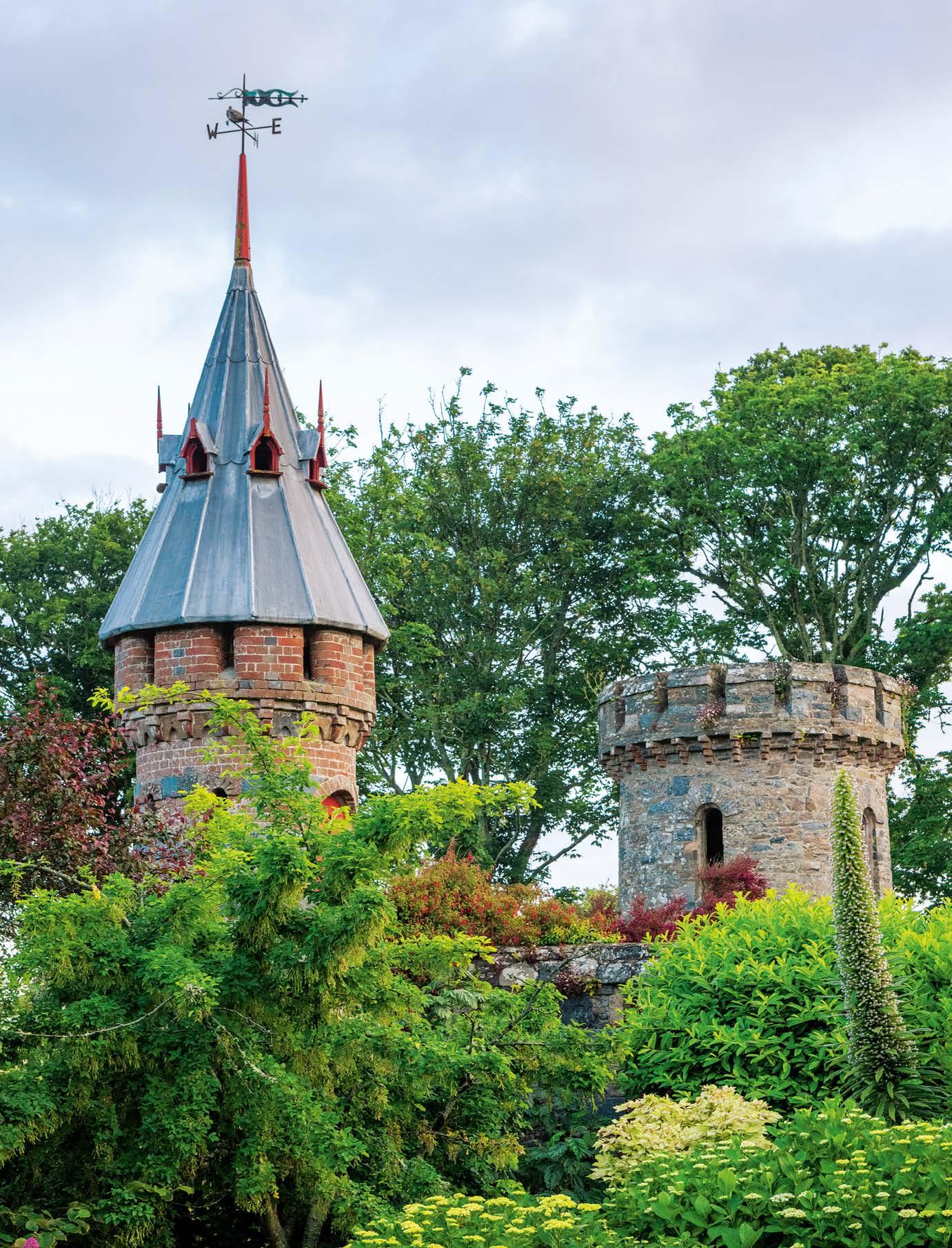 WORDS & PHOTOGRAPHS NICOLA STOCKEN
WORDS & PHOTOGRAPHS NICOLA STOCKEN
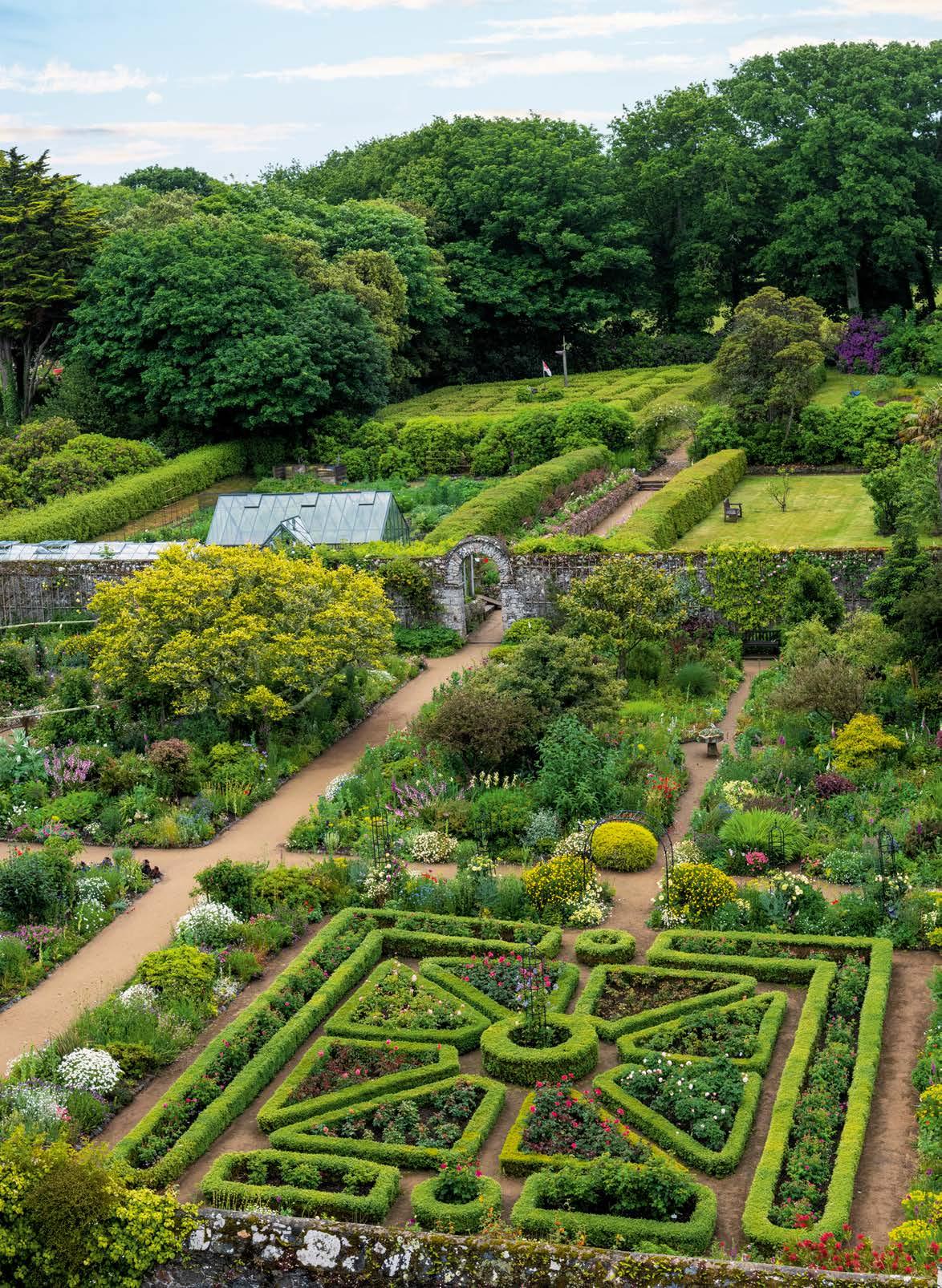



JULY 2023 THE ENGLISH GARDEN 69
This image The walled garden is divided into a rose parterre, informal gardens, kitchen gardens and a maze.
Opposite A Victorian dovecote and Georgian signalling tower rise above shrubs and trees.
No historic garden stands in isolation; it evolves unhurriedly at the whim of each generation, and it’s no di erent at La Seigneurie on Sark.
“The gardens reflect the people who have lived and gardened here, and what you see today is an accumulation of all their ideas alongside artefacts that reveal tantalising glimpses into the island’s history,” says Christopher Beaumont, the 23rd Seigneur of Sark, a titular role since 2008 when islanders voted for democracy in place of a feudal system that had lasted since Elizabethan times.

Since moving to La Seigneurie with his wife, Sarah, in 2016, Christopher has focused on the neglected two acres to the back of the house, with its woodland and serpentine lake. “This is where I played as a child,” he recalls. “The walled garden was formal and floral and felt as if it was kept for best, whereas the back area had water, fish, trees and an old well and was full of history.” The lake harks back to the 6th century when a monastery was established by the Priory of Saint Magloire. “Monks dammed the stream to form a reservoir for their watermill and for breeding carp,” explains Christopher. “I’ve built a bridge for the lake, and my next major project is to drain and dredge it.”

Although rich in history, Sark is small in size, being just three miles in length and about half that in its widest part, making it the fourth smallest of the permanently inhabited Channel Islands. “It has 40 miles of coastline, which are among the most varied and beautiful in the British Isles,” says Christopher. But even inland, the sea makes its presence felt through strong, salt-laden winds that scorch the hedgerows bordering the narrow lanes from which cars are banned.
Free of tra c noise and the worst of the winds, the gardens at La Seigneurie are peaceful, the silence broken by little save birdsong and treetops rustling in the breeze. At their heart is the two-acre Victorian walled garden cocooned within imposing granite walls. Its atmosphere is distinctly otherworldly, a feeling that is reinforced by views of La Seigneurie’s tower, a fairytale structure built in the mid-1800s, with spectacular views across to Guernsey. “It looks incongruous – a Gothic-style tower added onto a traditional Jersey farmhouse – so it’s in e ect a fivestorey folly,” points out Christopher.
The walled garden is divided by walls or pathways into distinct spaces: a formal parterre known as The Dame’s Garden, the Millennium Rose Garden, a Pool Garden, oak arbours, kitchen gardens, a maze and a Victorian glasshouse on the north wall. “The glasshouse was rebuilt in the 1980s, with care taken not to disturb the vines or the original sliding pruning ladder,” Christopher explains. Outside, a climbing geranium stretches the full height of the wall, a mass of delicate pink blooms come June.
Above Leathery aeoniums thrive in the mild microclimate provided by this walled island garden. Right Christopher Beaumont, 23rd Seigneur of Sark, with his wife Sarah. Below La Seigneurie, home of the Seigneurs of Sark, with a Gothicstyle tower that was added to the farmhouse in the mid-1800s.
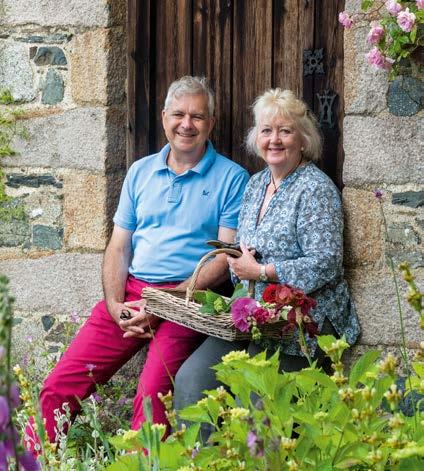

70 THE ENGLISH GARDEN JULY 2023
Above Deep mixed borders flank the central pathway in the Victorian walled garden
Left In the Dame’s Garden, vivid pink Rosa ‘Braveheart’ and paler peach-pink ‘Pretty Lady’ surround a central obelisk bearing Clematis ‘Prince Charles’.


It is one of a number of tender plants that flourish within the walls’ nurturing microclimate. Among them is a New Zealand tea tree, Leptospermum scoparium, and a bottlebrush plant, Callistemon citrinus, which thrives against the sun-drenched stone, standing somewhat incongruously within a stone’s throw of Rosa ‘Rambling Rector’, which roams very freely, despite recently being fiercely cut back. The soil is slightly acidic enabling camellias and azaleas to grow well, but there is an ongoing battle to eradicate the incredibly invasive three-cornered leek, Allium triquetrum
Even the softest sounds are magnified within the walls, so a fountain playing above a formal pool is heard long before it’s revealed behind tall yew cylinders. The pool is surrounded by beds filled with Rosa ‘Princess Anne’ and perennials
JULY 2023 THE ENGLISH GARDEN 71
Above
such as lupins, dianthus, hardy geraniums, cosmos and sisyrinchium. Self-seeders are encouraged –foxgloves, cornflowers, poppies, fennel and viper’s bugloss among others – giving the planting a certain freshness and spontaneity.

Right
The formal Dame’s Garden, a parterre laid out during the 1840s, is an intricate arrangement of low-growing clipped-box hedges. In recent years, many of its roses have been replaced with David Austin roses, chosen for their disease resistance, repeat flowering and fragrance. Black spot can be a problem because of the purity of the air, so there are tough roses such as ‘Braveheart’ and ‘Pretty Lady’. The long outer beds are planted with Rosa gallica ‘Versicolor’ to add height and delicious fragrance.
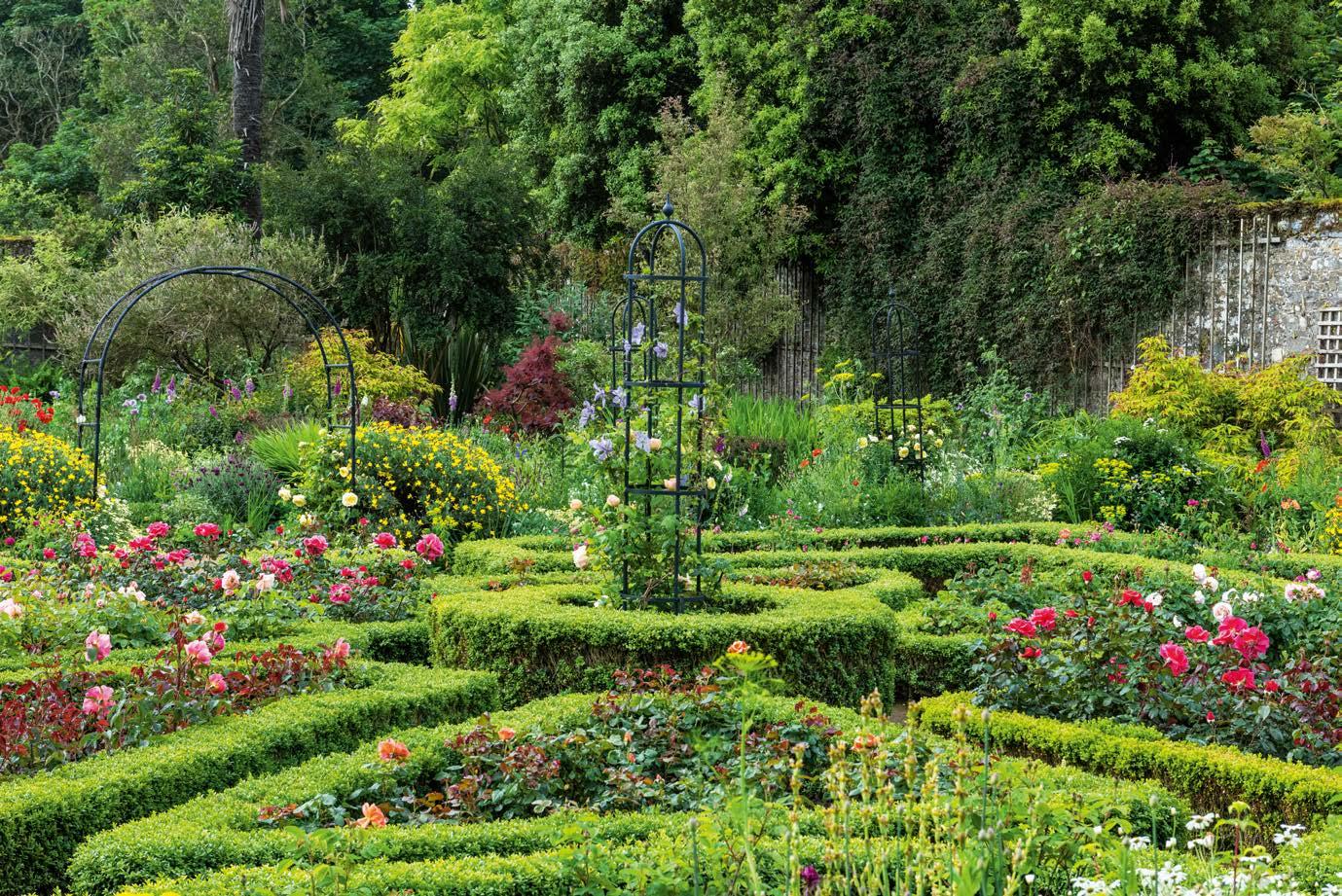
The Millennium Rose Garden is a stark contrast to the Dame’s Garden. Created by Christopher’s father, the late Michael Beaumont OBE, it has a relaxed, contemplative ambience. Arranged around a central circle, a froth of roses and catmint entwine above St Peter Port daisies, the local common name for Erigeron karvinskianus. The colour scheme is purples, blues and pinks with pretty rose ‘Nathalie Nypels’ and the prickly but resilient ‘Harlow Carr’ mingling with Nepeta ‘Six Hills Giant’.
Climbing roses are planted against the walls –‘Lady Hillingdon’, ‘Wedding Day’ and ‘Madame
72 THE ENGLISH GARDEN JULY 2023
Low box hedging embraces beds of roses in the Dame’s Garden; eight quadrant-shaped beds taper inwards to a central circle.
Towering flower spikes of biennial Echium pininana shoot up from the rosette of leaves it produces in its first year.
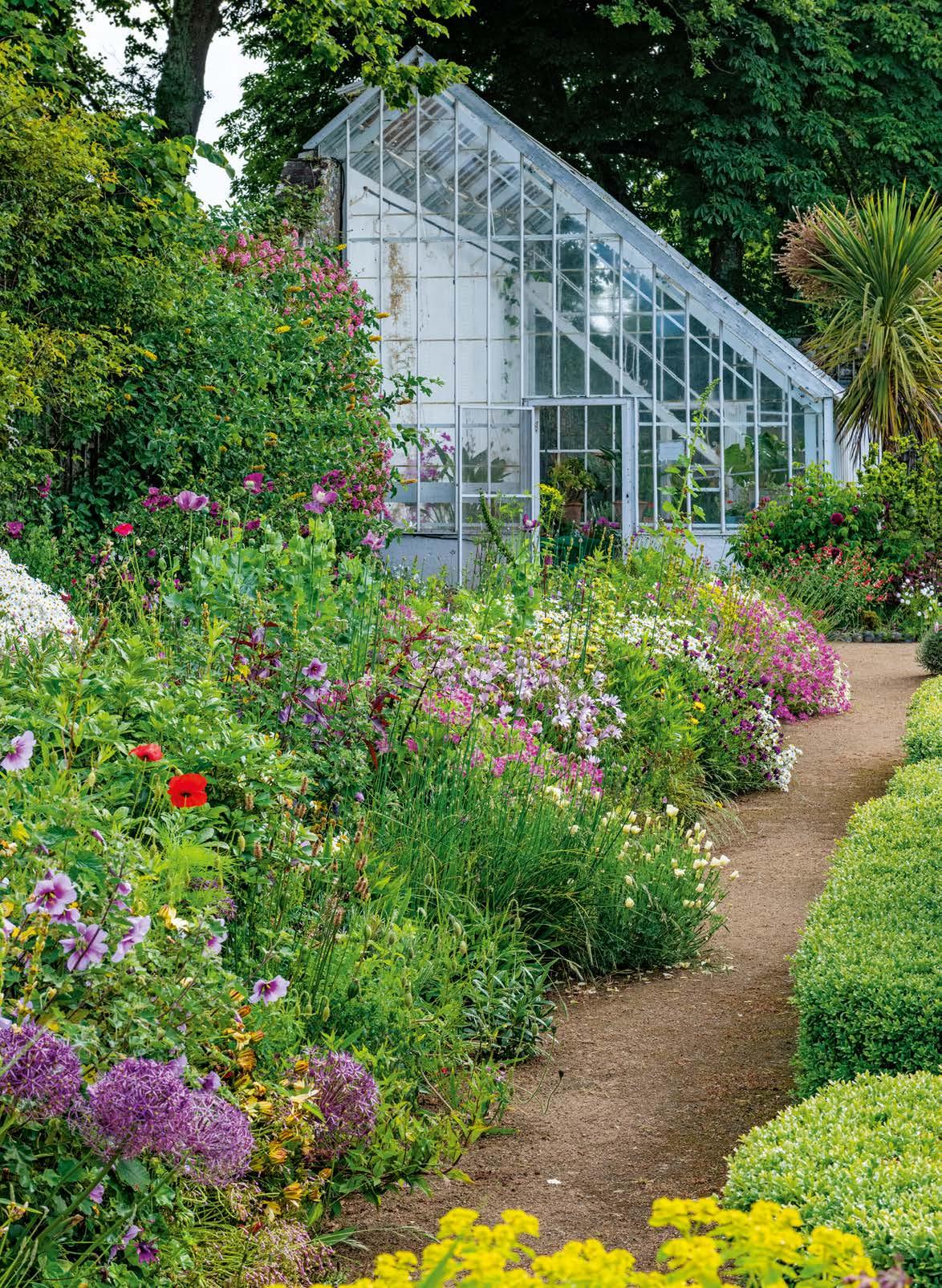

JULY 2023 THE ENGLISH GARDEN 73
Beds of alliums, mallow, osteospermum, poppies and geraniums spill over a path leading to the Victorian glasshouse.
ONE YEAR GOOD GARDENING DIPLOMA
September 2023 – beginning July 2024 BOOKING NOW
Covers the best in planting design while training in the more serious aspects of horticultural techniques. Practical sessions held at Arundel Castle under the guidance of head gardener Martin Duncan and at Sandhill Farm House, Rogate. Lectures by many leading gardening personalities and regular visits to exclusive private gardens. Students also learn to draw up planting plans.
(1 day a week (Tues), 10.30am–3.15pm, over three terms)
THE ESSENTIAL GARDEN DESIGN DIPLOMA
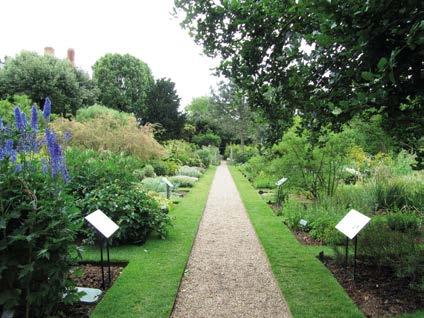


January – March 2024 BOOKING NOW


Based at the Chelsea Physic Garden and led by Rosemary Alexander and architect Catriona Rowbotham, the course is an overview of Garden Design, covering all the elements needed to rethink an average garden. Taking students step by step through site surveying, using the grid, horizontal and vertical features, garden layouts and planting plans, costing and speci cation, plus drawing tuition and homework on design and plant portfolios. Tutors are well respected in the industry and will guide students on how to succeed in this diverse profession.
(2 days a week (Wed & Thur) 10.30am-3.15pm, plus 2 days homework)

GARDENING FOR BEGINNERS
April 2024
One of our most popular courses, led by master horticulturalist Ben Pope, which aims to take each student through all the practical elements of caring for a garden from soil, tools, maintenance, seed sowing and propagating, weed control and pests and diseases. The rst 3 days will be spent with lectures at the Chelsea Physic Garden and the nal day will be spent gaining practical experience in Rosemary Alexander’s much praised garden near Peters eld and another private garden nearby, where Ben is in charge. Participants will be given a chance to prune, plant, sow seeds and regular maintenance tasks will be discussed. A light lunch and refreshments will be provided daily.
GARDEN DESIGN & CARING FOR YOUR GARDEN

Distance Learning Courses study anytime, anywhere in the world
A stepping stone to a new career. These two correspondence courses are a step by step guide to either designing your own garden or learning how to plant and maintain an existing garden: drawing up plans, hard landscaping, site analysis, planting, month by month tasks etc. Taught through a comprehensive course book, with projects submitted to us. 1-3 years to complete and individual assessment.
Get the Chelsea Look
follow us on Instagram


Polhill Garden Centre in Kent, is a family owned and day-to-day run business with nearly 60 years of gardening experience.




Regardless of whether you can tell a hollyhock from a hosepipe, at Polhill Garden Centre everyone is welcome.


The RHS Chelsea Flower Show 2023 didn’t disappoint and if you’re
anything like us we are full of ideas and inspiration from the showstopping gardens. But, where do you start?
We are on hand to help you to create your very own Chelsea garden, with great expertise, show worthy plants and everything in between to make it bloom beautifully. Visit us in Sevenoaks, Kent, or shop online at polhill.co.uk
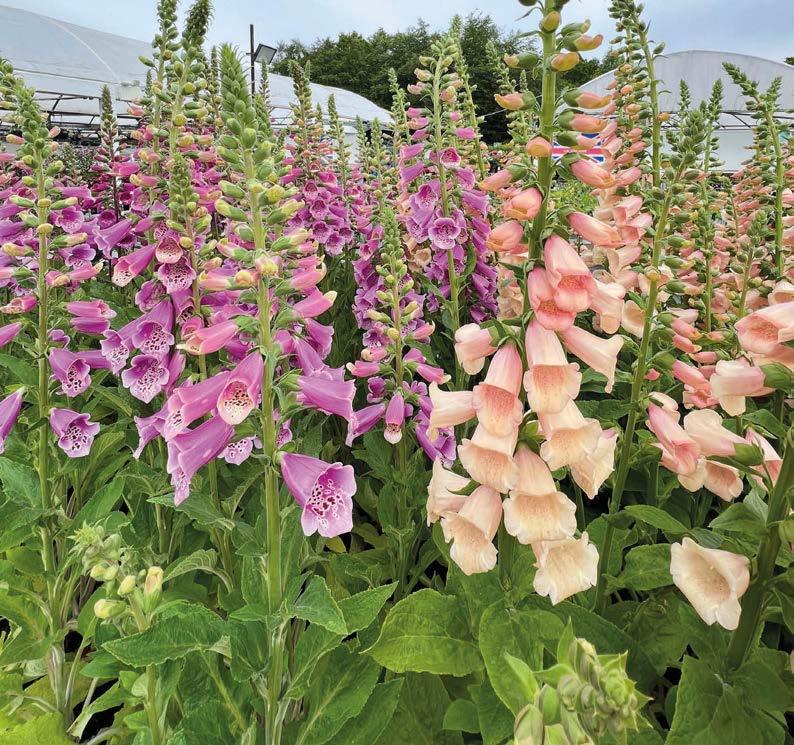
74 THE ENGLISH GARDEN JULY 2023 ll n ll n Garden of Medicinal Plants – Chelsea Physic Garden Photo: R Alexander Not sure which Diploma course is for you? We prefer potential students to attend an Information Session when Rosemary explains the course and you can see our work space. JUST CONTACT US TO SET UP A DATE & TIME www.englishgardeningschool.co.uk Email: info@englishgardeningschool.co.uk Tel: 01730 818373 Long established as the leader in gardening tuition Based at the unique and historic Chelsea Physic Garden
www.polhill.co.uk 01959 534212 info@polhillcentre.co.uk
English Garden Half Page.indd 6 30/05/2023 09:27:08
Alfred Carrière’ – while obelisks are clothed in roses such as ‘The Pilgrim’. Clematis such as ‘Prince Charles’ and ‘Shimmer’ also feature, provided by Raymond Evison, the eminent clematis breeder in nearby Guernsey. Latterly, annuals have been replaced by a dense patchwork of perennials including grey-leaved, golden flowered euryops and pink Dierama pulcherrimum, angel’s fishing rods.
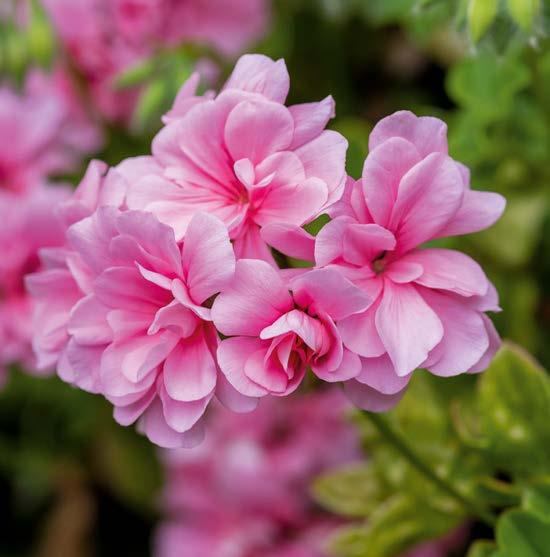
Nearby, a stone archway leads to the uppermost quadrants of the walled garden where there is a maze, a tranquil place to wander between hedges sculpted from evergreen Olearia paniculata, with its scented white flowers in autumn and early winter. At the heart of the maze stands a miniature wooden tower, crafted from a 150-year-old holm oak that succumbed in the Great Storm four years earlier. “There are a lot of holm oaks, but they tend to last for about 50 years and then keel over,” Christopher points out. Any trees of size bear the scars of past gales, and the
Above The Millennium Rose Garden features Rosa ‘Nathalie Nypels’ above a froth of Erigeron karvinskianus and Nepeta ‘Six Hills Giant’. Below Tender treasures such as pelargoniums

more exposed a tree, the more it is bent over by the prevailing south-westerly winds. “The island’s trees have su ered two major catastrophes, not only the Great Storm, but also Dutch elm disease, which struck in the 1970s and denuded many of the hedges. Their loss created a major change in the landscape.”
Over the centuries, other historic buildings and objects have been added to the estate, including a 19th-century dovecote, a signal tower, and a stone cider press that Christopher turned into a water fountain, enclosed in a bund planted with 20 varieties of apple. “The millstone is held horizontally, so water is pumped up through the central hole and falls into the pool below,” he explains. “It took ages to get the ratio of air and water right – I wanted it to look like a newly opened bottle of champagne.”
Gradually, he is clearing paths through the woodland while nearer the house he has established a 70-metre lawn. “I’ve played with the perspective, making the lawn
JULY 2023 THE ENGLISH GARDEN 75
can overwinter outside here, and include one that scales the walls.
wider at the top, which creates an illusion of greater length,” he says. The lawn will eventually lead to the valley via steps and terraces that he plans to plant with ornamental grasses. “I like the way grasses move with the slightest breeze and have fabulous textures – it doesn’t matter if there isn’t any flower colour.”
Having spent his working career in the army, Christopher has had little opportunity to learn about plants. “You are never stationed in a house for long, and you do little more than cut the grass. So I still struggle to di erentiate between flowering plants that have been especially positioned, and weeds,” he admits. “I am an engineer, and I enjoy making things, so I create water features, build obelisks, and I designed the bridge for the lake. It is very exciting to see my ideas come to fruition.” n
La Seigneurie Gardens, Sark, Channel Islands. The gardens open every day from April to end of October from 9am to 6pm. Visit laseigneuriedesercq.uk
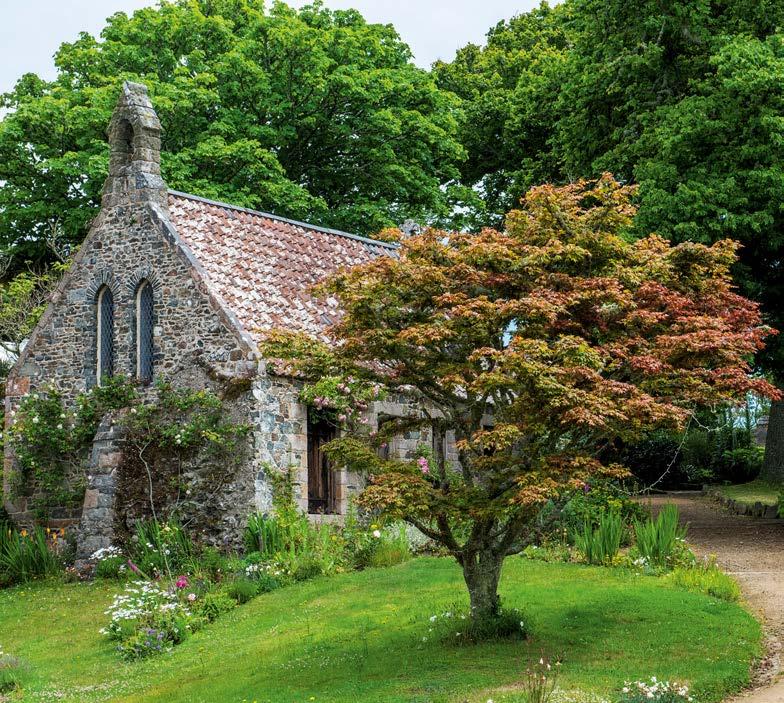
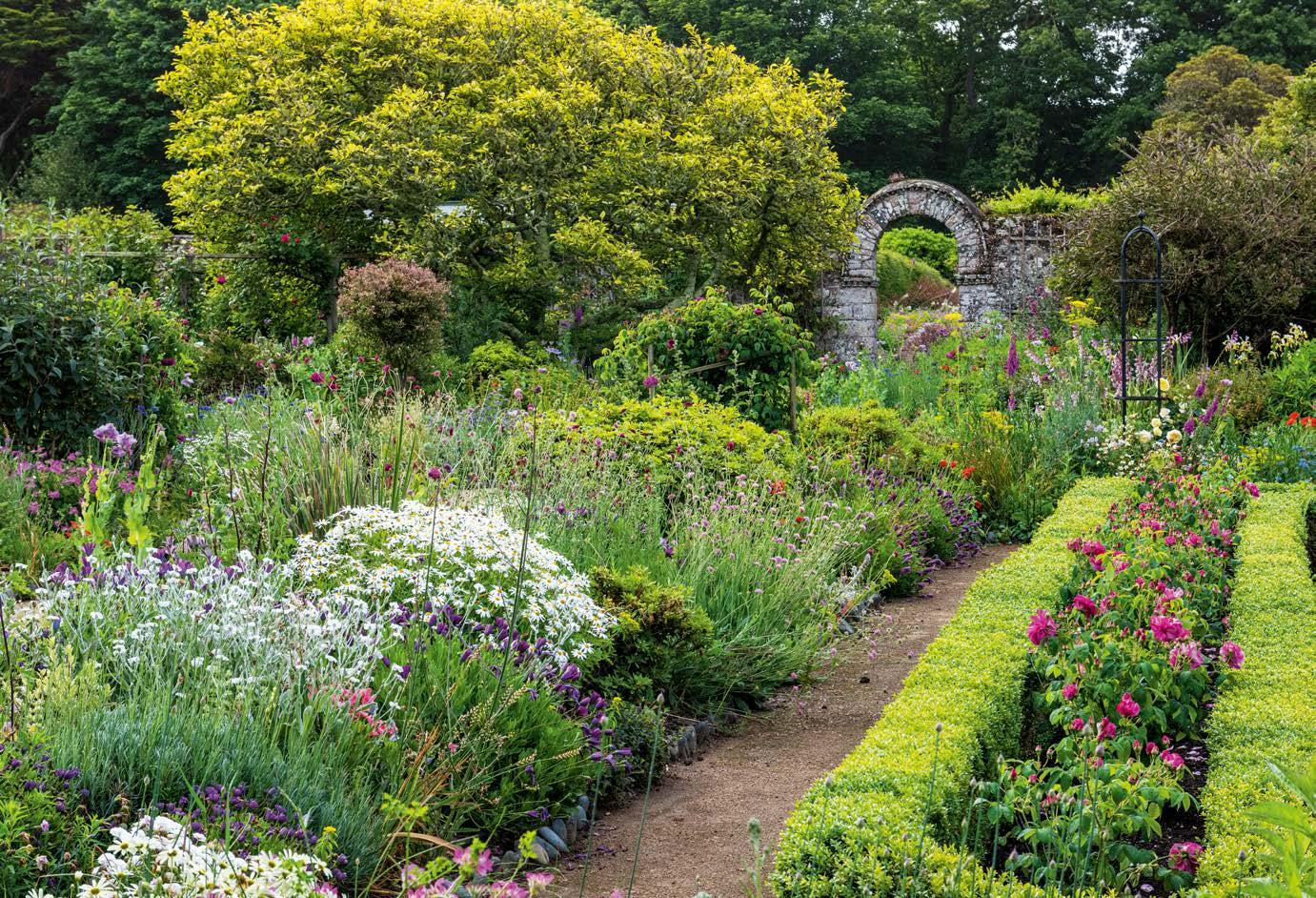
76 THE ENGLISH GARDEN JULY 2023
Above Rosa gallica ‘Versicolor’ lines one side of the path; to the other, are billowing clumps of white marguerites and lychnis, alongside scabious and poppies. Right Beside the old stone chapel, a mature russet-coloured maple graces the grassy bank.
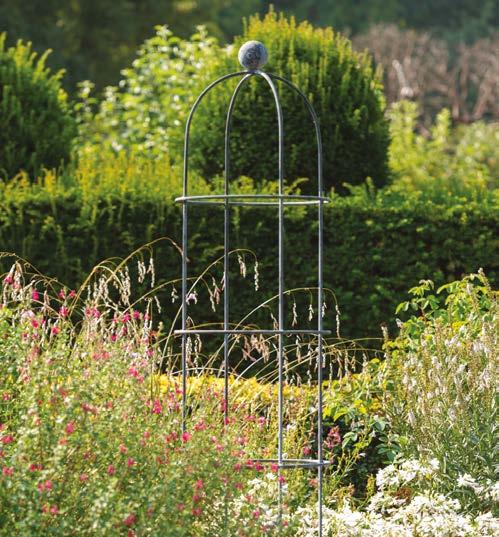
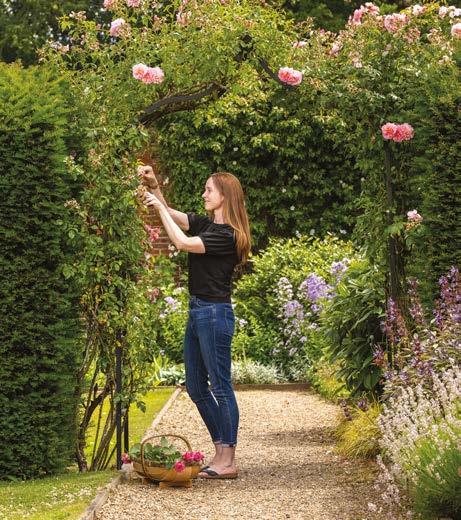
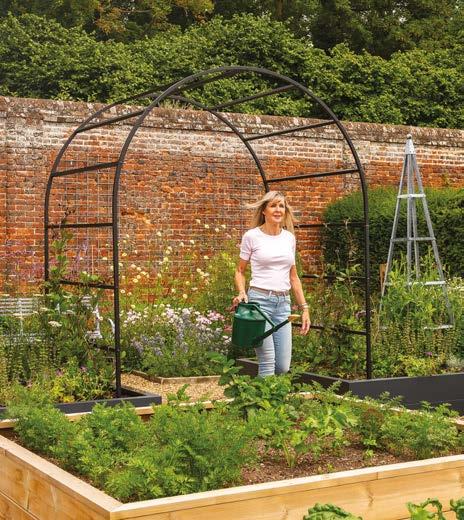
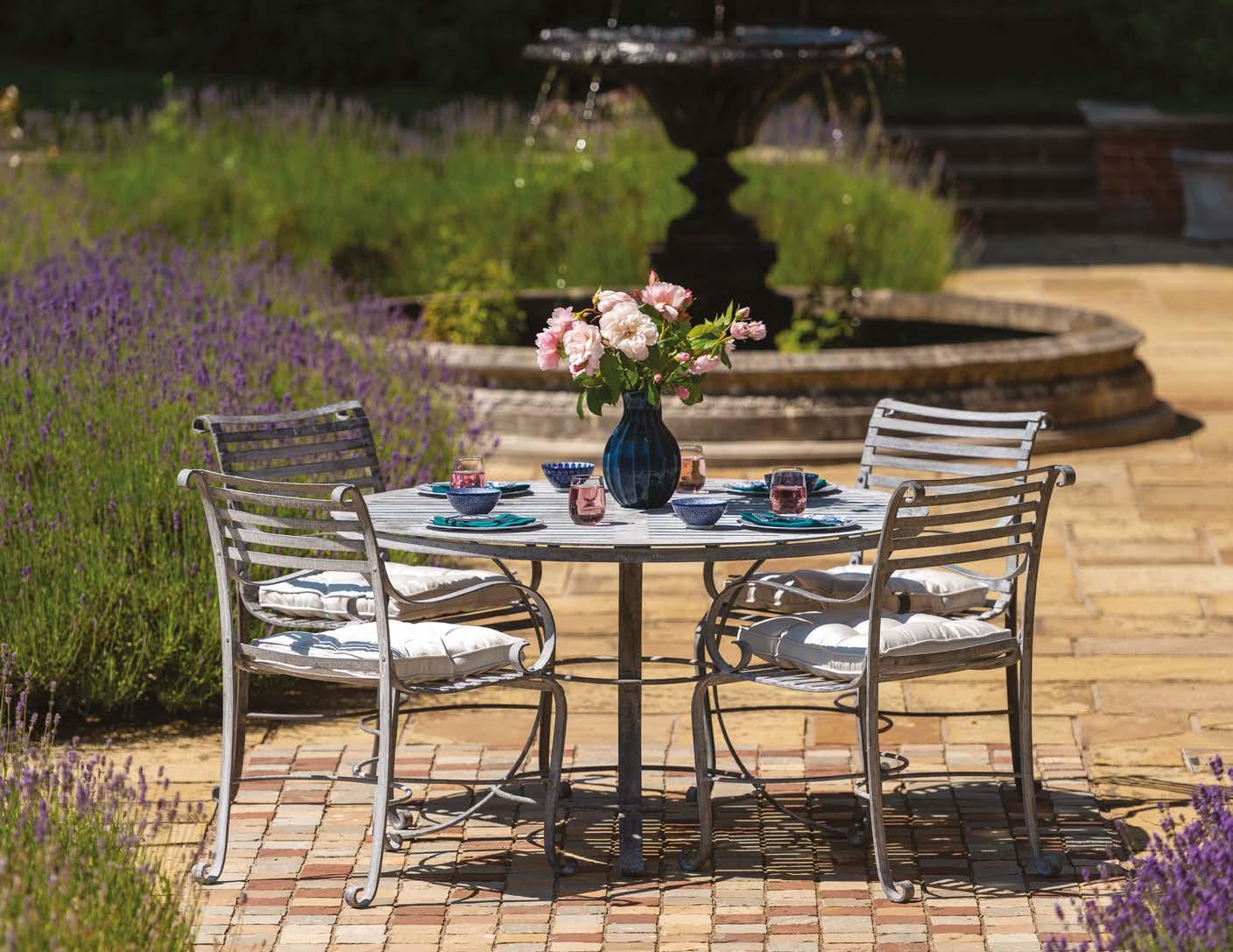

0333 400 1500 (local rate) www.harrodhorticultural.com 10% OFF QUOTE: 23ADEG6 BESPOKE DESIGN SERVICES AVAILABLE • Traditional Steel Furniture • Arches • Pergolas • Obelisks • Planters • Trellises & Supports • Fruit Cages • Raised Beds • PLUS MORE SCAN HERE

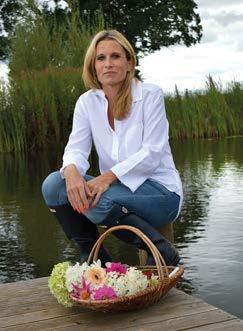



78 THE ENGLISH GARDEN JULY 2023 www.foras.co.uk Introducing the Foras designed 90cm Oceanic Water Bowl WATER FEATURE SPECIALISTS Time for reflection
Gardening Without Petrol










Save time and money and enjoy a quieter, cleaner, greener way of staying on top of garden maintenance by investigating the range of battery-operated and robotic tools from Kress






JULY 2023 THE ENGLISH GARDEN 79 PARTNER
FEATURE
Kress RTKn Robot mowers autonomously move from one area to the next, as if they were driven by humans.
Petrol-powered lawn equipment is gradually becoming a thing of the past. For many gardeners it’s a matter of personal choice, and over the course of the past decade millions of homeowners have switched to batterypowered or manual gardening tools instead of petrol-powered ones. In some places, it’s becoming the law: in late 2021, lawmakers in California voted to phase out the sale of petrol-powered lawn equipment by 2024, making it the first state in the USA to do so; other states and countries are expected to follow suit. But while we all agree that it’s a good idea to reduce the pollution, noise and hassle associated with petrol-powered tools, is it possible to keep your garden beautiful and healthy without them?
Know your options
A generation ago, alternatives to petrolfuelled lawn equipment included corded electric and manual tools. Both work well for compact spaces, but for larger gardens, more power and range are required.
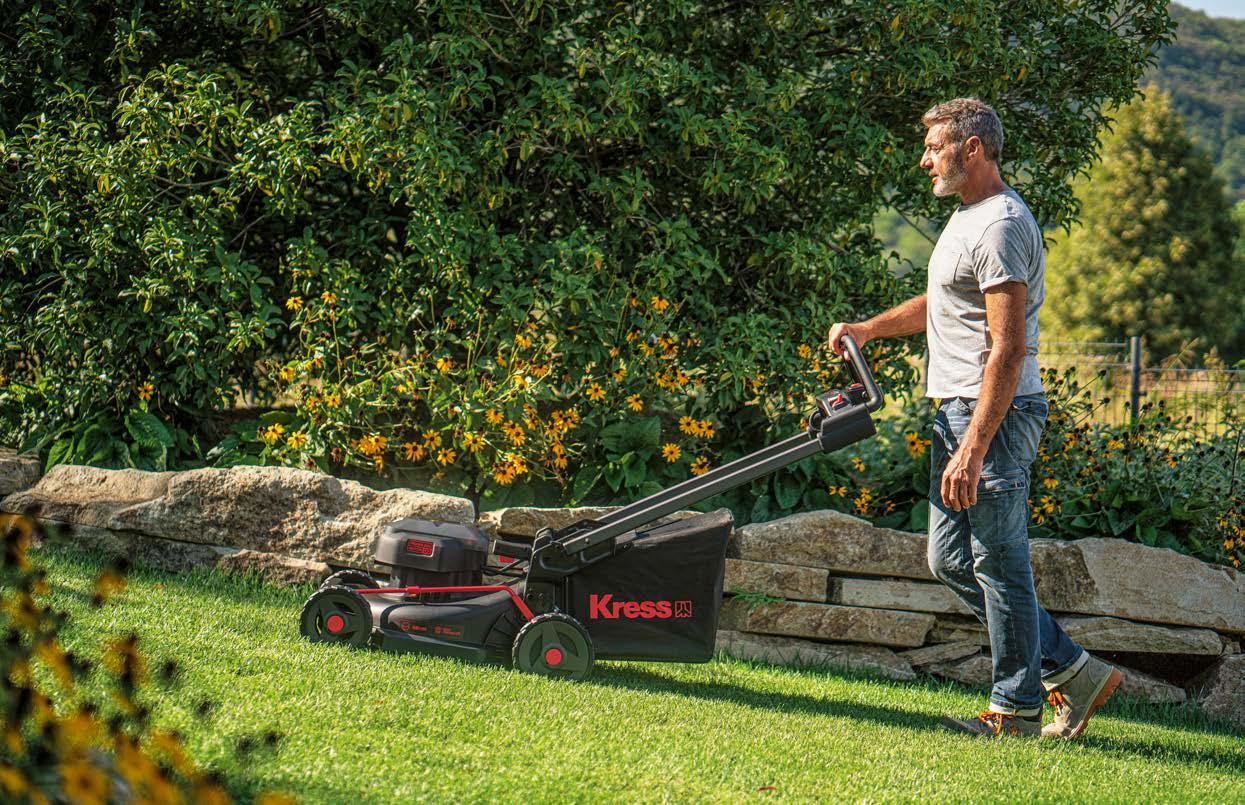
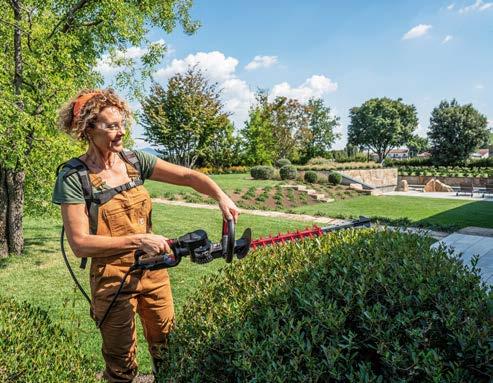
When rechargeable battery-powered mowers, blowers, trimmers, and chainsaws arrived, they were seen by many as less powerful, more expensive versions of lightweight corded electric equipment. But battery tech improved rapidly, and today’s lithium-ion rechargeable battery-powered tools are an e ective, cleaner, quieter alternative. Bypassing the ongoing costs of petrol and engine maintenance equalises the price di erence in a single season.
Robotic lawn mowers
Taking it a step further, the introduction of robotic lawn mowers has heralded the next revolution in lawn care. These programmable smart devices use less power more e ciently. Much like Kress Mission Robot Mowers, they mow the lawn at programmed times, multiple times per week, so that the garden always looks great. Robots mow even when the owner is
on holiday, plus they can avoid obstacles, adjust to the weather, and even alert their owner in the event of theft or other emergencies. These devices save you hours of work every week – all that’s left for you to do is to trim the lawn edges as needed.
Rethink landscaping
Eliminating the need for petrol-powered lawn equipment doesn’t necessarily mean switching over to more powerful, longer-
80 THE ENGLISH GARDEN JULY 2023 PARTNER FEATURE
Above The cordless Kress KG760E.9 is ideal for larger lawns and challenging jobs. Right Lightweight thanks to its backpack battery, the KG260E.9 Hedge Trimmer.
Kress is leading the charge towards a greener future with its breakthrough innovation in battery-powered technology that’s built to deliver the performance and power of petrol. For decades, petrol-powered gardening and landscape equipment has been a reliable choice for commercial use, due to most battery-powered equipment being incapable of matching or surpassing the benefits of their petrolpowered counterparts. This is coupled with the fact that innovation in battery technology has remained slow in meeting the ever-growing demands of professional gardeners.
Landscape professionals have tended to veer away from battery-powered equipment due to the excessive charging time required for continued use, the expense associated with the limited life cycle, and unreliable performance quality. Despite concerns that the air and noise pollution associated with petrol-powered

equipment is having a severe impact on the environment, professionals have so far been forced to select an option that provides an economical advantage in terms of power and uninterrupted operation.
Tackling the current limitations of battery power head on, Kress is taking the evolution from petrol to battery to a groundbreaking next level by providing a stronger, faster, quieter and more a ordable option. Its tools are specifically designed to meet the demanding needs of commercial landscapers, and will drive batterypowered technology forward to a brighter, more e cient future.
The new commercial Kress 8-minute Cybersystem™ battery platform has been engineered to o er the fastest recharge of any commercial battery system available. It has twice the power output of standard lithium-ion batteries and has been developed with heavy-duty use in mind.

lasting batteries. Planting and lawn-care choices also a ect the garden’s overall maintenance requirements, including the kinds of equipment needed to do the work. One a ordable, sustainable way to solve the problem is to adopt a comprehensive, low-maintenance landscape strategy. Traditional, formal lawns need to be mowed regularly to look and grow at their best and to function as a durable groundcover for outdoor living spaces. But why commit to mowing and maintaining out-of-the-way, lesser-used parts of the garden? Most homeowners could repurpose at least half of their grassed area with low maintenance tree, shrub, and perennial plantings that need only seasonal touch-ups as opposed to weekly maintenance. Reducing lawn space by 50 per cent could help make the switch from petrol to battery or corded electric power much more straightforward.
Woody plants come in all sizes and shapes, both evergreen and deciduous. Planting the right-sized selections for your available space ultimately makes the di erence between enjoying an easy-care landscape with occasional trimming, and constant pruning to control size. Avoid the temptation to plant a fast-growing hedge or shade tree that won’t stop growing once it has filled its allotted space. Instead,
JULY 2023 THE ENGLISH GARDEN 81
Professional gardeners can also make the change
Right Fully charge a battery within eight minutes using the Kress Commercial 60V 11 Ah CyberPack. Below Kress tools come with powerful long-lasting batteries for e cient, quieter garden maintenance.
measure the planting area fi rst, then shop for a cultivar that will fi ll it at maturity. Another common mistake that adds unnecessary trimming and mowing is random planting. An innocent trip to the nursery for a bag of mulch often yields a beautiful new lilac, azalea, rose or other impulse buy that now needs a home in the landscape. Many plant-lovers simply plop the new addition into a favourable spot in the middle of the lawn.
Eventually the lawn is freckled with isolated individual plants, and every week these obstacles add an extra 20 minutes of mowing and edging. There is no need to stop collecting plants, but cluster your new additions into border plantings or landscape island beds to reduce time spent mowing in circles. Mulch landscape beds once or twice a year, and either pull up weeds by hand or use a grass trimmer as needed to reduce weed pressure.
Natural areas
No-mow lawn spaces and natural landscape zones continue to increase in appeal as consumers seek alternatives to conventional lawns. Natural areas become micro-habitats for migratory birds and local wildlife, while bu ering the home in green space. For best results, these easycare areas require a bit of maintenance, such as seasonal mowing, weeding out invasive species and light pruning.
Petrol-free gardening requires some adjustments, but they may not be as
The future is bright: bright green
With a petrol-free future on the horizon, coupled with soaring fuel prices across the UK, the latest evolution in Kress’s battery-powered technology is a remarkable, timely development for gardeners and lawn-care professionals. This radical new technology can help protect our planet and your pocket without compromising on performance.
“Everyone was waiting for a change in gardening and professional landscaping equipment. Petrol will soon have to be replaced and, for that reason, Kress has come up with a powerful solution, built with a future
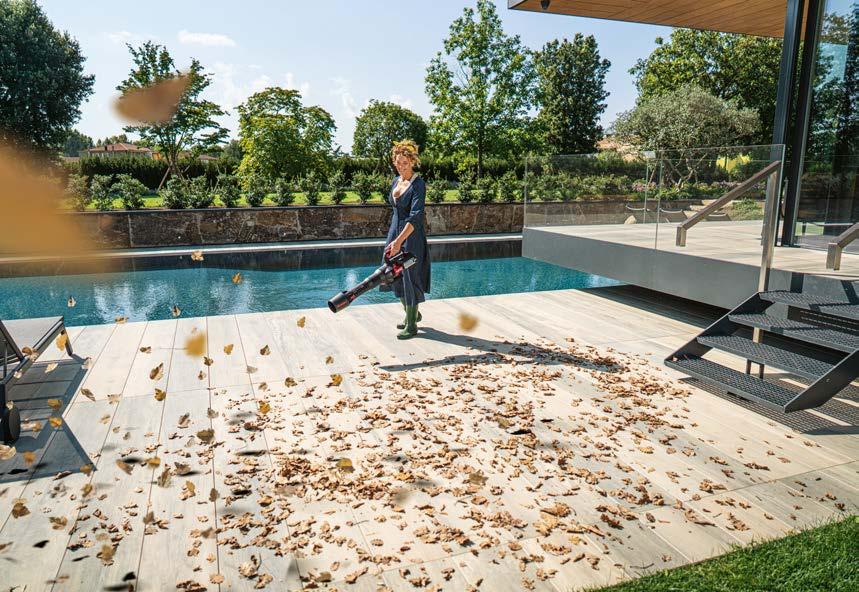

focus,” says Don Gao, CEO of Positec Group. “The future will rely on energy storage, energy distribution and an integrated system. It’s time for an energy system evolution – the new Kress system can fulfil that need.”
Choosing outdoor power equipment from Kress means there is no need to compromise on performance. Its lightweight, e cient, and powerful rechargeable tools are well positioned to take on the work currently done by petrol-powered tools. Ensuring reduced air and noise pollution, these tools are the future of green gardening and maintenance.
dramatic as you think. By reducing lawn coverage, making e cient planting choices, and adopting passive maintenance practices, homeowners can alleviate the most power-hungry and time-consuming aspects of garden care. What’s more, lightweight, e cient and powerful corded and rechargeable lawn care tools are well positioned to take on the work currently performed by petrol-powered tools. With the added benefits of cleaner air and reduced noise, the future of gardening and landscaping looks brighter than ever.
For more information on Kress’s range of battery-powered and robotic mowers, visit kress.com


82 THE ENGLISH GARDEN JULY 2023 PARTNER FEATURE
Top The powerful KG162 Kress 60V Line Trimmer is ideal for edges and boundaries. Above The Kress Max Blower has adjustable settings allowing users to vary its power.
“I feel everything is back to normal again... no clothes strangling my stomach mid afternoon, no rushes to the bathroom and shorter stays once I’m there! Very pleased.” - Salli, Gut Works® Customer
“I have noticed a significant difference. I can now walk a good distance where I had been struggling for quite a long time.” - Linda, Curcumin & Turmeric Customer

www.drvegan.com
on a survey of 246 people who take Gut Works®
September 2022. Nationally representative.
can only be redeemed at
customers
31/08/2023. Based on 3800+ reviews Garden in comfort Gut Works® 3x more effective than standard probiotics* Curcumin & Turmeric High strength, more absorbable & more effective Prebiotic & probiotic Relieves IBS & bloating Brain health & energy
*Based
during
Offer
www.drvegan.com for new
only. Valid on the full range, cannot be used in conjunction with any other offer or bundles. Offer closes
Curcmin & 3300mg Turmeric With ginger & black pepper Supports digestion Get 25% off with code TEG25
200mg
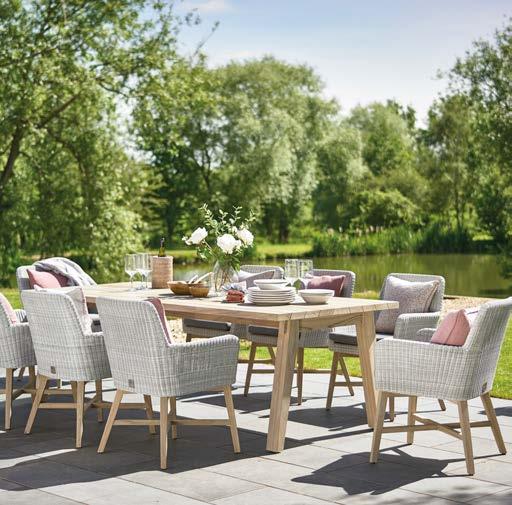
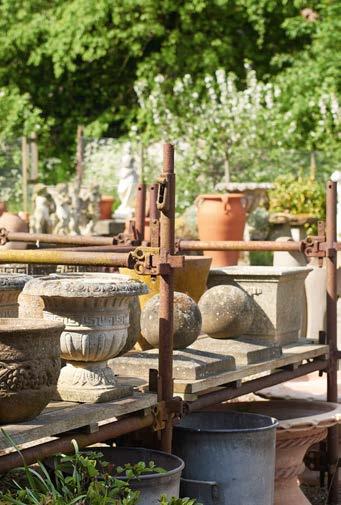

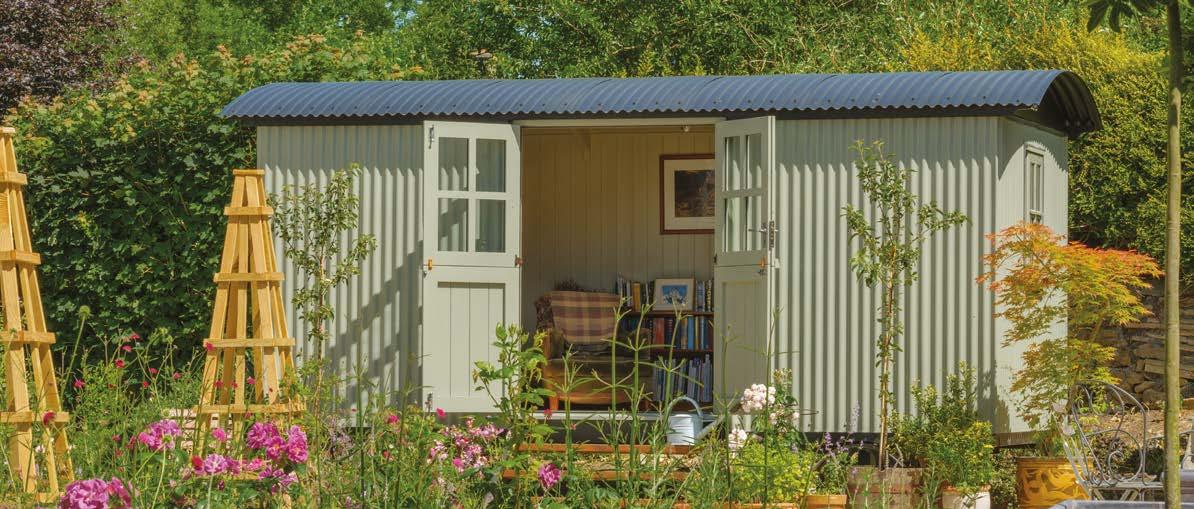


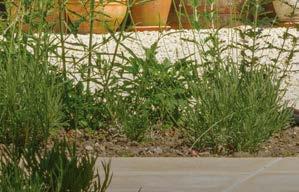



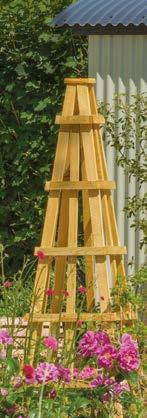







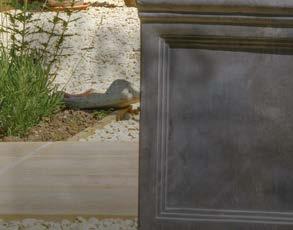
84 THE ENGLISH GARDEN JULY 2023 HOLLOWAYS
Visit our showrooms & antiques courtyard Open Monday-Saturday 9am-5pm Lower Court, Suckley, Worcestershire, WR6 5DE www.holloways.co.uk V OORBURG BY HOLLOWAYS GLASSHOUSE CAFÉ
for
Plankbridge shepherd’s huts are exclusively endorsed by the RHS
OUTDOOR LIVING FURNITURE І GARDEN ANTIQUES І TERRACOTTA POTS & PLANTERS І CAFÉ
Established
20 years,
Plankbridge shepherd’s huts are exclusively endorsed by the RHS
© The Royal Horticultural Society 2020. Endorsed by the Royal Horticultural Society. Registered Charity No
222879/SC038262. rhs.org.uk Established for 20 years,
plankbridge.com 01300 348414 plankbridge.com +44 (0)1300 348414
© The Royal Horticultural Society 2020. Endorsed by the Royal Horticultural Society. Registered Charity No 222879/SC038262. rhs.org.uk
Lazy Summer Days








After months of hard work spent getting your garden summer-ready, it’s time to kick back and relax as you enjoy the fruits of your labour from one of these comfortable and stylish outdoor lounging options







Invest in good garden furniture and a relaxing summer will be yours to enjoy. Fontelina Double Lounger, £1,995. oka.com

JULY 2023 THE ENGLISH GARDEN 85 WORDS
VIVIENNE HAMBLY
If ‘summer’ and ‘afternoon’ are the two most beautiful words in the English language, as Henry James wrote, owning good garden furniture to make the most of those warm, languid hours is practically a duty. From folding deckchairs to hammocks and swing seats, with more formal sofa sets in between, there’s garden furniture to suit all manner of lounging.
Di erent materials bring di erent looks to a garden. This is a truism but give some thought to the influence furniture will have. Generally inexpensive, and improved with squishy cushions, cane is widely available – try Tikamoon (tikamoon.co.uk), Hadeda (hadeda.co.uk) for designs handmade in Malawi, or, for instant patina, the second-hand goods portal Vinterior (vinterior.co). Synthetic rattan is practical, and widely used in outdoor sofas and chairs. Bramblecrest (bramblecrest.co.uk) and Kettler (kettler.co.uk), among others, can supply.
Erecting a swing seat beneath a spreading tree or beside a swimming pool can become an annual
THE RIGHT STRIPES
If your deckchairs have seen better days, treat the wood and then replace the slings using materials available from The Stripes Company. (thestripescompany. com) Alternatively, treat yourself to something new. Striped Rocking Deck Chair in Orchard, £90. gardentrading.co.uk
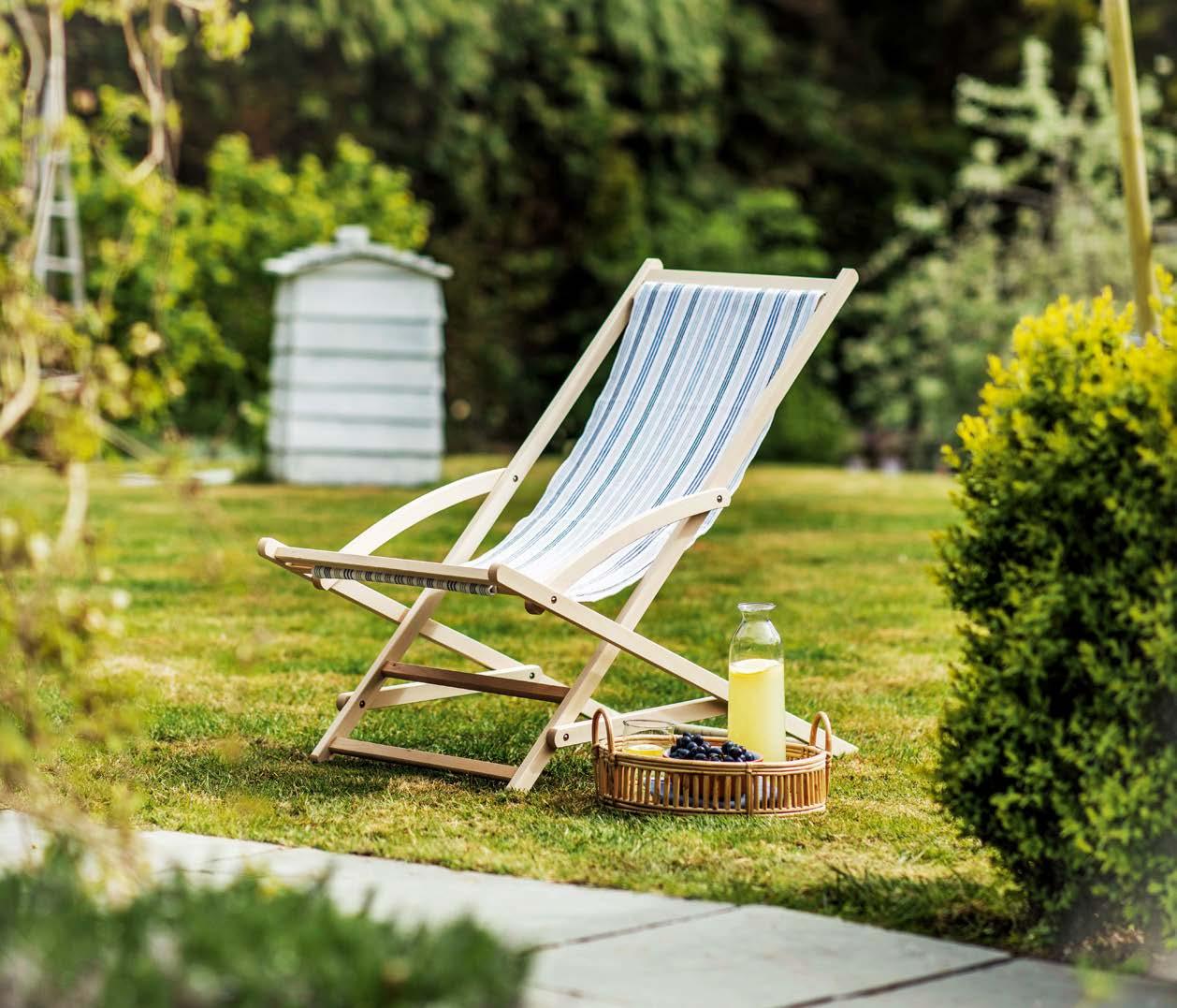
tradition and a declaration that summer has arrived. Handmade swing seats from the likes of Wilverley (wilverley.com), Odd Limited (oddlimited.com) and Sitting Spiritually (sittingspiritually.co.uk) come with an upfront cost but will become heirlooms.
Cast iron and aluminium furniture have enduring appeal. Cast iron is typically used in traditional Victorian styles – try Black Country Metal Works (blackcountrymetalworks.co.uk) and The British Ironwork Centre (britishironworkcentre.co.uk). Powder-coated steel and aluminium are suited to lighter, modern designs. Steel is heavier than aluminium and powder coating makes it rustresistant to a good extent. Look to the brand HAY, through Holloways of Ludlow, (hollowaysofludlow. com) and Fermob, from The Worm that Turned (worm.co.uk). Aluminium is lighter and more weather resistant: Oxleys specialises (oxleys.com).
If you choose wood, ensure it’s a hardwood like English oak, iroko, teak or western red cedar. Keep it oiled for a neat look, or gradually let it silver.
86 THE ENGLISH GARDEN JULY 2023
MOBILE STYLE Ideal for taking on picnics, to the beach or for following the shade around the garden, the adjustable Bodhi Bamboo Beach Chair (£289) with floral seat pad from Graham and Green is based on antique designs. grahamandgreen.co.uk
WELL UPHOLSTERED Here’s a classic, deep-buttoned recliner you won’t want to get up from. Every item in the Heveningham Collection is handmade in England to order to exact specifications. Standard designs include this chaise longue, £POA. heveningham.co.uk
TIKI CHIC Cane has the joint advantages of being both light and pliable, so it lends itself to relaxing shapes. Paint it or leave it in its natural colour. The Lucy range by Vincent Sheppard includes loungers, tables and this chair (£761). canefurniturewarehouse.co.uk
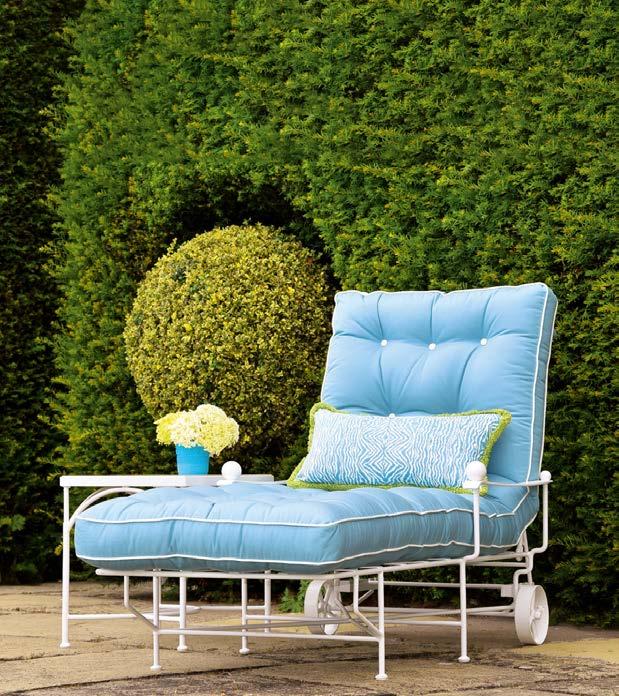
With its built-in footrest, the Bickington Outdoor Lounger (£600) echoes the design of Edwardian deckchairs. It is made from eucalyptus, an oily, naturally moisture-resistant hardwood that’s well suited to the British climate. farmhousetablecompany.co.uk
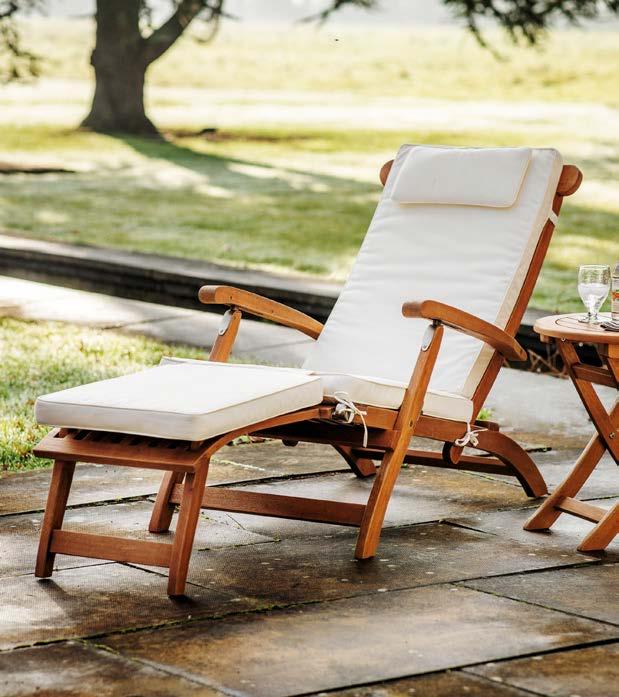
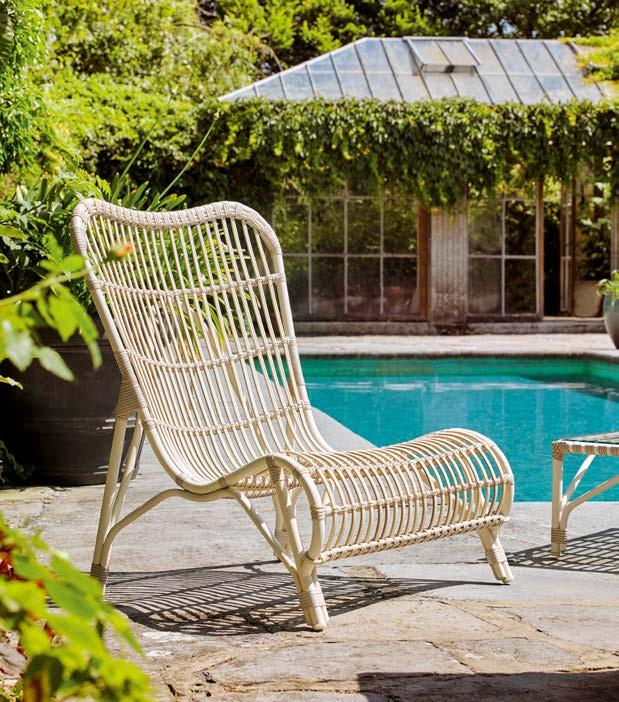
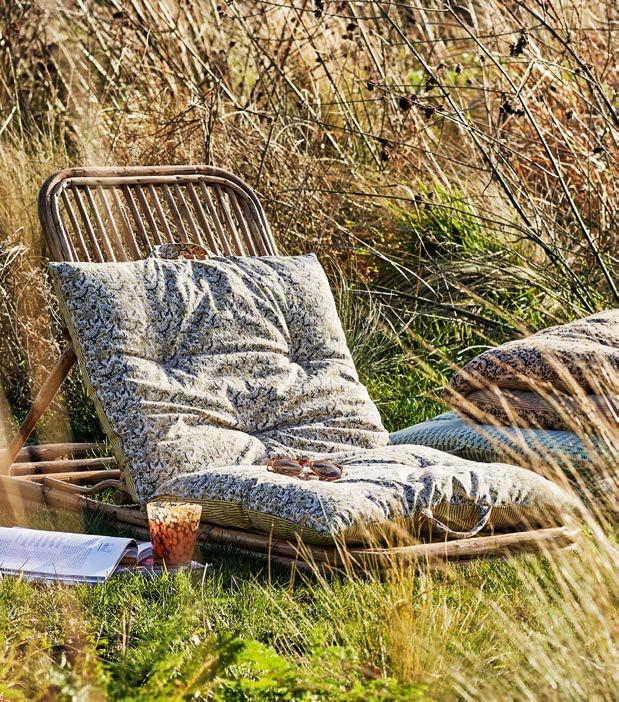
JULY 2023 THE ENGLISH GARDEN 87
FANCY FOOTWORK

IN THE SHADE Evoke the mood of the tropics with the elegant Karama Day Bed (£1,695). This three-seater sofa has an o -white waterproof canopy and curtains that can be rolled up or down to provide shade or shelter occupants from breezes. oka.com




LIGHT THE FIRE Extend relaxing into the evening with a firepit. The all-weather Tuscan Wicker collection from Bramblecrest (£4,499) includes a table with a built-in firepit, as well as an L-shaped sofa, armchair and a bench. bramblecrest.com
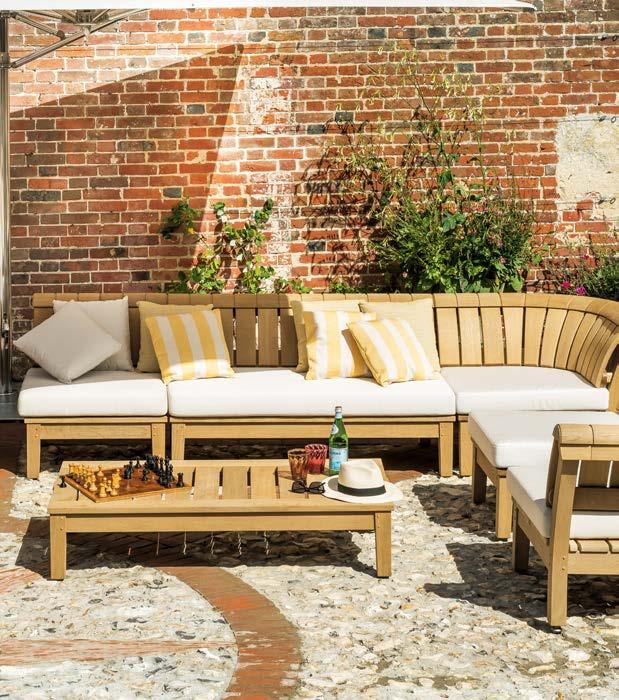
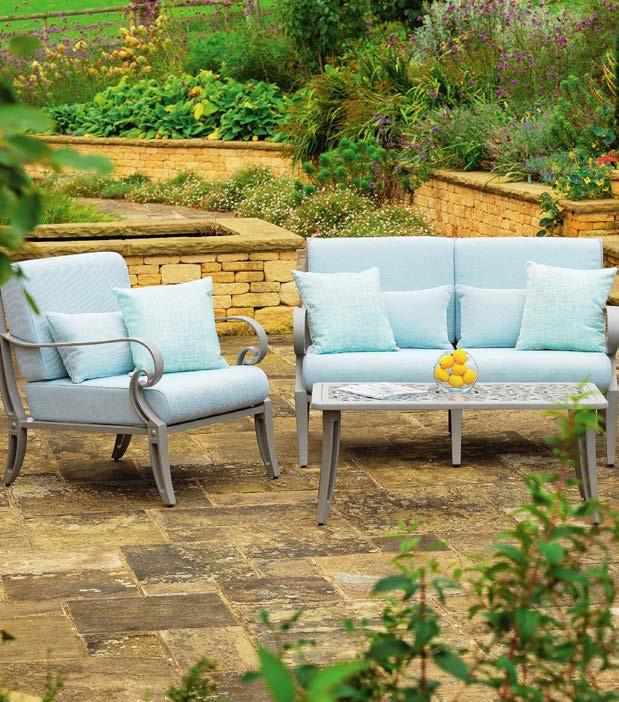
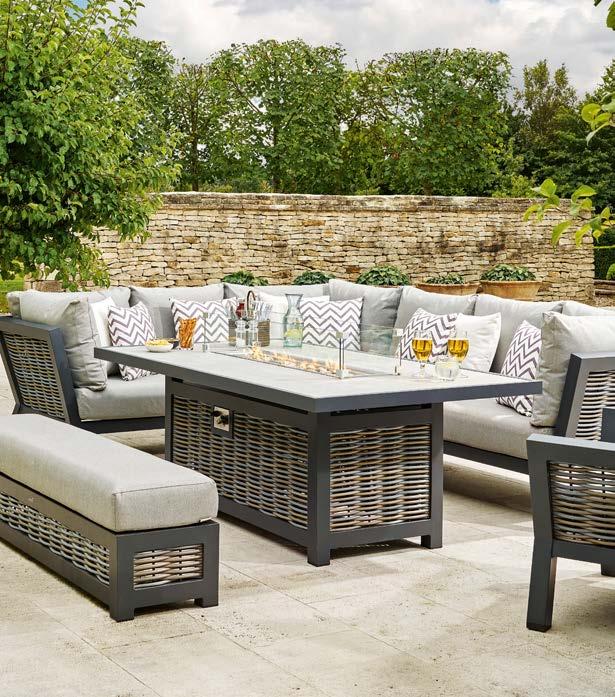
SOLID OAK Durable oak forms the basis of Gaze Burvill furniture, which includes the Splash Lounge collection. Featuring lower, deeper seats than other designs, these sets come with quick-drying foam seats covered in canvas. From £5,550. gazeburvill.com

JULY 2023 THE ENGLISH GARDEN 89
BUILT TO LAST Powder-coated aluminium garden furniture is particularly hard-wearing. Gloucestershire-based Oxleys delivers a range of designs, its simple Scroll collection being inspired by Celtic stone carvings. Scroll lounge chair from £2,695. oxleys.com
IN THE ROUND An outdoor hanging chair can be fun, and a round shape is ideal for smaller spaces. The Indoor Outdoor Hanging Chair (£375) is supported by its own integral stand, so you don’t have to hang it yourself. Cushion covers are washable. coxandcox.co.uk

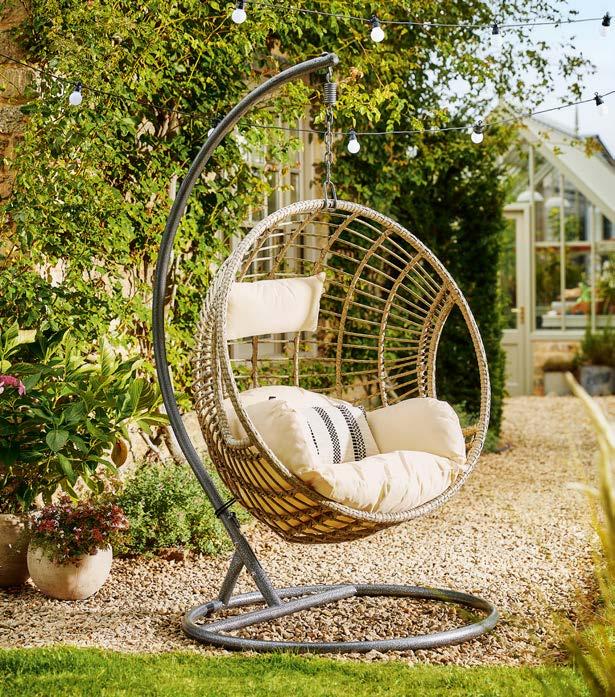
GRAND OLD ROCKER For swing-seat pleasure, with all the frills, Odd’s sumptuous two- or three-seater Old Rocker is among the best. Every element is fully customisable, from finials to fabrics. Keep it up all summer and dismantle when winter comes. £POA. oddlimited.com
SUMMER
Simple, adaptable and comfortable, a hammock is an essential component of peaceful outdoor relaxation. This Recycled Cotton


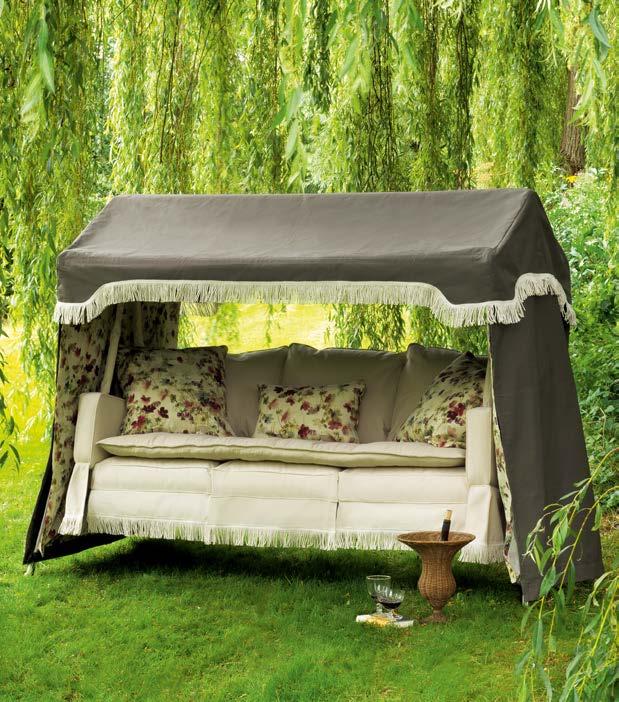










90 THE ENGLISH GARDEN JULY 2023
THE SWING OF IT The Swing Bench (from £2,650) from The Oak and Rope Company is wide enough to seat a family, steady enough to use as an outdoor o ce, and comfortable enough to lounge in all day long. Cushions are included. theoakandropecompany.co.uk
SIESTA
Hammock (£98) from Graham and Green comes with a pine frame hand-crafted in El Salvador. grahamandgreen.com
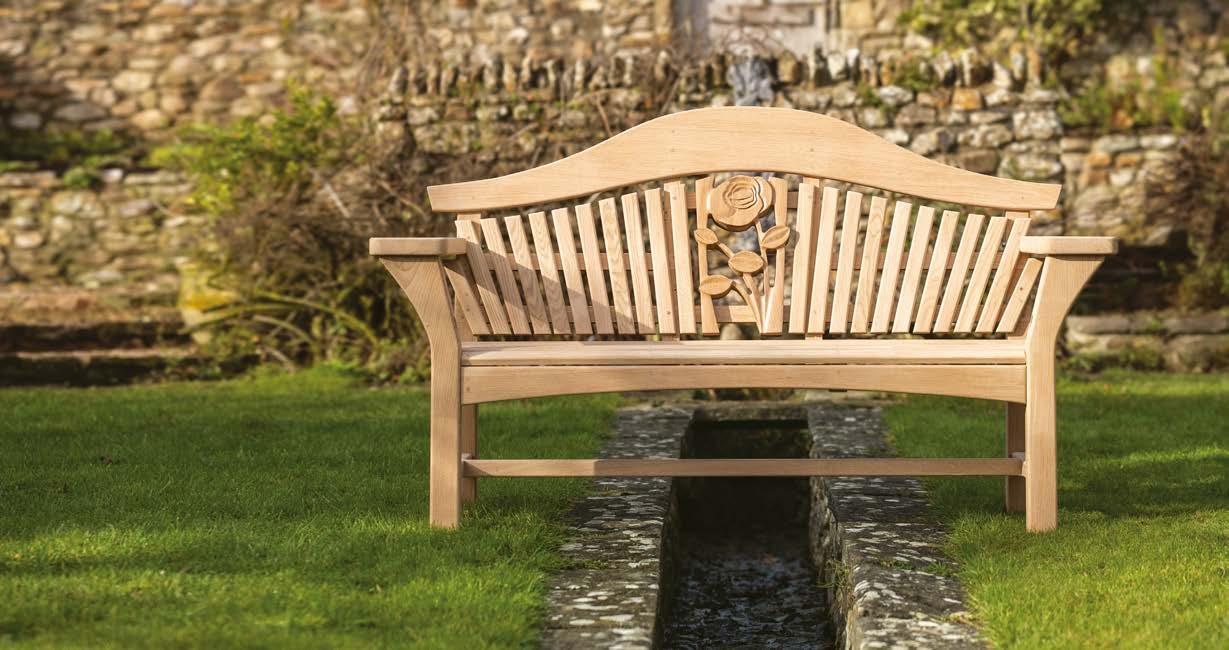














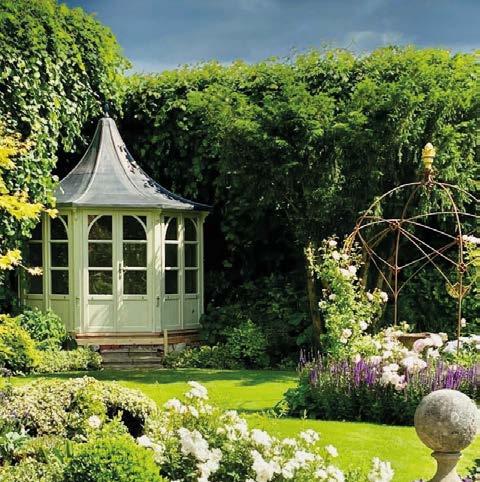
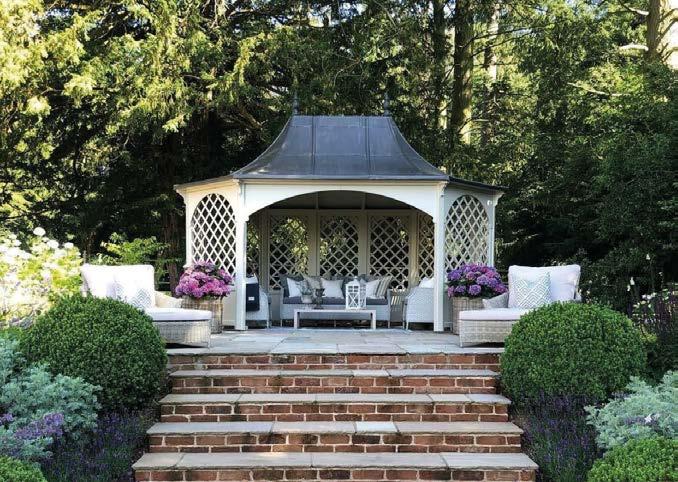
JULY 2023 THE ENGLISH GARDEN 91 ® The Royal Horticultural Society. The Royal Horticultural Society, and its logo, are trade marks of The Royal Horticultural Society (Registered Charity No 222879/SC038262) and used under licence from RHS Enterprises Limited. The only bespoke swing and bench maker endorsed by the RHS sittingspiritually.co.uk 01297 443084 Luxury British Design, Unmistakably Sitting Spiritually Scan to request a brochure RHS Four Seasons Bench Spring Autumn Summer Winter SI0206 The English Garden - July 2023 - HPH.indd 1 31/05/2023 13:17 HSP GARDEN BUILDINGDS LTD 1 Hampstead Court, Hampstead Avenue, Mildenhall, Suffolk, IP287AS Summerhouses—Gazebos—Home Offices—Garden Rooms—Bespoke Structures—UK wide installation www.hspgardenbuildings.com- hello@hspgardenbuildings.com - Telephone 01638 583814






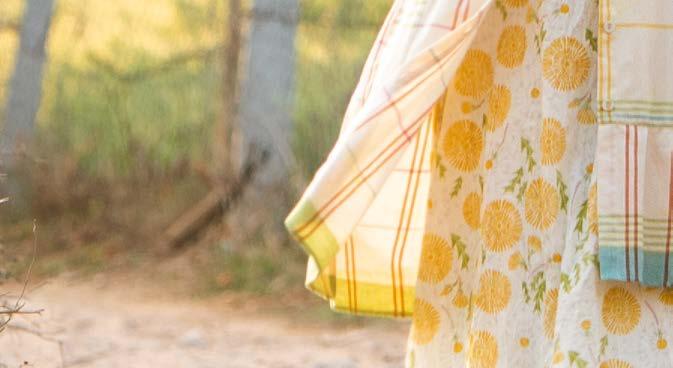

































































Swedish design with a green soul Welcome to my store at 65-67 Monmouth Street, Covent garden, London You can also send an e-mail: order@gudrunsjoden.co.uk or call us: 0207 019 9075. SWEDEN GERMANY NORWAY DENMARK FINLAND UNITED KINGDOM USA CANADA FRANCE SWITZERLAND NETHERLANDS www.gudrunsjoden.com Dandelions and wild flower meadows Let’s step into summer with wild dandelions and woven checks. “Fields” smock blouse, £94 and “Dandelion” long jersey dress, £74
WEAR YOUR HEART

For environmentally conscious women who want to embrace a vibrant, timeless style, Gudrun Sjödén’s sustainable Summer 2023 collection is inspired by nature – and doesn’t cost the Earth

Aregard for nature steers every step of the production process at Gudrun Sjödén, with each collection celebrating a plant or natural landscape. The emphasis is on timeless style over fast trends, and the aim is to create a sustainable wardrobe for environmentally conscious women to wear throughout the seasons.
Textile artist Gudrun Sjödén began her brand in the 1970s with a vision of longlasting, colourful and functional clothes for women of all sizes, shapes and ages. Timeless cuts and dazzling prints express a Scandinavian identity fused with global handicraft inspiration. Materials used include recycled, natural and organic fibres that are easy to care for.
Summer 2023 is an eclectic collection inspired by stunning spots around the world: the palette of blues in Stockholm’s
archipelago; the golden hues of Occitanie, France; and a warm symphony of colours inspired by the nature of Samone Bagh in India. Summer’s sunniest print is a take on the golden weed, the dandelion.

Gudrun Sjödén’s pieces are created to be worn come rain or shine, whether snuggling up with a book, gardening or hosting a party. In the summer collection, a simply cut dress in organic cotton is available in warm masala, flamingo pink, cool sea green or a natural unbleached tone. Choose colours you love and create a palette to cherish year after year.
The brand has nurtured relationships with its manufacturers over the decades, developing sustainable production with them. This is reflected in organic jersey from Greece and organic cotton grown by Fairtrade certified farmers in India, which is then spun and dyed without

chemicals. Wool, linen and plant-based fibres lyocell and modal are chosen for their low impact on the environment. A warm and creative community surrounds the Gudrun Sjödén brand. Women who cherish nature, eco design and individual expression come together for regular workshops and talks in the London concept store on topics such as DIY crafts, art and sustainable life hacks.
Visit the store at 65-67 Monmouth Street, WC2H 9DG or find out more at gudrunsjoden.com/uk, on the Gudrun Sjödén English Facebook page and on Instagram: @gudrunlondon. Be inspired by our colourful community under the hashtag #gudrunista
PARTNER FEATURE JULY 2023 THE ENGLISH GARDEN 93
Left Flowing pieces inspired by the golden hues of Occitanie in France. Middle New for summer 2023 is this dandelion print, available in various styles and celebrating the pollen- and nectar-rich wildflower. Right A warm colour palette has been drawn from the vibrant colours of Samone Bagh in India and transposed onto natural fabrics.
‘GARDEN OF THE GOOD FOLK’




 by Evelyn Foster
by Evelyn Foster
gardens
Le Secateur Hand Pruner
The perfect addition to your garden tools. The Opinel Le Secateur Hand Pruner features robust stainless steel blades for a clean cut and it also has a protected spring to prevent dirt clogging the mechanism and pinching. The blade also has multiple options to adapt the pruner to the diameter of the branches or size of the user’s hand.
love
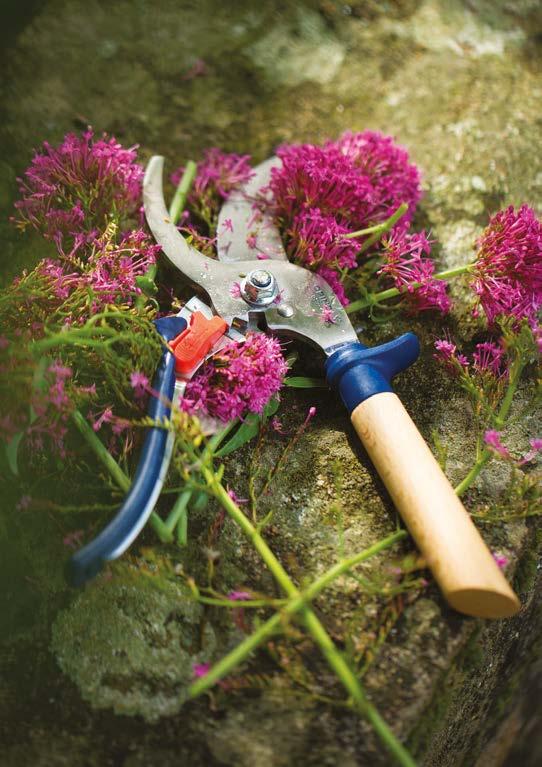
94 THE ENGLISH GARDEN JULY 2023 A great
(and garden-loving
garden gift for children
adults!)
AVAILABLE FROM COUNTRY BOOKS (WWW.COUNTRYBOOKS.BIZ) TEL: 07889 234 964 OR FROM WATERSTONES OR AMAZON PROCEEDSSHAREOF TO GARDEN CHARITIES
A beautiful book to inspire readers with a
of
and gardening. This spellbinding story of a special English Garden will make any child’s birthday enchanting!
…useful gear Scan to browse berryuseful.co.uk Available at
Social Climbers
Add vertical interest and smooth unsightly surfaces with a charming climbing rose. Ian Limmer of Peter Beales Roses has ten favourites to recommend
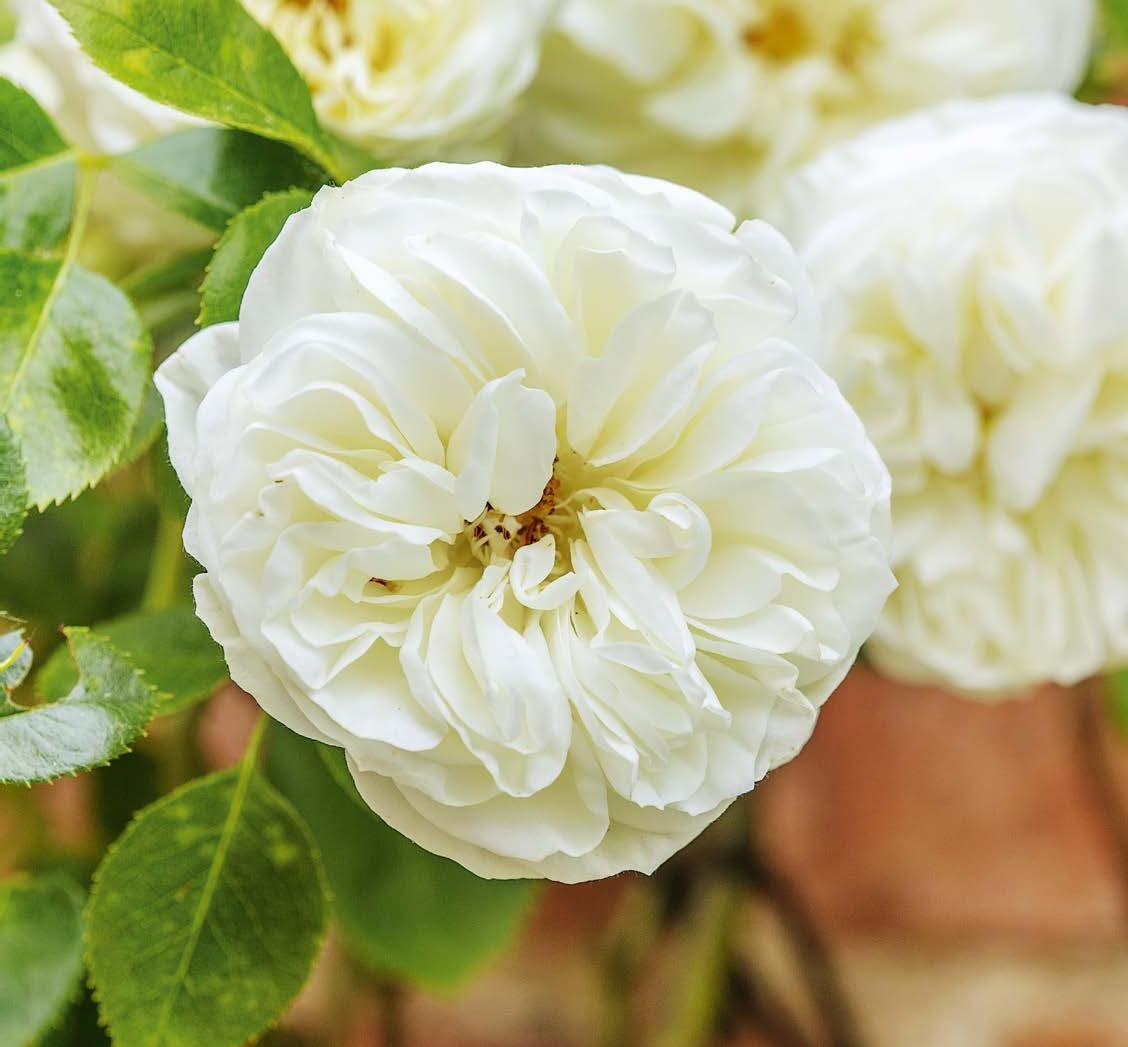
Agood climbing rose will turn walls, arches and even outbuildings into eye-catching features to look forward to year after year. Few know a good climbing rose better than Ian Limmer, nursery manager at Peter Beales, the Norfolk rose specialists. Ian joined Peter Beales Roses as a Saturday boy in 1977, after which he took a three-year apprenticeship learning from Peter
himself. Ian was appointed nursery manager in 1985 and today heads the hybridising programme at Peter Beales Roses, selecting the best seedlings to be sold as new releases. With the benefit of his years of experience, here he suggests ten excellent climbing roses.

Peter Beales Roses, London Road, Attleborough, Norwich, Norfolk NR17 1AY. Tel: 01953 454707; classicroses.co.uk
1 ‘Clarence House’

Flowering throughout summer, “this shorter climber is ideal for arches, walls and trellises”, explains Ian. Its old-fashioned-looking blooms are a delightful shade of creamy-yellow, and it was named by the Queen Mother when it was presented to her on her hundredth birthday at the Sandringham Flower Show in 2000.

JULY 2023 THE ENGLISH GARDEN 95 TOP 10 PLANTS WORDS VIVIENNE HAMBLY IMAGE CLIVE NICHOLS
2 ‘Mme. Grégoire Staechelin’
This once-flowering rose has stood the test of time, remaining a popular choice since it was introduced in 1926. “It’s scented and is one of the first pink roses to bloom in May,” explains Ian. “Its flowers hang like bells and it’s good for walls and rustic buildings.” It can reach 7.5m, so it needs space and support as well as full sun.
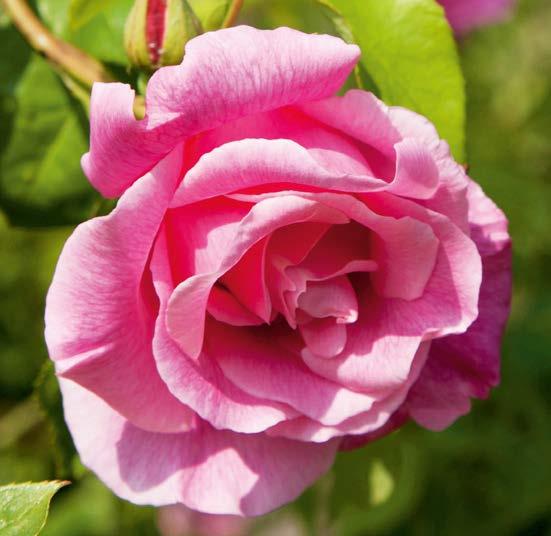
4 ‘Souvenir de la Malmaison’
This climbing Bourbon rose was introduced in 1843 and named after Château de Malmaison, where Empress Josephine tended a rose garden. It’s a repeat-flowerer, and Ian points out its superb fragrance with sweeter notes. Its quartered flowers appear from June to November, and it reaches around 3.6m in height.
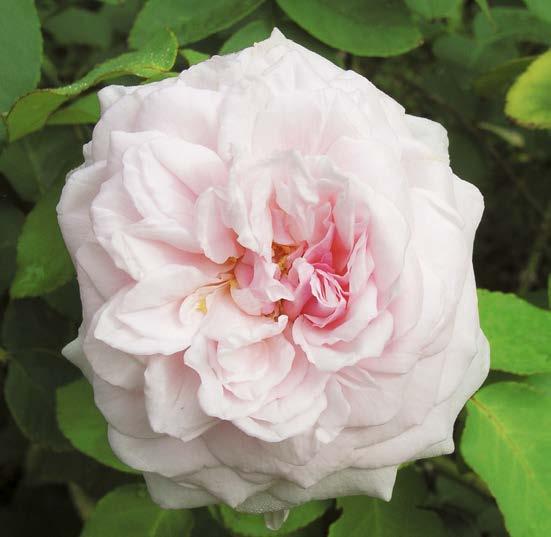
3 ‘Climbing Ena Harkness’
For a deep red climbing rose look no further. “It has a superb fragrance, it’s one of the first reds to bloom and it’s a repeat flowerer,” advises Ian. This climbing hybrid tea makes a strong cut flower and will also tolerate a north-facing wall, where sun is limited. It eventually reaches around 4.5m with a 2.5m spread.

5 ‘Lady Hillingdon’
For a timeless, butter-yellow rose to clothe the wall of a building, consider ‘Lady Hillingdon’, an old rose that was introduced in 1877. “It’s repeat flowering and has a fantastic fragrance,” notes Ian, picking up on its classic tea scent. Its new leaves are a rich dark red in spring, which will complement judicious planting nearby.
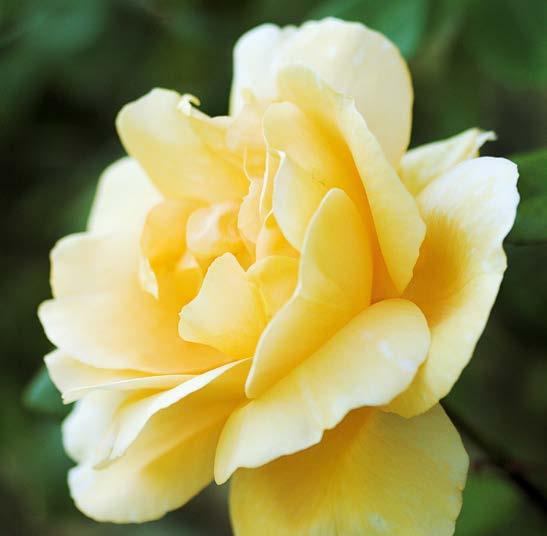
96 THE ENGLISH GARDEN JULY 2023 TOP 10 PLANTS
6 ‘Bienvenue’
“Grow this modern climber, introduced in 2011, in full sun on a south-facing wall, arch or trellis,” Ian advises, “or train it along a fence.” It is repeat flowering, so expect its deep pink, double, scented blooms to appear from June to October. The foliage is dark green.
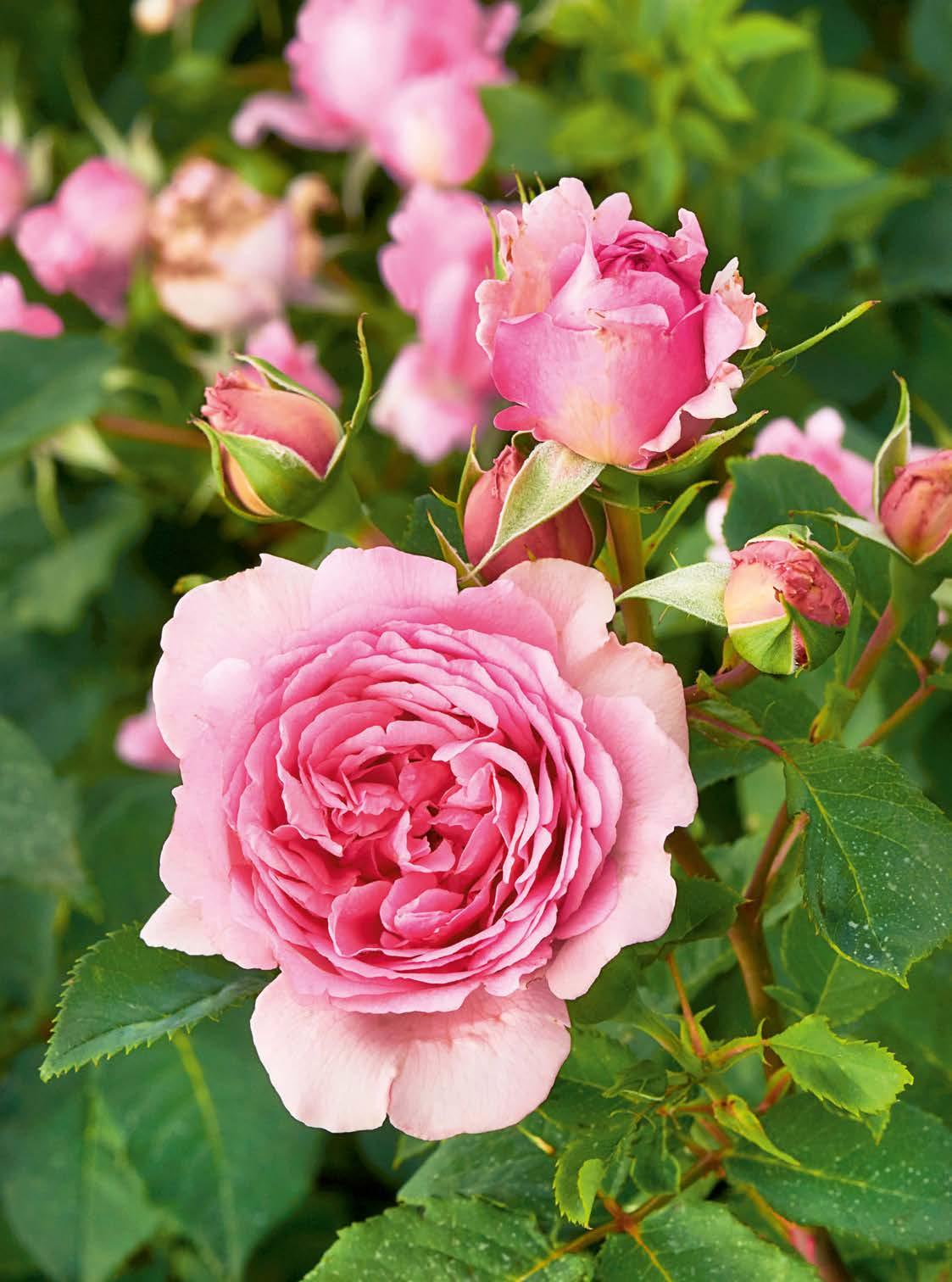
JULY 2023 THE ENGLISH GARDEN 97 IMAGES GAP/CLARE FORBES/MARTIN HUGHES-JONES/NOVA PHOTO GRAPHIK; GARDEN WORLD IMAGES
7 ‘Mermaid’
Open-cupped single flowers with a lemon-rose scent make this variety good for pollinating insects. “It’s tough and vigorous, it can cover a large expanse of wall – even a north-facing one – and its pale yellow flowers bloom almost continuously from June to October,” says Ian. Foliage is dark green and glossy.


9 ‘Pippin’
With two flushes, one in June and July, and another from September to November, Pippin brings plenty of interest to the garden with its warm pink flowers. “It is a good strong, healthy pillar rose with lush green foliage,” notes Ian. It will tolerate all but the deepest shade and reaches a height of 2.4m with a 1.2m spread.
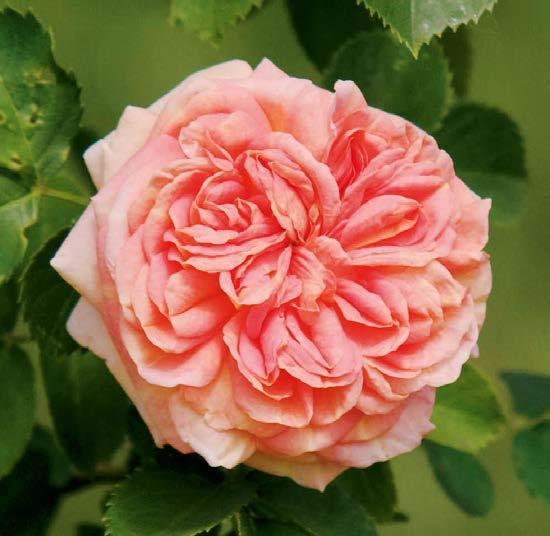
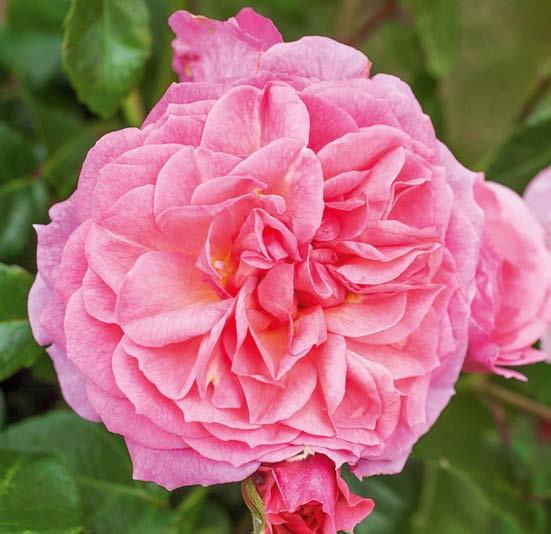
8 ‘Alchymist’
Heavy double flowers are the key feature of this modern climbing rose from German breeder Kordes. The attractive yellow-apricot folds of petals turn pale with age, and through June and July there’s a splendid show of blooms. It grows in full sun or part shade and reaches around 3.6m in height with a 2.4m spread.
10 ‘City of York’
Abundant semi-double flowers with a thick central cluster of golden stamens make this a super plant for wildlife-friendly gardens. Ian says it’s a good candidate for training over a northfacing wall. “Its blooms have a lemon fragrance, it has glossy foliage and lovely, soft, pliable wood for training,” he adds. n
98 THE ENGLISH GARDEN JULY 2023 TOP 10 PLANTS IMAGES GAP/EVGENIYA VLASOVA; GARDEN WORLD IMAGES
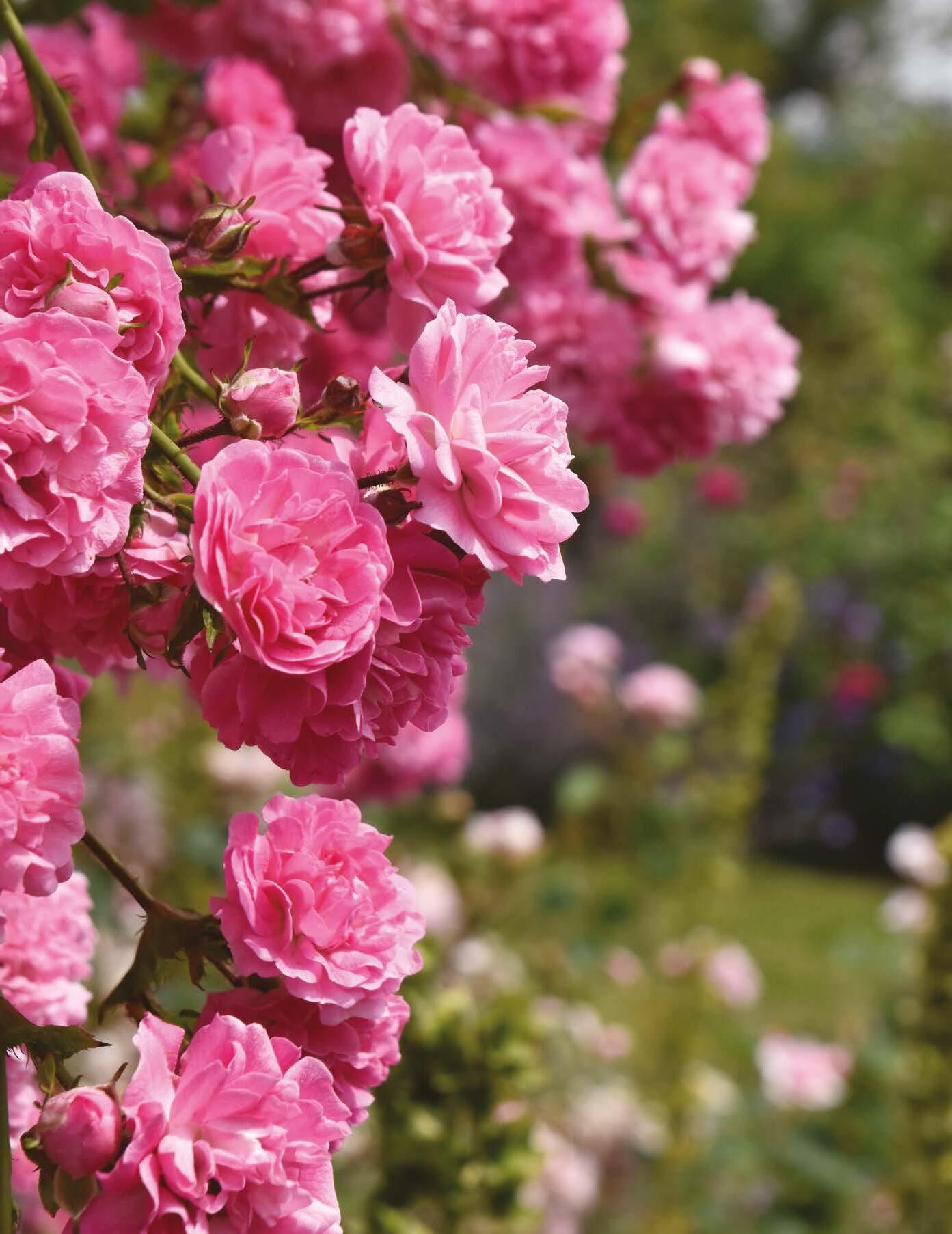





rosa ‘Minnehaha’ Every garden deserves a rose... • MAIL ORDER • SPECIALIST PLANTS www.classicroses.co.uk 01953 454707 Norfolk NR17 1AY Gardening is a fantastic hobby, helping to boost mental health and spiritual well-being; so now is the time to get out into the garden to discover and enjoy the beauty of nature and we at Peter Beales are aiming to help you achieve that. We feel that every garden deserves a rose and every rose from our extensive world leading collection is of the finest quality, carefully selected and hand cultivated to the highest of standards here in East Anglia. With over 800 varieties available, we are positive you’ll find the perfect roses for your garden. Scan me to browse beautiful roses!











A brand featured in the King Charles lll coronation and 75th birthday commemorative album E: nickmartel1260@gmail.com | www.avantgardenbronzes.com | t: 07544 740449
Everyday Heroes
Gracing just about every garden in the country with their pretty unassuming charms, easygoing hardy geraniums are a firm favourite of Sue Clarke, holder of two Plant Heritage National Collections, who recommends the best species and varieties to try
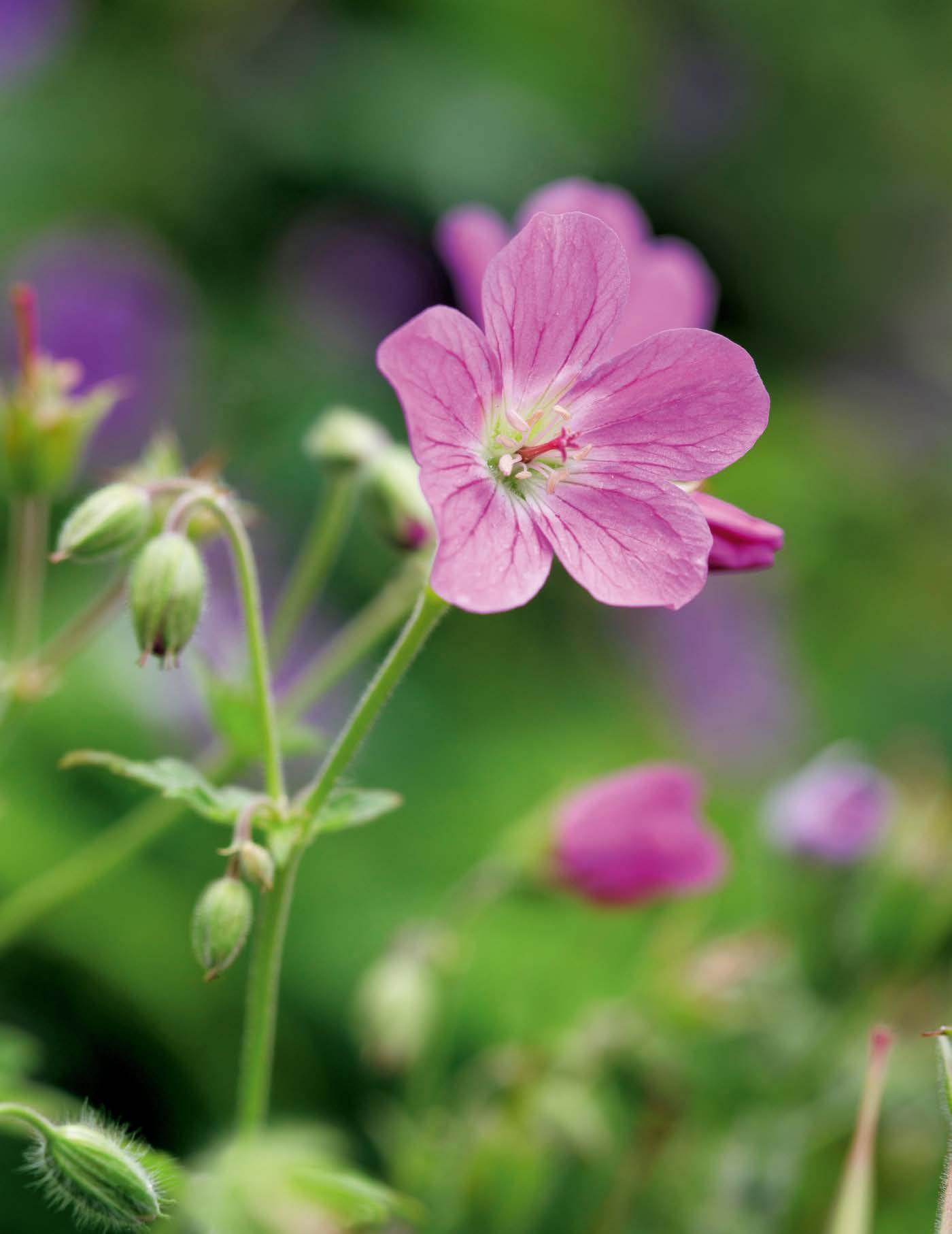 Geranium sylvaticum ‘Master Charles Wilson’, hails from Northumberland and is pretty much fuss free.
Geranium sylvaticum ‘Master Charles Wilson’, hails from Northumberland and is pretty much fuss free.
PHOTOGRAPHS ANNAÏCK GUITTENY JULY 2023 THE ENGLISH GARDEN 101
FOCUS WORDS CLARE FOGGETT
PLANT
It’s a struggle to think of a plant that’s as useful and hardworking as a hardy geranium. A huge proportion of gardeners must surely grow them, yet they never seem overused – just ever-popular. This is testament to what superb garden plants they are, something that is in part down to the fact that they’re so straightforward to grow.
“They don’t need any attention at all,” says Sue Clarke, who is a Plant Heritage National Collection holder of Geranium sylvaticum and G. renardii Sue’s first geraniums came from her mother – the ease with which hardy geraniums can be dug up and divided means this is often the way, and many plants are imbued with memories of friends and family. “My mother was a great plantswoman. She didn’t really know many names, but she loved plants and
gave me lots of geraniums. When I got my first home, she said: ‘Here’s a clump of these, take this, take that.’ And they were great because they flowered for such a long time and you didn’t have to do anything with them – I wasn’t really a gardener back then,” Sue admits.
When Sue and her husband acquired a bigger garden in 1992, her gardening grew more serious. RHS courses were completed and her interest in plants deepened. “But geraniums always resonated when I went into garden centres,” she recalls. She’d already joined the Cottage Garden Society (she’s currently the Society’s chair), and then the Hardy Plant Society, within which she joined the Hardy Geranium Group. “I became a member of the committee, then editor of the newsletter, and it was another Hardy Geranium Group committee member, Margaret Stone, who suggested I start a collection, so I did, in 2014.”
Geranium sylvaticum and G. renardii were the geraniums Sue really liked and wanted to collect more of. Over time, with lots of reading and research, she added to her collection of both species until she was granted collection status by the conservation charity. “That’s how it started, and it’s become a real passion. I do talks now as well,” adds Sue. “I do one called ‘Hardy Geraniums: the Good, the Bad and the Ugly’ because there are some ugly ones that seed everywhere, and I do always try to be honest with people. But there are plenty that are well behaved and don’t seed about at all.”
G. sylvaticum falls into that latter category. A British native, in the countryside the wood cranesbill is at home in woodland or sunny meadow, so in the garden it’s equally happy in sunny borders or partial shade. “They form a really nice mound, and I’ve never had any trouble with them,” says Sue. G. sylvaticum ‘Mayflower’ is perhaps the best-known cultivar, with masses of purple flowers from May to June. “It’s just excellent. It’s such a good doer, with a lovely rich colour,” says Sue. But her collection proves there are plenty of others to tempt.
‘Amy Doncaster’ is a particular favourite, with white eyes in the centre of mauve-blue flowers. As is ‘Coquetdale Lilac’, which has pale lilac flowers with a white centre. “It has lovely, limey fresh leaves as it comes up,” Sue enthuses. G. sylvaticum ‘Angulatum’ is the first variety Sue grew, and the one that kick-
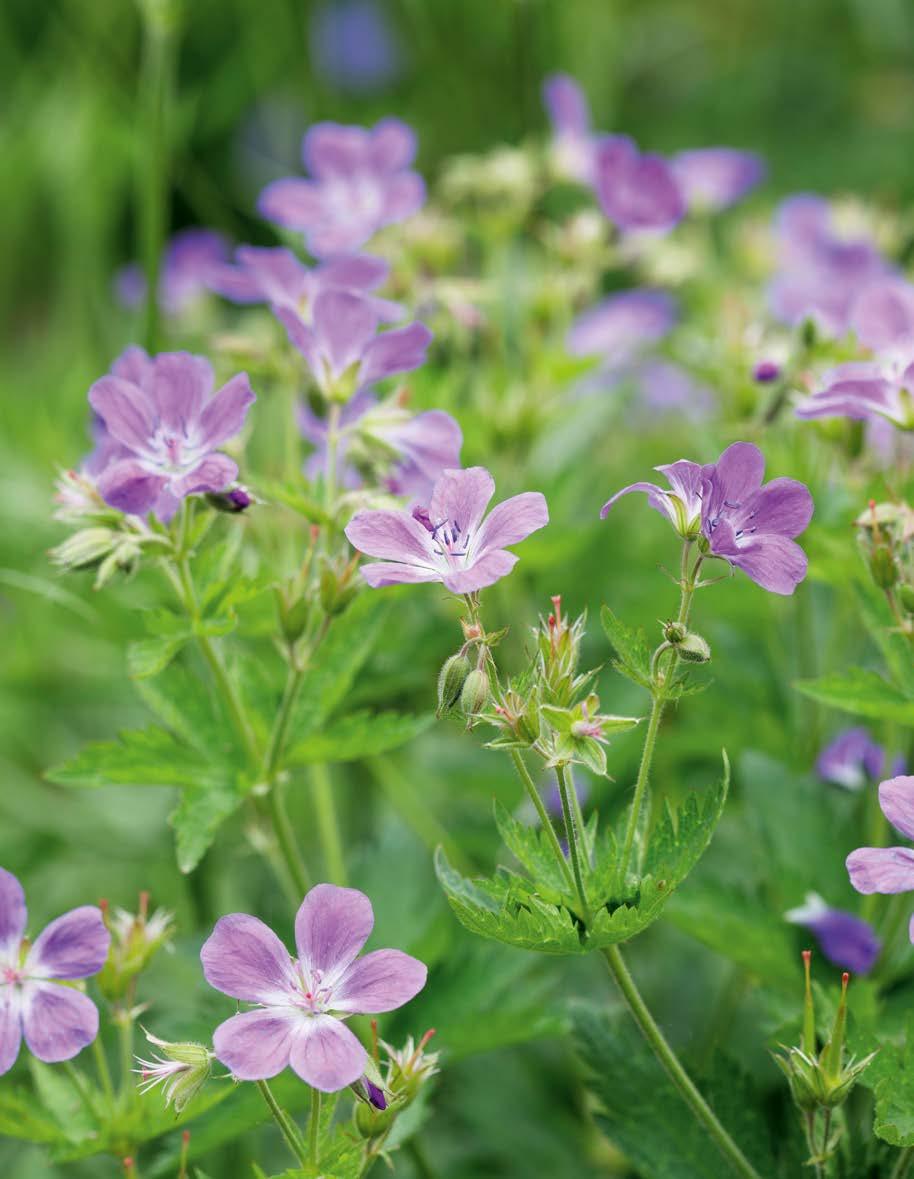
102 THE ENGLISH GARDEN JULY 2023
PLANT FOCUS
Above Popular G. sylvaticum ‘Mayflower’ produces a profusion of pretty blooms in a gorgeous shade of purple from May to June.
Above left ‘Angulatum’ in palest pink with darker veining was the first variety Sue grew.
Above right Pretty ‘Amy Doncaster’ has mauveblue flowers centred around a white eye.
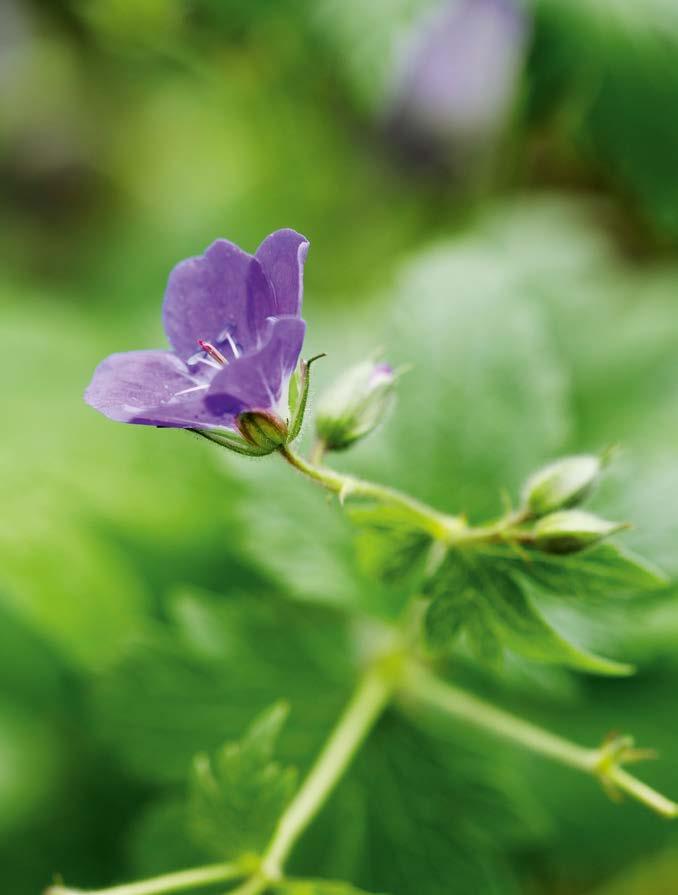
Below right Cyril Foster’s ‘Cyril’s Superb White’ is larger than the norm, reaching 50cm tall.
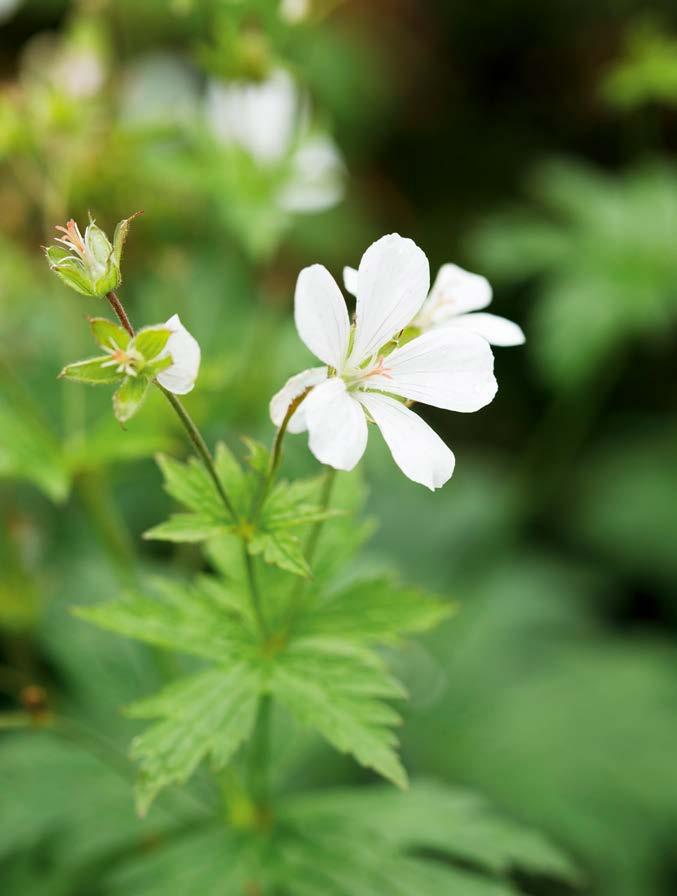

Below left ‘Coquetdale Lilac’ has pale flowers above limey leaves.
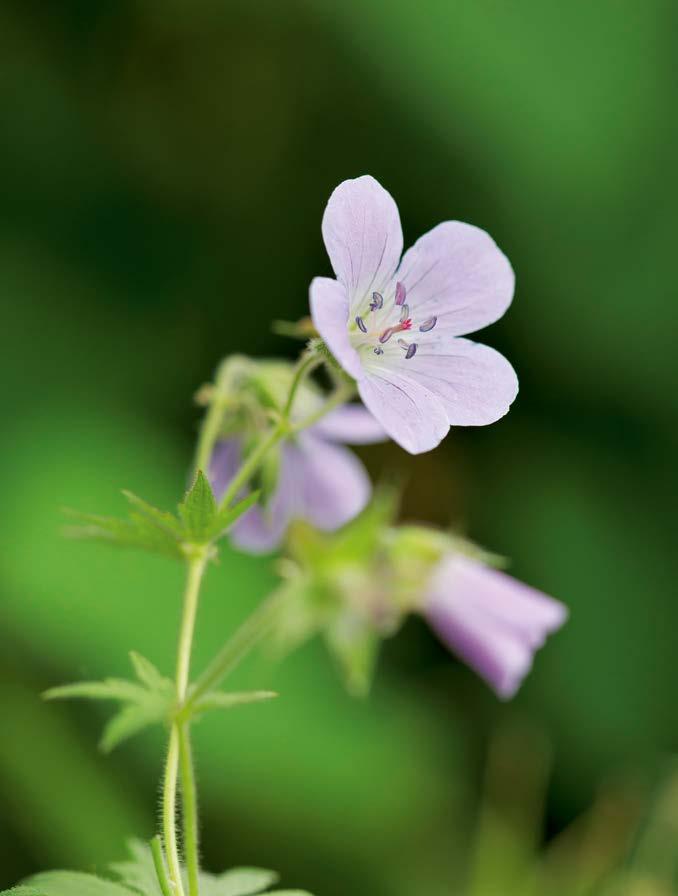
We supply a range of hand-thrown pots from the island of Crete, which are probably the nest available. Each pot, however big, is hand thrown by craftsmen using traditional skills honed and passed down through each generation over 12,000 years.
We o er styles and sizes to suit all tastes and applications. Our terracotta pots make the best home for any plant as they o er a cool protective, breathable environment for root growth.













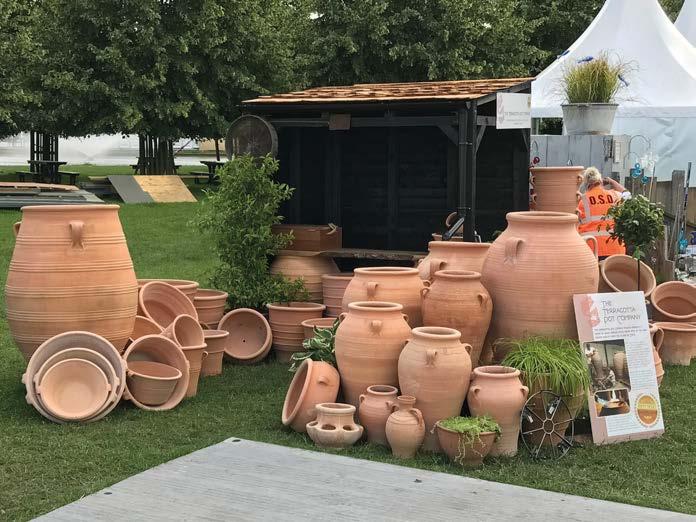
All of our pots are supplied with a 50 year frost proof guarantee down to minus 20 degrees centigrade therefore ensuring the long life of these future antiques. For more information visit www.theterracottapotcompany.com
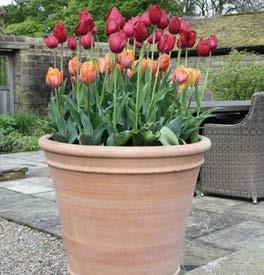
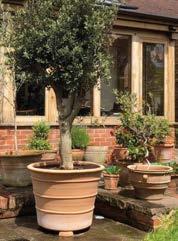
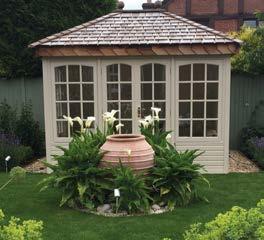




104 THE ENGLISH GARDEN JULY 2023 STYLISH RETREATS IN THE UK’S HOTTEST LOCATIONS boutique-retreats.co.uk +44 (0)1872 553 491 enquirie s@ boutique-retreats.co.uk
our
of
in unique
the
We know how good
should be.
From cosying up fireside in a country cottage, to stargazing from a dreamy hot tub at your clifftop hideaway, escape the everyday and seek the magic of a staycation with Boutique Retreats. With over 260 luxury abodes to choose from, uncover
curated collection
luxury retreats, set
locations across
UK.
getaways
50 Year Frost Proof Guarantee Issuedwithevery registeredpot Website heldpricesfor 2023
started her passion for these plants. “It’s a lovely pink with darker pink veining. It was my first and I loved it, so I tried to find more. I’d go to a nursery in Preston called Catforth Gardens, where Judith Bradshaw had a collection of geraniums, and I got a few plants in my collection from her when her nursery shut down in 2006.”
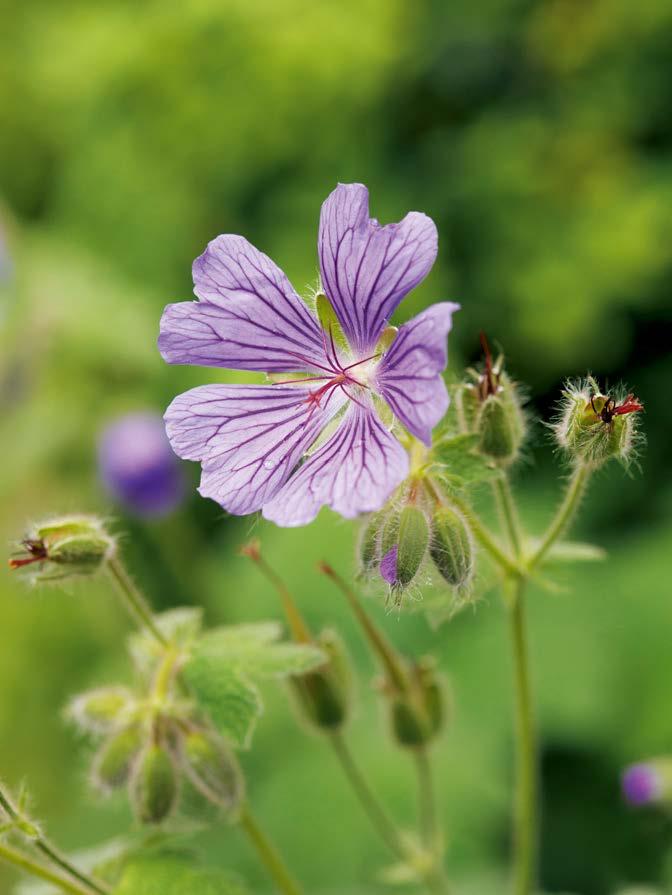
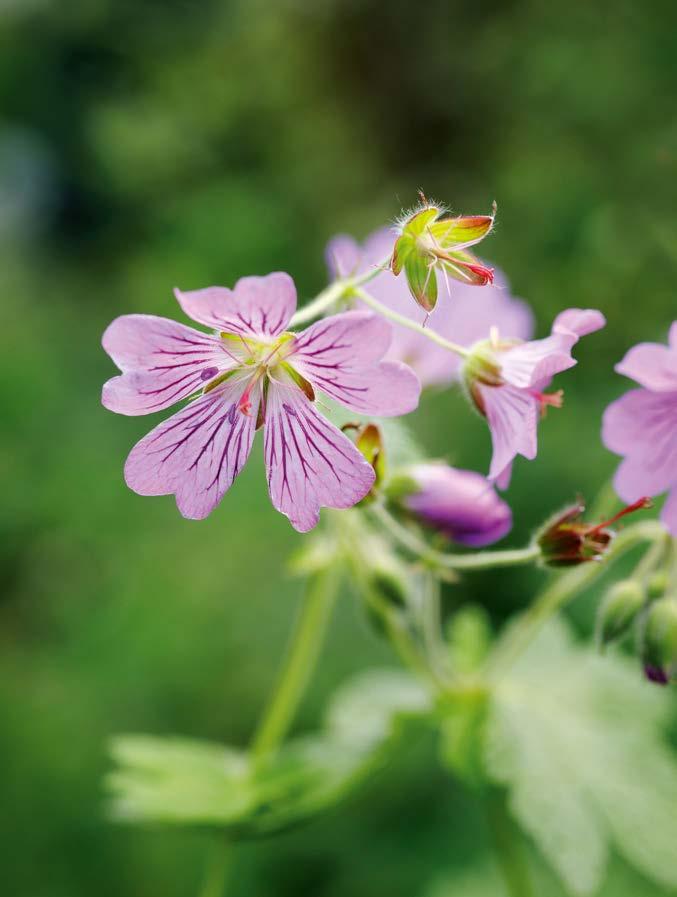
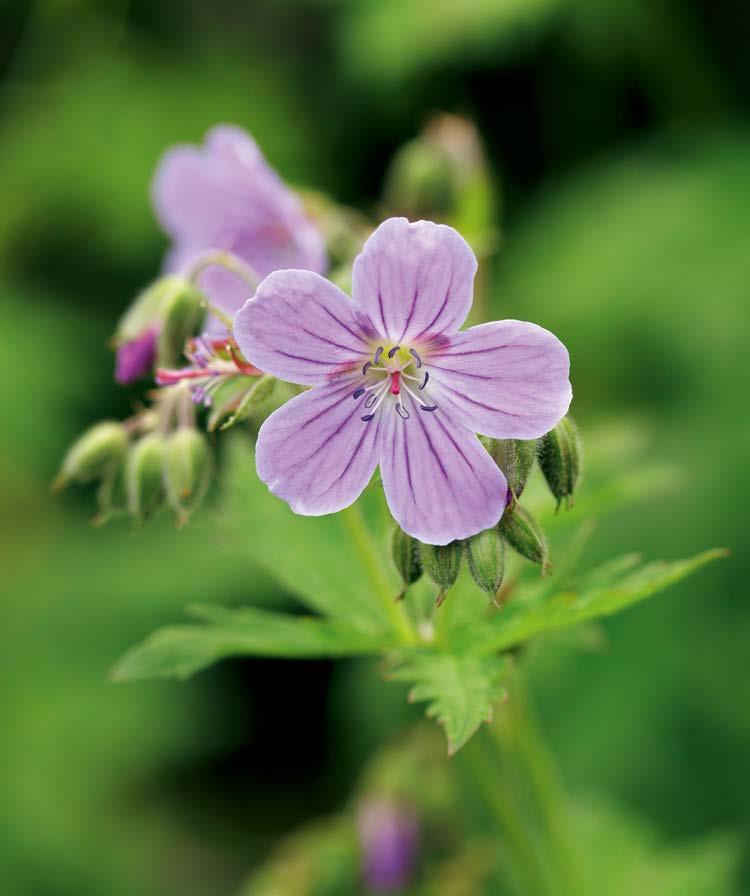
Most of the plants in Sue’s collections have a story behind them. Several were bred by Alan Bremner on Orkney, while others were introduced by Cyril Foster in Hexham, Northumberland. G. sylvaticum ‘Cyril’s Superb White’ “is one of the best and a bit bigger than the norm, I’d say about 45-50cm tall,” says Sue. Another Northumberland geranium enthusiast and breeder, Robin Moss, was responsible for ‘Master Charles Wilson’, ‘Master Nial Lawson’ and ‘Miss Connie Wilson’. “They’re all named after his grandchildren,” adds Sue.
Sue’s G. renardii collection is slightly di erent in that these geraniums need a sunny spot to thrive. “They come from hot countries, and they need free-draining soil too, so I put lots of grit under them when I plant,” she says. They’re especially valued for their foliage – the leaves have a scalloped edge and an unusual, quilted e ect – but they also produce plentiful flowers. On the species, these are white with fine purple veining, but ‘Terre Franche’ boasts blue flowers, while ‘Mrs Judith Bradshaw’
JULY 2023 THE ENGLISH GARDEN 105
Above left Pink G. renardii ‘Mrs Judith Bradshaw’ has finely scalloped foliage. Above right ‘Terre Franche’ is another renardii type, but with a blue tinge to its blooms. Below ‘Master Nial Lawson’ from breeder Robin Moss is named for one of his grandsons.
PLANT FOCUS
is pink. “‘Terre Franche’ is a lovely blue and looks very similar to ‘Philippe Vapelle’, which is a very old variety. Both are really good doers – they don’t seed around, and they produce more flowers each year,” she adds. Named after the Preston nurserywoman, the pink flowers of ‘Mrs Judith Bradshaw’ are set o by golden leaves. “Alan Bremner named it after her because she used to trial plants for him,” notes Sue.
As a fully fledged geranium devotee, Sue doesn’t limit her geraniums to the two collections: she also grows plenty of other species and varieties. The joy of hardy geraniums is that there’s one to suit virtually any spot, including compact G. x cantabrigiense, which she recommends for the front of borders or rockeries. ‘St Ola’ is an old variety that she rates highly. The dusky cranesbill, Geranium phaeum, is a good choice for shade. Sue has unusual ‘Joseph Green’, a real rarity with purple and green double flowers.
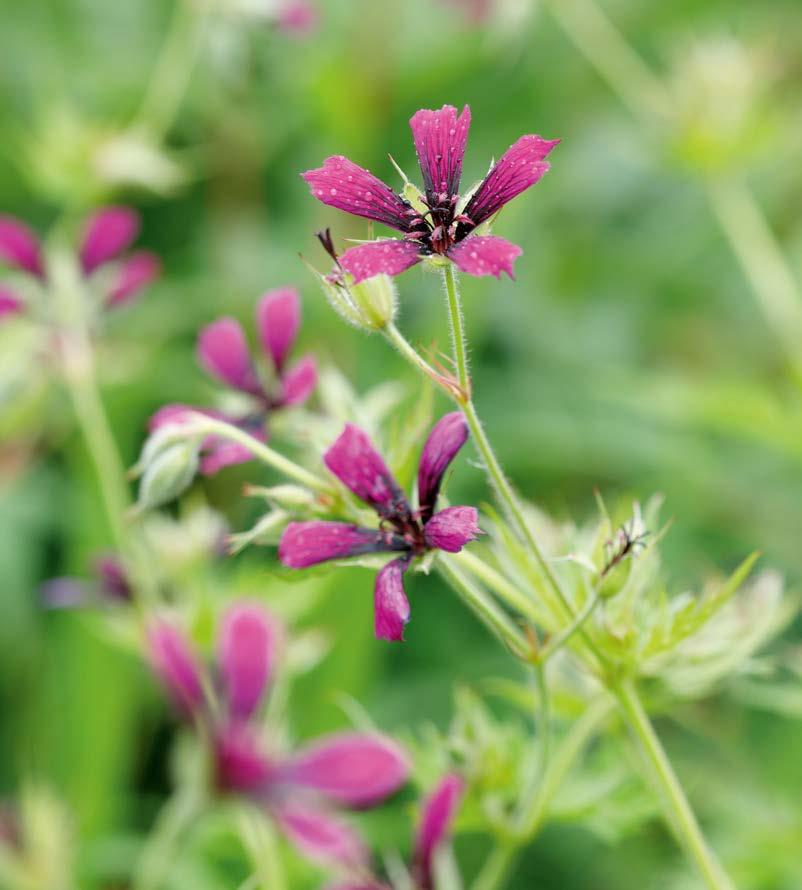
Lovers of the unusual will appreciate Geranium
Reliable geraniums
Sue Clarke shares her tips for getting the best out of these straightforward plants
Geraniums aren’t fussy about soil. “I used to live in a clay area and they grew really well. Now I’m on more loamy, freedraining soil, and they grow well here, too,” says Sue.
Shade tolerance is common to many geraniums. “The phaeums in particular flower well in shade,” Sue notes. “With others, if you put the plant in a sunny spot, the heat generates more flowers. Geranium pratense are prone to mildew if they get too dry and tend to do better in a more shaded spot.”
Pests and diseases aren’t really a problem. “If you’ve planted something and it doesn’t do well, dig it up and move it to a sunnier spot. But check the roots first,” Sue advises. “They sometimes get vine weevil if grown in pots.”
Divide in spring to make more plants. “I always carry out my propagation in spring, when the weather’s getting better, usually around the end of March,” says Sue. “Dig up a clump and chop it up with a clean sharp knife, making sure you’ve retained a section of root and a section of leaf. You can replace the ‘mother’ plant back in the hole and then pot up the smaller divisions. Some can literally be pulled apart.”
Feed in spring, if you feel it’s necessary. “If it’s been a tough winter, I might put a little bit of blood, fish and bone around them, and I mulch around the plants with my own compost,” says Sue. “I don’t water them, unless we have a summer like last year’s, and then only those that looked limp and needed it.”
psilostemon ‘Catherine Deneuve’ for its slender petalled magenta flowers. Geranium nodosum will flower from May to September in sun or shade, but beware, for it is a vigorous self-seeder. “There are some that are absolutely beautiful and excellent plants,” says Sue. ‘Clos du Coudray’ has violet flowers with dark veining held above its shiny leaves, and she also recommends ‘Tony’s Talisman’. “It’s a deep, rich colour. When I open my garden to the public, it’s the plant visitors always comment on.”
There are many more to admire, seek out and try, and new varieties are added to the canon all the time. “When in doubt, plant a geranium!” was Margery Fish’s reply when asked for the ‘secret’ to gardening. It’s a sentiment with which Sue agrees. “That’s my ethos, too. Of all of the geraniums I’ve grown, 90 per cent of them are bombproof.” n
Sue’s National Collections open by appointment from May to July. Email wrenburysue@gmail.com or visit plantheritage.org.uk. Visit thecgs.org.uk for details on The Cottage Garden Society.
106 THE ENGLISH GARDEN JULY 2023
GROWING ADVICE
PLANT FOCUS
Below Ring the changes with striking ‘Catherine Deneuve’, which has slender two-tone petals in shades of magenta.
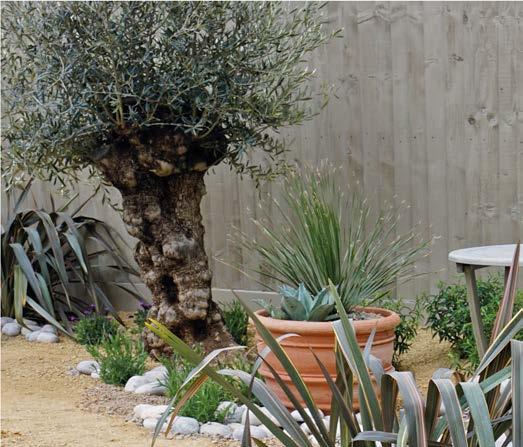
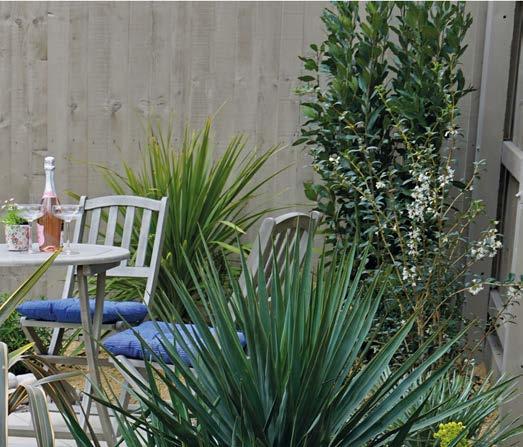

















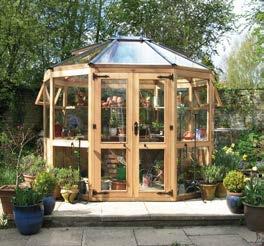
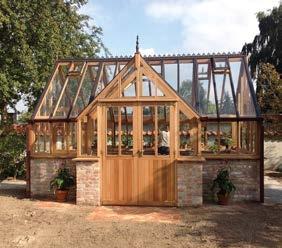
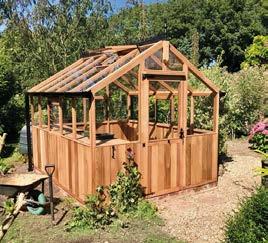


JULY 2023 THE ENGLISH GARDEN 107 Garden Plants available for 0203 137 5159 www.gardenplantsonline.co.uk Nationwide Delivery Call us for more details: using our own fleet arden Discounts available for trade customers PlantSupports(UK)Ltd.Skipperley with a passion for gardening and we are proud to say PlantSupports(UK)Ltd.Skipperley Support where it’s needed Plant Supports (UK) Ltd have the largest range of Plant Supports within the UK. All handmade in Tenbury Wells, Worcestershire. Made by Gardeners for Gardeners. WOODPECKER JOINERY WESTERN RED CEDAR GREENHOUSES, COLDFRAMES AND GARDEN BUILDINGS BY APPOINTMENT TO HRH THE PRINCE OF WALES TIMBER GREENHOUSE AND COLDFRAME MANUFACTURERS WOODPECKER JOINERY UK LTD BRAMSHALL, STAFFORDSHIRE For more information Telephone: 01889 562 610 www.woodpeckerjoinery.co.uk
GO GREEN WITH GARDENA
Author, grower and GARDENA ambassador Huw Richards has ten tips for sustainable gardening
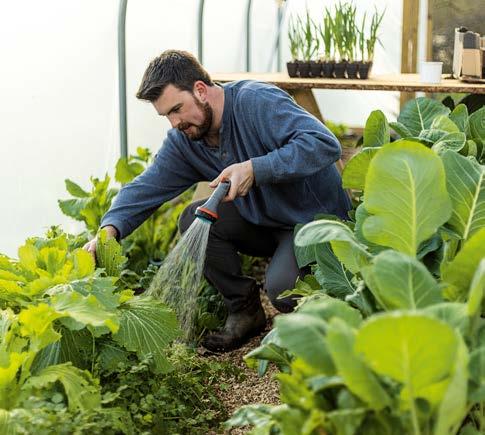

GARDENA aims to inspire passionate gardeners from around the world to care for their gardens while caring for the planet. But sustainable gardening doesn’t have to mean drastic changes, as GARDENA ambassador, YouTube sensation and passionate gardener Huw Richards explains. Huw shares his top ten tips for greener gardening, which can be as simple as making your own plant labels rather than buying them new, or reducing the amount of water your garden uses through water-saving irrigation.
1
Use local resources
Our local communities are the perfect place to start when it comes to finding free, organic matter to help build up our
compost. Waste co ee grounds, leaves, cardboard and vegetable peelings are all incredible ingredients that can be used to make nutrient-rich compost. Try reaching out to local cafés, restaurants and community groups.
2 Make every drop count
As we saw last year, our summers are becoming longer and drier. Droughts were prevalent in the UK in 2022 and hosepipe bans were introduced across much of the country. Using e cient irrigation tools, such as the GARDENA Micro-Drip System, either side of the intense, midday sun will help reduce water loss from evaporation, while delivering water directly to plants’ roots, where it’s needed most.

Above left The GARDENA Pressure Sprayer o ers even distribution and hydration. Top right Collect rainwater if possible and use it for watering; lower in calcium than tap water, it’s better for your plants. Above Grow your own to save food miles.
3 Turn weeds into plant feed
Make your own multi-purpose plant feed to give your plants vital nutrients to help them thrive. ‘Weeds’ such as nettles, dandelions, dock and thistles are perfect ingredients, so rather than throwing them away, put them to good use. Simply leave the weeds to steep in water, as you would when making fertilisers from comfrey leaves. Dilute the resulting concentrated liquid with water and use your GARDENA Pressure Sprayer for even distribution and hydration.
PROMOTION 108 THE ENGLISH GARDEN JULY 2023
4 Make your own plant labels

Save empty yoghurt pots and icecream tubs to turn into plant labels for seedlings. Clean them, cut into strips and write on them with permanent marker.
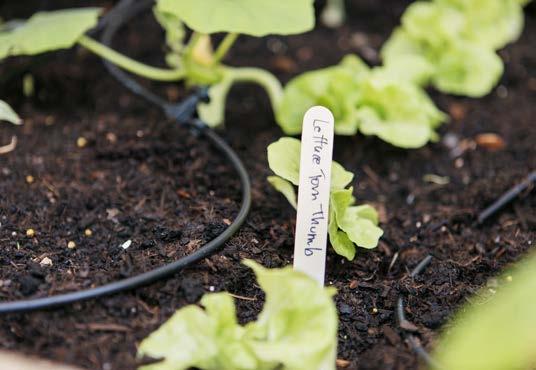
5
Mulch garden borders
Rather than spending money on bags of mulch, use grass clippings instead. They are great because they break down, putting organic, natural nutrients back into the soil, while retaining moisture and helping to suppress weeds.

6 Capture rainwater
Not only is rainwater free, it is much better for your plants because it is lower in calcium than tap water. I usually capture rainwater in IBC tanks, which can also double up as a trellis to support peas and runner beans, disguising the container. If you have a water butt or barrel, the GARDENA Battery Rainwater Pump is perfect for transporting water from the butt to the hose, which you can then connect to a sprinkler or sprayer to water your outside space.
Top left Recycle your old yoghurt pots into smart labels for your plants. Left In hot summers, set the GARDENA Micro-Drip System to deliver water directly to crops’ roots exactly when they need it most. Above For healthy plants, collect rainwater in a water butt or tank, then use the GARDENA Battery Rainwater Pump to transport it to the hose.
7 Grow more perennials
More sustainable than resourceintensive annual bedding, perennials are plants that keep on giving. In the vegetable garden, choosing perennial crops means harvests that get better year on year. Rhubarb, asparagus, artichokes and perennial herbs such as mint and oregano are just a few excellent choices.
8 Waste not, want not
Use cardboard toilet rolls as pots to start o your peas and beans and then transplant them, pot and all, once they’re big enough – the cardboard will simply break down into the soil. Old newspapers can also be shaped into pots using a pot making tool, while pieces of cardboard can be laid at the base of raised or no-dig vegetable beds to help suppress weed growth, or shredded and added to the compost heap.
9 Grow winter vegetables
Grow plenty of winter vegetables like leeks, swede, and cabbage, and reduce the need for imported crops that clock up
the food miles. These tough vegetables require virtually no care over the winter months but will provide you with lots of fresh produce, perfect for making winterwarmer soups and casseroles.
10 Swap seeds
Go to local seed and plant swaps to swap with local growers rather than buying new from the garden centre. Plants will usually come in reused plastic pots rather than new ones, and those grown from the seed of healthy, productive, local plants could be better suited to your garden’s conditions. You might also meet some fellow passionate gardeners and swap tips!
For more sustainable gardening advice, head to gardena.com/uk and for more garden inspiration and tips follow @gardena_uk on Instagram and Gardena.UK on Facebook.
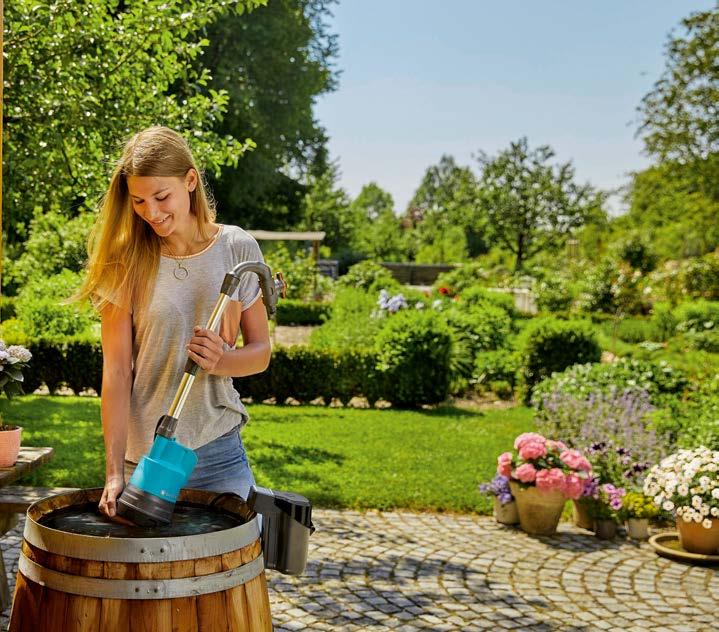
JULY 2023 THE ENGLISH GARDEN 109



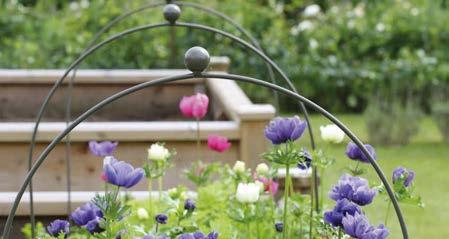
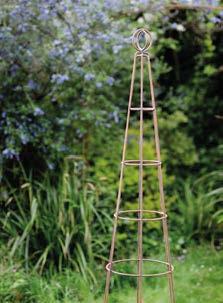
110 THE ENGLISH GARDEN JULY 2023 Eden Verandas is a trading style of Eden Verandas Ltd. Our registered address is Unit 13 Armstrong Mall, Southwood Business Park, Farnborough, GU14 0NR. Reg. No. 08259394. We are authorised and regulated by the Financial Conduct Authority FRN 801638. We are a credit broker and not a lender and o er credit facilities from a panel of lenders. Terms & conditions apply. Credit is subject to status and a ordability. *Terms and conditions apply. **With our Buy Now Pay Later Product you will pay no interest if you repay the loan in full within 6 months from installation. If you prefer you can choose to spread the cost for longer and pay the minimum repayment outlined below at the end of the deferred period instead. Interest is calculated and charged from the date of payout. Cash Price £8000 less a deposit of £2000. You can pay nothing for 6 months (although you can if you wish) then settle the balance by the due date. Total amount repayable £8000. Alternatively 120 monthly repayments of £80.76 with the 1st payment commencing 6 months after installation of the goods. Total Charge for credit £3691.20 Total amount repayable £11691.20 (includes £2000 deposit. 9.9% APR Representative). SUMMER SALE WITH UP TO 25 % OFF* BUY NOW, PAY LATER WITH A 25% DEPOSIT** INTRODUCING THE NEW “PANORAMIC” FROM EDEN ENGINEERED LOUVERED ROOF CLOSESAT THE TOUCH OF A BUTTON MANUFACTURED FROM THE FINEST, HIGH-GRADE ALUMINIUM OPTIONAL EXTRAS INCLUDE LED LIGHTING, WEATHER SENSORS AND VERTICAL BLINDS 56 RAL FRAME COLOURS TO CHOOSE FROM Call 0800 107 2727 and quote code EG140623 for a free brochure & no obligation quotation, or visit our website edenverandas.co.uk agriframes.co.uk | 0117 934 1790 Garden Inspiration Garden Structures . Fruit Cages . Plant Supports . Kitchen Garden . Outdoor Living 10%OFF AEG23 WHEN YOU USE CODE *VALID TO 31.12 . 23 see website for terms and conditions
DIZZYING HEIGHTS





Reduce visual monotony by adding an element of vertical interest to your garden with an obelisk or arch left stylishly bare or covered with colourful climbers

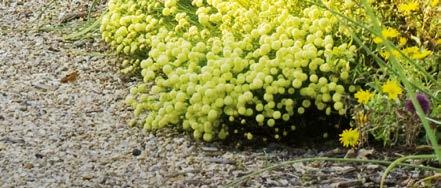
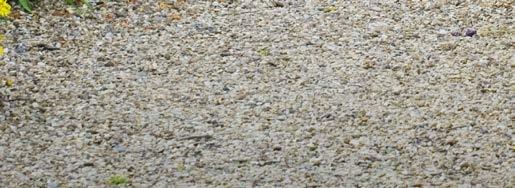
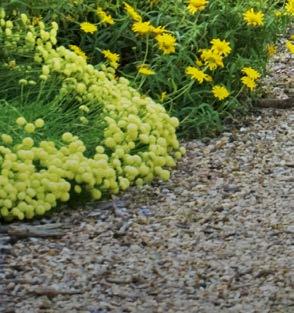



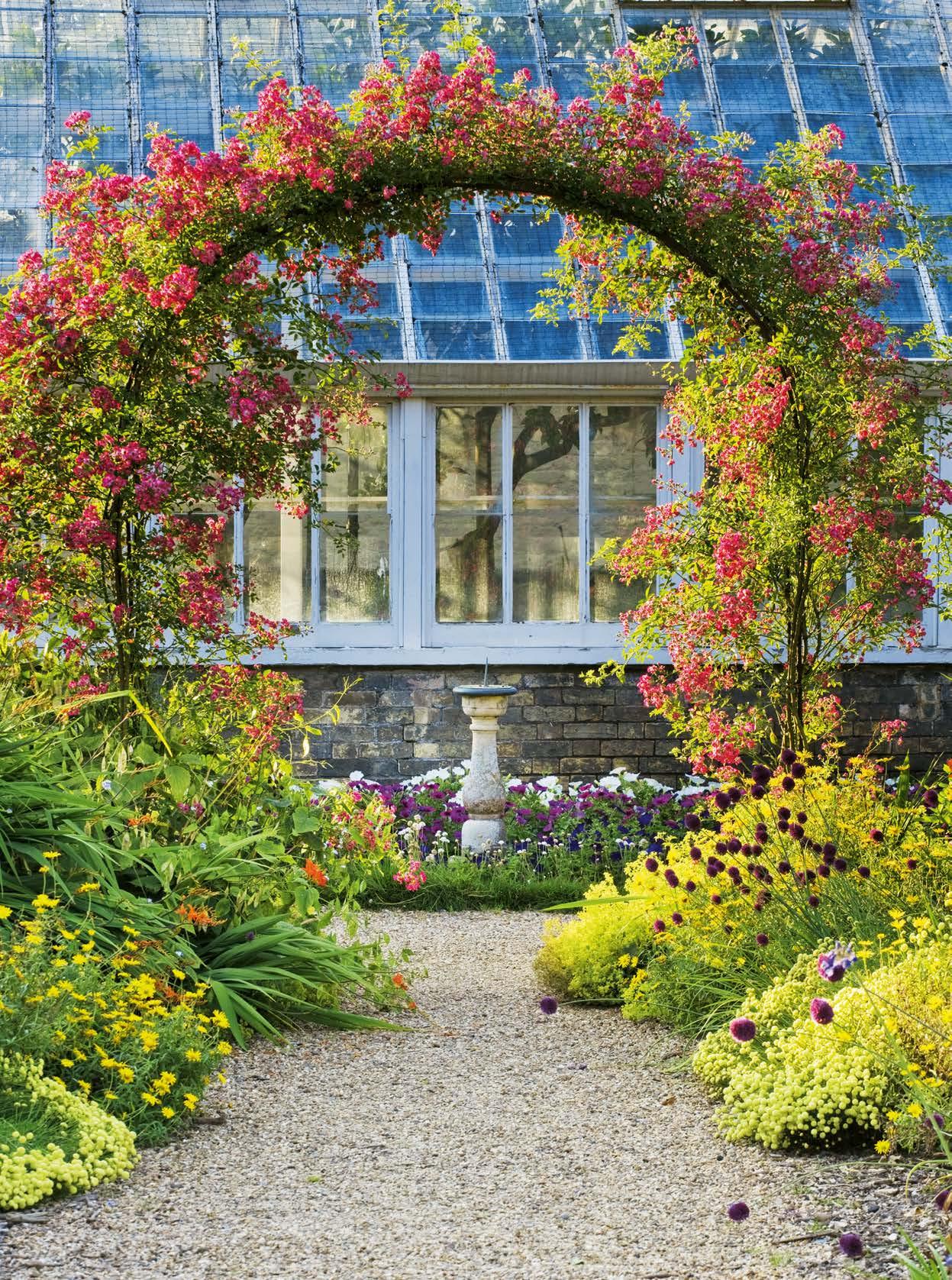
JULY 2023 THE ENGLISH GARDEN 111 SUMMER HEIGHTS
WORDS CLARE FOGGETT IMAGE CLIVE NICHOLS
An arch smothered with Rosa ‘Hiawatha’ frames the Orangery at Peckover House in Cambridgeshire.
As an expression, ‘flat as a pancake’ usually carries negative connotations – a deflated tyre, an unrisen cake. It’s not something anyone wants to hear said about their garden’s borders. We have moved on from the way traditional herbaceous borders used to be planted, with the tallest plants at the back sloping down to the smallest at the front, instead preferring to mix plants up in a less regimented, rigid way. But ‘flat’ planting, where everything has somehow ended up at the same height or level, can lead to visual monotony.
Rather than replant the entire border, there’s an easy fix to break things up and introduce height: a well-placed obelisk or two will do the trick. Instantly adding style, even when they’re on their own and unclothed by plants, obelisks act as eye-catchers and relieve the repetitive uniformity of one-level planting. In a larger border, regularly spaced repeated obelisks make for a truly dynamic design.
Below left Clematis
‘Madame Julia Correvon’, a perfect candidate for growing up an obelisk.
Below right The bright flowers of ipomoea climb a willow obelisk
Bottom right Rosa ‘Open Arms’ is a miniature rambling rose that won’t grow too rampantly.
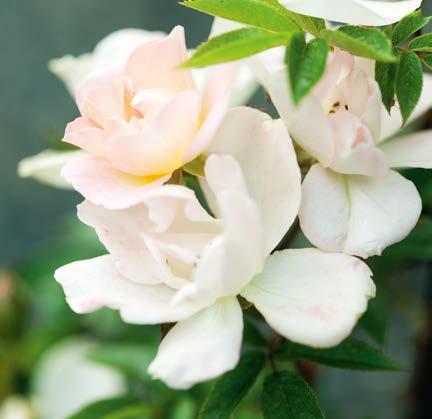
Sturdy, wooden, four-sided obelisks add grandeur and can be painted to suit other elements of the garden. Try Andrew Crace (andrewcrace.com), whose pyramidal wooden obelisk comes in small and large sizes, with a decorative lattice infill and turned wooden finial. Oxford Planters (oxfordplanters. co.uk) o er a straight-sided, pillar-shaped Cotswold Obelisk or the slatted London model.
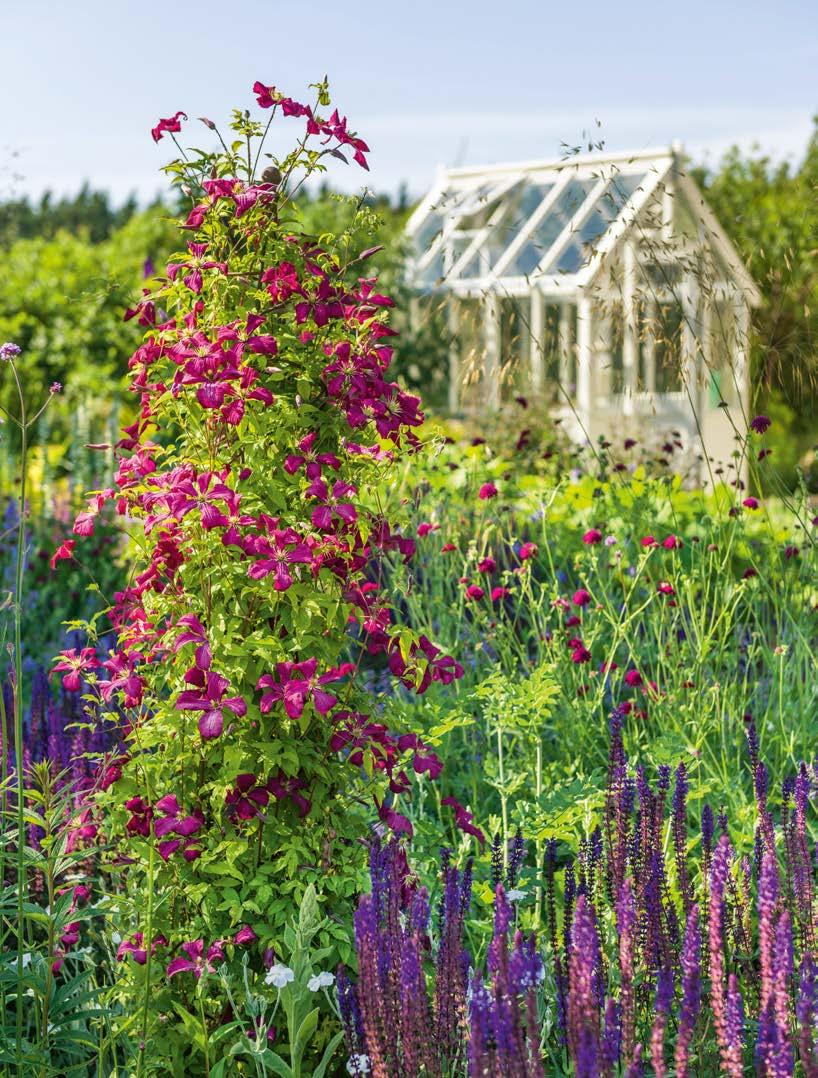
Metal obelisks have the benefit of longevity. They can be left in a border for years without rotting at the base of the legs – a variety of styles from elegant wire designs to chunky steel are available. Agriframes’ range is diverse, from pointed pyramidshaped obelisks to those with curved tops, all available in a variety of colours (agriframes.co.uk). Try Harrod Horticultural’s Southwold range if you like bold steel (harrodhorticultural.com), or garden designer Janey Auchincloss’s range of blacksmithforged galvanised steel obelisks, which are available through Gedding Mill ( geddingmill.co.uk).

SUMMER HEIGHTS
Woven willow or rustic arrangements of hazel sticks or prunings perfectly suit an informal cottage garden border, as do metal supports with a rusty finish. Weave your own willow if you’re feeling dexterous or look to suppliers such as Water Willows (waterwillows.com) for ready-made supports – they can also supply willow rods for weaving. The ‘rusty’ obelisks in Muntons’ range – pyramids or cylindrical columns – wouldn’t look out of place in a grand herbaceous border or within a melee of cottage garden perennials (muntons.net).
However beautiful the obelisk, it would take a strong-willed gardener to resist the urge to plant a colourful climber at its base. Unless the architectural qualities of the obelisk itself are the very essence of the design, why not use it to support something attractive that will flower at a higher level? The choice of climber is key – something too vigorous, like a rampant rambling rose, will soon outgrow the obelisk, even if it’s as tall as 2.5m. It’s also nice to glimpse a hint of obelisk through the climber – if the support is completely hidden beneath thick layers of foliage, the overall e ect can look a little odd, especially if the climber mushrooms outwards at the top, as they sometimes do.
Smaller climbing roses are ideal. Many of the English Roses from David Austin (davidaustinroses. co.uk) can be grown as shrubs or small climbers and would lend themselves to this. Or try a ‘miniature’ rambler such as pretty ‘Open Arms’ with flowers in
Top Matching wooden obelisks bring smart stature and structure to a herbaceous border. Above left Longflowering Clematis ‘Prince Charles’ Above right Growing annual climbers from seed means you can ring the changes each year – try colourful blackeyed Susan, thunbergia.
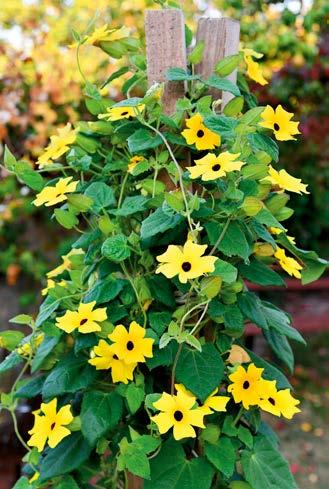
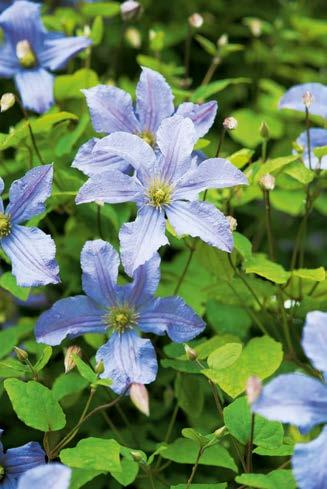
pale shell-pink, or ‘Warm Welcome’ in hot orange. Perhaps the best choice for refined obelisk scaling is clematis, however, especially since many have such a long flowering period. Clematis ‘Prince Charles’, for example, will produce its blue-mauve blooms from June to the end of August, while magenta-red ‘Madame Julia Correvon’ will flower freely from July to September. It’s just one of the shorter, more compact clematis you’ll find in the Viticella group. Annual climbers are another good option. Most will quickly clothe an obelisk within their short

JULY 2023 THE ENGLISH GARDEN 113
IMAGES GAP/HOWARD RICE (LYNNE & DAVE OLNEY)/JS SIRA/JULIETTE
WADE/FIONA RICE; ANDREA JONES/GARDEN EXPOSURES; SHUTTERSTOCK
Top left Vitis ‘Brant’ is a good choice for taller arches or gazebos, with its rich autumn colour.
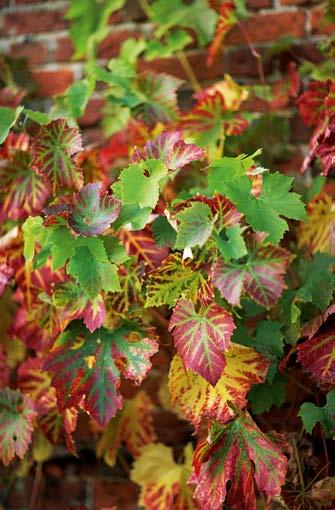
Top right Lonicera periclymenum ‘Graham Thomas’ has headily scented flowers, ideal for growing over an arbour Below Bring two halves of a border together with a linking arch.

growing season but won’t have time to overgrow it. For a border that’s planted for early-summer interest, sweet peas might be the best choice, but if something that looks good later in summer is required (sweet peas are usually starting to die o and look straggly by August), choose more exotic ipomoeas, thunbergias or rhodochiton. They need a spring sowing or can sometimes be bought as plug plants. Cottage gardeners could grow a pretty runner bean such as peach-flowered ‘Aurora’ or red and white ‘St George’, or even let a decorative squash scramble up the support.
Another way to add height and stature is with a well-placed arch, used to link two borders, frame a view or create a more dramatic transition between two parts of the garden. Grander still is a gazebo, perfect as a centrepiece at the meeting of paths. Both are much taller than obelisks, so the choice widens when it comes to adding climbing plants. Look to scented climbers to create a glorious bower of fragrance to linger beneath: honeysuckle (try Lonicera periclymenum ‘Graham Thomas’ for creamy flowers from July to September), jasmine or roses will all create a romantic scene. With more climbing space available, consider combining climbers to extend the season of interest: a springflowering clematis such as blue ‘Frances Rivis’ to be followed by June-flowering rose ‘Jacqueline du Pré’, for example; or Akebia quinata for its dangling maroon-coloured flowers in late spring, followed by burgundy-leaved Vitis ‘Brant’ for vivid autumn foliage, usually accompanied by bunches of inky grapes. For foliar interest – and colour – little can beat the golden hop, Humulus lupulus ‘Aureus’, which will reach the top of any archway in no time.
It’s always a case of the sturdier the better when it comes to choosing these supportive features. Nobody wants to spend years training and establishing a climber only to find the whole structure listing or threatening to topple over because it has rotted at the base. Stuart Garden Architecture (stuartgarden.com) stocks pleasingly solid timber arches in its classic range, made from kiln-dried iroko hardwood, which is renowned for its longevity. At installation, try using metal post spikes to further prolong the life of wooden legs. Metal arches and gazebos should be built to last and strong enough to support the weight of a full-blown climber. The powder-coated, solid steel options sold by suppliers such as Harrod Horticultural or Agriframes are heavy duty, but don’t sacrifice graceful looks in the quest for sturdiness. n
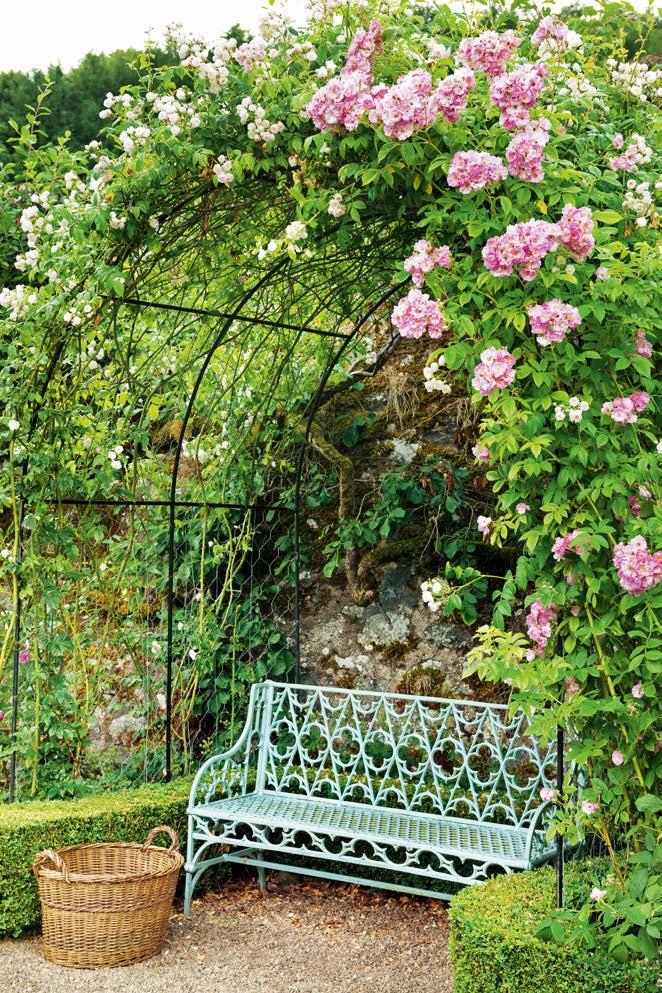
114 THE ENGLISH GARDEN JULY 2023
SUMMER HEIGHTS
Six Smart OBELISKS
Choose from a wide range of shapes and sizes, in wood or metal, for easy, instant height
A Solid Start
Andrew Crace’s Garden Obelisk is available in two sizes: small at 180cm tall or large at 225cm tall. They can be made in either iroko or oak. From £3,160, andrewcrace.com
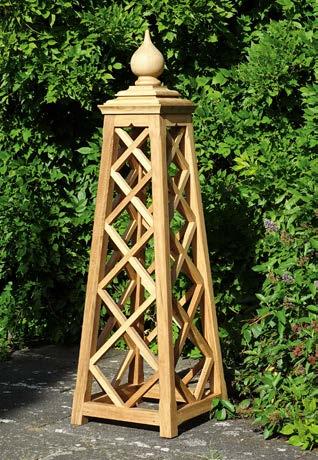

Crowning Glory
The Coronation Obelisk from Agriframes is a limited-edition design to celebrate the Coronation of King Charles III. Finished in heritage gold, it’s 130cm tall. £170, agriframes.co.uk
Weathered Charm Muntons’ rusted-finish Cotswold Obelisk looks good singly or in multiples marching through the border. Available in medium at 2m or tall at 2.5m. From £445, muntons.net
Timeless Tradition
The TT Obelisk from Oxford Planters comes in oak, iroko or coated Accoya. It stands at 2m tall, or can be made to bespoke sizes. £POA. oxfordplanters.co.uk
Steely Stuff
Endorsed by the RHS, the Southwold Grand Pyramid Steel Obelisk from Harrod Horticultural has an aged patina that blends into the garden. £475, harrodhorticultural.com

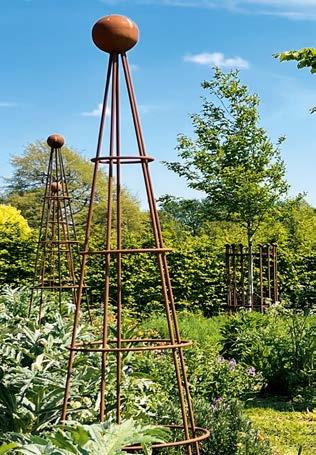
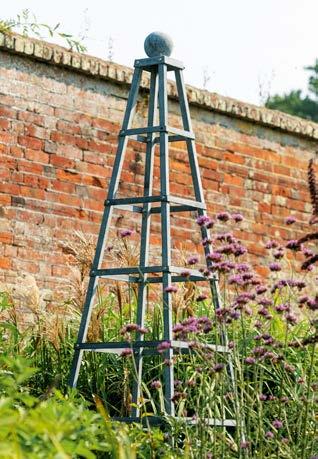
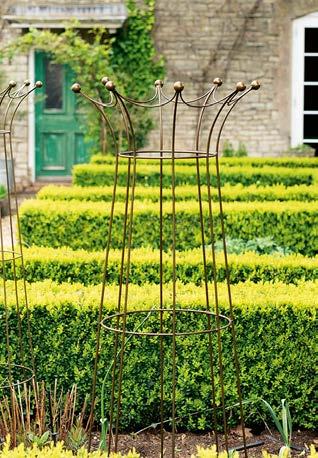
Thoroughly Modern
Simple and contemporary in style, the hardwood New Obelisk from Stuart Garden Architecture comes in three sizes. From £595 to £995, stuartgarden.com
JULY 2023 THE ENGLISH GARDEN 115
IMAGES GAP/MATT ANKER; GARDEN EXPOSURES/ANDREA JONES
Gather inspiration, advice and plants from Beth’s garden to yours




3acresofinspiringgardensincluding; turflabyrinth,waterwallsandour moongateshowcasedonTV byAlanTitchmarsh.





Explorechildrenstrailseachschool holiday.


Hartlebury,WorcestershireDY104HD 01299250720




Whitlenge.co.uk
WWW.BETHCHATTO.CO.UK

Whitlenge
whitlenge_tearoom_gardens







116 THE ENGLISH GARDEN JULY 2023
PRETTY & PRODUCTIVE

With attention to just a few key principles and inspiration from some of the country’s finest kitchen gardens, you can create a vegetable plot that’s every bit as beautiful as it is abundant








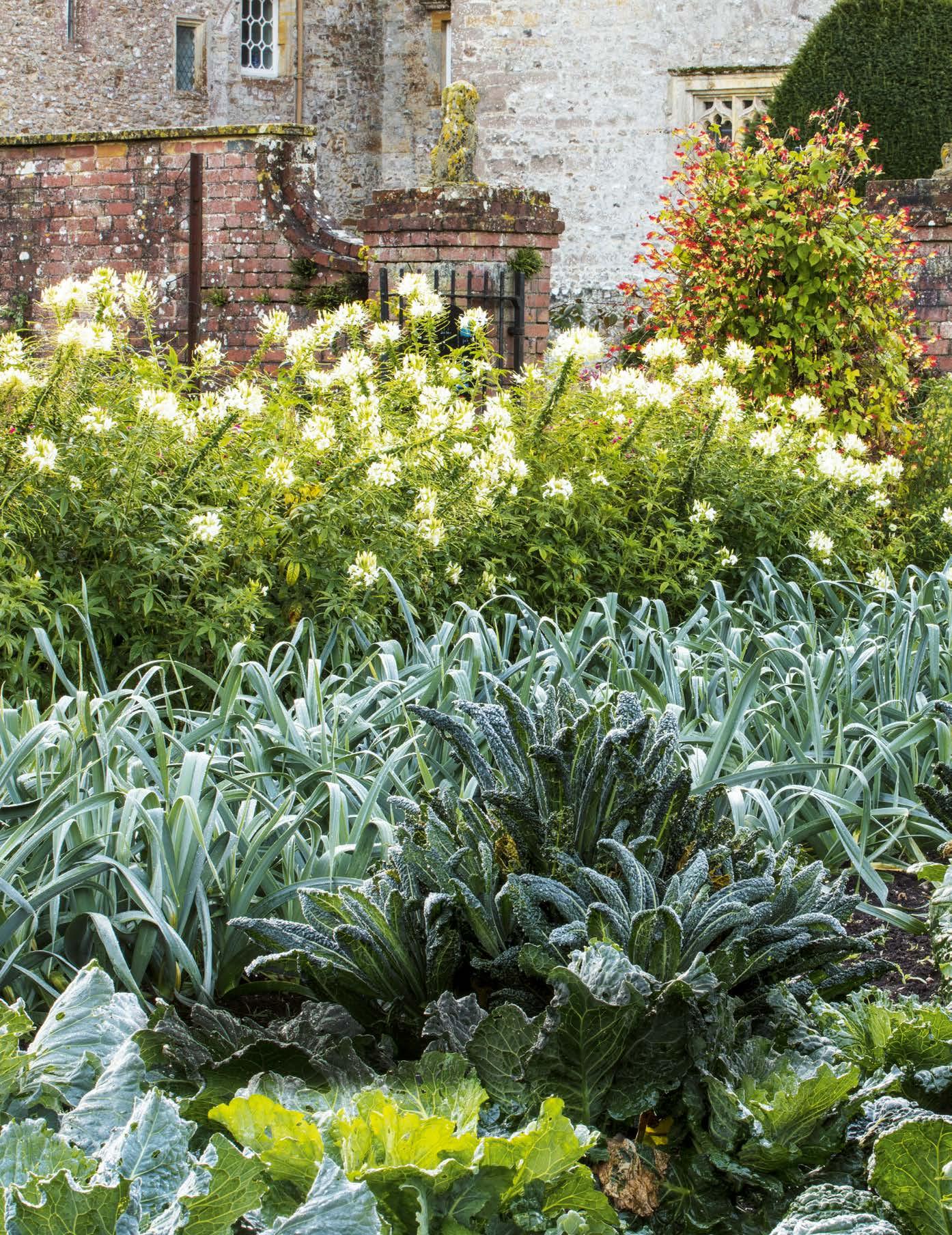
JULY 2023 THE ENGLISH GARDEN 117
WORDS VIVIENNE HAMBLY PHOTOGRAPHS CLIVE NICHOLS
At Forde Abbey in Somerset, rows of glaucous leeks, cabbages and sprouts, nestle in front of a row of cleome for cutting.
If just one vegetable were chosen to symbolise the output of the kitchen garden, it would surely be the enormous, ribbed, deep orange ‘Rouge Vif D’etampes’, known in some quarters as the Cinderella pumpkin. Where kitchen gardens exist at all, they often play second fiddle to more obviously decorative and even haughty ornamental gardens, but given a chance, these valuable spaces can be every bit as beautiful and deserving of appreciation.
Creating a good working kitchen garden requires, however, a special attentiveness. Most vegetables we grow are annuals and so must be sown and planted each year; each has its own set of idiosyncrasies that must be learnt; and for a constant supply of vegetables all year round, year in and year out, you’ll need to become adept at succession planting. But don’t let that put you o creating your own private Villandry or Versailles. Thinking creatively about layout, paths, borders, focal points and planting will elevate a vegetable patch from an afterthought to a prized area.
LAYOUT
As with any productive space, good layout in a kitchen garden is vital. Base it on your






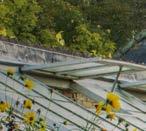

Above Design your productive garden to meet your own needs: cut flowers, including dahlias, are a priority at Forde Abbey. Below Boundary features, such as this ornate gate at Eythrope Walled Garden, can elevate hard-working gardens to another level.


taste as well as what you can manage given other commitments you might have. It’s better to have small successes than grand but unmet intentions. A simple vegetable garden might have four rectangular beds, a border of lavender or flowers for cutting in a perimeter bed, with a focal point at the intersection of the horizontal and vertical axes. But that need not be the be-all and end-all. Medieval kitchen gardens were designed around configurations of squares, triangles, diamonds, and circles within squares, so draw up a scale plan and have fun sketching a layout that appeals to your creative instincts and practical needs.
Try to position beds running east to west, so they receive sun all day. The ideal width for a bed is around 1.2m, which is just wide enough to reach across; don’t make the beds too long or they will be di cult to cross. Paths should be around 60cm, or perhaps a measure of two of your feet if you prefer not to use a rule. Any narrower than this and a path will be di cult to work, wheel a barrow along – or mow, if you have grass. Beds themselves can be raised, but it is often simpler to keep them on the ground. Slugs and snails tend to lie in wait in the soil adjacent to the wood of raised beds.
118 THE ENGLISH GARDEN JULY 2023
KITCHEN GARDENS
PATHS
The negative space o ered by paths helps highlight the beauty of the beds in between. As well as providing a route from A to B, they can also lead the eye to a focal point, encourage exploration and even foster biodiversity and improve soil.
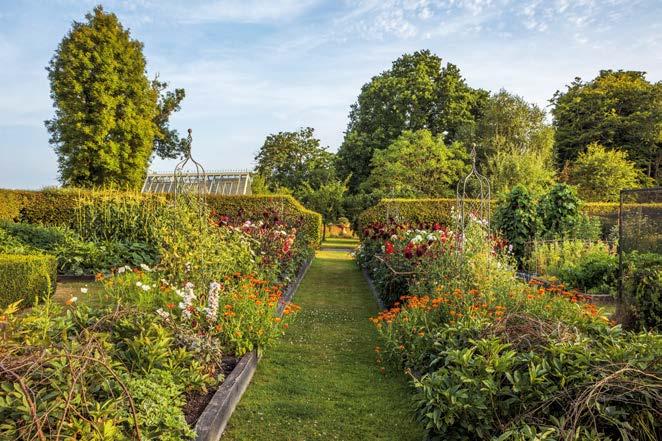
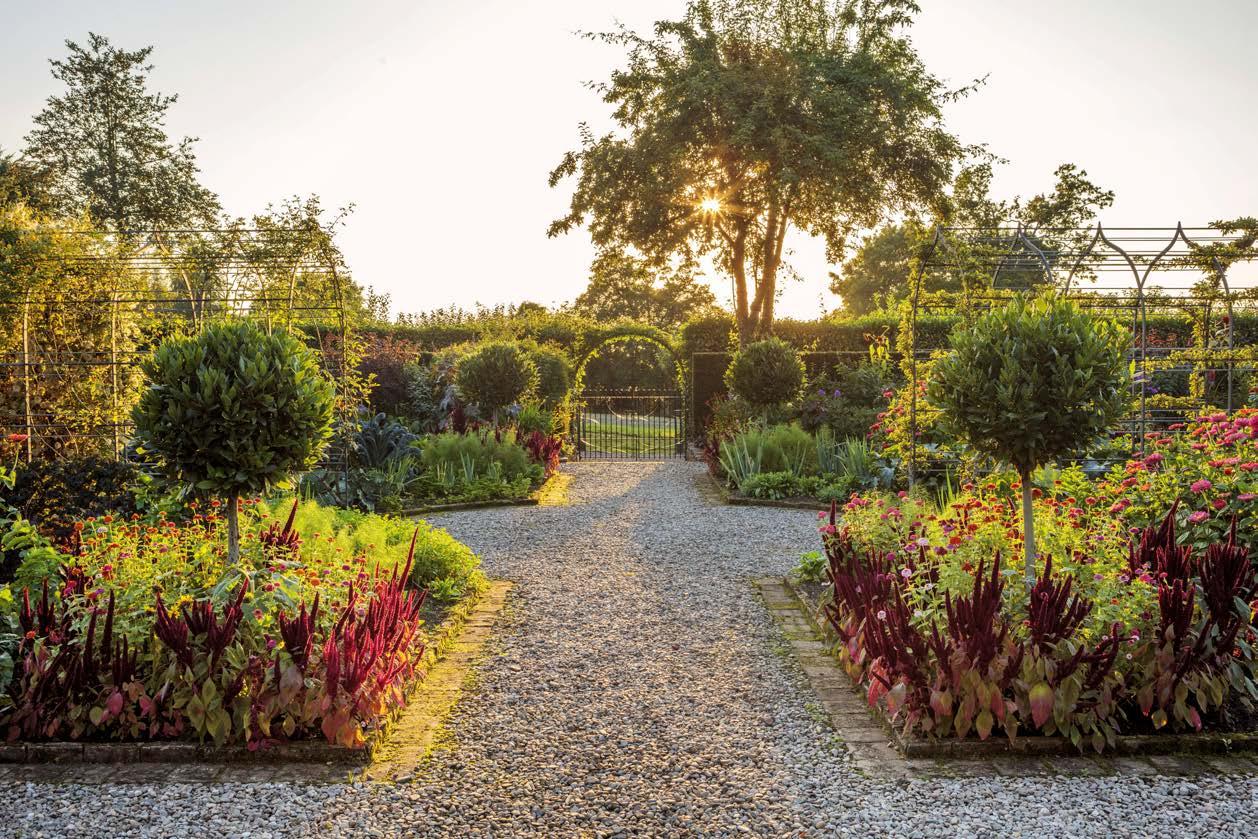
Paths can have hard or soft surfaces. Lawn is a common choice but although it’s pleasing to walk on and look at, it needs regular cutting, which can be labour intensive. Less intensive is a path of nitrogenfixing white clover (Trifolium repens). White clover doesn’t grow as tall as grass and if you don’t want the flowers, these can be trimmed o . The flowers are beloved of bees, however, which will prove helpful in pollinating your vegetable crops.
Hard paths, be they woodchip, gravel or brick, tend to be laid over a layer of weed-suppressing membrane to preserve their integrity. Woodchip can often be sourced free of charge from tree surgeons. It will last a few years and once it’s broken down it can be added to the compost heap or directly to beds. Work on a depth of 5-7cm and be aware that it will need some weeding now and then. Gravel, laid to about 4cm, needs to be contained so it stays where it’s meant to be, so think about how you will edge your beds. Old sca old boards are excellent for this, but for something more decorative, suppliers such as Harrod Horticultural (harrodhorticultural.com) and The Worm That Turned (worm.co.uk) o er a good range. EverEdge (everedge.co.uk), a slimline metal edging, is enduring, if more costly up front.
Bricks are a labour-intensive paving material to lay, but a brick path is also one of the prettiest, with an array of patterns to choose from. For a rustic look where odd shapes don’t matter, use reclaimed bricks that builders might be glad to be rid of. Otherwise, look to matching the brick to the colour of your home to keep things cohesive. York Handmade Brick (yorkhandmade.co.uk) supplies a range of brick pavers, square pavers and cobbles that immediately look settled in once laid.
JULY 2023 THE ENGLISH GARDEN 119
Top At Morton Hall, gravel paths are laid within a brick edging to prevent the gravel spilling into the beds. Above For an all-green vegetable garden, opt for lawn paths as here at Highlands in Sussex. Keep paths wide enough to mow comfortably.
Paths can lead the eye to a focal point, encourage exploration and foster biodiversity
BOUNDARIES
We might not all have the sheltering, heat-retaining perimeter of a walled garden to work with, but there are many alternatives. For a very simple border, opt for a hedge of the dwarf lavender ‘Hidcote’, perhaps punctuated by rosemary, clipped somewhat to keep it in shape. It’s attractive, low-maintenance and will bring pollinators to the garden. If you’re more ambitious and see this as a long-term project, consider training fruit into espaliers or step-overs.
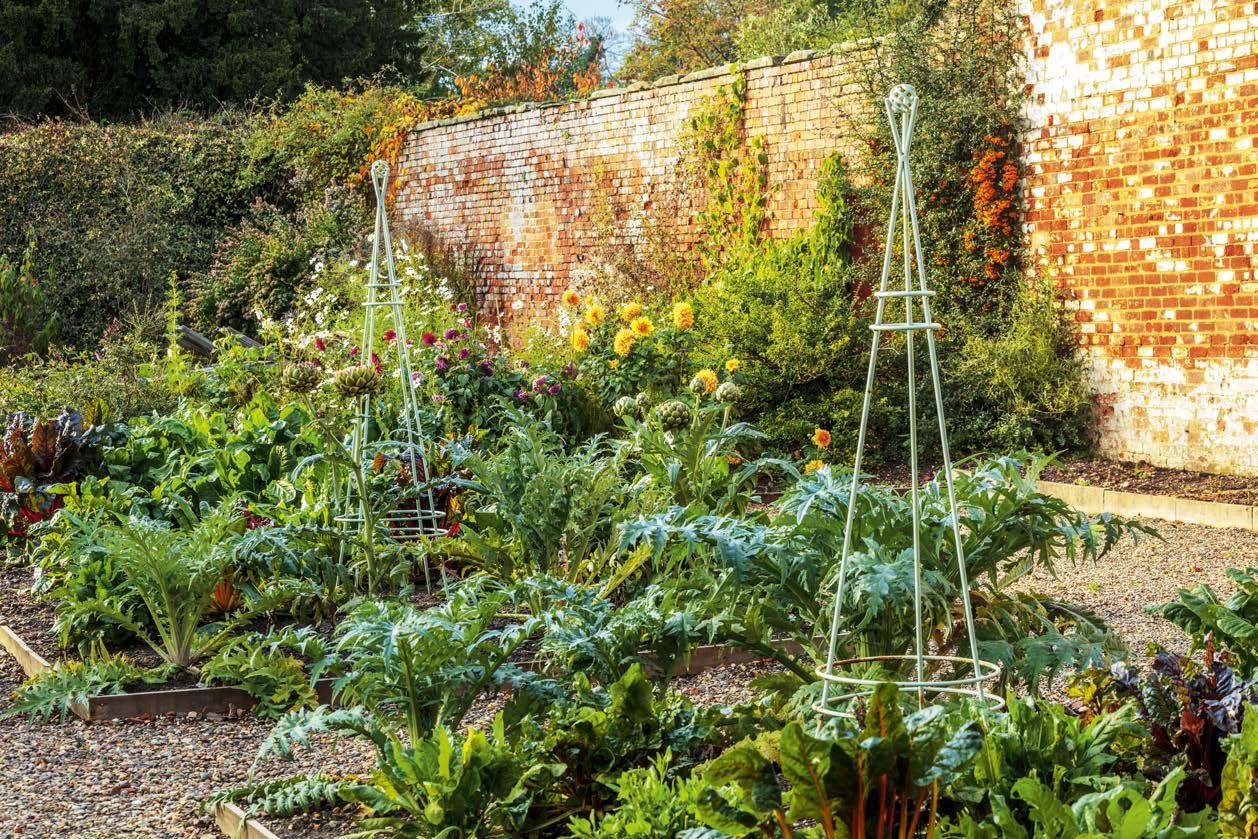
The whips of some of the more sophisticated berry crosses, such as thornless loganberries, tayberries and blackberries, can also be trained into seasonal hedges. Install strong vertical supports with tension wire between them, then tie in each new branch to the wire. Chris Bowers (chrisbowers.co.uk)and Keepers Nursery (keepers-nursery. co.uk) can supply. Alternatively, try roses: for terrific hips in autumn, include a Rosa rugosa variety such as ‘Hansa’ or ‘Rubra’. Or consider a wildlife-friendly hedgerow mix of blackthorn, hawthorn and hazel, which will provide both habitat and food for birds and insects.
Willow hurdles and hedges are a sustainable and attractive choice. Try Jay Davey, a much sought-after willow weaver ( jaydavey.co.uk).
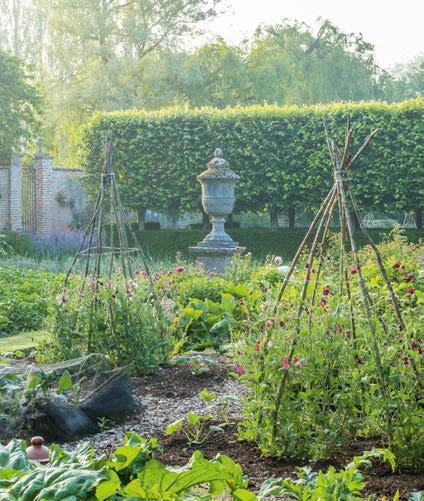

Above At Spetchley Park in Worcestershire, surrounding walls are pressed into service: train apricots in fans or add a wisteria.
Below At Ven House in Somerset, an urn makes a classic focal point, but a rustic scarecrow can add wit to the garden.
FOCAL POINTS
You might wonder if a focal point is needed in a vegetable garden, but it has the same anchoring function here as in other spaces. A statue of Diana among the lettuces might seem incongruous, but a table, willow scarecrow or a verdigris copper could look good, as well as serving a functional purpose.
Try echoing the traditional dipping pool of a walled garden with a water feature or small pond of your own. The right planter, perhaps elevated, could contain edible flowers such as calendula and violas; larger containers might provide the perfect home for carrots if you need to keep them beyond the reach of carrot fly. Sculptural and dramatic artichokes will also make a fi ne centre point and because they are deep-rooted perennials, you can leave them in place for many years.
Obelisks of quick climbers also work well: try runner beans, sweet peas or Spanish flag (Ipomoea lobata). Violet Grey (violetgrey.co.uk) and Lorfords Antiques (lorfordsantiques.com) sell vintage obelisks, but do rummage through car boot and brocante sales such as those regularly held by The Country Brocante (thecountrybrocante.co.uk). For new models, try A Place in the Garden (aplaceinthegarden.co.uk), Whichford Pottery (whichfordpottery.com) or Italian Terrace (italianterrace.co.uk).
120 THE ENGLISH GARDEN JULY 2023
KITCHEN GARDENS
SUPPORTS
Virtually all gardens benefit from height and the use of the invisible vertical axis. Vegetable gardens are no exception, and if you grow climbing beans, peas or squash, some kind of support is essential. Bamboo canes are widely available, but for rustic appeal look for hazel rods from a local coppice or grow your own for a ready supply: one or two plants should be su cient. Freshly cut hazel and willow are both pliable enough to bend into shape. A hazel tunnel, clothed in a mix of climbing beans or trailing squash can make a delightful summer feature.
Above At Rockcli e in the Cotswolds, a variety of elements work together to make the kitchen garden a pleasurable and beautiful place to work. Right Freshly cut hazel rods are supple; bend them to make a tunnel for annual climbers as here at Whatley Manor.
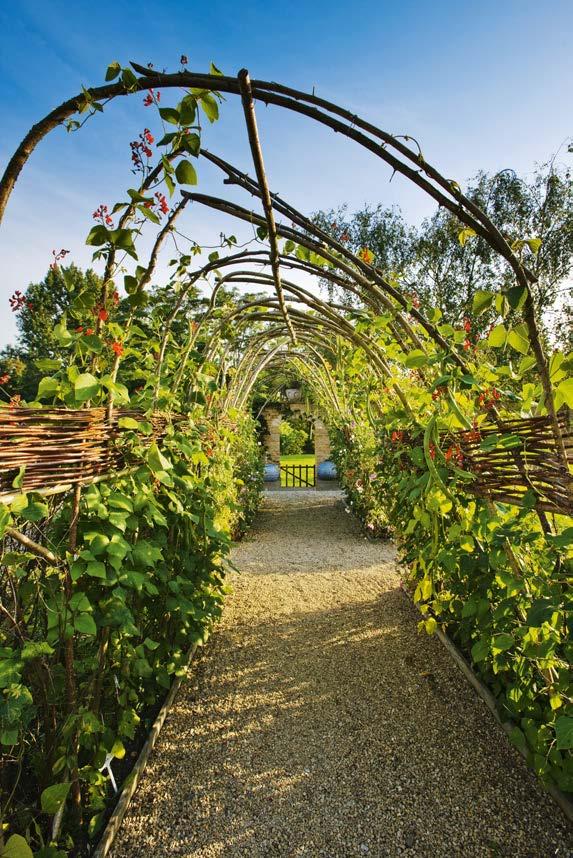
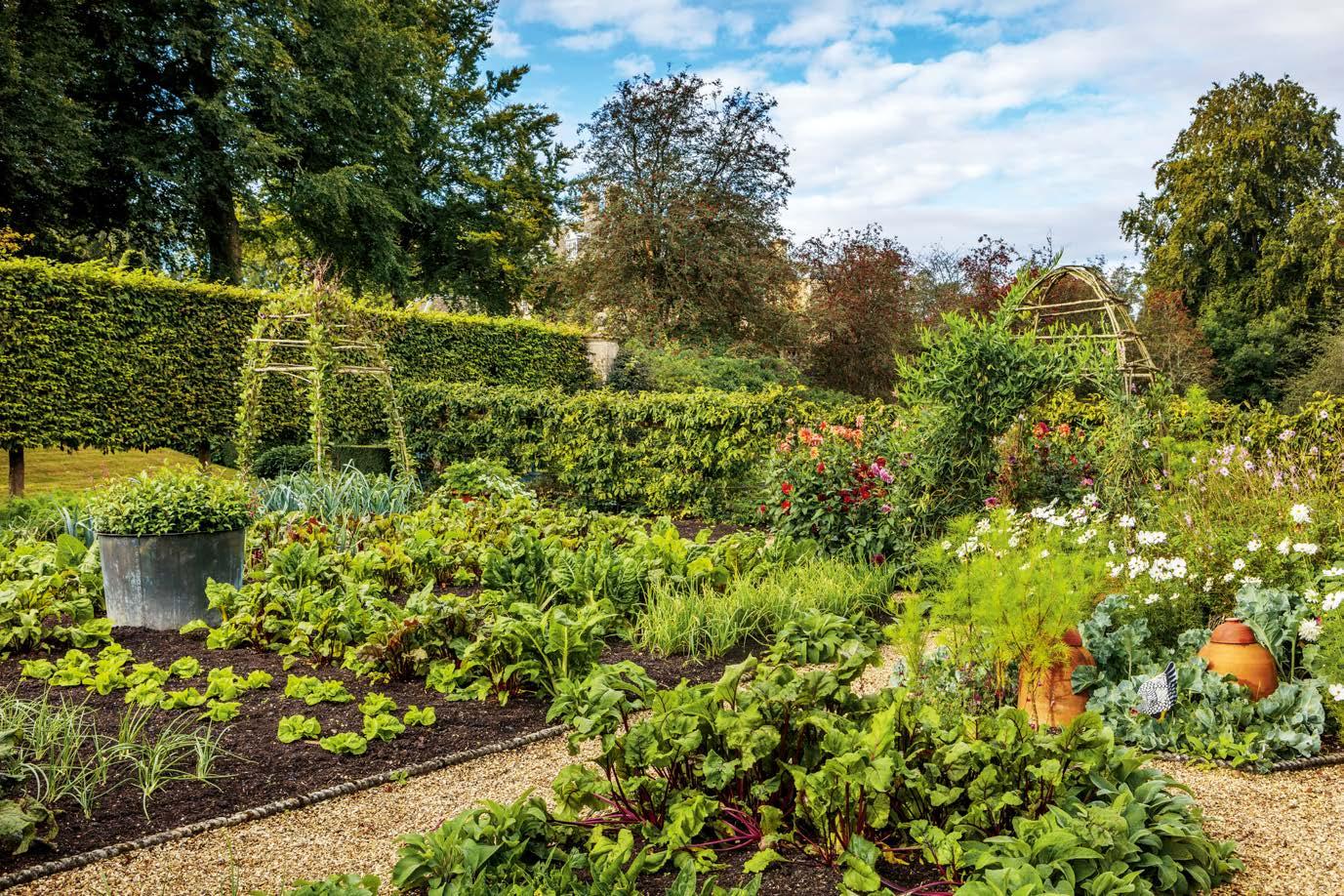
Consider using a wildlife-friendly hedgerow mix of blackthorn, hawthorn and hazel
Unlike beans, which wrap tightly around any upright they come upon, peas and sweet peas need additional material to grip as they climb. Pea sticks are the twiggy ends of hazel branches and if you can’t grow your own, you can buy them online. Otherwise seek out jute netting to drape over a frame. For metal supports, look to Sarah Raven (sarahraven.com), Agriframes (agriframes.co.uk) or Harrod Horticultural (harrodhorticultural.com) as well as larger DIY outlets.
JULY 2023 THE ENGLISH GARDEN 121
Above A jumble of colourful vegetables and flowers brings a joyful light-heartedness to the garden at Morton Hall. Left Bright zinnias are quick and easy to grow. There’s still just enough time to sow them now for late-summer flowers.

PLANTING & FLOWERS
Smart serried ranks of vegetables might be the obvious planting scheme that comes to mind for a kitchen garden, but your beds needn’t be like that if you prefer something more decorative. Here is your chance to experiment with colour, form and function, just as you might in an ornamental garden. Edge beds with decorative edibles such as curly leaf parsley or chives that bloom in early spring. Grow flowers for cutting against a dramatic darker foil
of brassicas like cavolo nero, or sow lettuces and radishes in diamonds and circles.
Growing a diversity of plants in a matrix, instead of keeping them in blocks of the same, has been shown to reduce pests, simply because the food source of choice is harder to access. Growing sacrificial plants like nasturtiums can also draw, blackfly away from beans, for example. You may however, still need to protect crops. Builders’ debris netting is a cost-e ective alternative to regular plant netting and is usually fi ne enough to keep out most small insects. Try Enviromesh to prevent carrot fly, or source inexpensive net curtains online and stitch them to size. A white sheet can also do the job.
Vegetable gardening is the most egalitarian form of gardening: a Savoy cabbage, heavy in knobbled leaf, is as beautiful and as delicious growing in a modest vegetable patch as it is in a potager. And with a little thought, a kitchen garden can be very beautiful indeed. n

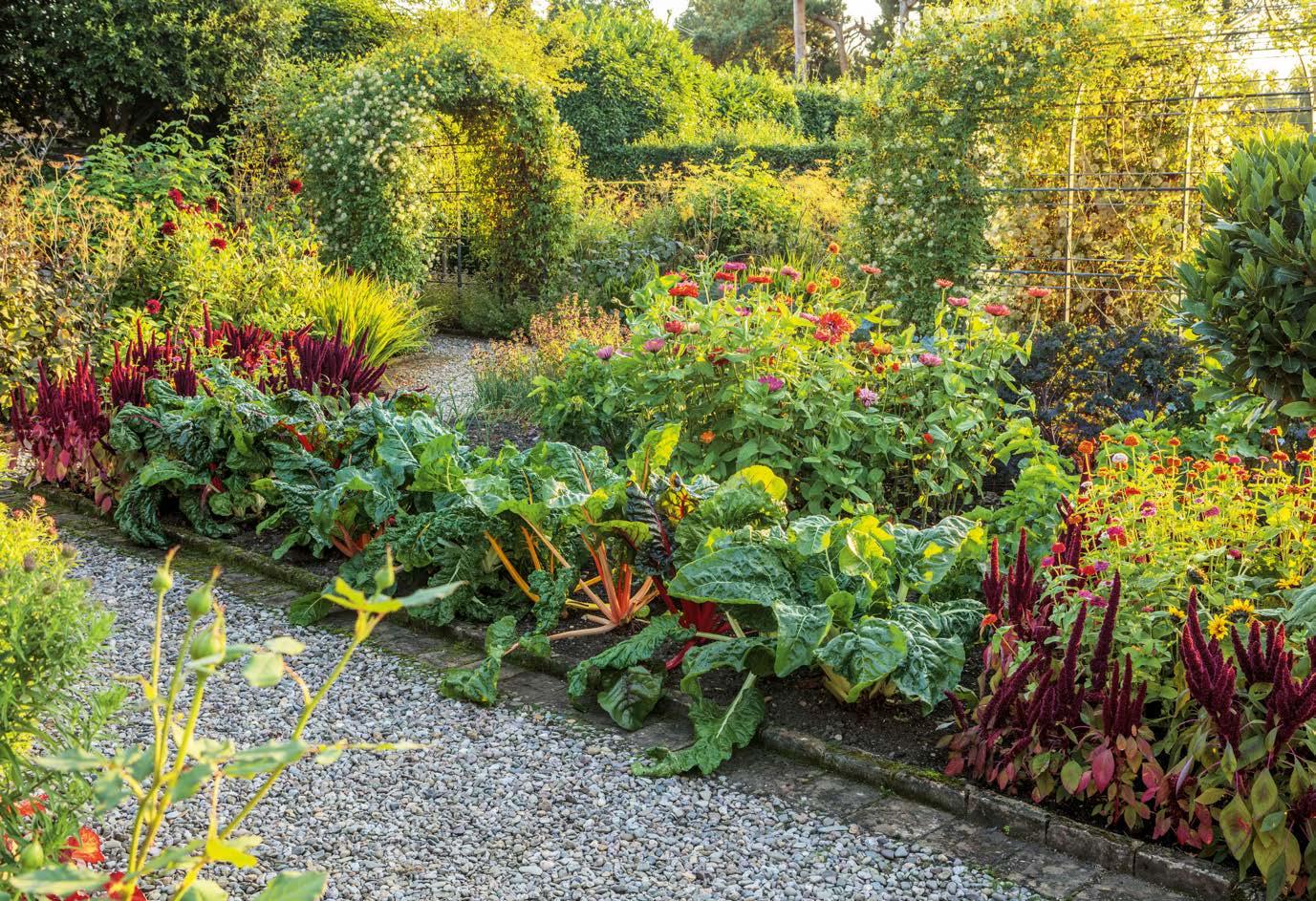
122 THE ENGLISH GARDEN JULY 2023
KITCHEN GARDENS
Growing a diversity of plants in a matrix, instead of keeping them in blocks of the same, has been shown to reduce pests
Do youhavea PondorLake?
Do youhavea PondorLake?
Isitasclearas mud? Isit murky,muddy,slimy, smelly, chokedwithalgaeor weedand achoretocleanout?if apumpareyou forevercleaningor changingthefilter?
Isitasclearas mud? Isit murky,muddy,slimy, smelly, chokedwithalgaeor weedand achoretocleanout?if apumpareyou forevercleaningor changingthefilter?
AQUAPLANCTON
AQUAPLANCTON




Couldbejustwhat you'relooking for
Couldbejustwhat you'relooking for
POND BEFORE POND AFTER
POND BEFORE POND AFTER

VOTED
Used
Thisnaturalpowderedmineralhascreatedcrystal clearwaterand removedsilt,algae, BLANKETWEED andodour forhundredsofhappy pond owners.Itcoulddothesame foryou.
Thisnaturalpowderedmineralhascreatedcrystal clearwaterand removedsilt,algae, BLANKETWEED andodour forhundredsofhappy pond owners.Itcoulddothesame foryou.

Forfreebrochureandpricelist: TELEPHONE:01298 -214003ANYTIME.
Forfreebrochureandpricelist: TELEPHONE:01298 -214003ANYTIME.
Or,sendthe approximatesurfaceareaof yourwaterto: RiverLodge,BishopsLane,Buxton,DerbyshireSK176UN



Or,sendthe approximatesurfaceareaof yourwaterto: RiverLodge,BishopsLane,Buxton,DerbyshireSK176UN www.aquaplancton.co.uk
www.aquaplancton.co.uk


JULY 2023 THE ENGLISH GARDEN 123 Sean Scully – Smaller Than The Sky Discover a major exhibition by world-renowned artist Visit the breathtaking five acre Walled Garden and explore the Hall, Sculpture Park and amazing Model Soldier Museum. 23 April – 29 October 2023 Houghton Hall and Gardens King’s Lynn, Norfolk PE31 6UE Free entry for children under 18 Open days and tickets: houghtonhall.com
HOME & GARDEN PRODUCT OF THE YEAR BY FARMING TODAY
successfully with fish all the time.
for ducks, plants, pets, troughs and all forms of water life. www.andrewkaysculpture.co.uk Free UK delivery LIFE SIZE ANIMAL SCULPTURE www.andrewkaysculpture.co.uk 07740 306412 Free UK delivery
SIZE ANIMAL SCULPTURE
Safe
LIFE
Watch these mesmerising sculptures dance in the wind, sketching ever-changing forms across the sky. Will Carr has been exploring and creating fascinating contemporary kinetic sculptures for many years, combining complex engineering and in-depth study of balance to create pieces that move silently in the lightest and strongest of winds. These sculptures enhance the spaces they inhabit; their endless ow brings viewers a peaceful connection to nature as they icker in the wind, through day and night.


Please visit his website to see the sculptures in movement www.willcarrsculpture.co.uk willcarrsculpture














TRADE SECRETS: Take a Clematis Cutting














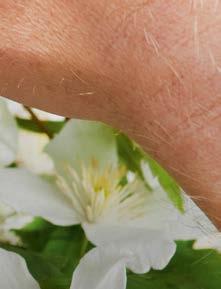



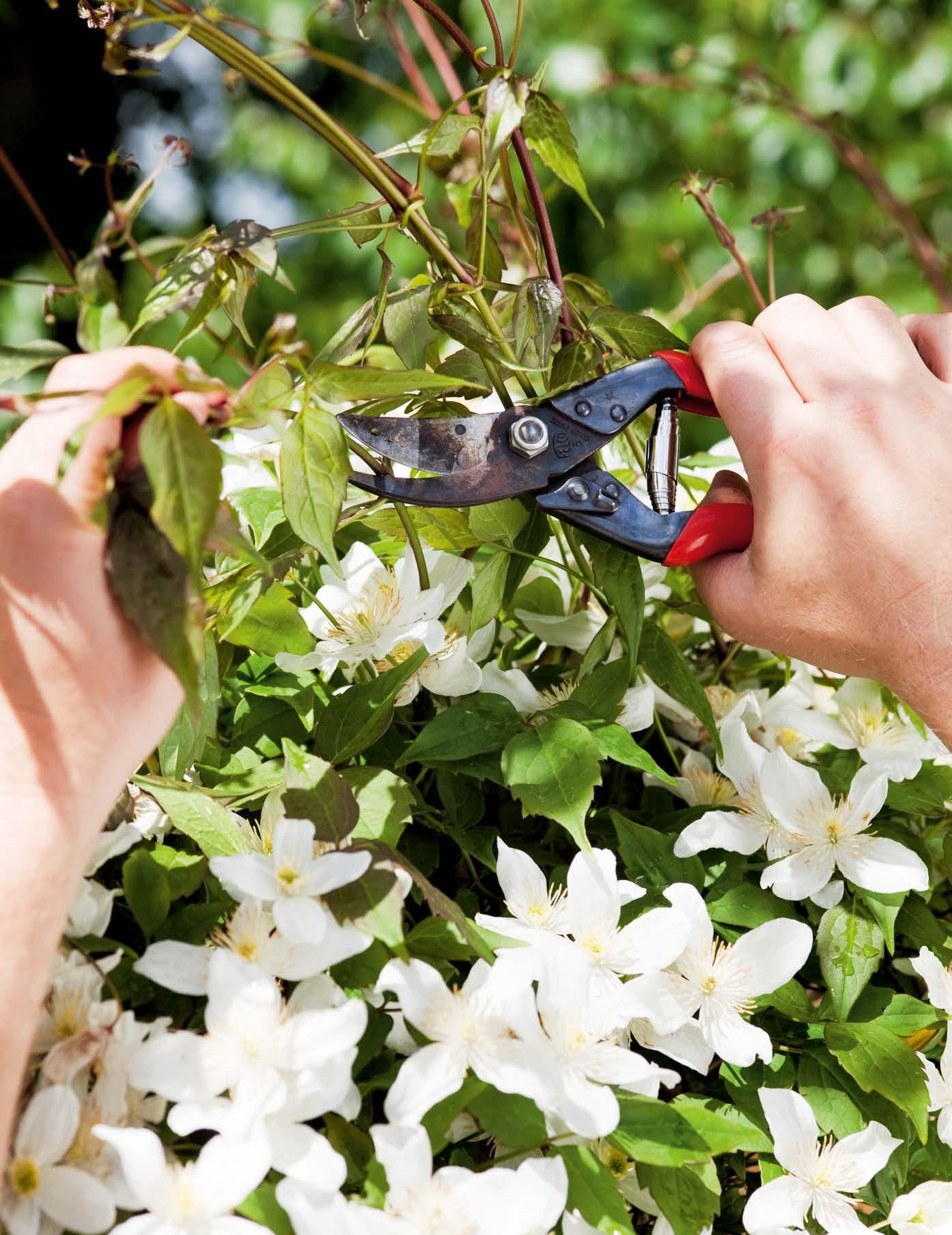
Choose from the right group and clematis can be surprisingly easy to propagate by taking internodal cuttings. Andy Jeanes of Raymond Evison Clematis explains exactly how to do it






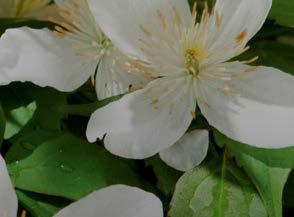

When taking internodal clematis cuttings, select active growth from the current season’s young, ripe wood.
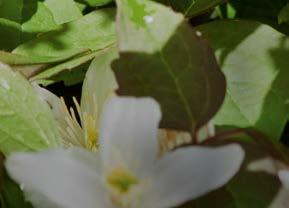
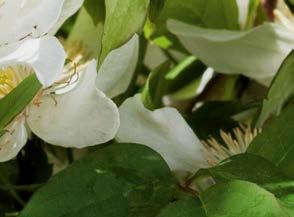
JULY 2023 THE ENGLISH GARDEN 125 WORDS VIVIENNE HAMBLY IMAGE GAP/PAUL DEBOIS
One of the most profound aspects of growing plants is the way in which they can be so easily multiplied.
Depending on the material, you can collect seed, divide, layer and take di erent types of cuttings. Internodal cuttings are the best way to propagate clematis, and if a friend has a plant you like the look of, you might ask their permission to reach for the secateurs.
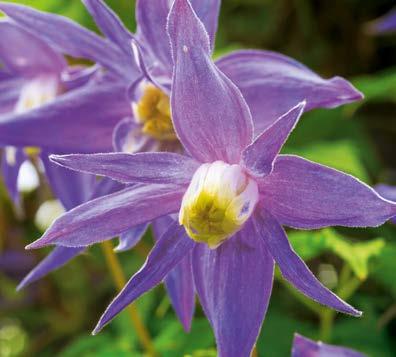
Better still, if you are serious about propagation, try a razor blade. “We find a razor blade to be superior even to a scalpel for this job because it gives an extremely clean cut,” says Andy Jeanes of Raymond Evison Clematis, the Guernsey breeder and grower, which sells around 3.5 million clematis plants a year in the UK and elsewhere. “We take a lot more cuttings than that, obviously, because there is a failure rate. So we often go through quite a lot of razor blades!” Andy quips. “The people who take cuttings day in and day out can feel the ripeness of the wood between their fingers, and they know if it’s actually good material that’s ready to be propagated or not. I can’t explain it – it’s all feel.”
Certain species of clematis are easier to propagate than others, notes Andy, and he advises beginning with vigorous Group 1 types, including Clematis montana, C. alpina and C. macropetala, all of which should root quite easily. Beyond Group 1, he suggests that you “go for old-fashioned varieties like ‘Nelly Moser’ and ‘Comtesse de Bouchaud’”.
You can take clematis cuttings throughout the growing season, but make sure you’re taking cuttings of active growth from younger wood. “Don’t go for old wood: you want this season’s growth,” Andy advises. The cutting season at Raymond Evison ends in around October, but at home, without the sheltered conditions of a commercial operation, this could well be sooner.
The Trick
Nodes on a plant are where leaves attach to the stem and from which shoots emerge, so the internode is the section between two nodes that is responsible for the elongation of the stem. Select a section of stem that’s about 5cm long with a node at each end. Slice through the stem just above the lower node so that the node remains on the plant. Success depends on keeping the cutting alive while it directs energy into rooting, so reduce material above to the bare necessities. Of the growth above the top node of your section, remove one leaf, cut the second leaf in half and slice o any continuing stem. “And that’s a cutting,” says Andy. He recommends taking about five of them, since they probably won’t all take.

The next step, according to Andy, is to dip the bottom end of each cutting in hormone rooting powder. Place the cuttings around the edge of a 9cm pot filled with damp, free-draining soil. “Humidity
Tools and equipment
Well-drained potting medium, such as John Innes seed compost.
9cm pot
Clear polythene bag
Elastic band
Old-fashioned razor blade
Top left Clematis ‘Nelly Moser’ is an oldfashioned type that is easy to propagate.
Above right Cut above the upper node, leaving one leaf intact and removing all other upper plant material.
Above left Clematis alpina is a vigorous Group 1 species that’s an ideal candidate for internodal cuttings.
will keep the plant alive while roots develop, so put a clear polythene bag over the top like a tent and secure it with an elastic band,” he advises. Place the pot on a windowsill with plenty of light – you shouldn’t need base heat – and after around six weeks, the plant will have rooted. “Leave the plant in the pot until the roots are coming out of the bottom. Then you can harden it o and plant it,” he says. “Damping o can be a cause of failure, so once you’ve drenched your compost, inserted your cuttings and put your tent over the pot, don’t re-water or water from the base. Just leave it as it is. The humidity from the tent will be enough.”
Good to Know
The price of a commercial clematis depends on how easy it is to propagate. “If you take 1,000 cuttings from a Clematis montana, you’ll probably end up with 1,000 cuttings to grow on,” explains Andy. “But C. armandii costs £20-25 per plant because cuttings have quite a high failure rate.”
It’s also illegal to propagate a clematis with a Plant Breeder’s Rights (PBR) restriction, and all Raymond Evison clematis carry this labelling. PBR lasts for up to 25 years, so take care only to propagate varieties older than this if propagation is not for private use. n

126 THE ENGLISH GARDEN JULY 2023 TECHNIQUES
IMAGES GAP/PAUL DEBOIS; GARDEN WORLD IMAGES; SHUTTERSTOCK
Raymond Evison, The Guernsey Clematis Nursery, Braye Vineries, Route Militaire, Vale, Guernsey GY3 5RP. raymondevisonclematis.com


JULY 2023 THE ENGLISH GARDEN 127
Stunning High-Performance Water-Based Eco
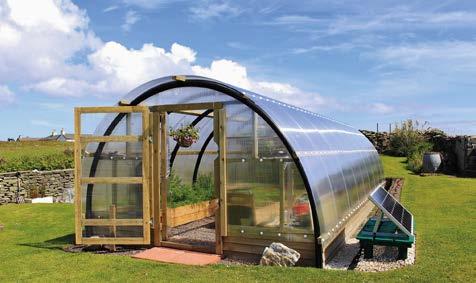
Wood Paint designed for all types of wood, inside and out, using exterior grade architectural colour pigments that stay brilliant for years. 72 colours & UV Clear plus 1800 RAL Classic & Design colours
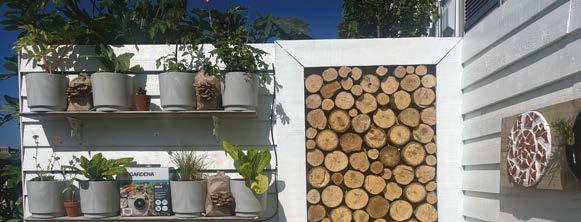

Peelable Glass Paint made with a 100% recycled plastic resin for greenhouse and conservatory shading, privacy screening, and arts & crafts in a range of 24 opaque heritage tones and 14 translucent colours including Clear. Stencil Craft Packs in Seasonal and Floral Designs
WOOD PRESERVERAND STAIN BLOCKING PRIMERIN CLEAR, WHITE, GREY & BLACK www.thorndown.co.uk T:



Readyhedge hedging plants, like the mixed native hedging shown here, are container-grown in the UK and fully acclimatised to UK conditions. With over 20 years’ experience, Readyhedge delivers hedging to rely on, wherever you are.

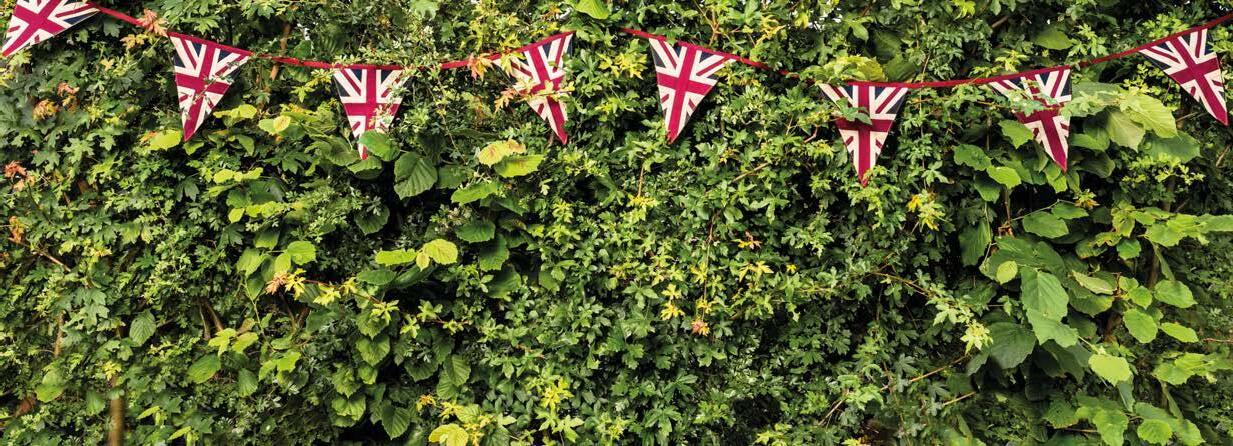
128 THE ENGLISH GARDEN JULY 2023
585
GROWN IN THE UK SINCE 2003 FROM THE HOME OF INSTANT HEDGING READYHEDGE
01386 750
info@readyhedge.com readyhedge.com
01458 258588
studio@thorndown.co.uk Glastonbury, Somerset
E:
Paints for the Home & Garden
in the UK and delivered direct to your door
Made
Thorndown Swan White Wood Paint on feather edge boarding and pergola structure at Chelsea Flower Show, designed by Lynne Lambourne for GARDENA’s EcoLine range
Pulling spent forgetme-nots from a border; it blurs the definition of a ‘weed’ with its pretty flowers and ferocious ability to self-seed.

RIGHT PLANT, WRONG PLACE
Native weeds are loved by wildlife, impressively hardy, often ravishingly pretty and have a long flowering season. There’s a case for learning to love these pioneering opportunists, while keeping them under control in the garden




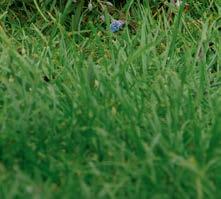
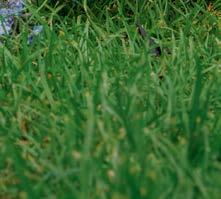
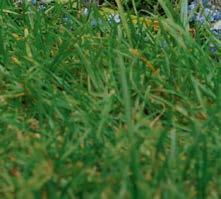



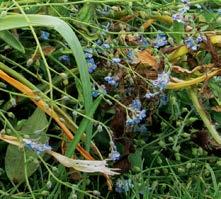
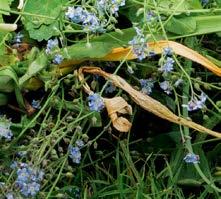
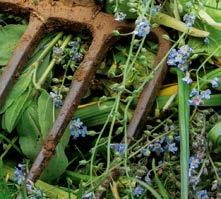
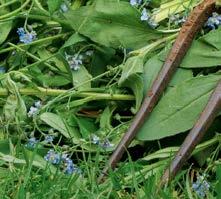
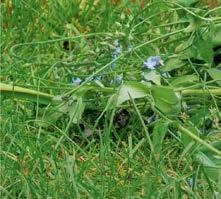
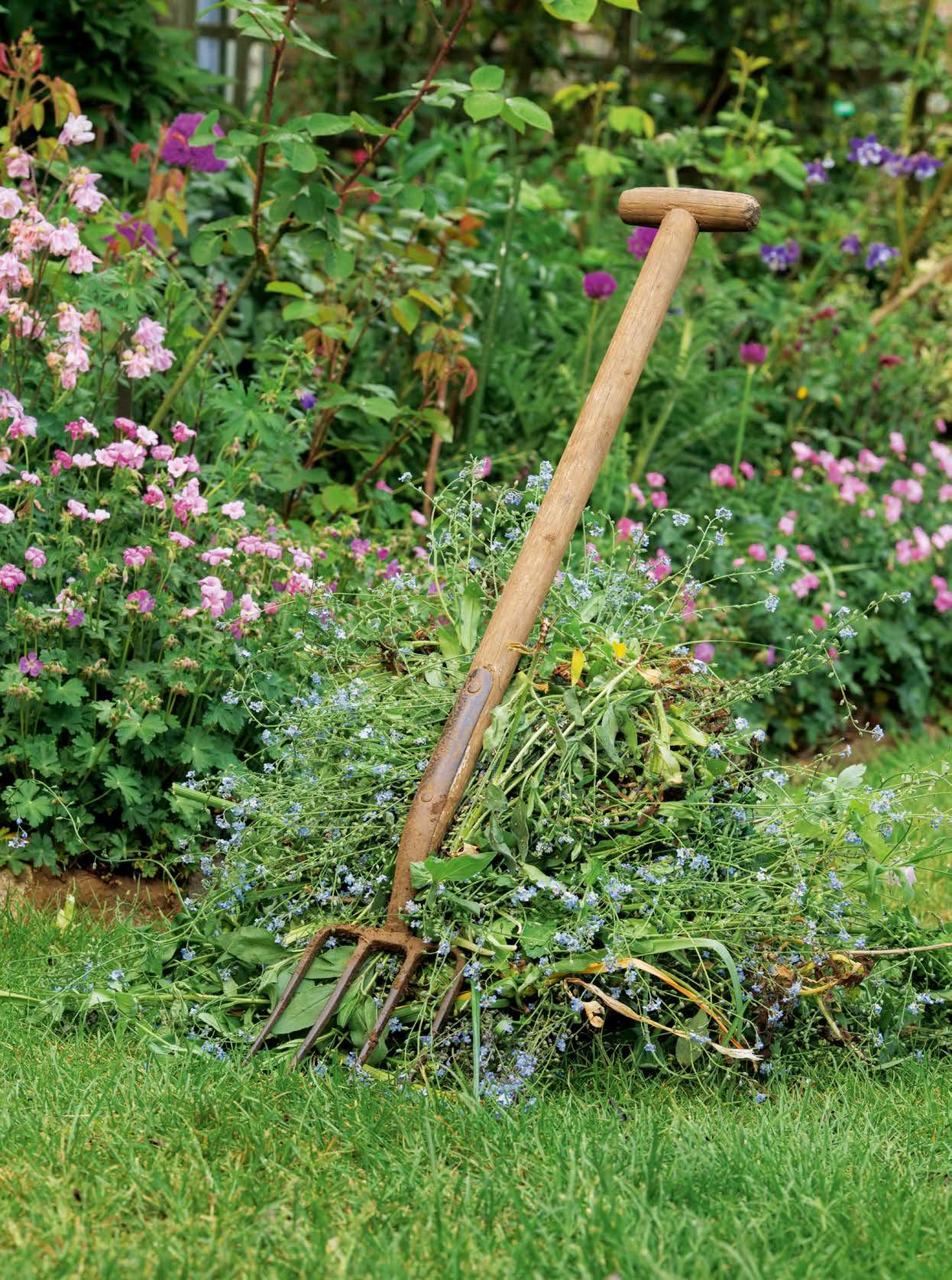
JULY 2023 THE ENGLISH GARDEN 129 WORDS VIVIENNE HAMBLY IMAGE GAP/TIM GAINEY
Below left Japanese knotweed is one of the most troublesome weeds, with strict laws governing its disposal.
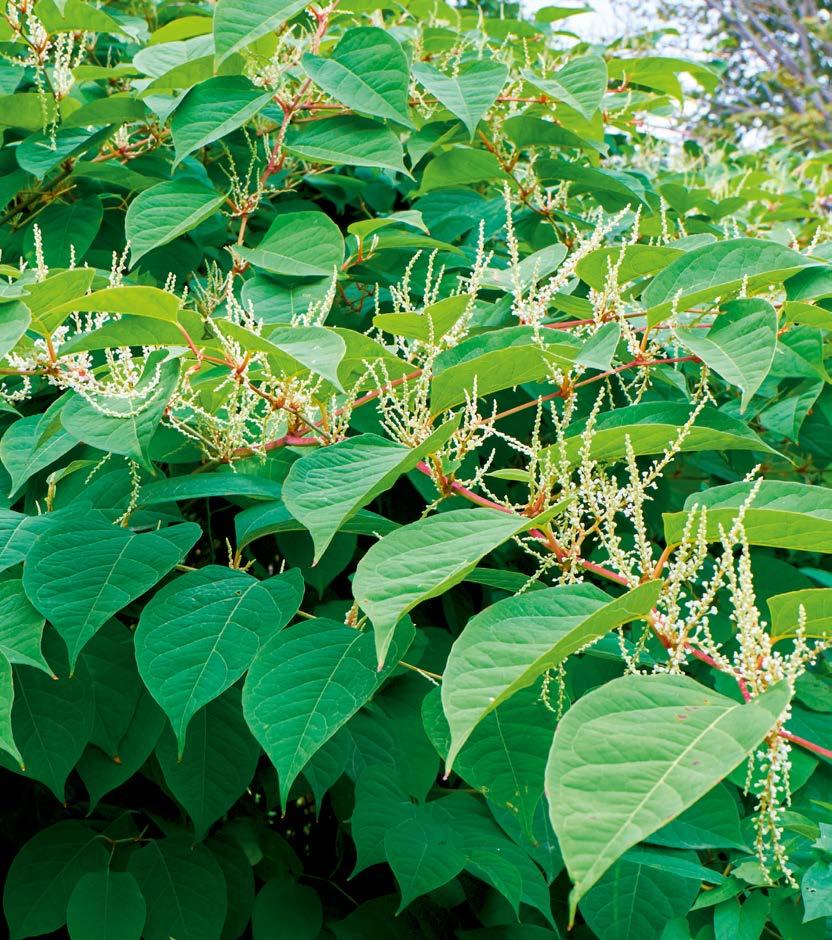
Below right A garden escapee, Himalayan balsam can quickly colonise and erode its riverbank habitat

Bottom right A butterfly feeding on herb Robert.
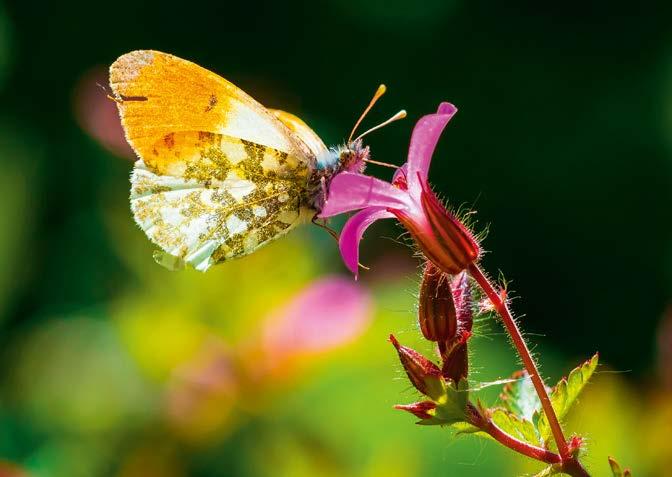
Creeping, climbing, trailing, shallowrooted or deep-reaching, annual or perennial: weeds are regularly encountered by just about anyone who gardens. Generally the first reaction is to uproot them, but something else is also true: one gardener’s weed is another gardener’s treasure. Well, almost.
“I have a kind of ‘swingometer’ of where we are on invasive plants, from Japanese knotweed at one end to wildflowers at the other,” says Jack Wallington, designer and author of Wild About Weeds: Garden Design with Rebel Plants. “But everyone’s list of weeds is completely di erent,” he adds. “Herb Robert is one of my absolute favourites. It will grow in the deepest shade and has lovely pink flowers, but for some reason it has ended up on the weed list.” Another of Jack’s favourites are ox-eye daisies, which self-seed but are also easy to pull out if they get out of hand. “Welsh poppies are a really good
one. I think of weeds as the plants we know best. They’re the ones we grow up with, like dandelion clocks: they’re really just wildflowers.”
Weed Identities
At this point, we should note the distinction between tolerable perennial and shallow-rooted annual weeds, and truly invasive plants, which are generally garden escapees, such as Himalayan balsam and Japanese knotweed. In Scotland there’s Rhododendron ponticum, once a stalwart of Victorian planting schemes, and Crocosmia x crocosmiiflora in Cornwall, where the popular garden plant swamps more delicate native species. When they were introduced, there was no inkling that any of these plants would become as troublesome as they have done. Japanese knotweed in particular must now be dealt with decisively and in accordance with law. But with our changing climate in mind, Jack notes that what might not be
130 THE ENGLISH GARDEN JULY 2023 WEEDS & WEEDING
invasive now, could easily become so in future. Even now, plants like foxgloves and poppies can quickly come to dominate a space.
Yet traditional weeds, which grow fast and seed abundantly, are generally brilliantly evolved pioneer species. They find homes in baked soil, survive in hot nooks and crannies where less robust plants falter, thrive in damp spaces, or put down long tap roots to access minerals well below ground. Richard Mabey points out in Weeds: The Story of Outlaw Plants that weeds have ‘rapid opportunist lifestyles’ and that their role is to fill empty spaces on earth. ‘An organism exists for no other reason than that it is able to, and can find an opportunity to do so,’ he writes. As pioneer species in a wild habitat, they make possible the conditions for other, less robust plants to grow; they stabilise soil and shelter other plants. In their keenness to flower and spread, they often provide food for pollinating insects at times when little else is available.
Aim for Inclusion
None of this augurs well, however, if there is a rockery, bulb plantings or a vegetable patch to keep neat and tidy. If creeping buttercup and campanula
are not on the planting list, they can quickly become incredibly frustrating to the gardener. There are several approaches to take. Mabey writes about the separation of the natural world into the ‘wild and domestic’, and, wearing his designing hat, Jack would have us take a more inclusive approach to weeds. “So many weeds have this amazing extended period of flowering, from early spring through autumn, and they often beat ornamental plants in terms of a floral display,” he notes. In Jack’s garden there are “a million dandelions, daisies, cow parsley, ox-eye daisies, purple toadflax, Welsh poppies, yarrow, red valerian, knapweed and even evening primrose, which self-seeded and has been allowed to stay”. His intention is to make his garden more biodiverse and, for him, weeds are key to that.
Top We’re conditioned to weed out dandelions, but their flowers are a valuable nectar source.

Above right Even benign foxgloves can self-seed at a weed-like rate
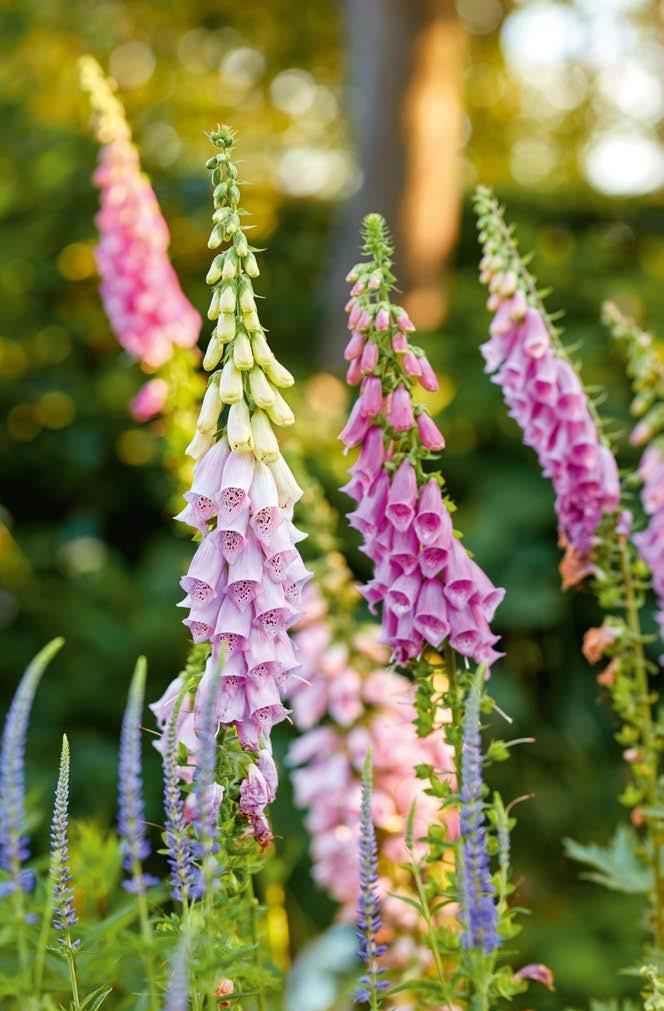
Above left Ox-eye daisies straddle the line between weed and wildflower, but are one of Jack Wallington’s favourite plants.
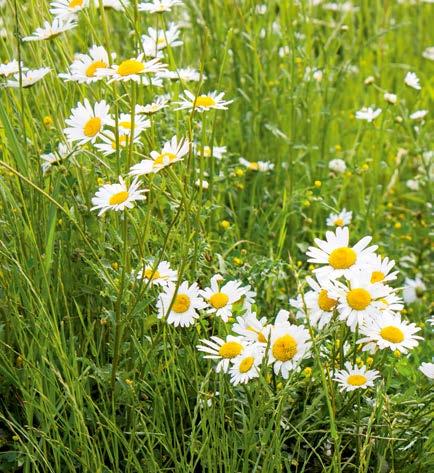
JULY 2023 THE ENGLISH GARDEN 131
IMAGES SHUTTERSTOCK; GAP/CAROLE DRAKE
Designer Tom Massey, who used weeds in his silver-gilt winning design for the Royal Entomological Society at the RHS Chelsea Flower Show, agrees. “My own garden looks like the show garden,” he says. “We can try to control our spaces, but we’ll never win. So we might as well put in less e ort, expend less energy and use fewer pesticides and herbicides to let nature to take its course.”
Weed Management
If all this feels a little too relaxed for comfort, Jack suggests learning the life cycle of the most abundant plants and acting when they’re at their weakest. Deadhead dandelions before they set seed and learn what willowherb looks like at seedling stage when it can be easily removed. It also helps to learn what weeds indicate about soil conditions and to amend that so it is less favourable. Creeping buttercups, cowslips, and annual meadow grass thrive in heavy clay soil; nettles, brambles and rosebay willowherb grow in dry soil; black bindweed, foxgloves and cinquefoil often indicate acidic soil; while damp soil hosts dock, marsh marigolds and stinging nettle. One of the simplest ways to keep out weeds is to grow groundcovers and robust, low-growing
Right The sight of vigorous, strangling bindweed can strike fear into the heart of the most relaxed gardener. Below View white clover as a nectar-rich lawn alternative rather than a lawn weed
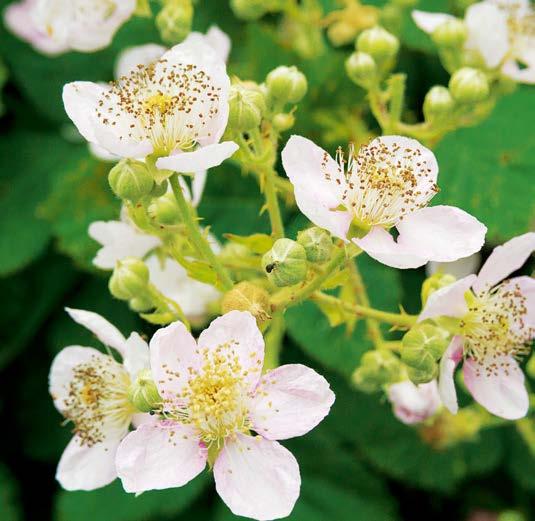
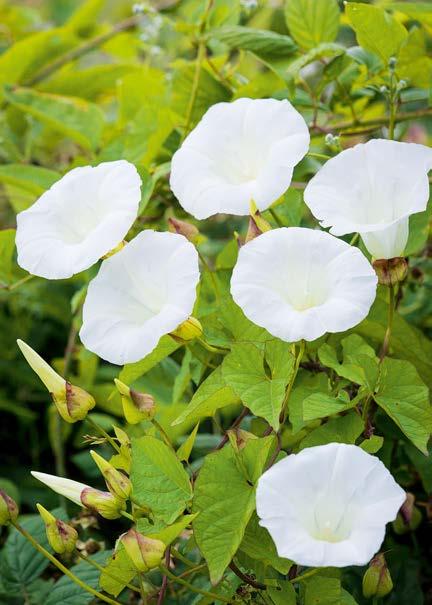
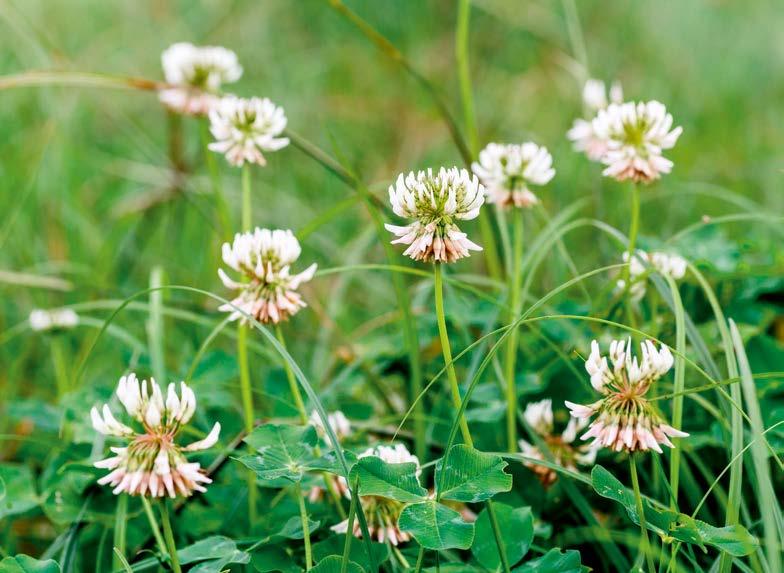
Bottom right Brambles can be very invasive, spreading both by seed and by layering. Bottom left Learn to identify weed seedlings, such as willowherb, to weed them out earlier.

132 THE ENGLISH GARDEN JULY 2023 WEEDS & WEEDING
plants over bare soil. Jettison the traditional barestemmed rose garden for something more diverse – an underplanting of lavender ‘Hidcote’ or Nepeta racemosa ‘Walker’s Low’ will easily crowd out all but the most persistent of weeds. White clover is dense enough to stop other plants from creeping in and is ideal on paths that don’t receive much footfall. Clover also makes nitrogen available to other plants and its flowers are a valuable food source for bees.
Where a groundcover is unsuitable, apply a thick mulch. This will help hold moisture in the soil and preserve soil quality, while excluding light will stop weed seeds germinating. This is the easiest way to keep soil around growing bulbs clear – hoe and water before applying the mulch and the worst of the weeds should be taken care of. All manner of materials are suitable: fine woodchip on paths or horse manure under roses. For ericaceous plants, use pine needles. In vegetable gardens, spent mushroom compost is ideal. General compost, too, can work, but it’s best if its anaerobic temperature has climbed high enough to ‘cook’ residual weed seeds and roots. Most important of all though is attentiveness. Light hoeing, little and often, even when there are
Above Weeding by hand is time-consuming but worth doing around edible crops that might be damaged by a hoe Right Young leaves of stinging nettles can be eaten, and the plants are a food source for many butterfly caterpillars, so it’s worth leaving a patch if you have space.

no weeds to be seen will mean that they will seldom ever be seen. Hoeing will disturb tiny, emerging seedlings, and picking o the new shoots of robust plants like bindweed will slowly weaken them.
But perhaps Richard Mabey has the correct philosophical approach we might all be wise to adopt in our acceptance of these highly evolved if uninvited party guests: ‘Weeds are the boundary breakers, the stateless minority who remind us that life is not tidy.’ n

JULY 2023 THE ENGLISH GARDEN 133
IMAGES GAP/JONATHAN BUCKLEY/MARTIN HUGHES-JONES; GARDEN WORLD IMAGES; SHUTTERSTOCK
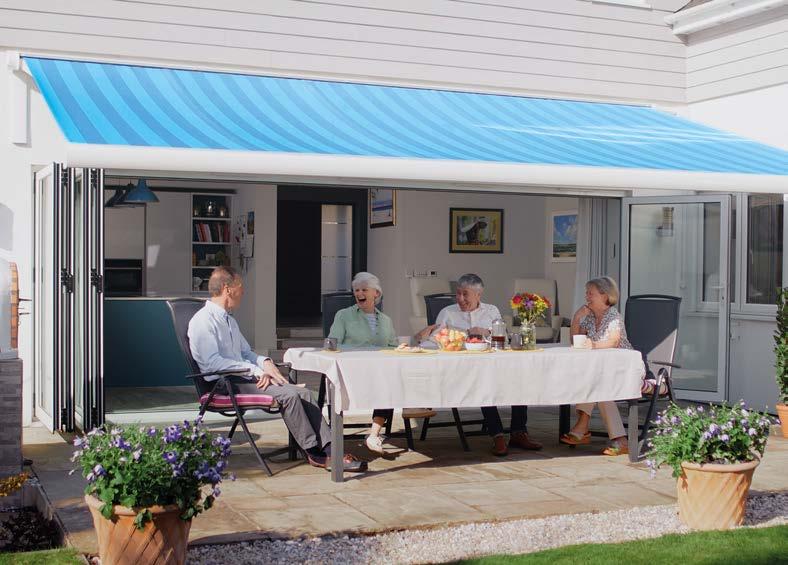











134 THE ENGLISH GARDEN JULY 2023 *Credit is subject to status and affordability. Representative Example: Cash price £4,500.00, 30% deposit of £1,350.00, amount of credit £3,150.00, annual rate of interest 0% p.a fixed, 0% APR Representative, 24 monthly repayments of £131.25, total amount payable £4,500.00 (including deposit). 24 MONTHS INTEREST FREE CREDIT AVAILABLE* SIT BACK, RELAX AND ENJOY THE ULTIMATE OUTDOOR SPACE WITH A BESPOKE SUN & RAIN AWNING SEEOUR RANGEEXTENSIVE ONLINE IMPROVING HOMES FOR OVER 30 YEARS UP TO 25%OFF Custom made to suit your property Built to the highest quality Wide range of styles and finishes Huge choice of colours FREE design consultation Full installation service 5 Year Guarantee on all products Over 50,000 satisfied customers Range of finance options available FCA approved Classic Verandas N Call us today on 0800 825 0482 For a FREE brochure or no obligation design consultation or visit us online at www.nationwideltd.co.uk AS SEEN ON TV Q4 advert 2023.pdf 1 01/06/2023 16:24
Find the Nation’s Favourite Gardens
Thousands of gardens across the country, large and small, of every shape and variety, open their gates each year for the National Garden Scheme to help raise funds for the nursing and health charities the Scheme supports. We want to know which of those gardens you most love to visit so we can share the stories of your favourites and reward the hard work of their talented and creative owners.
Nominate any garden that opens for the Scheme this year, whether you’re its owner or an admiring visitor. Once nominations have closed in mid July, our judges will select a shortlist of gardens for each of the six National Garden Scheme regions: Wales and the Marches; North; Midlands; East; South East; and South West. Then we’ll ask you to vote on the shortlist to produce the winners – one for each region and one overall ‘champion’ with the most votes, as well as one winner from those gardens that are usually open to the public but donate their takings from a particular day to the National Garden Scheme.

Find every garden that opens for the Scheme online at ngs.org.uk and listed in The Garden Visitor’s Handbook 2023, which can be ordered from ngs.org.uk/shop. Then visit our website at theenglishgarden.co.uk/ngs to vote.
How to nominate and vote
From now until 14 July, nominate your favourite National Garden Scheme garden at theenglishgarden.co.uk/ngs

A panel of judges will choose a shortlist of gardens for each of the six National Garden Scheme regions.

From 1 August to 30 September, the public will be asked to vote for their favourite shortlisted gardens to produce the winners – one for each region and one overall winner.

The winning gardens will be revealed in late autumn 2023.


JULY 2023 THE ENGLISH GARDEN 135 THE NATION’S FAVOURITE GARDENS
St Timothee in Berkshire, our overall winner from last year’s competition.
IMAGES NGS; CLIVE NICHOLS
In association with









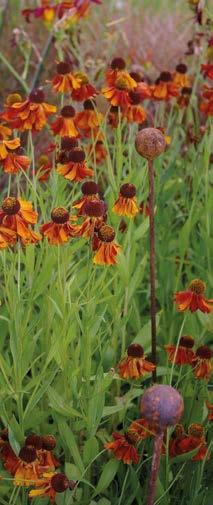
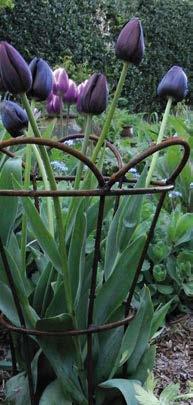





















136 THE ENGLISH GARDEN JULY 2023 Bespoke Glass Projects Helping you add style and value to your home Glass Balconies & Balustrades Composite/Millboard Decking | Feature Staircases Staircase Renovations | Bespoke Glass Projects Call our friendly office to arrange your FREE survey t: 01423 509940 / 07734 654668 w: hgwsolutions.co.uk | e: hgwsolutions@gmail.com With over 20 years experience we’re perfectly placed to design and build your dream feature staircase, custom made to fit exactly to your requirements. Scan here to visit our website Scan to see our excellent reviews. Scan here to visit our website Scan here to visit our website Scan to see our excellent reviews. Scan to see our excellent reviews PLANT SUPPORTS & Garden Artefacts Beautiful designs for perennials, roses, shrubs & climbers Made in England www.leanderplantsupports.co.uk Tel. 01773 550495 C M Y CM MY CY CMY K Leander Quarter Page Advert V1 (English Garden).pdf 1 29/01/2018 09:25 10% off on our website with code CGKG10 SUPERCHARGE YOUR SOIL C M Y CM MY CY CMY K CG 99x129mm All carrot no stick.pdf 1 26/05/2023 14:54:51
A NEW PATTERN

The design of a parterre can bring strong structure, a sense of formality or even a meditative quality. As box falls out of favour and arguments for sustainability build momentum, two very different gardens are experimenting with the concept













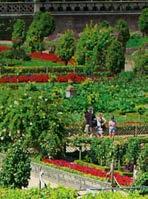
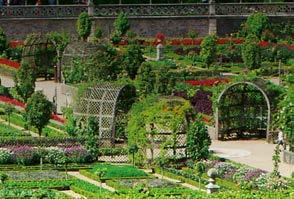
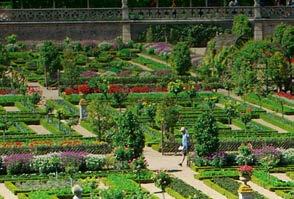

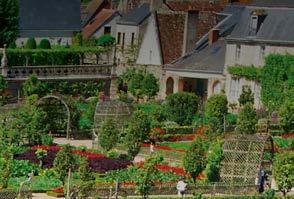

JULY 2023 THE ENGLISH GARDEN 137 IMAGE GAP/ROB WHITWORTH
WORDS CLARE FOGGETT
The elaborate and ornate parterre at Villandry in France, where the concept was honed in the 16th century.
Parterres have played a part in English gardens across the centuries. They’re a progression from the knot gardens of medieval and Elizabethan eras, and some garden historians believe they became particularly fashionable in the first half of the 17th century when Henrietta Maria, newly married to King Charles I, brought her favourite landscape designer over from France to remodel her English gardens in a more opulent French style.
Elaborate parterres had been popular in France since the end of the 16th century when Claude Mollet designed complex patterned gardens at the royal palaces of Saint-Germain-en-Laye and Fontainebleau. The word itself is French, meaning ‘on the ground’ – these features were usually built on a level part of the garden close to the house so they could be viewed from the windows above.
The style evolved over the years. Sometimes a pattern was created by cutting gravel shapes and paths into grass. In other gardens, crushed brick was used to fill parts of the pattern with a di erent coloured stone. Most often low box hedging was used to mark out the parterre’s pattern and enclose its compartments into areas that could be planted.
The grandest country houses were occupied only in summer, so summer-flowering plants were the order
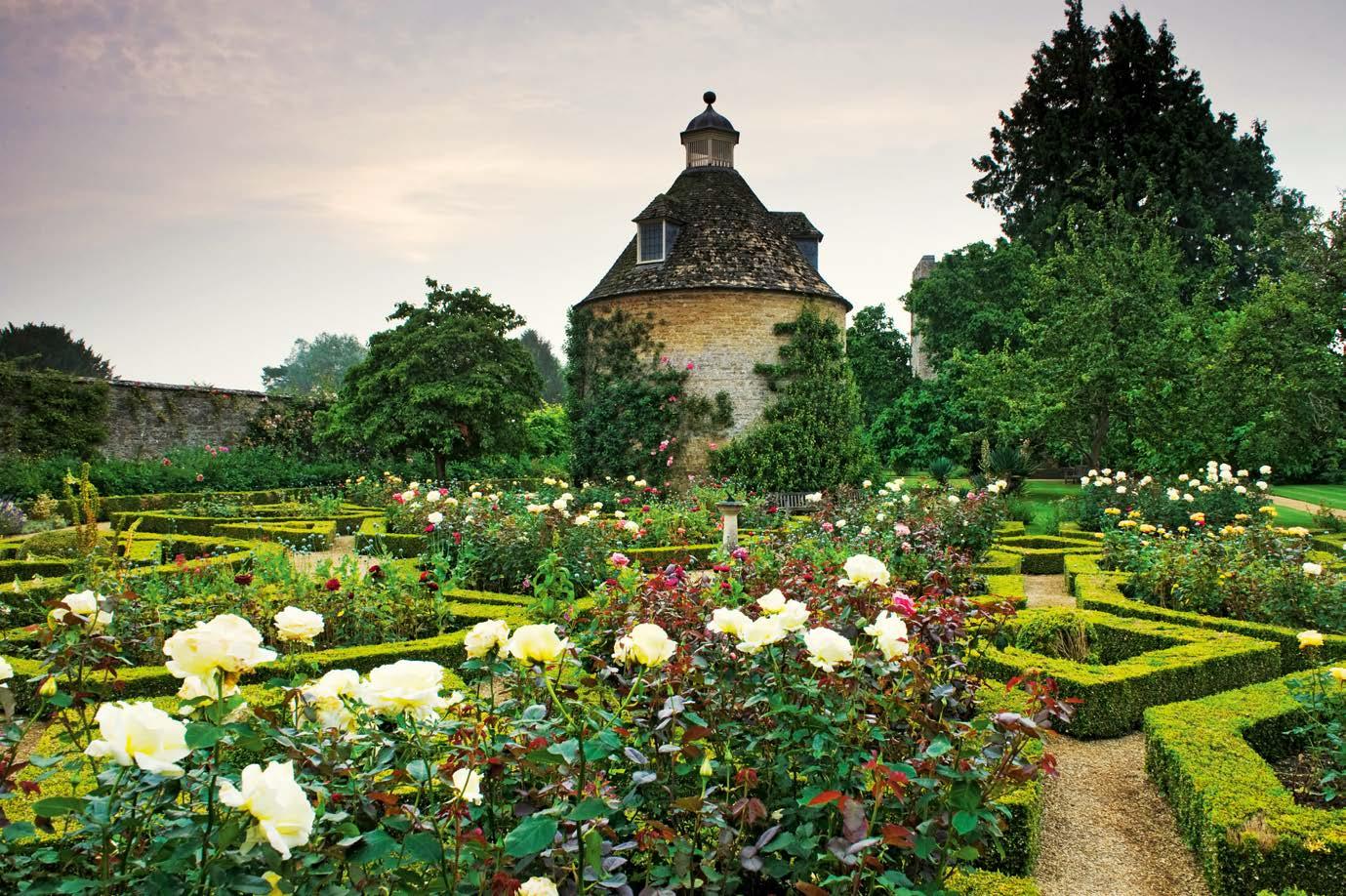
of the day – think, for example, of the Victorian parterre at Waddesdon Manor, its perfectly symmetrical beds filled with neatly planted carpets of colourful bedding.
Now though, as we’re all too aware, box has become a problematic plant, both for professional gardeners caring for historic estates and those of us growing it at home. It can end up riddled with box moth caterpillars that strip its foliage before our eyes, or stricken with the fungal disease box blight. With little hope of keeping it healthy without committing to a time-consuming programme of regular treatment and sprays, have we come to the end of the road for the traditional box parterre?
Gardeners at the National Trust for Scotland are looking to a future without box. Pilar Medrano-Dell is head gardener at the Trust’s Pitmedden Garden in Aberdeenshire, where a traditional parterre sits at the heart of the garden on the lower terrace. “Anyone can see how much box hedging we have here – there are miles of it,” says Pilar. “But we do have box blight, and we have to confront that issue, so we have a ten-year plan to replace the box hedges. We’ve been experimenting with Ilex crenata and other alternatives, but there are two factors that limit what we can plant here: one is that we have acid soil, which Ilex crenata doesn’t like, and the other is that
138 THE ENGLISH GARDEN JULY 2023
Above The traditional parterre at Rousham House in Oxfordshire, where box-edged compartments are filled with summer roses.
PARTERRES IMAGES GAP/MARCUS
HARPUR; RHS/LEE CHARLTON/NICOLA STOCKEN; NATIONAL TRUST FOR SCOTLAND
it’s a lot colder here in North East Scotland, so what might work in a warmer part of the UK probably won’t thrive here. But we have had success with Lonicera nitida ‘Maigrun’ and yew (Taxus baccata), and we’re starting to replace some of the box already. You can’t do everything too quickly and you have to maintain the history, so we’re making the change in a gradual, sustainable way over ten years.”

At the opposite end of the country in the Royal Horticultural Society’s garden at Wisley, gardeners have been trialling a range of box alternatives, many of which had been looking promising, until last winter struck. “Temperatures dropped to about -10 °C in the Box Alternative Garden,” says Matthew Pottage, Wisley’s curator. “It was the
Top RHS Wisley’s Box Alternative Garden is an intricate showcase of other plants that are happy to be clipped into low hedging shapes. Above right Pitmedden’s lower terrace features a traditional parterre, but the box hedging is being gradually replaced. Above left Alternatives to box on trial at Wisley.


worst winter in a decade here, but having said that, we would never formally publish the results of our trials until the plants had experienced a proper winter anyway.” Weeks of sub-zero temperatures certainly put the plants being trialled to the test. Species of pittosporum and corokia had been looking promising, but as Matthew notes: “All the Pittosporum tobira cultivars have been wiped out and all the corokia, including hybrid Corokia x virgata and C. cotoneaster. Even if they did come back from the old wood, we’re not confident to say to people that they’re a good box alternative.”
Leptospermum and luma also failed, but, on the other hand, Berberis darwinii ‘Compacta’, Ligustrum undulatum and cultivars of Ligustrum
JULY 2023 THE ENGLISH GARDEN 139
sinense, lonicera and phillyrea were all fi ne. “The biggest surprise, and the most interesting, is the podocarpus. I had been trumpeting them as my favourite before it got cold because they need only one clip a year, but as they’re from the southern hemisphere we thought ‘oh no, they’ll all die’. But Podocarpus acutifolius and P. totara have been fi ne,” says Matthew.
“On a happier note,” he adds, “now that we’ve pulled out all those plants that have died, it’s given us an opportunity to trial other genera and try more cultivars of the things that have worked.” Also, as Matthew points out, a parterre needn’t be hedged. “You could go with something softer that doesn’t
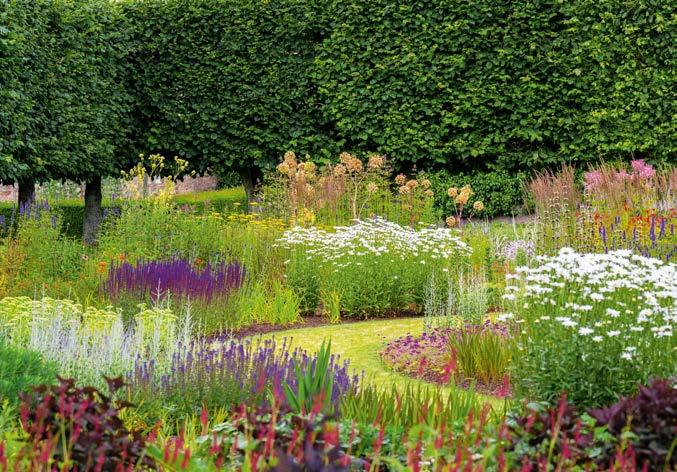
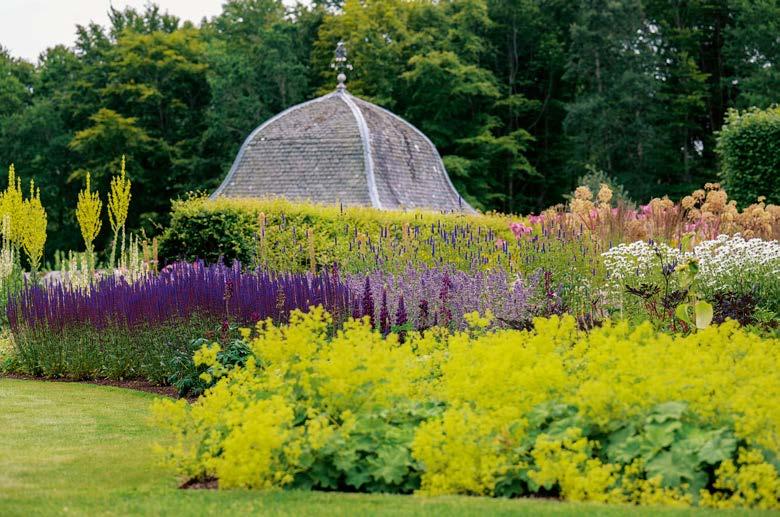
Top The box hedges curvaceously dividing Broughton Grange’s parterre have now been replaced with euonymus. Above right Perennials in the new Chris Beardshaw-designed parterre on Pitmedden’s upper terrace. Above left Paths form this parterre’s pattern.
need clipping but forms a low barrier instead, like santolina, for instance.”

Tom Stuart-Smith is known for his modern takes on this most traditional feature. The parterre he designed at Broughton Grange in Oxfordshire, its pattern based on the magnified cells within a leaf, eschewed traditional formal symmetry in favour of curvaceous, organic lines. But even here box blight has struck, and so the hedges have recently been replanted with Euonymus ‘Jean Hugues’.

140 THE ENGLISH GARDEN JULY 2023
PARTERRES
Back at Pitmedden, on the garden’s upper terrace, another parterre has been completely reimagined.
Designer Chris Beardshaw was asked to give the previous formal design an innovative rethink, and his new vision for it was planted up in 2020 and 2021. The result is a ‘deconstructed parterre’, with two symmetrical halves sitting either side of the garden’s central axis, its pattern composed of grass paths and the spaces in between planted with flowing herbaceous perennials and grasses.
“The previous layout was very constrained with strong formality,” explains Pilar. “Now the garden has a more contemporary feel, but it’s balanced with the historical background. We wanted the planting to give maximum reward – to increase its biodiversity and wildlife and to increase its seasonality to extend the period of interest for visitors. I hadn’t realised how beautiful the light here in North East Scotland is. In autumn it has a very special tonality, and together with the autumn colour in Chris Beardshaw’s design, it makes walking through the garden a great experience.”
“As a conservation charity, the Trust is keen to be proactive and forward thinking when it comes to issues like climate change,” adds Pilar. “The planting reflects that – it needs to be low input in terms of resources like water, fertiliser and pesticides, but
Above At Hergest Croft in Herefordshire, low hedges of Lonicera nitida create the pattern in this parterre, its slightly shaggy outline lending a charm of its own.

high impact in terms of aesthetics.” Across Scotland, the Trust is phasing out annual summer bedding, which is known for being resource-heavy to grow, using lots of water, often peat-based growing media, and requiring heat. More sustainable perennials are the obvious choice to replace it.
Pitmedden’s perennials include robust stalwarts such as persicaria, agastache, salvia and nepeta. “The only thing we’ve had to tweak is the angelica – its seedheads create a fantastic e ect, but there’s been a lot of self-seeding so we’ve had to keep on top of it,” says Pilar. “We want to keep moving forward and o er something that’s not static, but at the same time there has to be a compromise with the history of our amazing properties and landscapes. Does a historic garden have to stay the way it was when it was created, or has it got to evolve? For me, it’s all about creating resilient landscapes, even in what could be considered a constrained environment like a parterre. Now if you come every week, you see something di erent, and today the bees and all the other insects are buzzing.” n
Pitmedden Garden, Ellon, Aberdeenshire AB41 7PD. Tel: 01651 842352; nts.org.uk/pitmedden
RHS Garden Wisley, Woking, Surrey GU23 6QB. Tel: 01483 224234; rhs.org.uk/wisley
JULY 2023 THE ENGLISH GARDEN 141
IMAGES
CLIVE NICHOLS; NATIONAL TRUST FOR SCOTLAND; GAP/CAROLE DRAKE
GARDENS & NURSERIES TO VISIT IN EARLY SUMMER

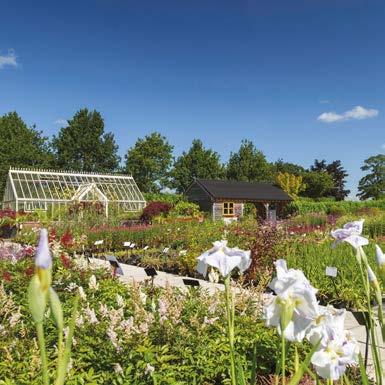
EASTON WALLED GARDENS
A plantsman’s paradise and an independent nursery situated in the West Midlands open seven days a week. We specialise in hellebores, hardy cyclamen, salvias (left), hepaticas, lewisias, hydrangeas, dwarf conifers, snowdrops, Primula auricula and many more beautiful plants. Our UK mail order service sends plants, garden essentials and gifts direct to your doorstep.
John’s Garden is open every Saturday for charity. Please visit our website for full details.
mailorder@ashwoodnurseries.com | www.ashwoodnurseries.com
Ashwood Lower Lane, Kingswinford, West Midlands DY6 0AE
BLUEBELL ARBORETUM & NURSERY
Specialists in hardy trees, shrubs and bers including a huge selection of unusual and rare species


Expert advice is available from our helpful staff. The nursery is surrounded by a nineacre woodland garden (RHS Partner Garden), and visitors are welcome all year round.
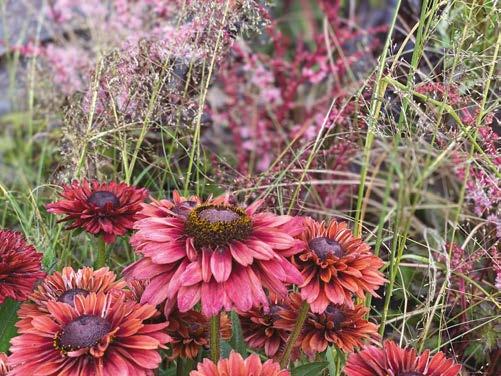
Informative website and reliable mail order rvice if you would like plants delivered.

Tel: 01530 413700
sales@bluebellnursery.com | www.bluebellnursery.com
Annwell Lane, Smisby, Ashby de la Zouch, Leicestershire LE65 2TA
DAISY CLOUGH NURSERIES LTD
A busy nursery in rural Lancashire, Daisy Clough specialises in a carefully selected range of over 700 perennials and grasses. Open seven days a week, the nursery also offers a od selection of shrubs, trees, container plants and fruit. Plenty of homegrown vegetable plants are available through spring
r garden shop sells seeds, tools and essential garden sundries. We have a beautiful homeware and clothing shop, and a tearoom to round off your visit.
Tel: 01524 587067
info@daisyclough.com
| www.daisyclough.com
Station Lane, Scorton, Preston, Lancashire PR3 1AN
Tel: 01476 530063
Nestled in a secluded Lincolnshire valley, Easton Walled Gardens offer a pause from the pace of life. Saunter through the Gardens, sit and sip in the coffee rooms, shop in the Courtyard, or stay in our holiday cottages.
Sweet Pea Season begins on 21 June. Treat yourself to the delights of its varied blooms. However you choose to spend your time with us, Easton will leave you feeling inspired.
OPEN: The Courtyard Shop, The Coffee Room and The Gardens are open 5 days a week until 22 Dec, Wednesday to Sunday, plus Bank Holiday Mondays, 11am-4pm.
info@eastonwalledgardens.co.uk | www.visiteaston.co.uk
Easton, Grantham, Lincolnshire, NG33 5AP
BEETHAM NURSERIES
Beetham Nurseries is a familyowned, independent garden centre and growing nursery on the A6 in south Cumbria, just four miles from the M6 motorway. Established in 1984, we are proud to offer our customers something different and unique. The growing nursery is a traditional retail plant nursery where you will find thousands of herbaceous perennials; they will always be interesting and grown by us here at Beetham Nurseries. Plants are our passion, we invite you to see for yourself the spectacular selection that we grow and the high standards we go to in order to grow plants that are of the highest quality.
Tel: 015395 63630
www.beethamnurseries.co.uk
Pool Darkin Lane, Beetham, Nr Milnthorpe, Cumbria LA7 7AP
SPRING REACH NURSERY
Tel: 01483 284769
info@springreachnursery.co.uk | www.springreachnursery.co.uk
Long Reach, Ockham, Surrey GU23 6PG
HEVER CASTLE & GARDENS
WATERPERRY GARDENS
Experience Hever Castle at the height of its summer beauty, with more than 5,000 beautifully displayed roses creating a kaleidoscope of colour and wonderfully perfumed aromas. As the days lengthen, the Mediterranean-style planting within the Pompeiian Wall bursts into life and the herbaceous borders display hundreds of different perennials, each vying for attention.
Tel: 01732 865224
info@hevercastle.co.uk | www.hevercastle.co.uk

Hever, Edenbridge, Kent, TN8 7NG
FORDE ABBEY AND GARDENS
A 900-year-old Abbey set within 30 acres of award-winning gardens with naturalised wildflower meadows, topiary-lined vistas, herbaceous borders, bog garden, kitchen garden and lakes with meandering pathways. Home to England’s highest powered fountain.
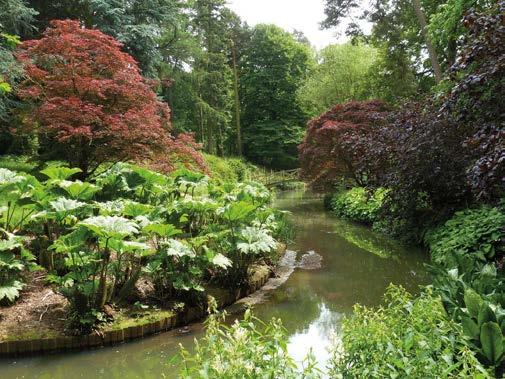
OPEN: Gardens, gift shop, coffee shop, plant nursery, pottery 1 March to 31 October, 10. 30am-5pm (last admission 4pm).
Tel: 01460 221290
info@fordeabbey.co.uk | www.fordeabbey.co.uk
Chard, Somerset TA20 4LU
This summer, Ashridge House is thrilled to present its prestigious Sculpture Exhibition within the enchanting confines of its historic grounds. This exhibition promises an eclectic collection of contemporary and traditional sculptures crafted by talented living artists. Embark on a carefully curated sculpture trail that will take you on a captivating journey through 190 acres of landscaped surroundings, where you will encounter awe-inspiring works by internationally acclaimed sculptors and budding talents.

OPEN: 9am-5pm
waterlily canal, alpine garden,
ancient walled garden offers
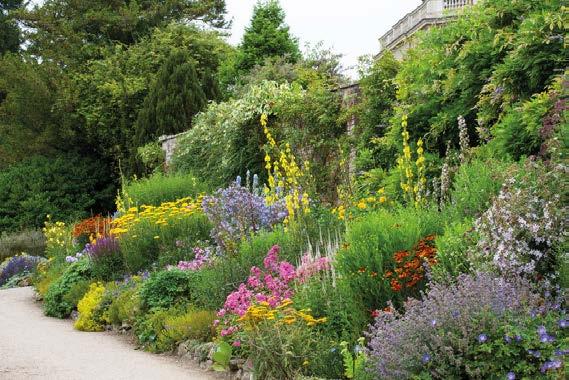
Tel: 01844 339254 office@waterperrygardens.co.uk | www.waterperrygardens.co.uk
Waterperry, Near Wheatley, Oxfordshire OX33 1LA
COTTESBROOKE HALL & GARDENS

July sees the garden rooms at Cottesbrooke continue to dazzle as late season perennials such as dahlias, salvias and agapanthus flourish in the borders; the mix of colour and texture is enhanced by the clipped yew hedging. Wander through the Wild Garden along its meandering river to see the giant gunneras, rodgersias and persicarias at their peak providing a lush, shady escape from the heat of summer.
OPEN: May and June: Wed-Thurs
2-5.30pm, July to Sept: Thurs only 2-5.30pm plus Bank Holiday Mondays (May-Sept): 2-5.30pm.
5-18 June: Hall and Gardens CLOSED
Tel: 01604 505 808 welcome@cottesbrooke.co.uk | www.cottesbrooke.co.uk

Northampton NN6 8PF. What3words: expand.allow.curly
BADMINTON ESTATE
The historic gardens of Badminton House are open on 25 June and 3 September 2023. The gardens were designed by Russell Page and Francois Goffinet and combine formality, structure, and an abundance of plants for all seasons. There’s also a selection of stallholders selling plants, flowers and refreshments. The event raises money for Severn Area Rescue Association and The Church Restoration Fund.
OPEN:
Tel: 01442 843 491
events@ashridgehouse.org.uk | www.ashridgehouse.org.uk
Berkhamsted, Hertfordshire, HP4 1NS
Tel: 01454 218203
| www.badmintonestate.com Badminton, South Gloucestershire GL9 1DD
10am-4pm
estateoffice@badmintonestate.com



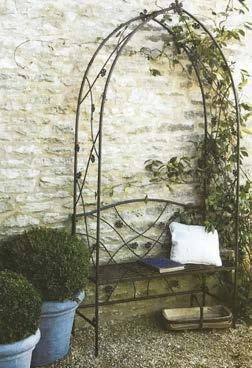






















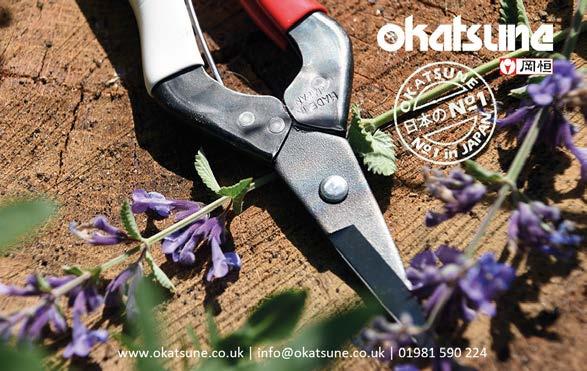













FOR MORE INFORMATION VISIT US AT WWW.THEENGLISHGARDEN.CO.UK ACCESSORIES FOR DOGS TO ADVERTISE • EMAIL: info@chelseamagazines.com GARDEN ARCHES & FURNITURE PLANT SUPPORTS GREENHOUSES GARDEN TOOLS CLOTHING FLOWER WORKSHOPS COURSES Gardening Courses Home-study Free info FREEPHONE 0800 083 9191 or 01409 220 777 Or email: info@hccollege.co.uk www.hccollege.co.uk • For leisure or for a career • Over 30 courses in Gardening, Garden Design, Arboriculture, Forestry, Floristry and more • Many courses prepare you for RHS or RFS/ABC quals. EST 1930 HCC EST 1930 HCC HCC The English Garden 21 40x99.indd 1 21/07/2021 12:27 15%o readerstoEnglishGardenquotingcodeEG10 Chairworks Ltd www.chairworks.info | 0208 247 3700 | info@chairworks.info Cornishwear Cornish smocks – perfect for gardening Made in Cornwall hello@cornishwear.com 01736 731395 www.cornishwear.com 5 Small Curved 30cm £12.99 5 Extra Wide Curved 40cm £15.99 5 Medium Curved 50cm £15.99 5 Large Curved 62cm £18.99 5 Extra Tall Med 75cm £18.99 15 Pack 3L, 3EW, 3M, 3S, 3 80cm Loop £35.99 9 Pack 3L, 3M, 3 EW £24.99 9 Pack 3S, 3M, 3EW £22.99 5 Loop/Stakes 130cm £15.99 5 Loop/Stakes 100cm £14.99 5 Loop 80cm £13.99 5 Loop 60cm £11.99 4 Semi Circle 65cm £16.99 METAL PLANT SUPPORTS 100% UK Manufacture, all steel products from British Steel Free Delivery on Order over £45* *t&c’s apply see website www.bespokeplantsupports.co.uk COMMON FARM FLOW ERS Online & face to face workshops. Sustainable wedding flowers. Find out more at commonfarmflowers.com At Woofingdales, we design premium, modern dog harnesses, dog collars, dog leads and accessories so your dog will always look fabulous & feel comfortable, no matter where their adventures take them. Let your dog explore in style. Loved by dogs, owners & celebrities. www.woofingdales.co.uk Twin wall 4mm or 6mm polycarbonate cover Available in a wide range of sizes Superb light transmission Strong and long lasting Call us today! www.polyecogreenhouses.com 01473561072 UK Mainland delivery and installation service available Twin wall 4mm or 6mm polycarbonate cover Available in a wide range of sizes Superb light transmission Strong and long lasting Call us today! www.polyecogreenhouses.com 01473561072 UK Mainland delivery and installation service available







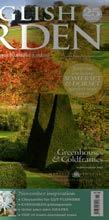


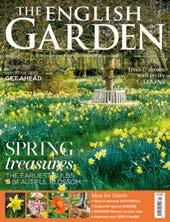
Order your subscription today Subscribe to The English Garden for just £34.95 + free delivery for 13 issues and save 56% Visit www.chelseamagazines.com/CTEG232 or call +44 (0)1858 438 833 quoting CTEG232 USUALLY £5.99 NOW ONLY £2.69 AN ISSUE Saving is calculated from the UK subscription price - 13 issues for £80. Subscriptions will start from the next available issue. SUBSCRIBE & SAVE UP TO 56% Pay less than half the shop price when you subscribe Featuring the most beautiful gardens from across the UK and Ireland, as well as invaluable practical advice and stunning garden photography
Green Party

Fresh, textural ferns in all shades of green will enliven any garden, and Non Morris has plenty of exciting varieties to recommend even for drier and less shady spots

It is the ferns that gladden my heart. Every time I return to Wales I am amazed all over again at their lushness. Arm-long fronds of hart’s tongue fern spilling onto the road under mild watery skies, fresh green male-fern confidently peopling a cobbled courtyard, delicate starfishes of maidenhair spleenwort darting across stone walls.
If you are lucky enough to have a sheltered garden and plentiful rain, the opportunities for fern-fuelled texture and exuberance are open-ended. In the Gardenin-the Ruins at Lowther Castle in Cumbria, Dan Pearson uses the stately Dryopteris wallichiana as an elegant, repeated vaseshape amid a soft, flowing sea of Hakonechloa macra This is punctuated by paleflowered Cornus ‘Norman Hadden’ and distinguished stands of Campanula latifolia var. macrantha ‘Alba’ – a white campanula that looks elegant even when the flowers develop into biscuity seedheads.
My favourite gardens in Wales and the West Country celebrate the electric green of fern against stone adding Soleirolia soleirolii, the tiny-leaved baby’s tears, to form trailing, moss-like cushions between the paving and shoals of delicate yellow Welsh poppy to dance amongst the radiant upright forms. Of the three ferns – sensitive, shuttlecock and royal – that need a very damp environment, the broad-fingered, apple green Onoclea sensibilis is my favourite. But there are ferns that thrive in dry shade and these can be key to creating an alluring, beautifully patterned space.
Dryopteris is always a good place to start. The deciduous Dryopteris wallichiana with its distinguished dark brown central stipe will in fact do well in an urban or drier garden as long as there is water available when it unfurls in spring and provided it is not frazzled by midday sun. I often specify the evergreen Dryopteris atrata, which grows to around a metre tall
and a metre wide o ering an architectural backbone to a planting scheme along with May-flowering Libertia grandiflora perhaps and white Japanese anemones. If space is limited, the advantage of ferns over many structural shrubs is that their maximum size is comfortingly predictable.
Polystichum setiferum is an essential fern for drier shade. It is worth seeking out finer forms – the larger ‘Herrenhausen’ or the tightly nestling ‘Plumosum Densum’ – for an exquisite evergreen layer under deciduous trees or filigree edging to a shaded path.
The metre-high Japanese lace fern, Polystichum polyblepharum, never looks less than elegantly vigorous. I grow it in large pots with long-flowering Hydrangea macrophylla ‘Madame Emile Mouillère’ – pure white, turning pink with age – to soften and brighten our shady dining terrace.
The number of ferns available can be overwhelming. As with other aspects of gardening, the way to expand your repertoire is by trying out a gorgeous variety cleverly grown by a gardener you admire. As you enter Pettifers, the Oxfordshire garden of inspirational plantswoman, the late Gina Price, you come across a low container brimming over with Adiantum aleuticum ‘Imbricatum’: layer upon layer of delectable, finefingered maidenhair foliage on wiry black stems. This is the kind of fern that will make you gasp. I have just ordered one and I warmly suggest you do the same.
Sometimes, of course, you choose a plant for entirely sentimental reasons. Fibrex Nurseries rightly describes the finely cut Polypodium cambricum ‘Conwy’ as ‘a real beauty’. For me, the idea of a fern found on the rampart walls that wrap around Conwy Castle in North Wales is just too tantalising to resist. n lowthercastle.org; fibrex.co.uk
146 THE ENGLISH GARDEN JULY 2023 TO CONCLUDE
ILLUSTRATION MARIA BURNS PORTRAIT RACHEL WARNE
If you a have a sheltered garden and plentiful rain, the opportunities for fern-fuelled texture and exuberance are open-ended
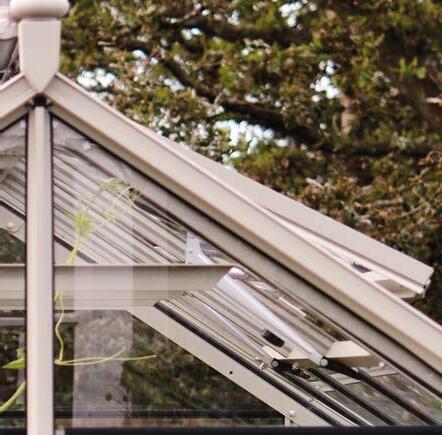


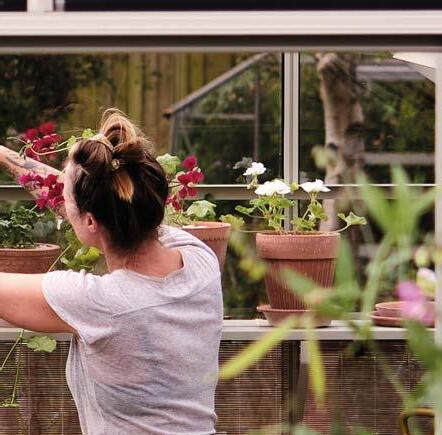
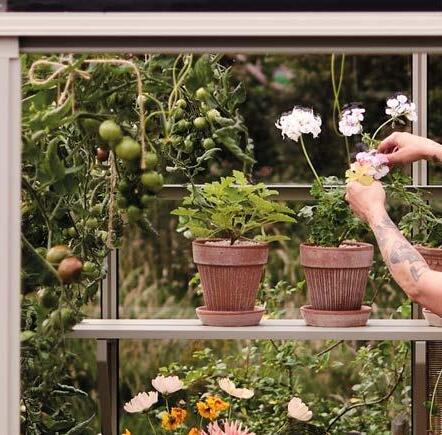

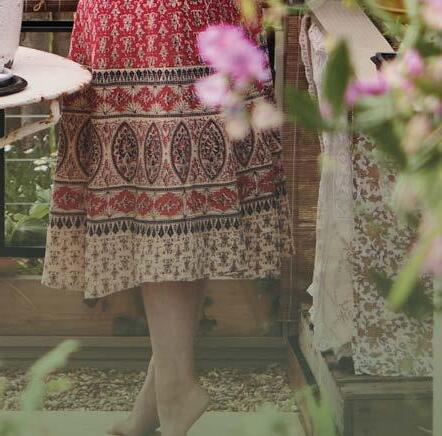

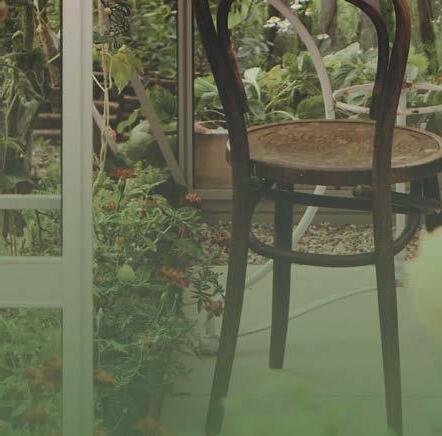
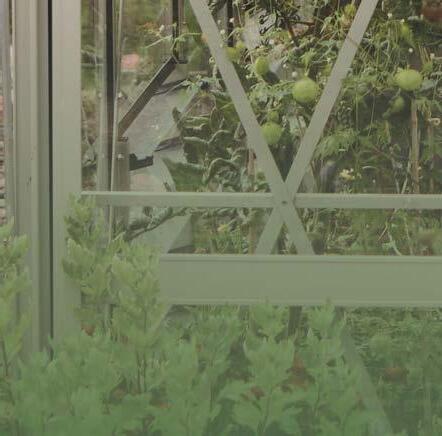







rhinogreenhouses.co.uk 0800 694 1929
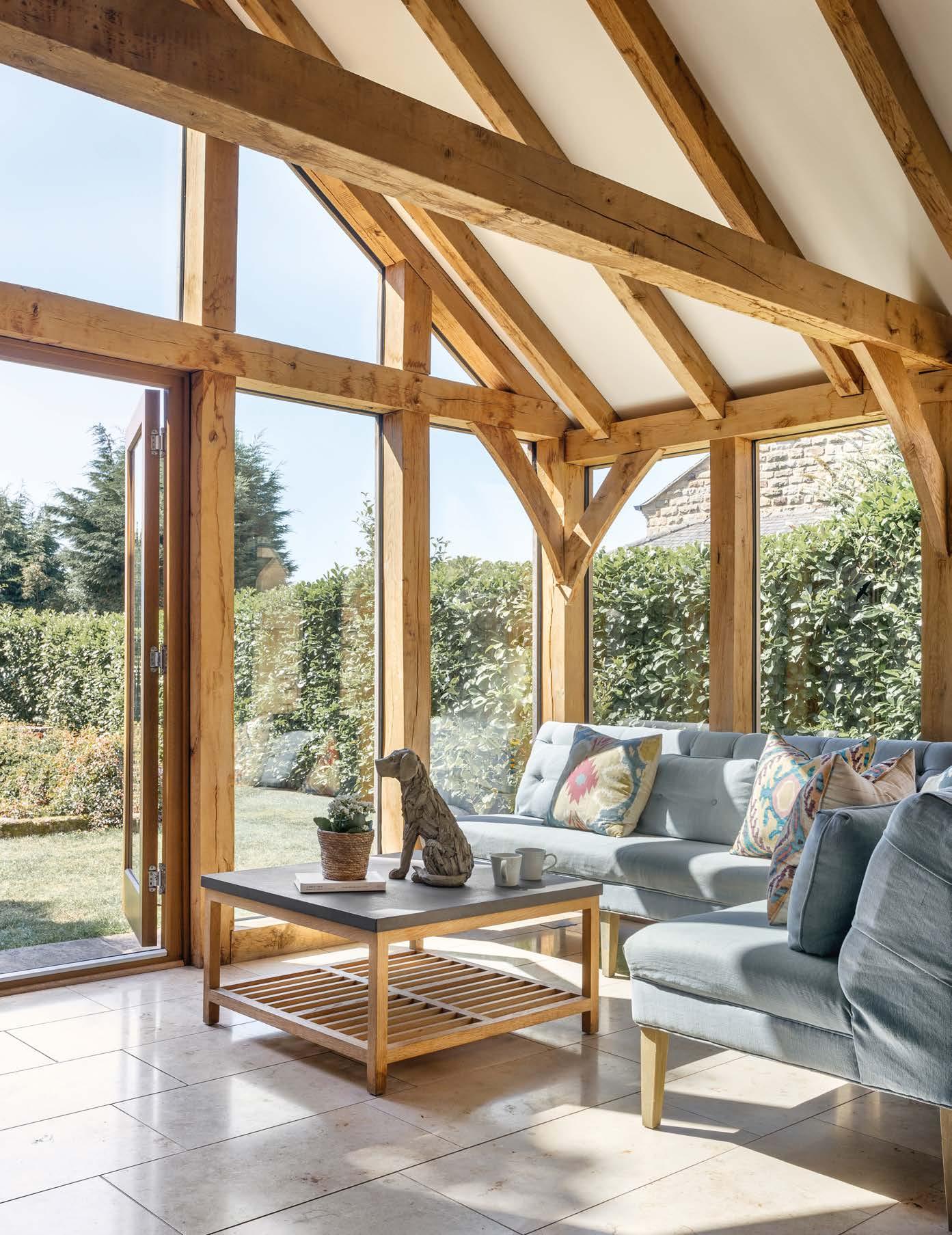






















































































































































































































































































































































































 Cordless POWER. BY STIHL.
Cordless POWER. BY STIHL.
































 WORDS MATT REES-WARREN PHOTOGRAPHS HEATHER EDWARDS
WORDS MATT REES-WARREN PHOTOGRAPHS HEATHER EDWARDS











































































 Above Box balls and hedges bring structure to loose, informal planting.
Below right Vintage gardening tools for sale.
Below left Piers Newth and Louise Allen, owners of Dreamers Cottage.
Above Box balls and hedges bring structure to loose, informal planting.
Below right Vintage gardening tools for sale.
Below left Piers Newth and Louise Allen, owners of Dreamers Cottage.


























































































 WORDS ANN COOKE PHOTOGRAPHS DEREK ST ROMAINE
WORDS ANN COOKE PHOTOGRAPHS DEREK ST ROMAINE









 Zesty Alchemilla mollis contrasts with soft lilac catmint, with rich burgundy accents from sumptuous old rose ‘Cardinal de Richelieu’.
Zesty Alchemilla mollis contrasts with soft lilac catmint, with rich burgundy accents from sumptuous old rose ‘Cardinal de Richelieu’.








 WORDS & PHOTOGRAPHS NICOLA STOCKEN
WORDS & PHOTOGRAPHS NICOLA STOCKEN


























































































































































































































 by Evelyn Foster
by Evelyn Foster































 Geranium sylvaticum ‘Master Charles Wilson’, hails from Northumberland and is pretty much fuss free.
Geranium sylvaticum ‘Master Charles Wilson’, hails from Northumberland and is pretty much fuss free.












































































































































































































































































































































































































